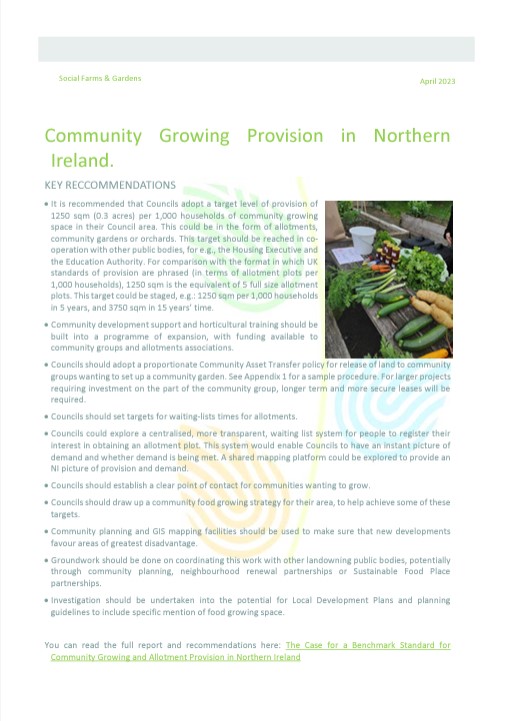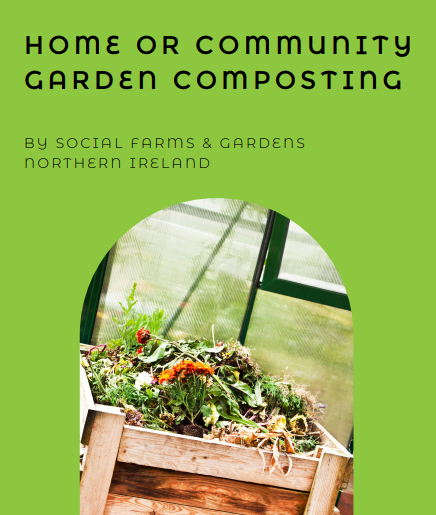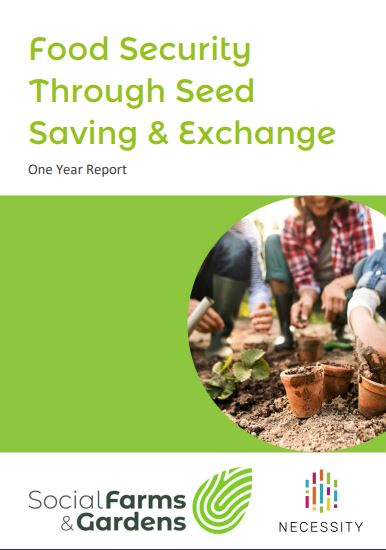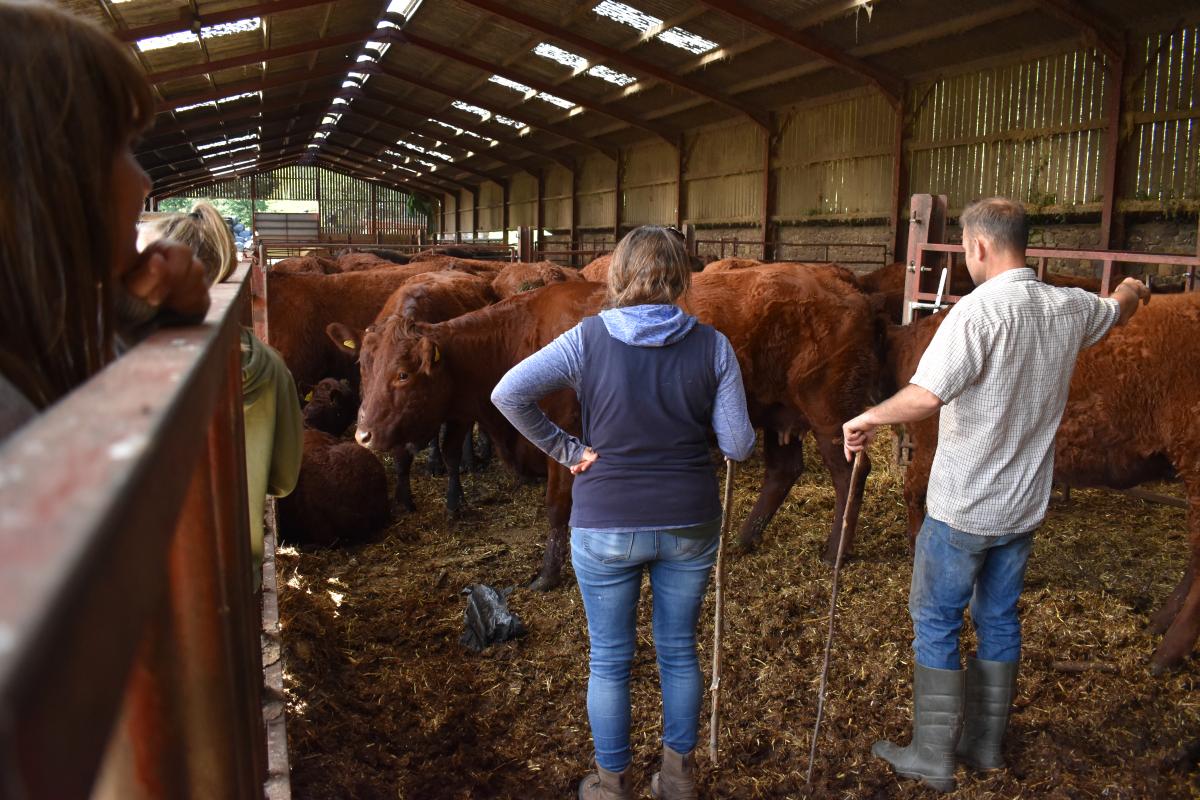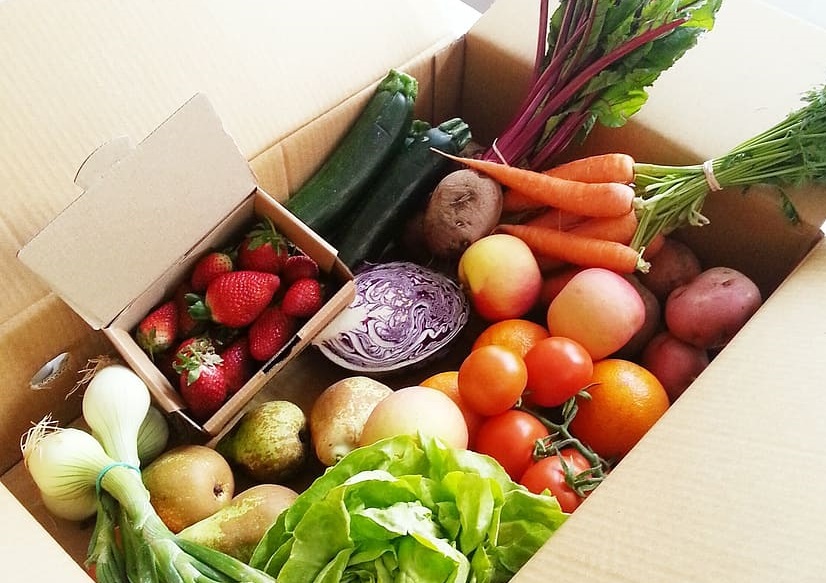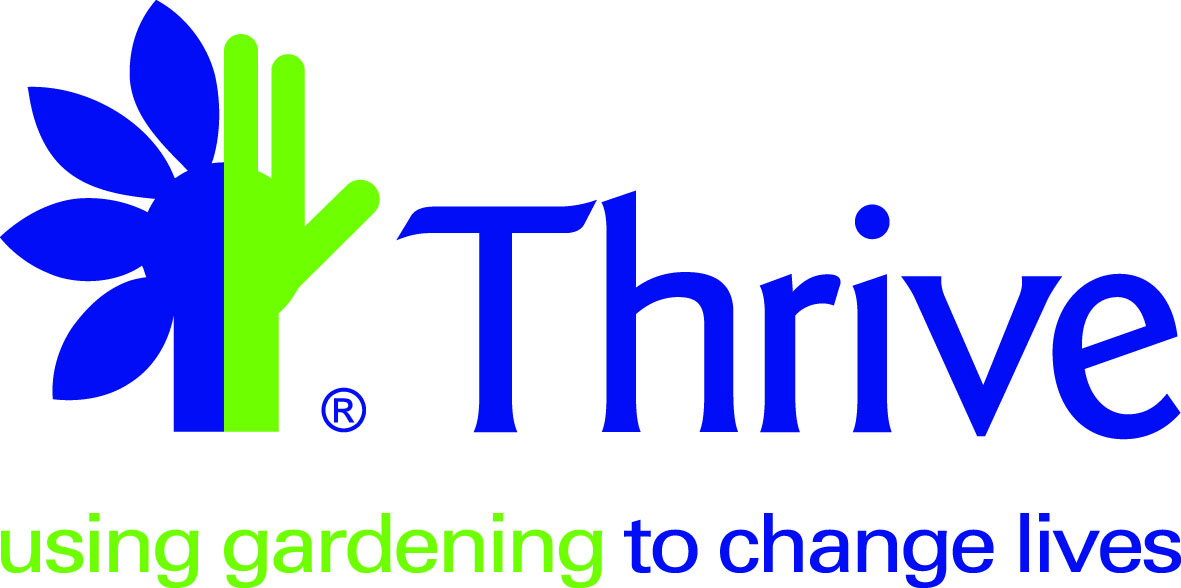2024 summer grants for children's outdoor activities awarded
We are delighted to be partnering once again with The Hilden Charitable Fund to enable more children to get outdoors and enjoy nature together.
In 2023, this collaboration enabled us to support 26 groups with grants of £1,500 each through our Children’s Summer Activity Grant. The activities exceeded our expectations, providing around 314 sessions over the summer to more than 3,000 participants of children and their families. The types of activities varied widely, from drop-in craft and wildlife sessions and family activity days to intensive 6-week programmes for specific young people who would not have otherwise been able to attend.
This year we are thrilled to award £44,000 in Children’s Summer Activity Grants of up to £1,500 each to 31 of our members across the UK supporting their work this July and August 2024.
Thank you to everyone who submitted applications, and a huge congratulations to the following SF&G members receiving funding this summer:
- Southampton City Farm
- Magadalen Environmental Trust
- Heeley City Farm
- Oxford City Farm
- STAA
- Arkwright Meadows Community Gardens
- Scotswood Natural Community Garden
- Surrey Docks Farm Provident Society Ltd
- Kentish Town City Farm
- Meanwood Valley Urban Farm
- Hands of Hope
- The Outback Community Kitchen & Garden
- Henbant Ltd
- Yr Orsaf (Siop Griffiths Cyf)
- Concrete Garden
- North Glasgow Community Food Initiative
- Youth Vision
- TaleBlazers CIC
- Action for Station Town CIC
- Kilcooley Womens Centre
- Compass Advocacy Network (CAN)
- Road Farm Countryways CIC
- People and Animals UK
- The Prospects Trust
- Hartcliffe City Farm CIC
- Friction Arts
- Martineau Gardens
- Friends of Little Woods
- Forthspring Inter Community Group
- Bath City Farm
- The Seed Box
The independent evaluation of NI’s Growing Resilience
The independent evaluation of NI’s Growing Resilience: Digging Deeper Project 2019 – 2024
Funded by the National Lottery Community Fund has been published. This 5-year project has established community-growing networks throughout NI based on:
Equity & Social Justice
Attracting a diverse range of participants and intentionally removing barriers to participation
Asset based Community Development
Beginning with noticing and mobilising existing value and assets in a place.
From Centralised to Distributed networks
Involving people working peer-to-peer as equals, creating, and producing together
Productive Activity
Producing tangible things together as human beings
“This project understood, embodied and practised that relationships are the ‘bottom line’ in terms of our wellbeing as people and our ability to feed ourselves and thrive on a living planet”.

Read the full report here.
Wnest ti Trio Tyfu gyda ni eleni?
English
Wnest ti TrioTyfu gyda ni eleni?
Ac yn union fel hynny, mae blwyddyn arall o ddathliadau Have a Grow wedi dod i ben. Rydym bob amser mor ddiolchgar am y gefnogaeth barhaus i Trio Tyfu ac wrth ein bodd yn gweld grwpiau yn dychwelyd flwyddyn ar ôl blwyddyn i weiddi am y gwaith gwych y maent yn ei wneud. Gobeithiwn eich gweld i gyd eto'r flwyddyn nesaf am fwy o ddigwyddiadau gwyrdd a chynyddol! Dyma grynodeb byr o rai o’r digwyddiadau gwych a gynhaliwyd ledled Cymru eleni:
Dywedodd Lily, sy’n gweithio yn Y Siop Fach Sero yng Nghymoedd y Rhondda “Cawsom ychydig o ddyddiau hyfryd yn dathlu Trio Tyfu yn Y Siop. Enw ein digwyddiad oedd 'Sunnies & Salads' lle gwahoddwyd aelodau o'r gymuned i ddod i wneud eu potiau blodau papur wedi'u hailgylchu eu hunain a phlannu hadau blodyn yr haul neu salad i fynd adref gyda nhw. Diolch i Ffermydd a Gerddi Cymdeithasol Cymru am drefnu hyn!”


Bu un arall o'n haelodau yng Nghymru a gymerodd ran yn Trio Tyfu eleni, Cultivate in Powys, yn dathlu 'Pob peth ffa' yn eu digwyddiad. Fe gynigon nhw daith o amgylch eu gardd farchnad dim cloddio, gweithdai gwahanol a’r cyfle i ddathlu ffa a phys fava a dyfwyd yn y DU gyda llawer o brydau blasus! Mae Cultivate yn un o'r prosiectau sy'n gweithio gyda Ffermydd a Gerddi Cymdeithasol ar ein prosiect Tyfu Powys. Roeddem yn gallu cynnig £200 i grwpiau ym Mhowys tuag at eu digwyddiadau Trio Tyfu, diolch i gyllid gan Lywodraeth y DU drwy Gronfa Ffyniant Gyffredin y DU. Cefnogir gan Gyngor Sir Powys.

Eleni buom yn ddigon ffodus i sicrhau rhywfaint o gyllid a alluogodd ni i gynnig pecynnau marchnata Eco-gyfeillgar Have a Grow i grwpiau yng Nghymru. Roedd hyn yn cynnwys rhai posteri y gellir eu hailddefnyddio, pensiliau bambŵ, baneri papur, bagiau tote cotwm organig a rhai baneri y gellir eu hailddefnyddio. Hoffem ddiolch i Welshpool Printing Group am ddod o hyd i'r holl ddeunyddiau ecogyfeillgar a ganiataodd i ni roi'r pecynnau hyn at ei gilydd.
Prosiect arall a gymerodd ran eleni oedd The Feelgood Factory / Strategaeth Bryncynon , a ddathlodd Trio Tyfu gyda rhywfaint o gerddoriaeth fyw, ymweliad gan y plant ysgol lleol a rhai lapio salad blasus wedi'u gwneud o'u cynnyrch gardd eu hunain! Ar hyn o bryd rydym yn gweithio gyda The Feelgood Factory ar ein prosiect Camau Gwyrdd (a ariennir gan Gronfa Gymunedol y Loteri Genedlaethol) felly edrychwn ymlaen at weld llawer o weithgareddau sy’n gyfeillgar i’r hinsawdd yn digwydd yn fuan iawn.


Hoffem ddiolch i'r holl grwpiau a gymerodd yr amser i gofrestru a chymryd rhan yn Trio Tyfu eleni - rydym bob amser yn gwerthfawrogi eich cefnogaeth a'ch brwdfrydedd i gymryd rhan. Mae'r prosiectau i gyd yn wych! Hoffech chi gymryd rhan yn Trio Tyfu y flwyddyn nesaf? Gwnewch yn siŵr eich bod yn cael y wybodaeth ddiweddaraf am bopeth sy'n digwydd yn Ffermydd a Gerddi Cymdeithasol trwy gofrestru ar gyfer ein cylchlythyr a dod yn aelod (os nad ydych chi eisoes!)
Children’s Summer Activity Grants for SF&G Members: 2024
SF&G are delighted that in 2024 we will once again be partnering with the Hilden Charitable Fund to award Children’s Summer Activity Grants to our members, helping to get children learning and playing in nature this summer.
Last year we supported 26 SF&G members with grants of up to £1,500 each. They delivered over 300 summer sessions taking place all over the UK engaging more than 3,000 children and their families, with a huge range of activities taking place including bug hunting, seed planting, orienteering, bush-crafts, and outdoor cooking sessions.
This year we will be distributing £34,000 in grants of up to £1,500 each to support activities that will engage children and young people with nature over the summer break in July and August 2024.
To Apply
You can apply for up to £1,500 to deliver activities for children and young people aged 5 – 18 that:
- Take place in July and/or August 2024
- Support them to play, learn and have fun outdoors
- Connect them with nature
We are particularly interested in receiving applications that demonstrate how you will reach children and young people who are from disadvantaged backgrounds, and/or who have disabilities.
Your activities can be solely funded by this grant, or take place as part of a larger scheme or initiative.
Application Deadline: Midday, Monday 24th June 2024
Successful applicants will be notified by Monday 1st July 2024, and receive their grant in full on return of a signed grant acceptance letter. Grant reports will need to be received no later than Friday 27th September 2024.
Please see the full grant Terms and Conditions here.
To apply, please complete this online application form.
Please note: as part of your application, you will be asked to submit a copy of your most recent accounts, your safeguarding policy and your public liability insurance certificate. We will not assess applications submitted without these supporting documents.
Have a Grow 2024!
Cymraeg
Did you Have a Grow with us this year?
And just like that, another year of Have a Grow celebrations in Cymru have come to an end. We are always so thankful for the continued support for Have a Grow and love seeing groups returning year after year to shout about the wonderful work they are doing. We hope to see you all again next year for more green and growing events! Here a short round-up of some great events that were held across Cymru this year:
Lily, who works at Y Siop Fach Sero in the Rhondda Valleys said “we had a lovely few days celebrating Have a Grow at Y Siop. Our event was called ‘Sunnies & Salads’ where we invited members of the community to come and make their own recycled paper flowerpots and plant some sunflower or salad seeds to take home with them. Thanks to Social Farms & Gardens Cymru for organising this!”


Another of our members in Cymru who took part in Have a Grow this year, Cultivate in Powys, celebrated ‘All things beans’ at their event. They offered a tour of their no-dig market garden, different workshops and the opportunity to celebrate UK grown fava beans and peas with lots of tasty nibbles! Cultivate are one of the projects working with Social Farms & Gardens on our Tyfu Powys project. We were able to offer groups in Powys £200 towards their Have a Grow events, thanks to funding from the UK Government through the UK Shared Prosperity Fund. Supported by Powys County Council.

This year we were lucky enough to secure some funding that enabled us to offer groups in Cymru some eco-friendly Have a Grow marketing packs. This included some re-useable posters, bamboo pencils, paper flags, organic cotton tote bags and some re-useable bunting. We would like to thank Welshpool Printing Group for sourcing all of the eco-friendly and sustainable materials that allowed us to put these packs together.
Another project that took part this year was, The Feelgood Factory / Bryncynon Strategy, who celebrated Have a Grow with some live music, a visit from the local school children and some delicious salad wraps made from their own garden produce! We are currently working with The Feelgood Factory on our Camau Gwyrdd project (funded by the National Lottery Community Fund) so look forward to seeing lots of climate friendly activities going on very soon.


We would like to thank all of the groups that took the time to sign up and take part in Have a Grow this year - we always appreciate your support and enthusiasm to take part. All of the projects are fantastic! Would you like to take part in Have a Grow next year? Make sure you keep up to date with everything happening at Social Farms & Gardens by signing up to our newsletter and becoming a member (if you aren’t already!)
SF&G join the pioneering GreenME project launch in Barcelona
Nature, mental health, and equity. Highlights from the kick-off meeting of the GreenME project
The pioneering GreenME project will study how exposure to nature can be integrated in healthcare systems to treat and improve mental health for all. It officially launched its ambitious initiative at the Kick-off meeting held in Barcelona from January 29th to 31st, 2024. SF&G were thrilled to attend and be a part of this important study. Hosted by the Open University of Catalunya (UOC) and coordinated by the Universitat Autònoma de Barcelona (UAB), the event brought together over 60 consortium members, including esteemed Advisory Board members, the European Commission’s project officer Patrizia Tenerelli, and researchers from sister projects (RESONATE and NATURELAB). During this three-day event, we were delighted to have the opportunity to get to know the participating organisations and the passion that drives them.
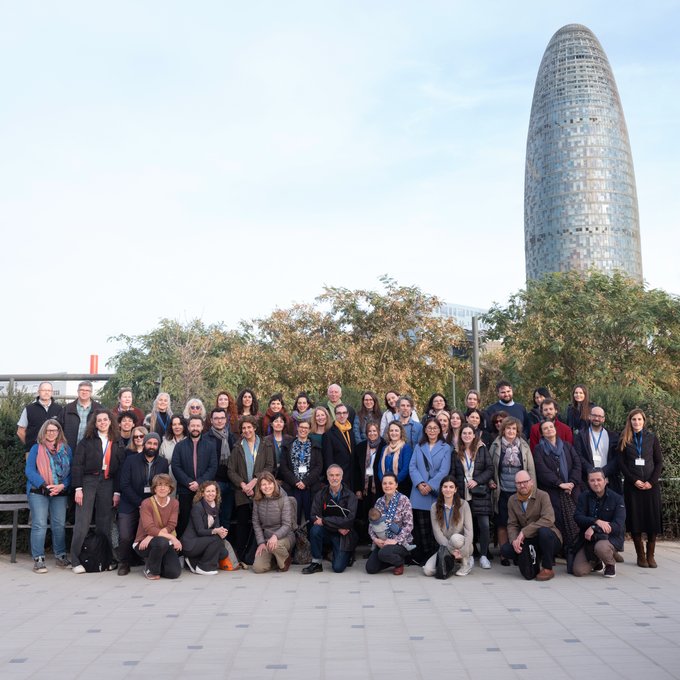
Researchers, therapy providers, and municipality representatives worked together to address the challenges of the project via an insightful collective hands-on exercise, listing burning questions and providing answers leading to a half-day exchange to identify ways forward.
In between sessions, the participants recharged their minds and bodies with walks in nearby parks, mindfulness exercises, and a mandala making outdoor activity, concretely experiencing how nature benefits mental health. Fun activities engaged the lively consortium; participants were asked to find clever solutions to build Kapla structures using just one finger or to tell their stories through a photographic language exercise!
This Kick-off meeting saw the robust collaboration and exchange of ideas with sister projects RESONATE and NatureLAB, operating under the overarching theme of mental health, nature, and sustainability. The anticipated collaboration is poised to drive forward pioneering research and foster transformative outcomes within the realm of nature-health interactions.
Moreover, the Research Synergies workshop held during the Kick-off meeting facilitated dynamic exchanges with researchers from other scientific projects, including BlueHealth, GoGreenRoutes, Dr. FOREST, and PHENOTYPE. By fostering interdisciplinary collaboration, GreenME aims to accelerate progress towards building just resilient and sustainable healthy communities.
A core tenet of the GreenME initiative is the empowerment of green care actors and stakeholders. Recognising the pivotal role of community involvement in shaping sustainable healthcare solutions, The GreenME Consor-um in Barcelona GreenME is committed to actively engaging with and empowering stakeholders throughout the project lifecycle. By fostering partnerships and amplifying the voices of green care advocates, GreenME seeks to cultivate a more inclusive and impactful approach to mental health and well-being.
As GreenME embarks on this transformative journey, the consortium is poised to drive forward cutting-edge research, innovation, and collaboration to advance the understanding and integration of nature-based interventions in mental healthcare.
The GreenME Consortium: In a trans-disciplinary partnership, GreenME involves six European countries, together with the UK and theUS. GreenME is led by the Autonomous University of Barcelona (UAB – Barcelona, Spain) and the GreenME consortium is composed of University of Bologna (Bologna, Italy), Swedish University of Agricultural Sciences (Sveriges Lantbruksuniversitet - Uppsala, Sweden), ILS Research (Research Institute for Regional and Urban Development - Dortmund, Germany), Warsaw University of Life Sciences (SGGW – Warsaw, Poland), Open University of Barcelona (UOC – Barcelona, Spain), OldContinent (Brussels, Belgium), NeuroLandscape Foundation (Warsaw, Poland), Gesellschaft für Gartenbau und Therapie (GGuT – Hückeswagen, Germany), Institute of Psychiatry and Neurology (IPIN – Warsaw, Poland), Scandinavian Nature and Forest Therapy Institute & SHINRIN-YOKU (Stockholm, Sweden), Eta Beta Cooperativa Sociale (Bologna, Italy), City ofHerne (Herne,Germany), Spanish Association ofHorticulture and Social and TherapeuticGardening (AEHJST – Madrid, Spain), University of Kent (Kent, UK), University of Salford (Salford, UK), Social Farms and Gardens (Bristol, UK) and Mind in Bexley and East Kent LTD (London, UK), The US partner is Oregon Health & Science University Portland State University School of Public Health (OHSU-PSU — Portland, Oregon).
The project will last 4 years and is funded by the Horizon Europe research and innovation programme of the European Union. For more information about GreenME and its initiatives, please visit https://greenme-project.eu
The Green Care Coalition and the promising pathway for Green Care
Seven years ago the Green Care Coalition (GCC) was set up to promote the commissioning and use of Green Care services. The term Green Care is an umbrella term that covers;
- Social and Therapeutic Horticulture
- Care farming
- Ecotherapy
- Animal Assisted Services
- Green Exercise (as a treatment intervention)
- Wilderness therapy, nature therapy,
- Nature arts and crafts
- Ecopsychology
The desire for the GCC is to give a voice to the many organisations in the UK that are committed to delivering or supporting the delivery of high-quality and cost-effective Green Care services. SF&G is proud to have played a large role in founding the coalition and we continue to support it alongside several nature organisations including Garden Organic, The Wildlife Trusts, TCV, Thrive, and more.
The GCC is run voluntarily by these organisations who have come together to share knowledge and resources in the belief that together our voice will be stronger and our actions more powerful. Their new updated website can be found at at; www.greencarecoalition.org.uk
The ultimate vision is for Green Care to become widely recognised as an effective treatment option in health and social care. There is growing scientific evidence of the benefits nature has on our well-being. Reports such as last year’s Wildlife Trusts report; A Natural Health Service: Improving Lives and Saving Money shows that green prescribing has the potential to save the NHS millions. Articles like these from the Guardian now explain the science of exactly how nature impacts the brain. NHS Forest has a handy database of evidence and resources covering all aspects of green space and health.
SF&G are also participants in the current GreenME project which aims to advance Green Care throughout Europe. This collective data will be pivotal for increasing these services, enhancing the ones we have and inviting more people to experience the genuine healing power of nature. These are promising developments for this movement of change in our healthcare systems.
Carmarthenshire Growers in Collaboration to Increase County’s Fruit & Veg Supply
*Cymraeg isod
Carmarthenshire Growers in Collaboration to Increase County’s Fruit & Veg Supply / Tyfwyr Sir Gaerfyrddin yn Cydweithio i Gynyddu Cyflenwad Ffrwythau a Llysiau’r Sir
We were delighted to welcome over ten growers and farmers to Bremenda Isaf on Friday 10th November to discuss an opportunity to establish a “library” of tools, equipment and machinery for the county. Growers and farmers showed a willingness and desire to help the Local Authority meet their aim of increasing local fruit and veg production for local people.
Funded by the UK Shared Prosperity Fund through Carmarthenshire County Council, Social Farms & Gardens is bringing together a network of growers to explore what tools, equipment and machinery would help them to increase production of vegetables that are particularly key to the public sector (schools and care homes). The growers share a passion to protect our land and biodiversity, and to regenerate soils so they can continue to produce nutritious food for future generations. We are working with experts from Lantra and Sustainable Farming Consultancy, as well as the generations of expertise from the farming community.
One of the barriers to increasing fruit and veg production, while regenerating our soils, is having the correct machinery and equipment. Over the coming months, we’ll be purchasing a range of items that will increase small-scale growers’ capacity such as two-wheel tractors with a range of attachments, and machinery to manage compost at scale. Bringing in learning from Benthyg and other lending libraries, we’ll be co-developing a mechanism that will allow the machinery to be shared equitably and accessibly.
This project is part of a bigger food systems development initiative in the County. Carmarthenshire is at the forefront of trailing new ideas that work across Council departments. This includes taking an alternative approach to some of the farm estate and rethinking school menus so that more local, sustainable and nutritious produce is available at a reasonable cost to feed the County’s children, and others who access public services.
We’re hopeful that this small pilot will catalyst a shift in edible horticulture across Carmarthenshire, and SW Wales, with more growers and farmers diversifying into fruit and veg production to meet a growing demand for local, nutritious produce.
For more information about the equipment sharing project, please contact Alison Sheffield ([email protected]).
Carmarthenshire is a Sustainable Food Places Bronze Award Holder, for more information about how the county is developing its sustainable food partnership, please contact Augusta Lewis ([email protected]).
For further information about Bremenda farm, please contact Alex Cook ([email protected]).
This project has received £44,571 from the UK Government through the UK Shared Prosperity Fund.
Roedd yn bleser gennym groesawu dros ddeg o dyfwyr a ffermwyr i Bremenda Isaf ar ddydd Gwener 10ed Tachwedd i drafod cyfle i sefydlu “llyfrgell” o offer, offer a pheiriannau ar gyfer y sir. Dangosodd tyfwyr a ffermwyr barodrwydd ac awydd i helpu'r Awdurdod Lleol i gwrdd â'u nod o gynyddu cynhyrchiant ffrwythau a llysiau lleol i bobl leol.
Wedi’i ariannu gan Gronfa Ffyniant Gyffredin y DU drwy Gyngor Sir Caerfyrddin, mae Ffermydd a Gerddi Cymdeithasol yn dod â rhwydwaith o dyfwyr ynghyd i archwilio pa offer, cyfarpar a pheiriannau a fyddai’n eu helpu i gynyddu cynhyrchiant llysiau sy’n arbennig o allweddol i’r sector cyhoeddus (ysgolion a cartrefi gofal). Mae’r tyfwyr yn rhannu angerdd i warchod ein tir a’n bioamrywiaeth, ac i adfywio priddoedd fel y gallant barhau i gynhyrchu bwyd maethlon ar gyfer cenedlaethau’r dyfodol. Rydym yn gweithio gydag arbenigwyr o Lantra a Sustainable Farming Consultancy, yn ogystal â’r cenedlaethau o arbenigedd o’r gymuned ffermio.
Un o'r rhwystrau i gynyddu cynhyrchiant ffrwythau a llysiau, wrth adfywio ein priddoedd, yw cael y peiriannau a'r offer cywir. Dros y misoedd nesaf, byddwn yn prynu amrywiaeth o eitemau a fydd yn cynyddu gallu tyfwyr ar raddfa fach megis tractorau dwy olwyn gydag amrywiaeth o atodiadau, a pheiriannau i reoli compost ar raddfa fawr. Gan ddod â gwybodaeth o Benthyg a llyfrgelloedd benthyca eraill i mewn, byddwn yn cyd-ddatblygu mecanwaith a fydd yn caniatáu i’r peiriannau gael eu rhannu’n deg ac yn hygyrch.
Mae'r prosiect hwn yn rhan o fenter datblygu systemau bwyd mwy yn y Sir. Mae Sir Gaerfyrddin ar flaen y gad o ran treialu syniadau newydd sy'n gweithio ar draws adrannau'r Cyngor. Mae hyn yn cynnwys cymryd agwedd amgen i rai o’r stad fferm ac ailfeddwl bwydlenni ysgol fel bod cynnyrch mwy lleol, cynaliadwy a maethlon ar gael am gost resymol i fwydo plant y Sir, ac eraill sy’n defnyddio gwasanaethau cyhoeddus. Rydym yn obeithiol y bydd y cynllun peilot bach hwn yn sbarduno newid mewn garddwriaeth fwytadwy ar draws Sir Gaerfyrddin, a De-orllewin Cymru, gyda mwy o dyfwyr a ffermwyr yn arallgyfeirio i gynhyrchu ffrwythau a llysiau i ateb y galw cynyddol am gynnyrch lleol, maethlon.
I gael rhagor o wybodaeth am y prosiect rhannu offer, cysylltwch ag Alison Sheffield ([email protected]).
Mae Sir Gaerfyrddin yn Ddeiliad Gwobr Efydd Mannau Bwyd Cynaliadwy, am ragor o wybodaeth am sut mae'r sir yn datblygu ei phartneriaeth bwyd cynaliadwy, cysylltwch ag Augusta Lewis ([email protected]).
I gael rhagor o wybodaeth am fferm Bremenda, cysylltwch ag Alex Cook ([email protected]).
Mae’r prosiect hwn wedi derbyn £44,571 gan Lywodraeth y DU drwy Gronfa Ffyniant Gyffredin y DU
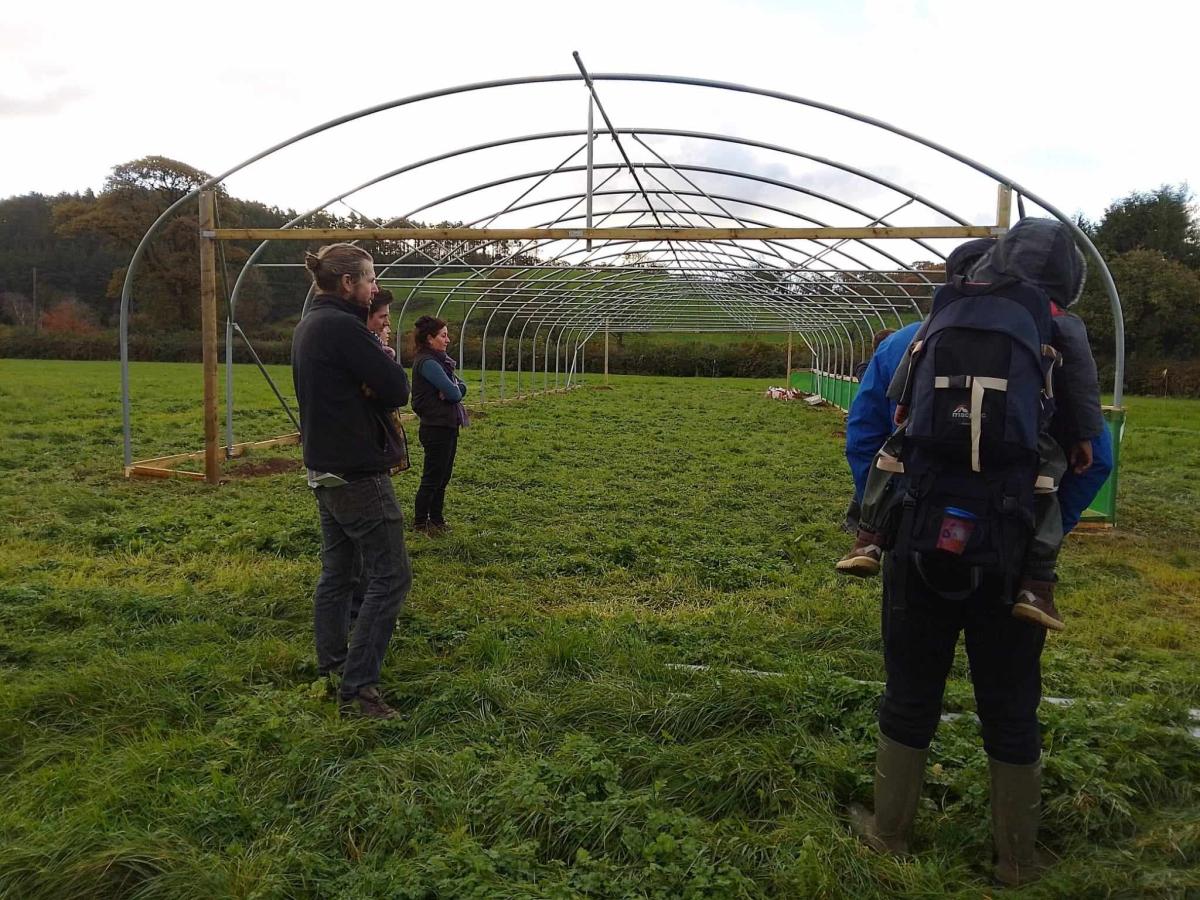
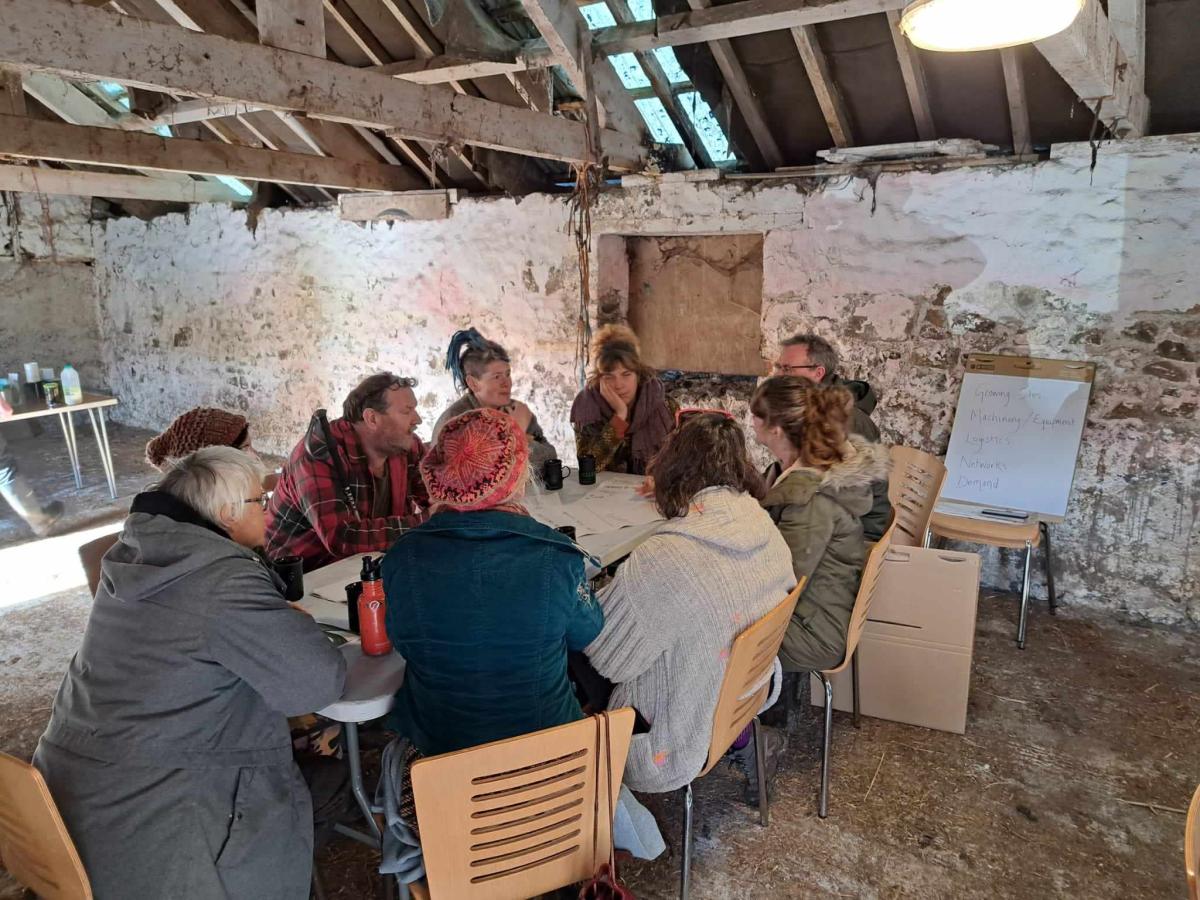
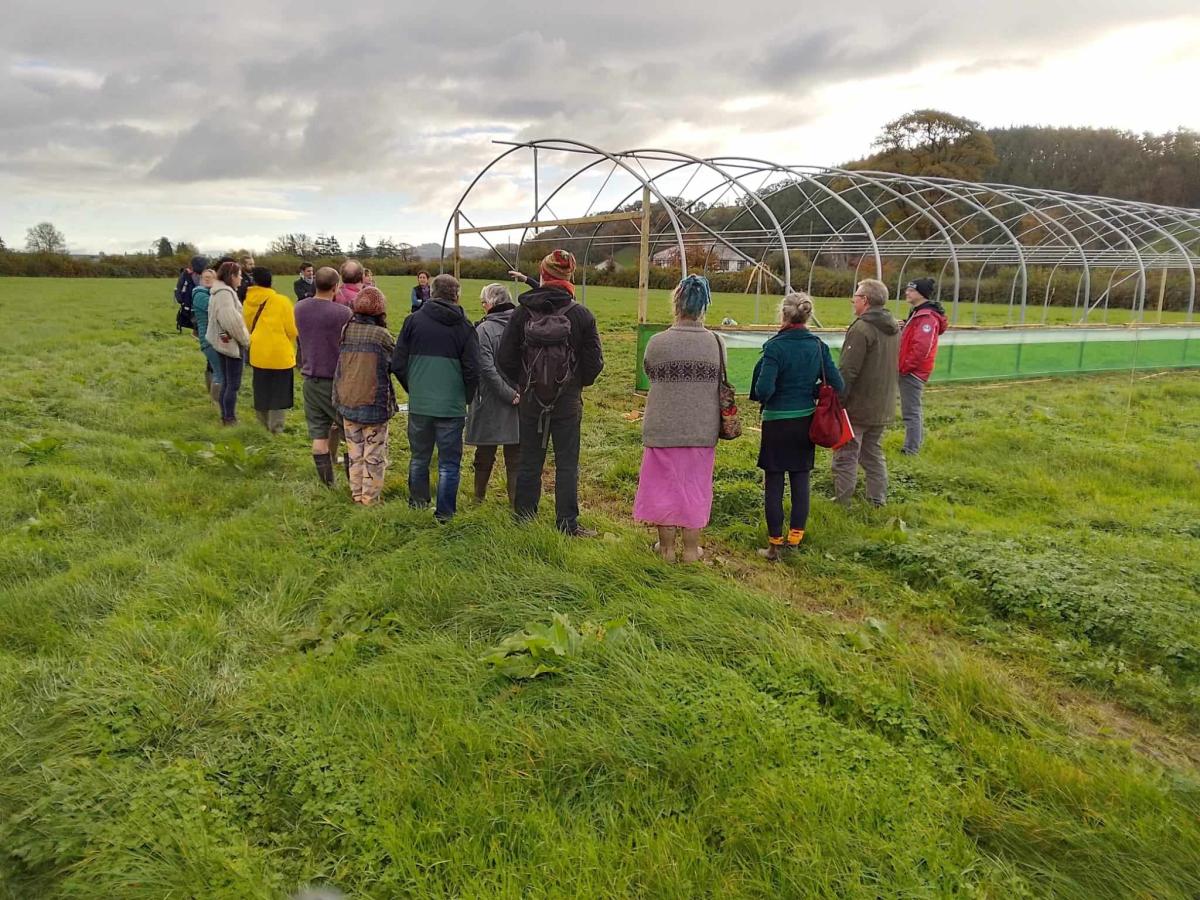
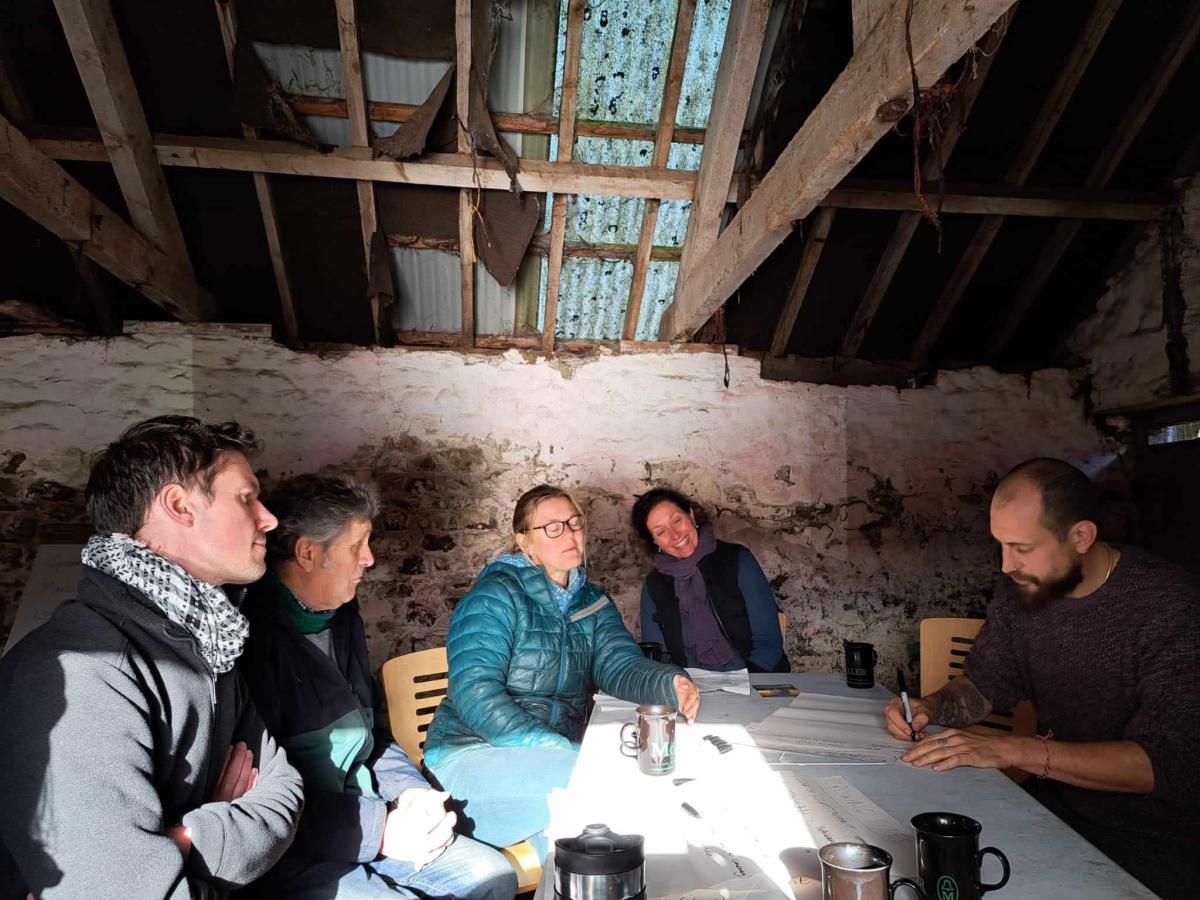
New Wales project mobilising individuals for climate action
Camau Gwyrdd is a new three year Wales project funded by the National Lottery Community Fund and aims to remove barriers to tackling climate change through inspiring and empowering individuals and their communities to take their first steps towards climate action.
How is it going to work?
Exemplar organisations drawn from our membership will be our ‘Champions’. Our staff team will work to upskill and strengthen these Champions to better equip them to reach out and welcome others to visit and learn from their project successes, and struggles. This will include supporting them to reduce their own carbon footprint.
We will pair our Champion sites with individuals, groups and communities who either have no track record of climate or sustainability action or who have some knowledge but don’t know how or where to get started.
This will be achieved through three delivery streams:
Grow Local
Grow local will encourage and inspire communities to get growing, whether at home, joining an existing community garden, or setting up a new group in their own community. We will support our Community Garden ‘Grow Local Champions’ throughout Wales to offer varied and fun events to engage with people who have not thought about climate action, or maybe they are doing it but they don’t realise!
Carbon Local
Carbon Local Champions will provide more in-depth skills sharing, workshops and knowledge transfer to individuals and small groups who are taking first steps towards a lower carbon lifestyle.
Buy and Eat Local
Buy Local Champions are community food growing enterprises who will be supported to reach further, promoting interest in local food (and the benefits), making it accessible for all and encouraging involvement through volunteering. Events will provide first hand experiences of these food growing sites, whilst marketing campaigns will seek to change mindsets and raise awareness of the differences that buying (and eating) locally make to being more sustainable in terms of carbon footprint
We are particularly keen to welcome more men (young, old and veterans), low-income households, Welsh speakers, people who are not actively engaged in any outdoor social activity and people with low educational attainment, into community growing spaces.
Camau Gwyrdd will be starting in January 2024.To find out more about the project and how you can get involved, please contact: [email protected]
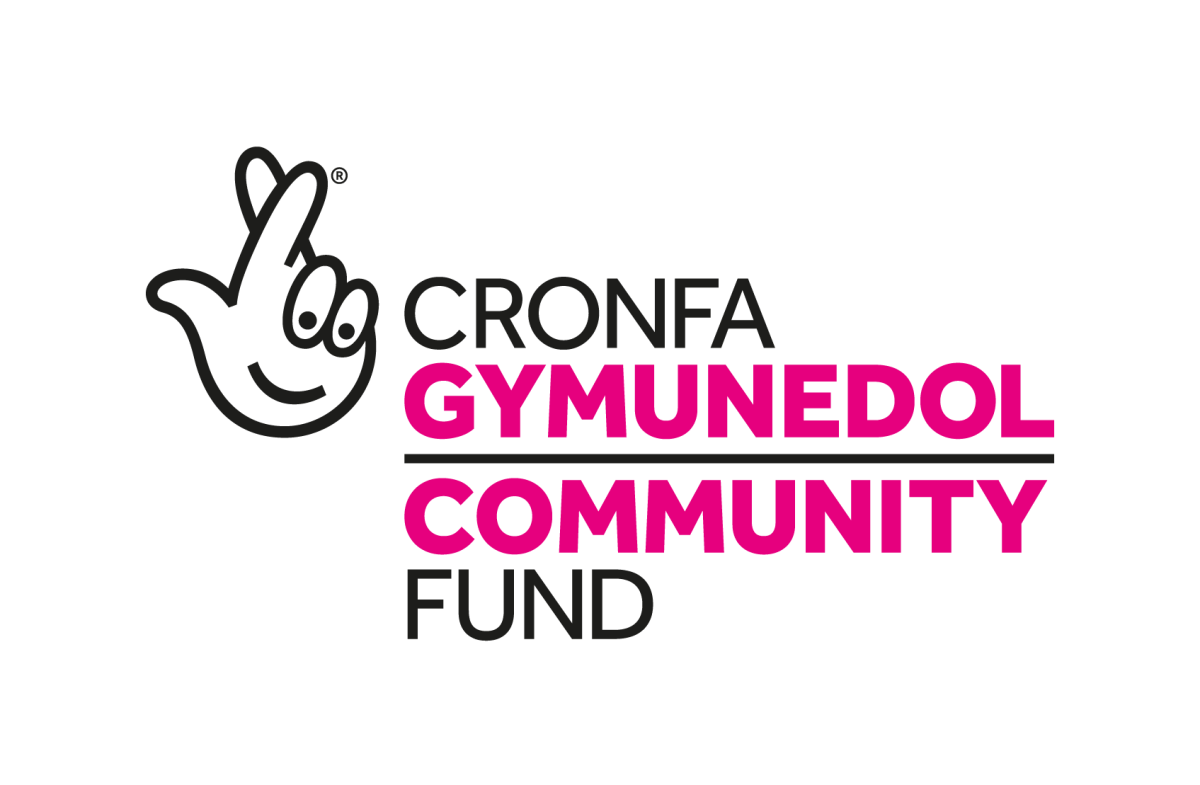
HelloFresh empowers SF&G members with grants for growing initiatives
For the second year running, we’re partnering with HelloFresh (recipe box extraordinaires) to support SF&G members in running activities to educate consumers about food and encourage more sustainable habits. This year, there is a particular focus on families and children. HelloFresh has put together a toolkit named the Curr-EAT-ulum Garden Syllabus aimed at parents and schools, which can be downloaded here.
The toolkit provides easy-to-access activities for little ones to start thinking more sustainably about their food habits and some helpful tips for a simple approach to composting. We are thrilled to have low-waste chef Max La Manna on board with the project and help us deliver this important message.
In September, we awarded four community projects in gardens across the UK in London, Birmingham, Sheffield, and Edinburgh with grants to enable these activities. See what happened when Max visited St. Raphael’s community garden.
Find out more about the gardens taking part below:
St Raphaels Edible Gardens – London
Sufra NW London works on the front lines in the fight against hunger and poverty while also offering a wide range of services and community-based activities that empower individuals and families to overcome impoverishment and social isolation. Their community garden, St Raphaels Edible Garden, provides a therapeutic space that invests in the skills, health, and wellbeing of local people while improving the appearance of the estate and giving residents an opportunity to come together, have fun, and grow food.
Cyrenians Community Garden – Scotland
Cyrenians Community Garden offers hospital patients, staff, and visitors, as well as local residents, the chance to take part in gardening, landscaping, food growing and therapeutic learning programmes. Their vision is to create a space for communities to grow together, with a particular focus on creating a space that is inclusive for those who might face barriers to being involved in such activities due to a range of complex needs.
Sage – Sheffield Sage Sheffield runs therapeutic horticulture groups on their allotment. This is a space for those struggling with their mental health to meet, make friends, garden, and cook together. Their site spans three allotment plots where they have raised beds for members to plan and plant their own garden, sit quietly, or chat with friends.
Balsall Heath City Farm – Birmingham
Balsall Heath City Farm offers educational and recreational opportunities on their farm. The farm grows fruit, vegetables, and flowers and has a small nature pond. They also have fruit trees, are developing a community gardening project, and are starting a compost scheme that aims to teach people how to compost and reduce their food waste.
Many thanks to HelloFresh for partnering with us in our mission to support local communities to grow, cook, and eat together. We can’t wait to see these exciting projects come to life!
London green spaces unite for 25th annual Harvest Festival
The 25th annual London Harvest festival took place on Saturday September 16th, knitting together London’s city farms and community gardens, and the staff and volunteers who make these sites so special. Our own Richard Choksey took part in the day as one of the judges on the panel. Participants competed in the animal show and the horticulture and home produce show with categories such as ‘best display of seasonal produce’, best ‘pollinator friendly plant’ and ‘best jar of honey’. There was a bumper crop of competitors this year with 9 farms and gardens taking part.
The festival was held at the Lambourne End Centre for Outdoor Learning whose site catered for attendants to try their hand at a variety of activities such as archery, blacksmiths and tug of war. It was a wonderful chance for like-minded organisations to meet one another, connect and celebrate their work.


Kentish Town city farm won the blacksmiths prize for their 25th anniversary plant sculpture. The prize was a uniquely handcrafted plaque made on-site during the day by Urban Crafts Foundation, with help from volunteers. Surrey Docks farm won the animal show, their team of young farmers gained 1st place in the goat, lamb and guinea pig classes, as well as 1st for rare breed with their Oxford Down sheep and 1st for their 17 year old pony Kiera in the veteran class. Lambourne End and Wellgate community farm also won several animal categories. It was a joy to see such commitment of care from the groups involved towards their livestock. The full list of winners can be seen here.
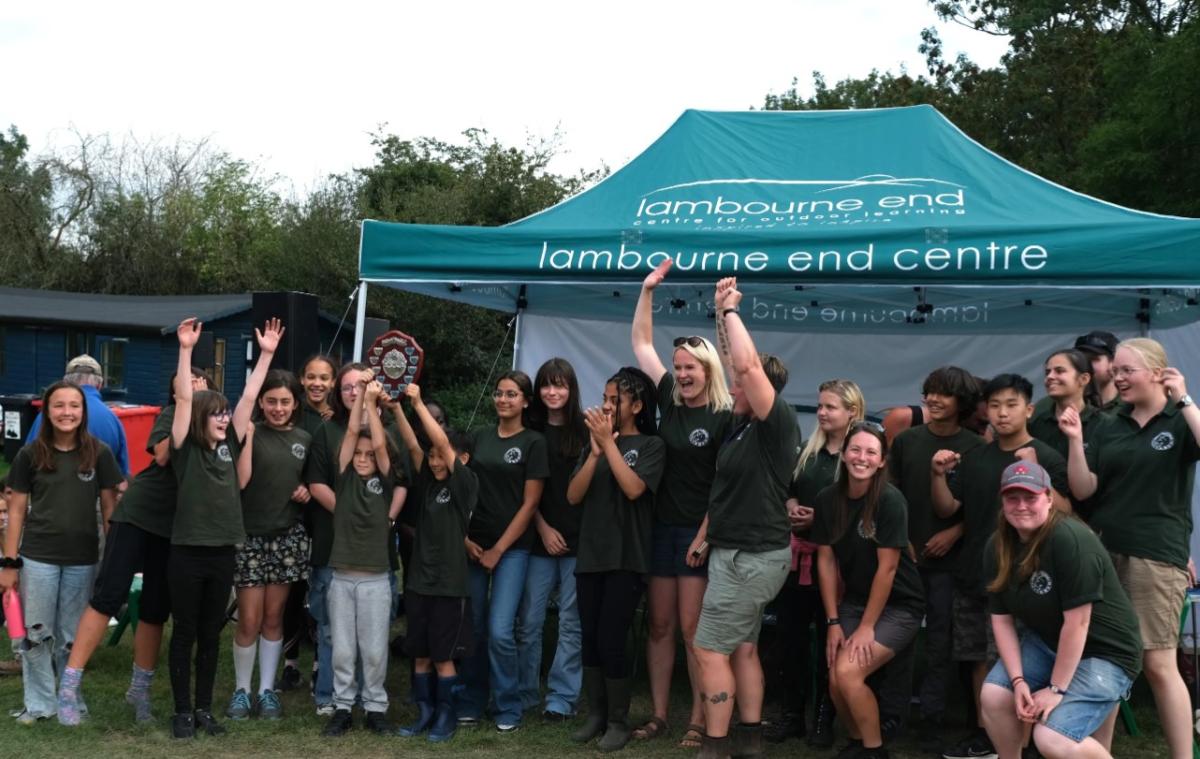
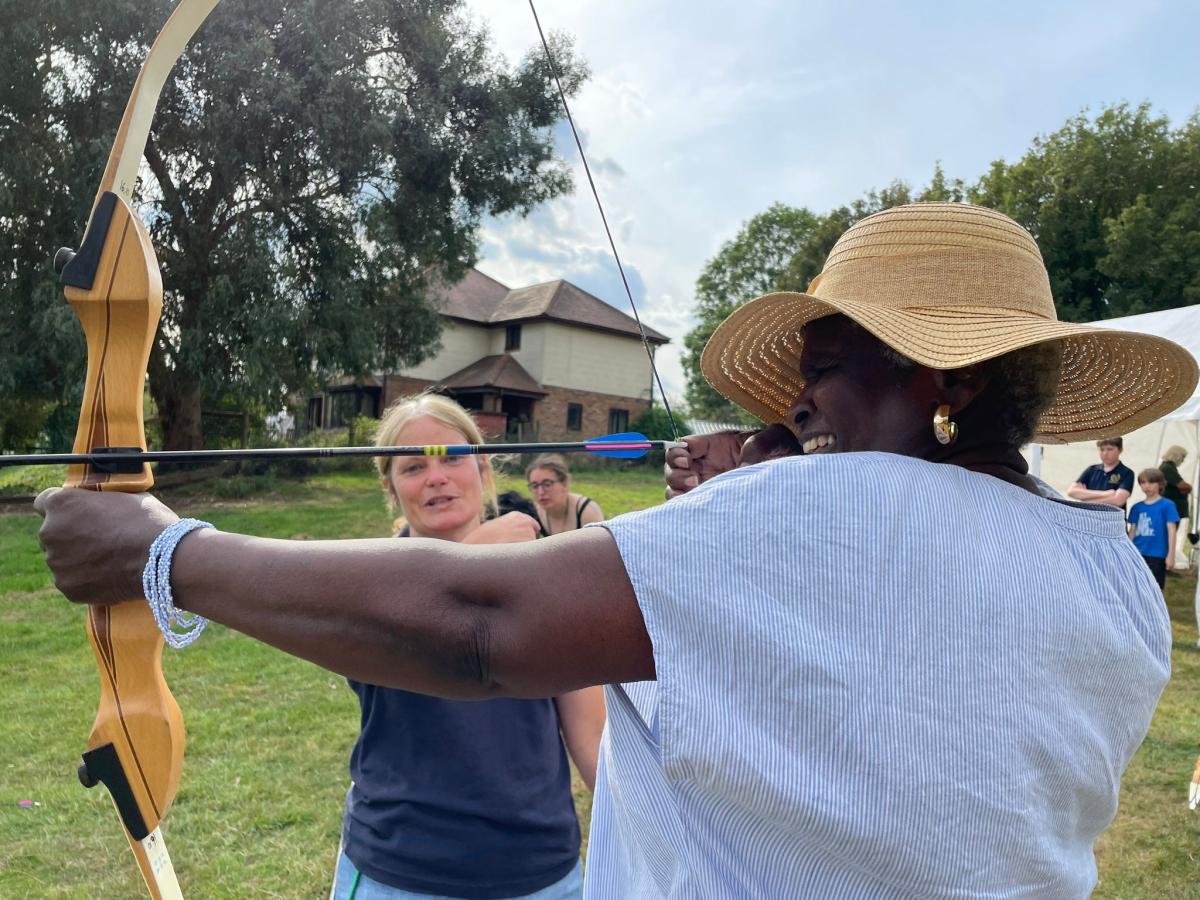
The event is part of the Urban Harvest fortnight of events in London which celebrates growing in the city, including London in Bloom, Capital Growth's food growing gathering and more. The London Harvest Festival is completely volunteer-led and overseen by the London Association who are a group of dedicated trustees. Next year’s festival will be open to anyone who’d like to attend. We would love to see 2024’s festival even bigger with more people joining in. You can take part however big or small as you feel able. For more information on how you can get involved, contact; [email protected].
Understanding dementia to make green spaces more accessible
Did you know that dementia doesn't necessarily only affect memory?
Dementia can bring a whole host of sensory changes that may affect how a person experiences the environment around them, and this can significantly affect their experience of nature and green spaces.
SF&G's partnership with Dementia Adventure can help you understand what adaptations we can make, including to our site design or engagement sessions, when working together in an outdoor environment, to help our spaces and events be more accessible to people living with dementia.
If you're interested in how to make your site easier to visit for people like Lorraine in the video below, then our workshop on October 12th, 2 - 4pm, could be great for you.
The workshop will:
- Discuss how dementia affects sensory perception, and how this can change the way a person experiences a space.
- Explore barriers to accessibility.
- Identify what design decisions and adaptations we can make to help our spaces be more accessible.
- Explore ways we can make our sessions more inclusive.
- Explore case studies and examples, and hear from people living with dementia about how they experience green spaces.
This session is suitable for anyone working or volunteering in an outdoor community setting who is interested in learning more about working with people living with dementia and their carers. There will be ample time for questions and discussion from your own setting.
The workshop is priced at £35 for SF&G members, or £42 for non-members.
SF&G joins 1% for the Planet
We are pleased to announce SF&G has joined 1% for the Planet as an environmental partner!
1% for the Planet is a global network with thousands of businesses and environmental organisations working together to support people and the planet. Started in 2002 by Yvon Chouinard, founder of Patagonia, and Craig Mathews, founder of Blue Ribbon Flies, their members have given hundreds of millions of dollars to environmental partners to date.
Through 1% for the Planet, businesses around the world commit to donating at least 1% of their annual sales to organisations who are working for the benefit of people and the environment, with missions that span across a wide range of impacts, from ensuring vulnerable communities have rights to land to reducing the environmental impact of cities.
1% for the Planet seeks non-profit partners that are tackling six big environmental issues: climate, food, land, wildlife, water, and pollution. SF&G was proposed as a partner by Susie Hewson MBE, Founder and Director of Natracare following our recent partnership with them, and Natracare have also become our first 1% supporter by making a generous donation towards our work – thanks Susie!
Organisations who are already signed up to donate their 1% can now support SF&G in this way and view our profile page.
“The intent of 1% for the Planet is to help fund these diverse environmental organizations so that collectively they can be a more powerful source in solving the world’s problems”
Yvon Chouinard, co-founder of 1% for the Planet.
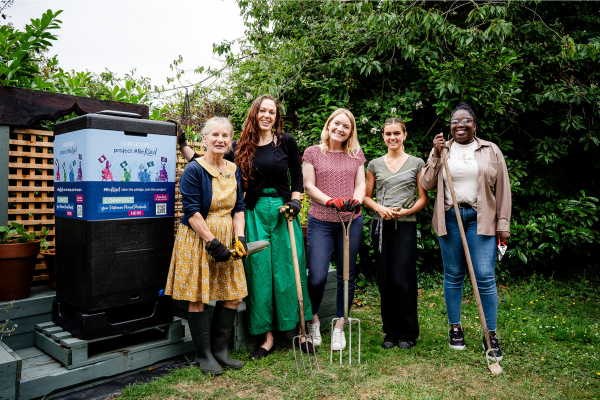
Natracare's Susie Hewson MBE and staff with Sophie Antonelli from SF&G in the garden at Natracare HQ.
Green social prescribing could save NHS millions
Last week The Wildlife Trusts published a new report A Natural Health Service: Improving Lives and Saving Money which shows that green prescribing can save more in healthcare costs than the price of running a ‘green prescribing’ scheme.
SF&G members, and in particular Green Care Quality Mark holders, will be familiar with the numerous physical and mental health benefits that spending time outdoors and with community can bring. This new study shows that if green social prescribing initiatives were more widely adopted throughout the UK, the cost of the initiative would be more than offset by the significant savings made in reduced reliance on NHS services.
Social Farms & Gardens supports The Wildlife Trust's call for the UK Government to increase access to green social prescribing projects by:
-
Integrating green prescribing into community health and social care services everywhere.
-
Encouraging shared investment from Government departments working on housing, employment, community cohesion, transport and culture.
-
Providing support to help strengthen partnerships between local healthcare services and community-rooted organisations.
If programmes like those described in this research were made available to more people in more places, they could help prevent unnecessary ill-health and reduce the number of people requiring NHS services. This ‘Natural Health Service’ alongside the creation of natural spaces in communities across the country will result in healthy and sustainable places to live and work.
Professor Sir Michael Marmot
The new research looked at five Wildlife Trusts programmes which resulted in estimated annual costs savings using cost : benefit analysis.
- Wild at Heart by Sheffield and Rotherham Wildlife Trust is a social group that runs nature-based activities and helps people learn new skills. Analysis found healthcare cost savings of £38,646 of 82 participants over a year. For every £1 invested, there is£1.19 of additional benefit in terms of reduced costs to the NHS.
- MyPlace by Lancashire Wildlife Trust helps people improve mental and physical health. Analysis found healthcare cost savings of £7,024 and reduced employment-related costs due to mental health of £28,442. For every £1 invested, there is £2.16 of additional benefit in terms of reduced costs to the NHS.
- Feed the Birds by Shropshire Wildlife Trust addresses social isolation and loneliness by linking individuals with volunteers who help them feed birds. Analysis found healthcare cost savings of £15,460 per year of 57 people. For every £1 invested, there is £0.40 of additional benefit in terms of reduced costs to the NHS. Assuming all participants were fully engaged over the full 31-month duration, the accumulated benefits over this period are much higher, at around £102,440.
- Nature for Health in Greater Manchester is part-run by Lancashire Wildlife Trust and harnesses the power of nature to improve mental health. Analysis found healthcare cost savings of £44,745. For every £1 invested, there is £0.18 – £0.93 of additional benefit in terms of reduced costs to the NHS.
- Wild Health by Gwent Wildlife Trust provides opportunities for recreational, social, and work-based outdoor activities that benefit physical and emotional well-being. Analysis found healthcare cost savings of £66,882, equating to £471 saving per participant. For every £1 invested, there is £0.58 – £1.10 of additional benefit in terms of reduced costs to the NHS.
This new research proves the immense value of nature-based projects for improving individual health and helping to ease the burden on the NHS. Nature is an essential part of health and social care, but we are not maximising that potential. Green prescribing works and the more we can develop these kinds of programmes, the greater the benefit to society.
Dom Higgins, Head of Health and Education. The Wildlife Trusts
Natracare partners announced
Social Farms & Gardens have teamed up with Natracare, creator of compostable disposable period products, on a new composting partnership that will see Natracare provide hot composting bins to four SF&G women-led members as a pilot scheme in which they will compost garden and food waste, as well as used Natracare period products – the only validated compostable, global brand of disposable period products.
Throughout the ongoing partnership, each group will manage and maintain the hot composting process and monitor the progress of the composting, sharing their progress on their social channels. They will also share the value of community composting, and the benefits that composting period products has for the environment, using the Natracare Composting Guide.
Hot composting generally takes around six to eight weeks to turn green and brown waste into compost that is ready to use on the garden; Natracare period pads take approximately 90 days to decompose, while Natracare tampons take around four weeks to decompose.
Natracare products are designed to have minimal environmental impact in their making, and after use, to be disposed as part of bio-recycling systems, not into landfill. They have been independently tested to EN13432/ASTM D6400 and proven compostable in managed industrial hot composting systems. They are free of heavy metals and other pollutants, and pass Ecotoxicity testing, so that the material produced from them when composted, can be used as a mulch to improve soil, or as a medium to grow fruit and veg.
The community gardens taking part in the pilot are:
- Redcatch Community Garden (Bristol)
- North Wingfield Community Garden (Derbyshire)
- Global Gardens Project (Cowbridge, Wales)
- Transition North Ronaldsay (Orkney Isles)
The Social Farms & Gardens partnership is the latest initiative in Natracare’s recently launched Project #BeKind campaign, designed to draw attention to the need to design health and well-being products for bio-loop systems, and to consider the impacts on wellbeing and our environment, of consumer choices.
Susie Hewson, founder of Natracare, commented: “We’re leading the way in proving that there is a better alternative to plastic-based period products, with our products being made from sustainable sourced, organic and bio-based materials, which also happen to be ideal raw materials for composting. The ultimate aim is to stop compostable product going into landfill. Our goal is to help more communities adopt greener habits and to help people understand the benefits of composting as a way to recycle. We have found a natural synergy with Social Farms & Gardens, whose mission, like ours, is to improve the health and wellbeing of individuals, communities, and the environment, through nature-based activities, so we’re really pleased to be running the pilot scheme with them and can’t wait to see the results.”
Sophie Antonelli from Social Farms & Gardens said: “We have almost 3,000 members all over the UK who care passionately about their local community and environment. Compostable period products are another step towards the closed-loop systems our planet needs, and we’re thrilled that through this partnership with Natracare our members can be a part of that. Many community gardens already have composting toilets, so this pilot feels like the next logical step. The hot bins are going to be such an interesting talking point in the gardens and I’m really looking forward to seeing how they get on”
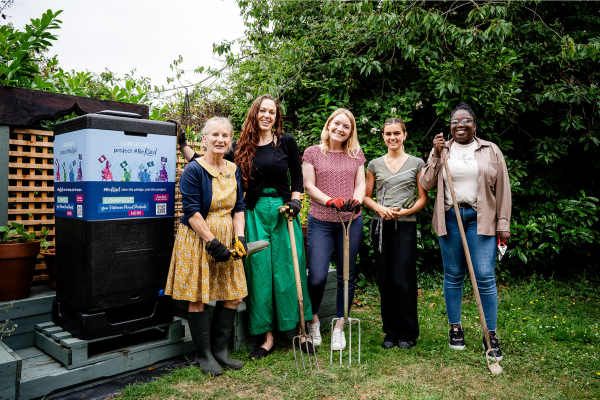
SF&G's Sophie Antonelli meets Natracare Founder and Director Susie Hewson MBE and some of the team.
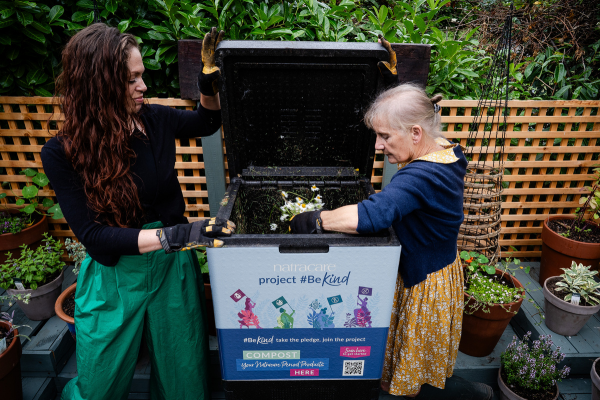
Sophie and Susie inspect the new hot composting bins.
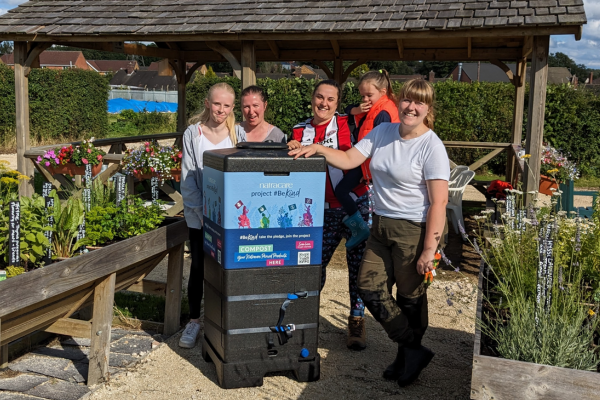
The team at North Wingfield Community Garden receive their new hot bin.
Educational farms celebrated at the school farms conference 2023
This month saw the School Farms Network host their fifth annual School Farms Conference, bringing together leading practitioners in educational farming environments from across the UK. Hosted by by Liam Dowsan from the Royal Agricultural University, the event took place at its Cirencester campus. Liam acknowledged the efforts of all the participants involved;
Thanks to all the schools, farms and students who produced inspirational submissions clearly demonstrating the enormous benefits that educational farms offer. It is so encouraging to see the clear commitment and ingenuity demonstrated by schools, also demonstrating the wide variety of resources and their uses depending on the school setting, students and commitment of teachers.
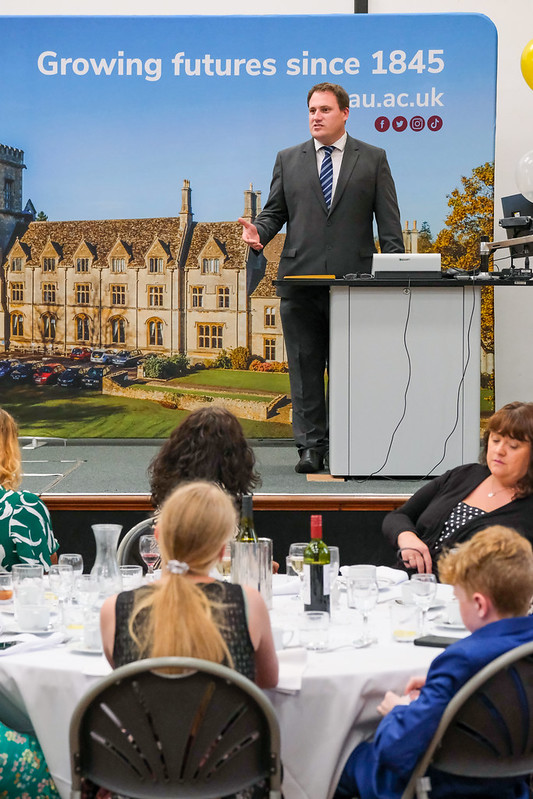
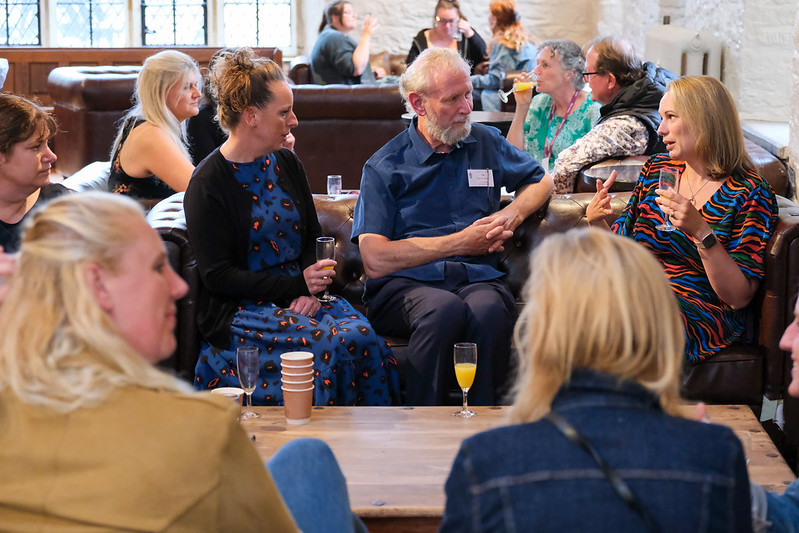
The conference took place over two days, with an evening of awards and celebrations in between. The theme of this years event was 'Why educational farms are more vital than ever', an emotive theme which addressed topics including school farms as sites for learning, composting in schools, building land-based careers and education pathways to university and using the farm across the curriculum. The event promoted interest in land-based education through keynote presentations, breakout sessions and practitioner-focused sharing and practical workshops.
Social Farms and Gardens sponsored the 'most inspirational farm or garden 2023' award which was presented to Llanishen Fach Primary School. The school created an outdoor learning team to fill the gap in the National Curriculum provision, and engaged a group of 50 family volunteers to help rear chickens and support the learning with older pupils help the younger ones to care for the chickens. This year there were five categories of awards, with in some cases, separate awards for Primary, Secondary, SEN and further/higher education providers. Winners were presented with engraved wooden plaques, and all student entries received certificates. Thank you to everyone involved for a wonderful weekend.
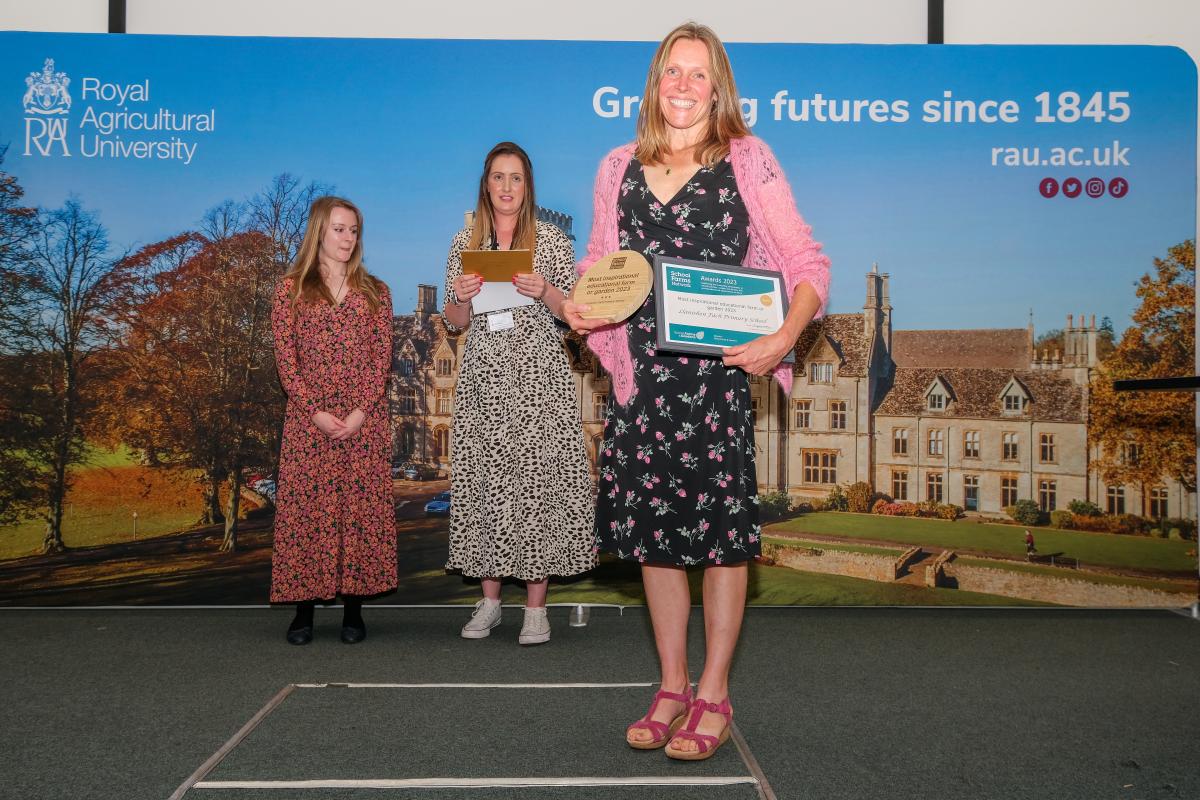
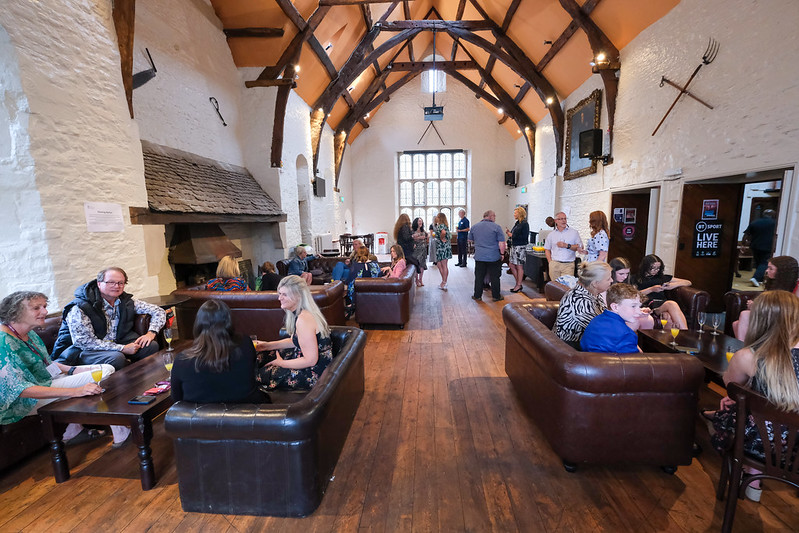
This years successful winners are
- Student of the year - Ella Rose Mitchinson, Woodchurch High School, Wirral
- Farm of garden leader of the year - Fiona Stanley, Brymore Academy, Bridgwater
- Best innovative farm or garden-based curriculum 2023 - Winner (Secondary); Ramsey Grammar School, Isle of Man
Winner (SEN); Woodfield School/Pages Care Farm, Kingsbury
Winner (Higher): Hopwood Hall, Middleton - Best student-led sustainable practices 2023; Brockhill Park Performing Arts College, Hythe
- Most inspirational educational farm or garden 2023; Winner; Llanishen Fach Primary School, Cardiff
Winner (SEN): Abbey Court School, Rochester - Best Educational Farm Project 2023: Abbey Court School, Rochester
2023 summer grants for children's outdoor activities awarded
We are delighted to be partnering once again with The Hilden Charitable Fund to enable more children to get outdoors and enjoy nature together.
In 2022, this collaboration enabled us to support 25 groups with grants of £1,500 each through our Children’s Summer Activity Grant. The activities exceeded our expectations, providing around 314 sessions over the summer to more than 3,000 participants of children and their families. The types of activities varied widely, from drop-in craft and wildlife sessions and family activity days to intensive 6-week programmes for specific young people who would not have otherwise been able to attend.
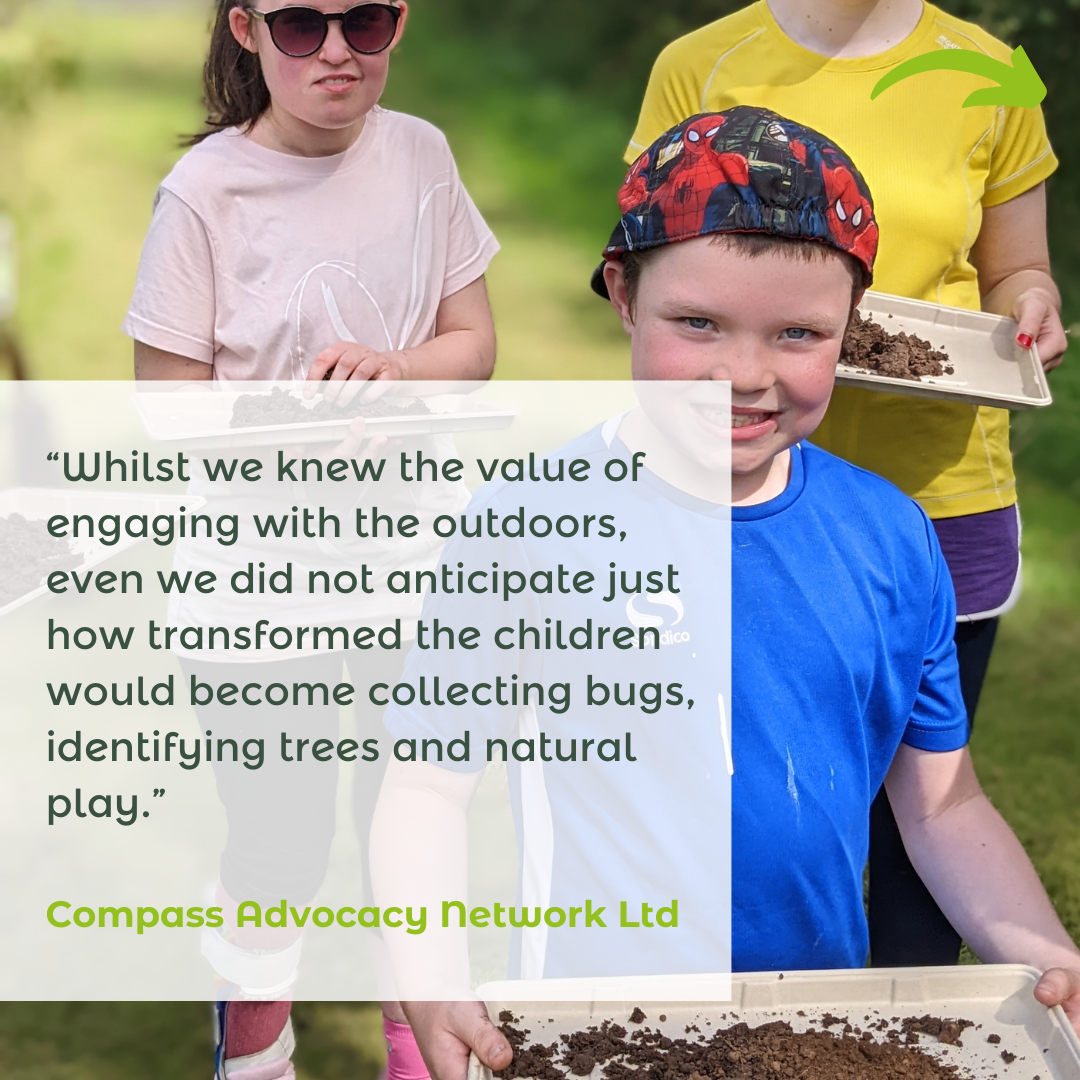

This year we are thrilled to award £36,000 in Children’s Summer Activity Grants of up to £1,500 each to 26 of our members across the UK supporting their work this July and August 2023.
Thank you to everyone who submitted applications, and a huge congratulations to the following SF&G members receiving funding this summer:
- Kentish Town City Farm
- Arkwright Meadows Community Gardens
- Arbor Projects
- Bluegreencymru
- Compass Advocacy Network (CAN)
- Helping Hooves Derbyshire CIC
- Shettleston Community Growing Project
- Boost Felixstowe Ltd
- Clynfyw CIC Care Farm
- Green Squirrel CIC
- Resource Denbighshire CIC
- Sufra NW London
- West End Women and Girls Centre
- Heeley City Farm
- Henbant Permaculture Farm
- Freightliners City Farm
- Holywood Shared Town/Holywood Men's Shed
- Andover Trees United
- KILCOOLEY WOMENS CENTRE
- Gardd Enfys
- Hereford Community Farm CIC
- Snowdonia Donkeys
- Global Gardens Project
- Sunflower support Ni
- Liberty Consortium /The Playtrail
- Cultivate (Cwm Harry) Cyfyngedig
SF&G speak out on urban access to food production at the House of Lords
It's not everyday you get invited to speak at the House of Lords. SF&G were honoured to be part of the Horticultural Sector Committee last week. Patricia Wallace, our Northern Ireland manager spoke in a debate on food production and greening our cities. Patricia provided evidence on the importance of providing green spaces within close access to housing, and the positive impacts it has on both individuals and communities.
‘’When you are thinking about urban horticulture, you must think close to where people live. Especially in areas of deprivation where you maybe don't have gardens and you don't have cars. These spaces have to be close to where people live, they have to be behind their houses, at the end of the street, within walking distance, a 20 minute community.’’ Patricia Wallace.
The evidence comes from a recent Benchmark report SF&G produced earlier this year on proposed policy in NI to support community growing. Read the full report here.
Joining her on the panel was Judy Ling CBE, honorary president of the Black Environment Network, and Wayne Grills, Chief Executive of the British Association of Landscape Industries (BALI).
Watch Patricia from 11:34; https://parliamentlive.tv/event/index/7b0a0303-d020-4576-94ec-887cf231f1...
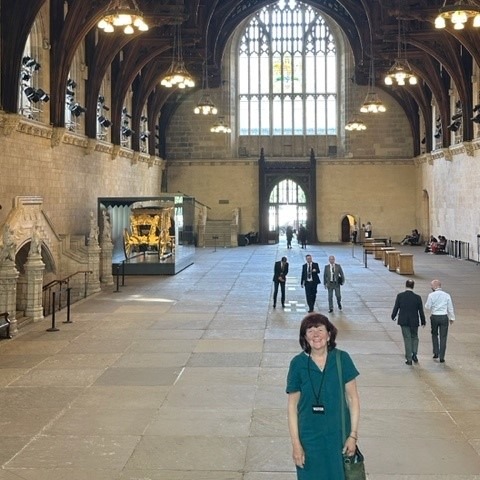

Patricia said of the event; ‘’I was so pleased to be able to contribute on behalf of Social Farms & Gardens and our members across the UK.‘’
After our discussion the committee then requested copies of our Benchmark Land Report, as well as copies of the Welsh Government’s Green Infrastructure Handbook and the Scottish Government’s indicator for access to green and blue spaces and studies on the productivity of allotments and community gardens in comparison to open field growing.
If you would like to help us make progress with the recommendations on NI policy, please get in touch with [email protected].
Advocating for better food on the public plate
Social Farms & Gardens with partners working across the food system in Wales are delighted to launch our report “THE ROLE OF PUBLIC PROCUREMENT IN TRANSFORMING WALES’ FOOD SYSTEM”.
Working with Open Food Network, Cultivate, Development Trusts Association Wales and Foothold Cymru, Social Farms & Gardens have been leading a pilot to demonstrate that the public sector CAN procure efficiently from local producers using methods that benefit the natural environment and local prosperity.
Collaborating with Sustainable Food Places Officers in Carmarthenshire and North Powys, two community-anchored “Procurement Food Hubs” have been working with local, small-scale growers to aggregate produce and supply the public sector with fruit and veg that meets its requirements in terms of ease, cost and sustainability.
Using findings from the pilot, this briefing makes a series of recommendations to stakeholders across the food system that could support increased supply and demand of local, agroecological produce onto the public plate.
Please read the full report here ENGLISH / WELSH.
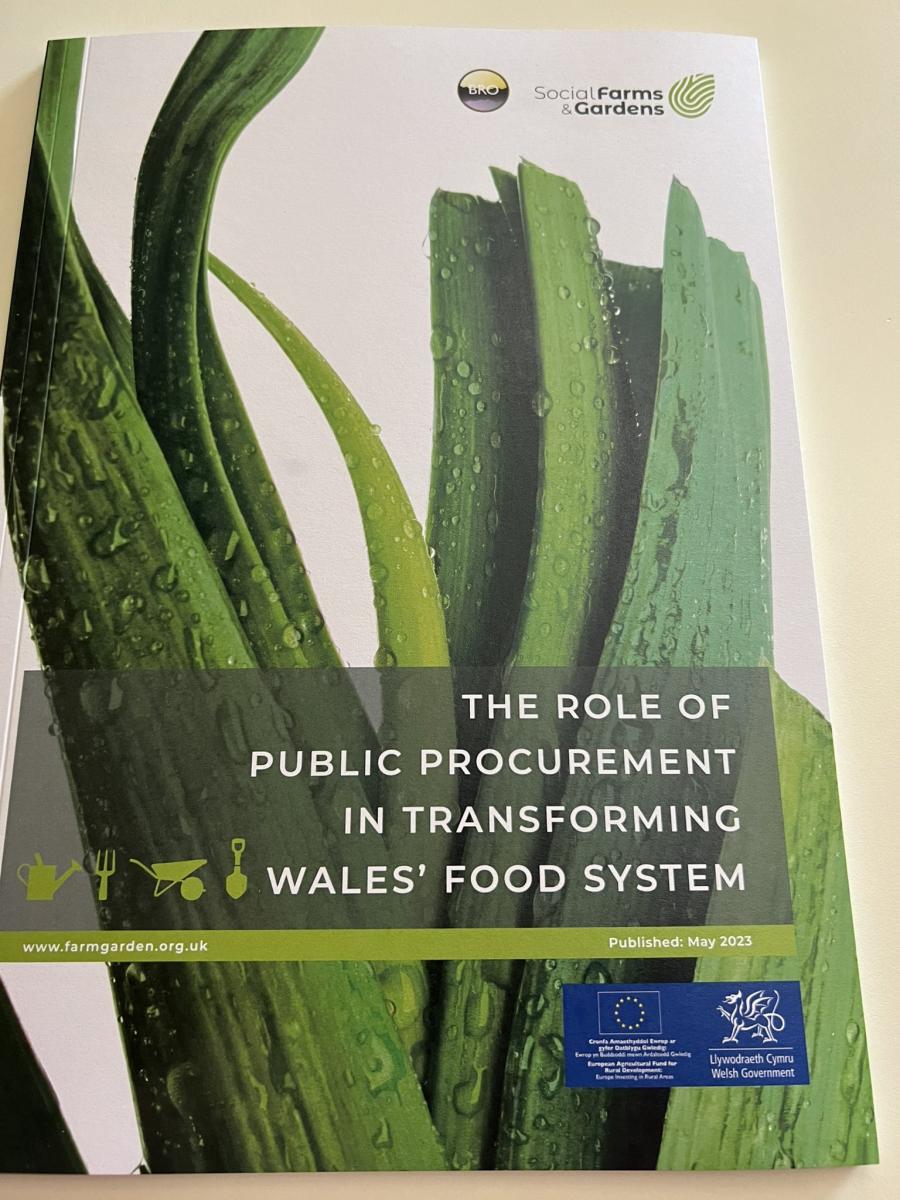
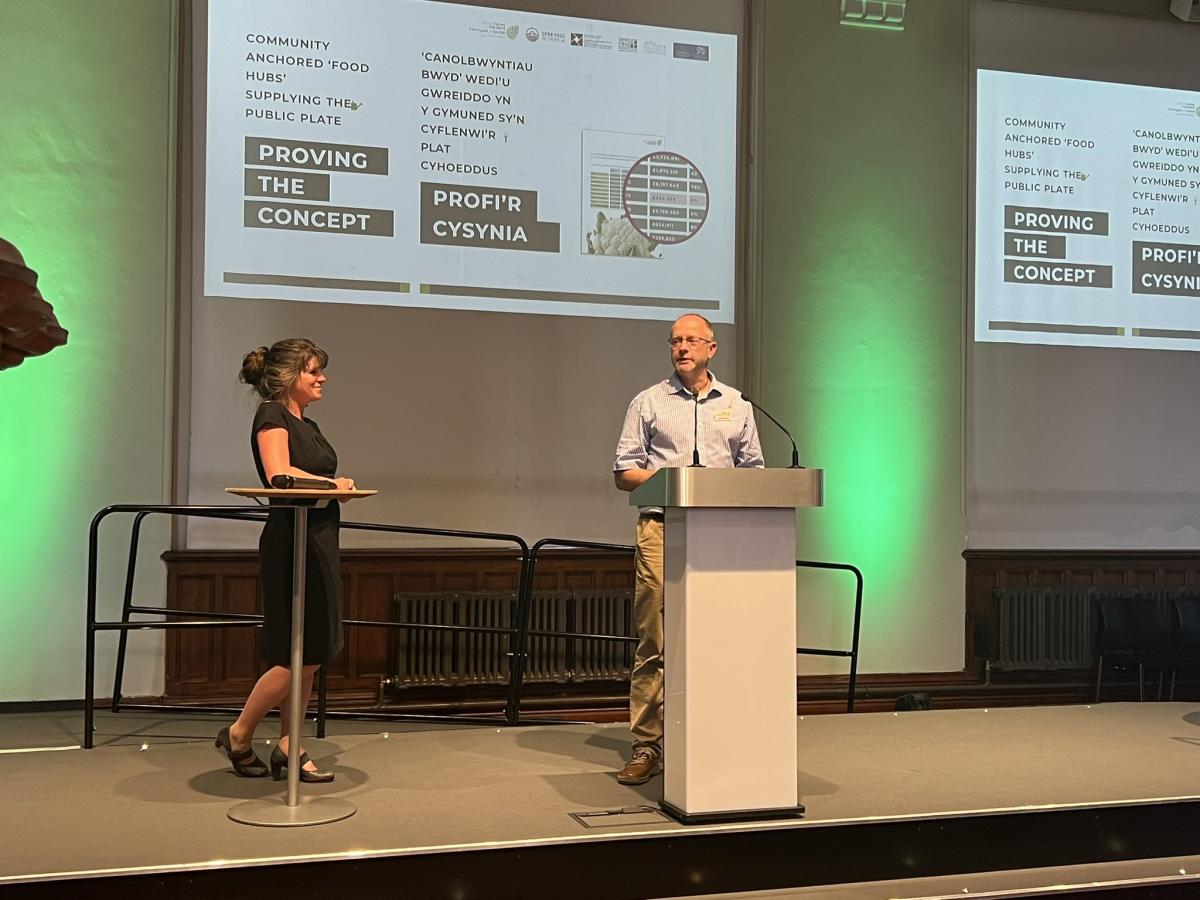
A range of resources will shortly be available on our website [https://www.farmgarden.org.uk/sustainable-food-procurement-hubs] to support organisations, community businesses and growers interested in using a food hub model to facilitate short supply chains to the public plate with fresh, local fruit and vegetables.
The report will be launched at the Senedd on 8th June 2023 at our WELSH FUTURE FOOD showcase in partnership with Menter Môn and PLANED.
For further information, please contact [email protected]
Eiriol dros well bwyd ar y plât cyhoeddus
Mae Ffermydd a Gerddi Cymdeithasol ynghyd â phartneriaid sy'n gweithio ar draws y system fwyd yng Nghymru yn falch iawn o lansio ein hadroddiad “Rôl caffael cyhoeddus wrth drawsnewid y system fwyd yng Nghymru ”.
Gan weithio gyda Open Food Network, Cultivate, Cymdeithas Ymddiriedolaethau Datblygu Cymru a Foothold Cymru, mae Ffermydd a Gerddi Cymdeithasol wedi bod yn arwain peilot i ddangos y gall y sector cyhoeddus gaffael yn effeithlon gan gynhyrchwyr lleol gan ddefnyddio dulliau sydd o fudd i'r amgylchedd naturiol a ffyniant lleol.
Gan gydweithio â Swyddogion Lleoedd Bwyd Cynaliadwy yn Sir Gaerfyrddin a Gogledd Powys, mae dau “Hwb Caffael Bwyd” cymunedol wedi bod yn gweithio gyda thyfwyr lleol ar raddfa fach i gydgasglu cynhyrchu a chyflenwi'r sector cyhoeddus â ffrwythau a llysiau sy'n bodloni gofynion o ran rhwyddineb, cost a chynaliadwyedd.
Gan ddefnyddio canfyddiadau'r peilot, mae'r briff hwn yn gwneud cyfres o argymhellion i randdeiliaid ar draws y system fwyd a allai gefnogi cynnydd yn y cyflenwad a'r galw am gynnyrch agroecolegol lleol ar y plât cyhoeddus.
Darllenwch yr adroddiad llawn yma SAESNEG / CYMRAEG.


Bydd amrywiaeth o adnoddau ar gael yn fuan ar ein gwefan [https://www.farmgarden.org.uk/sustainable-food-procurement-hubs] i gefnogi sefydliadau, busnesau cymunedol a thyfwyr sydd â diddordeb mewn defnyddio model hwb bwyd i hwyluso cadwyni cyflenwi byr i'r plât cyhoeddus gyda ffrwythau a llysiau ffres, lleol.
Bydd yr adroddiad yn cael ei lansio yn y Senedd ar 8 Mehefin 2023 yn ein harddangosfa BWYD Y DYFODOL YNG NGHYMRU mewn partneriaeth â Menter Môn a PLANED.
Am ragor o wybodaeth, cysylltwch â [email protected]
This project has received funding through the Welsh Government Rural Communities - Rural Development Programme 2014-2020, which is funded by the European Agricultural Fund for Rural Development and the Welsh Government to pilot two new procurement food hubs in Carmarthenshire and North Powys.
Mae’r prosiect hwn wedi derbyn cyllid trwy gronfa Cymunedau Gwledig Llywodraeth Cymru – Rhaglen Datblygu Gwledig 2014-2020, sy’n cael ei gyllido gan Gronfa Amaethyddol Ewrop ar gyfer Datblygu Gwledig a Llywodraeth Cymru i gynnal peilot ar gyfer dau hyb caffael bwyd newydd yn Sir Gâr a Gogledd Powys.

The future of community growing in Northern Ireland
This work has been completed over the last 2 years in association and with input from local council officers in the 11 Councils in NI. The Report recommends that Councils in NI adopt a target level of provision of 1250 sqm (0.3 acres) per 1,000 households of community growing space in their Council area. This could be in the form of allotments, community gardens or community orchards.
This is a really important report for people and places in Northern Ireland. The report’s recommendations could help us all in the UK see what a step change in engaging people in their own well-being looks like. Fantastic piece of work.
Pam Warhurst CBE, Founder of Incredible Edible
There are a number of opportunities on the near horizon to influence policy in Northern Ireland to include more provision for community growing. Local Councils are drawing up on corporate plans and consulting on Community Plans and Local Development Plans (LDPs). The sectoral plans which will lay out the implementation of our Climate Bill are currently being drafted. Local council elections will be happening mid-May, and there may be Stormont Elections in 2023.
Getting community growing highlighted and properly resourced in these important documents will lay the foundation for a community growing sector in NI which is able to meet future climate, biodiversity and inequalities challenges.
This work complements progress being made by Community Gardens Ireland in the South of Ireland on influencing the Planning Development Bill, and work in the rest of the UK by Incredible Edible on the Right to Grow Campaign.
Please see our leaflet of recommendations below for some take-away tips from the report.
Please read our full report, and if you would like to help us make progress with the recommendations in NI policy, please get in touch with [email protected]
CLAS Awards celebrate Welsh growing projects
This month, Social Farms & Gardens celebrated the CLAS (Community Land Advisory Service) Cymru Awards 2023 where they honoured 15 projects from around Wales making the best use of land in their communities. This year, for the first time, they held a hybrid event so had a number of CLAS Awardees in attendance at the new, sustainably designed community and visitor centre Hafan yr Afon in Newtown Powys, that opened in last year. Located on the banks of the River Severn it is run by Open Newtown as a social enterprise that has taken on the stewardship of 130 acres of the town’s parks, open spaces and river frontage. The Town Council won a CLAS Award in our first year of the awards for their support to the largest land transfer to a community in recent years.
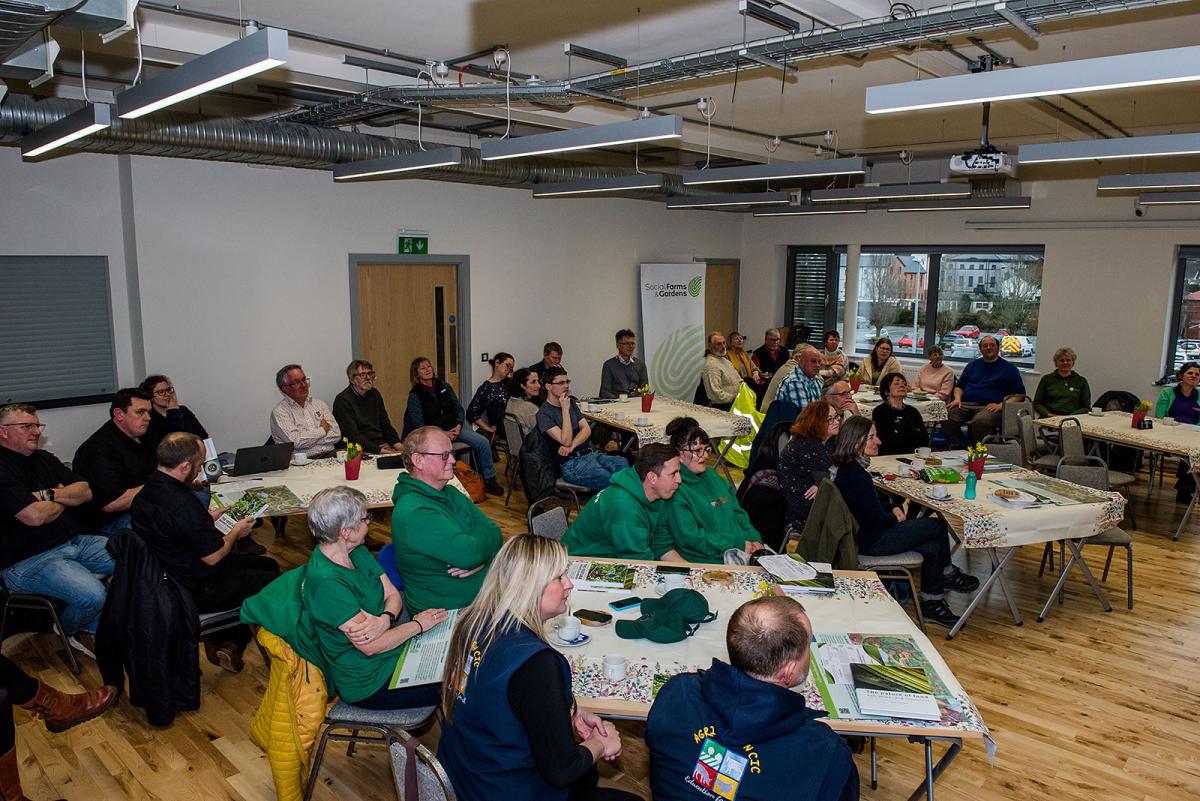
This year’s successful projects were:
1. Able Cwmbran, Torfaen
2. Agri-cation CIC, Wrexham
3. Ainon Baptist Church Community Garden, Cardiff
4. Brynawel Therapeutic Community Gardens, Rhondda Cynon Taff
5. Bwyd Bendigedig y Felinheli Incredible Edibles, Gwynedd
6. Antur Aelhaearn, Gwynedd
7. Forgeside RFC Community Garden, Torfaen
8. Gardd Gymunedol Hive Community Garden, Gwynedd
9. Llansamlet Graveyard Community Garden, Swansea
10. Grow Well Riverside, Cardiff
11. Growing Together, A Garden Project, Denbighshire
12. Meadow Street Community Gardens and Woodland, Rhondda Cynon Taff
13. Tŷ Dewi Sant Residential Home Garden, Vale of Glamorgan
14. Wild Elements, Gwynedd
15. Wildmill Youth Club, Bridgend
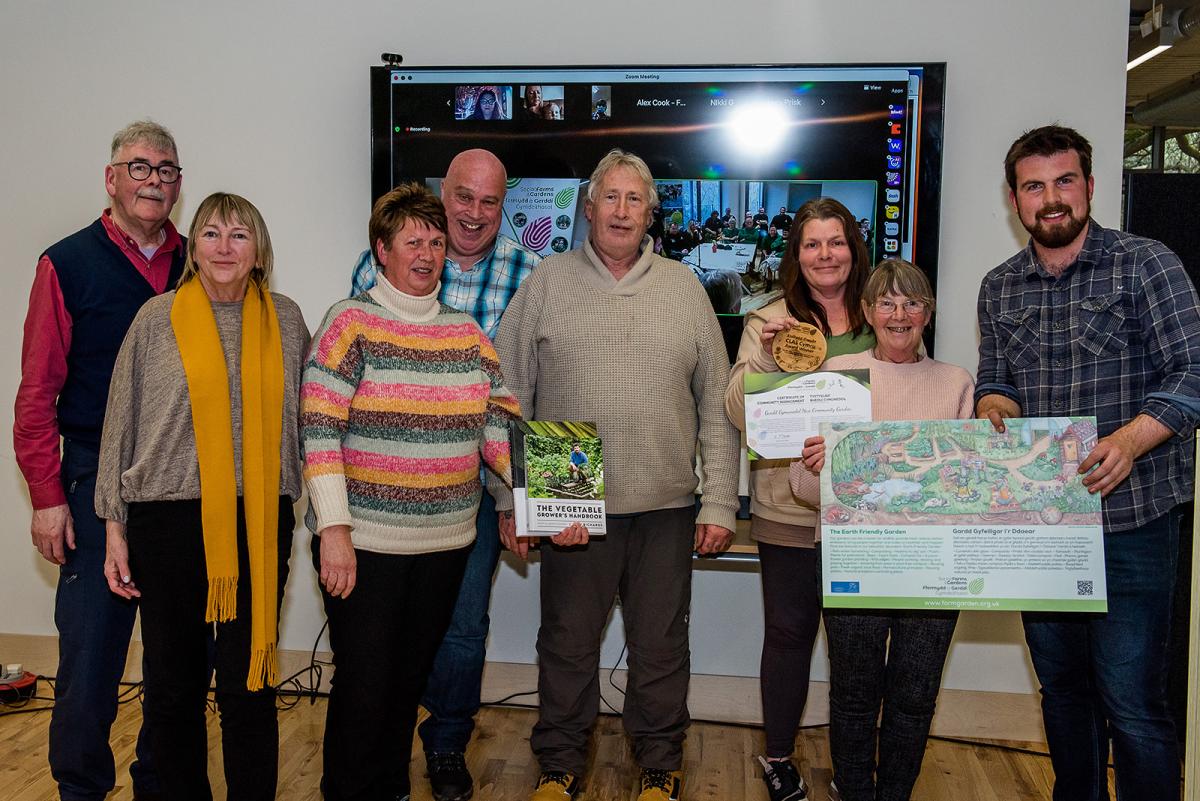
Ainon Baptist Church Community Garden, who joined online said,
‘thank you so much for this wonderful award and recognition. So many amazing projects, so many ideas! Well done SF&G, excellent work.’
All the awarded projects featured, have completed a Social Farms & Gardens ‘Site Resilience Plan’ to demonstrate to public bodies and potential funders their attributes and achievements in line with the Wellbeing of Future Generations (Wales) Act 2015 Goals. The in-person event was very well attended where groups were able to celebrate their achievements alongside fellow community gardeners and like-minded individuals. The invite was extended to local councillors, partner projects and Welsh Government representatives, who were also in attendance.
Group members from Agri-cation in Wrexham said that it was a:
‘lovely ceremony as it was a relaxed format and not corporate which created a sense of community.’
During the ceremony the project members were presented with ‘community managed’ plaques and certificates; recognising their hard work in gaining permission to manage a green space. This is the fruition of a huge amount of hard work, consultation with public bodies and engagement with the community. This year we have been lucky enough to have Volunteer/Co-founder of Incredible Edible Porthmadog, Charissa Buhler, create our newly designed plaques using reclaimed oak.
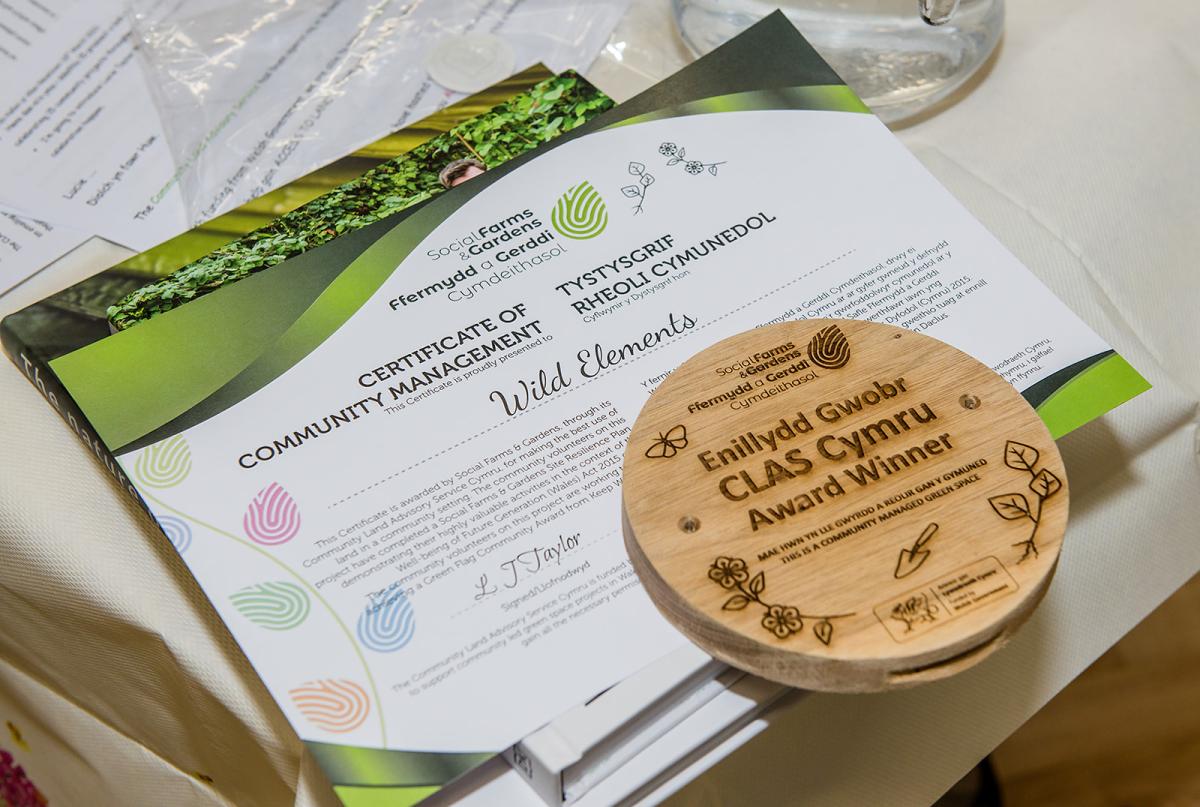
Joining Social Farms & Gardens for their celebration, alongside the awardees, there was a very special guest host - author, YouTube star, and founder of the Abundance Academy, Huw Richards, who presented the awardees with their plaques, certificates and also kindly donated signed copies of his own books for each of the groups as part of their award. Huw, who has over 75 million views on his gardening videos which are dedicated to empowering people to grow their own food, believes that vegetable gardening doesn't need to be expensive or time-consuming. These beliefs made him the ideal host for the CLAS Awards, an inspiration for all aspiring community gardeners! Huw also held a questions-and-answer session where the Awardees and other attendees, both online and in person, had the chance to ask him community gardening, or just general gardening-based questions.
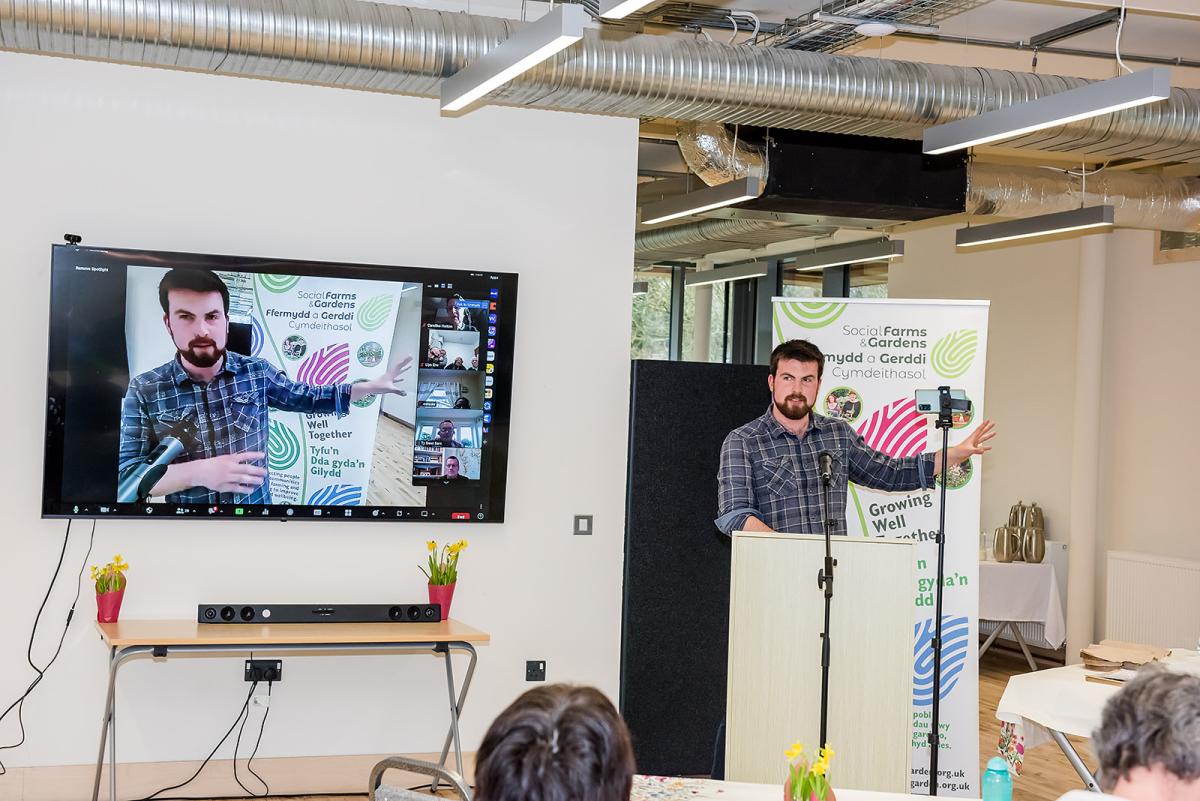
Social Farms and Gardens hosts the Community Management Awards in order to acknowledge the hard work and many achievements of all communities who manage green spaces. Through their Welsh Government funded CLAS Cymru programme, they will continue to support these groups and other communities who seek to acquire land to manage green spaces. CLAS Cymru also works with Keep Wales Tidy to help community green space projects achieve a Green Flag Community Award. Do you know of a community green space or gardening project that has gained access to land and is achieving great things? They could be one of our 2024 Awardees! Email us at [email protected] with any further details.
Social Farms & Gardens membership is open to any organisation delivering nature-based activities that improve people's lives. For example, the delivery of care services or community development through farming or gardening. Click here to join for free today!
McClarrons specialist unsurance broker highlights dangers of underinsurance
What is underinsurance?
Underinsurance essentially is where you have insured for less than the true value of what is being insured. It is a common mistake but a costly one, determined by the ‘condition of average’ clause, which you can read about here.
How does underinsurance occur?
A building should be insured for the amount it would cost to rebuild it to its former state if it were to be completely destroyed (this includes the cost to clear and remove debris, have plans drawn up, and local authority and professional fees, amongst other items), and not for the amount that it is worth on the market; this is where many go wrong. That, along with property rebuild valuations not being conducted as often as they need in a world of ever-rising costs can lead to underinsurance.
With the costs of building materials and construction having risen considerably due to the impact of the Covid-19 pandemic, inflation and the ongoing conflict in Ukraine, the chances of underinsurance are even greater; the cost of rebuilding a property may now be much higher than you would have previously expected, and this must be taken into consideration. As alluded to earlier, a rebuild valuation is often a good way of establishing an accurate sum insured, which we provide further detail on below
What are the consequences of my building being underinsured?
Most commercial insurance policies contain an Average Clause/Condition of Average, which allows insurers to proportionately reduce claim payments where underinsurance has occurred (this can apply to Buildings, Contents and Business Interruption covers). In other words the clause is used to calculate the settlement of a claim where the policy undervalues the actual value of what is insured. In the event of a loss, the amount paid for a claim will be proportionate to the value of the underinsurance.
For example, let’s say you have a building that you have insured for £100,000 and you suffer a total loss on it. When the claims process begins and the surveyor declares that building would actually cost £200,000 to rebuild, you will have underinsured your building by 50%. Then, once the condition of average is applied, the maximum pay out you could receive for a claim would only be £50,000 – not ideal when you need to rebuild a £200,000 building!
How can I make sure that I have adequate cover?
When it comes to your buildings, we recommend using a RICS approved surveyor to obtain an accurate valuation for your property. Remember, you need to know the rebuild value of your property, not the market value! You can now also purchase a desktop valuation which is completed online and can be more affordable than an in-person survey. We have teamed up with RebuildCostASSESSMENT.com who, regulated by RICS, provide desktop Rebuild Cost Assessments to help guide you on how much you should be insuring your buildings for. RebuildCostASSESSMENT.com prices start from as little as £180 but we’ve negotiated a special discount to get £20 off when placing an order online. Please speak with us if this would be of interest.
Contents cover is also subject to the average condition, so when insuring your contents we recommend insuring them for their replacement value, not what you originally purchased them for. Most policies will insure on a ‘new for old’ basis, meaning that insurers will replace damaged, lost or stolen items with brand-new products of the same value. This means you won't lose out financially if your items have depreciated in value over time.
*Source: rebuildcostASSESSMENT.com
For more information visit https://www.farmgarden.org.uk/join-us/insurance-members
If you have any further questions about insurance or would like to speak to a member of our team about an insurance review for your community garden, city farm or care farm, contact McClarrons Care & Social Welfare Team on 01653 600477.
New season, new office for the SF&G Northern Ireland team
On Imbolc the first day of Spring, Social Farms & Gardens opened their new office shared with Friends of the Earth in Belfast. Over 60 people joined us to celebrate, bringing friends and members of Friends of the Earth and SF&G together. James Orr - Director of Friends of the Earth and Patricia Wallace - NI Manager at SF&G cut a sustainable Irish Linen ribbon to officially open the office.
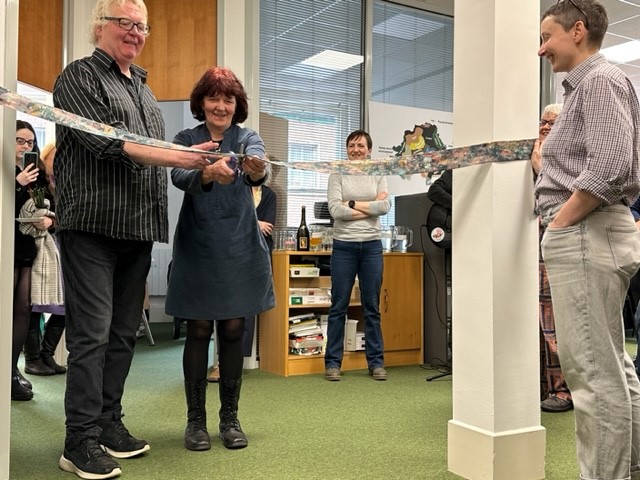
The ribbon was from local linen manufacture; Wm Clarke & Son’s Earthed Collection. The office was also refurbished to high environmental standards in a sandstone heritage building in the city centre. Conor from our NI team made it all the more inviting with his custom made window box.
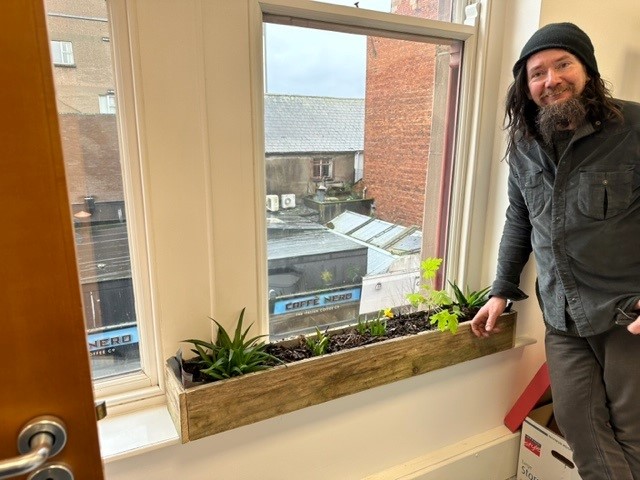
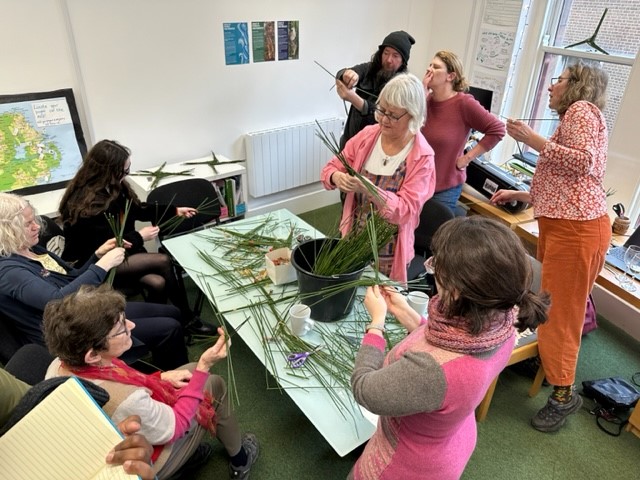
Patricia speaks about this fresh start by comparing it with the start of spring, saying;
“The shoots are peeping through the soil, the days are stretching and Spring is awakening – new beginnings and a new beginning for Social Farms & Gardens and Friends of the Earth”.
Miriam Turley SF&G says “It’s a really pleasant working environment with high ceilings, large windows and eco heating, we’re really looking forward to working here this year”. Thank you to all doners and funders and to those that gave their energy to make this happen. Everyone had the opportunity to make a St Brigid’s Cross to mark the first day of Spring and Conor O’Kane gave us a song ‘Down in the Garden’.''
Bays a plenty - Bootle gardens thrives with innovative composting system
The Gateway Collective in Bootle, Merseyside was one of three organisations to each be awarded a grant of £1,300 to support composting activities in community gardens. The grants came from a partnership between Social Farms & Gardens and sustainable coffee brand GRIND.
Producing over 500kg of fresh food in a year, they wanted to develop an efficient and fast composting system whereby they could generate their own. We last caught up with them in October and are so pleased to hear their new approach to compost is proving plentiful.
Over the winter months the garden’s staff and volunteers were able to maintain a new system for all the community to contribute to. Ali Horton, the garden’s Director informed told us ‘’Over Christmas people brought their veg waste from their Christmas dinner – we had great fun seeing what people had eaten by the content of their waste – sprouts were not popular at all!’’
Thanks to some guidance from composting experts, Composting Works, they have a full system set up to accommodate different types of waste. ‘’Our compost system is now going well. We have 10 bays in total! 3 for our community food waste, 1 for our toilet waste, 3 as a ‘staging area’ for compost to be put to be sorted and chopped smaller and 3 that are being used in rotation, cleverly called ‘take from me’, leave me alone and add to me!’’
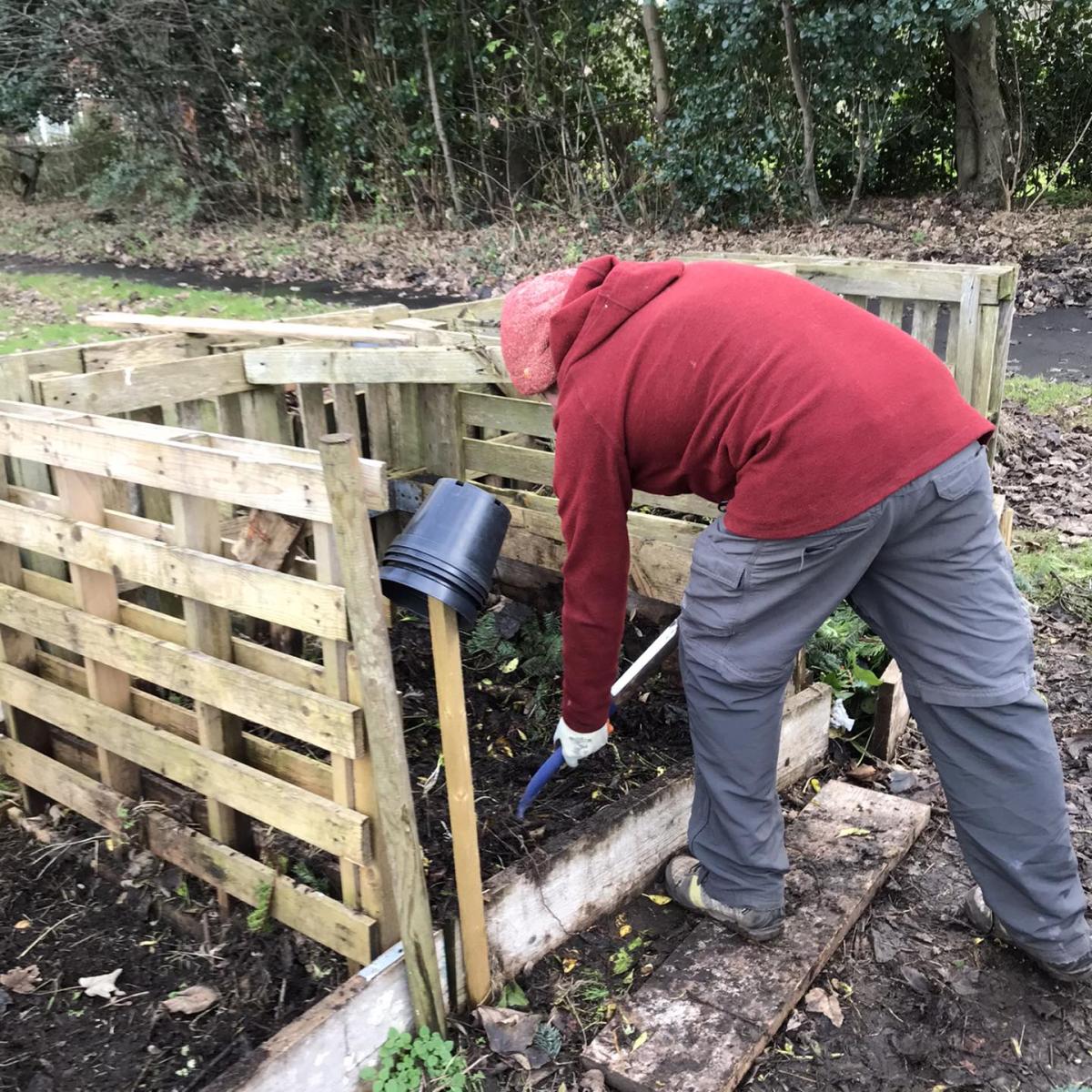
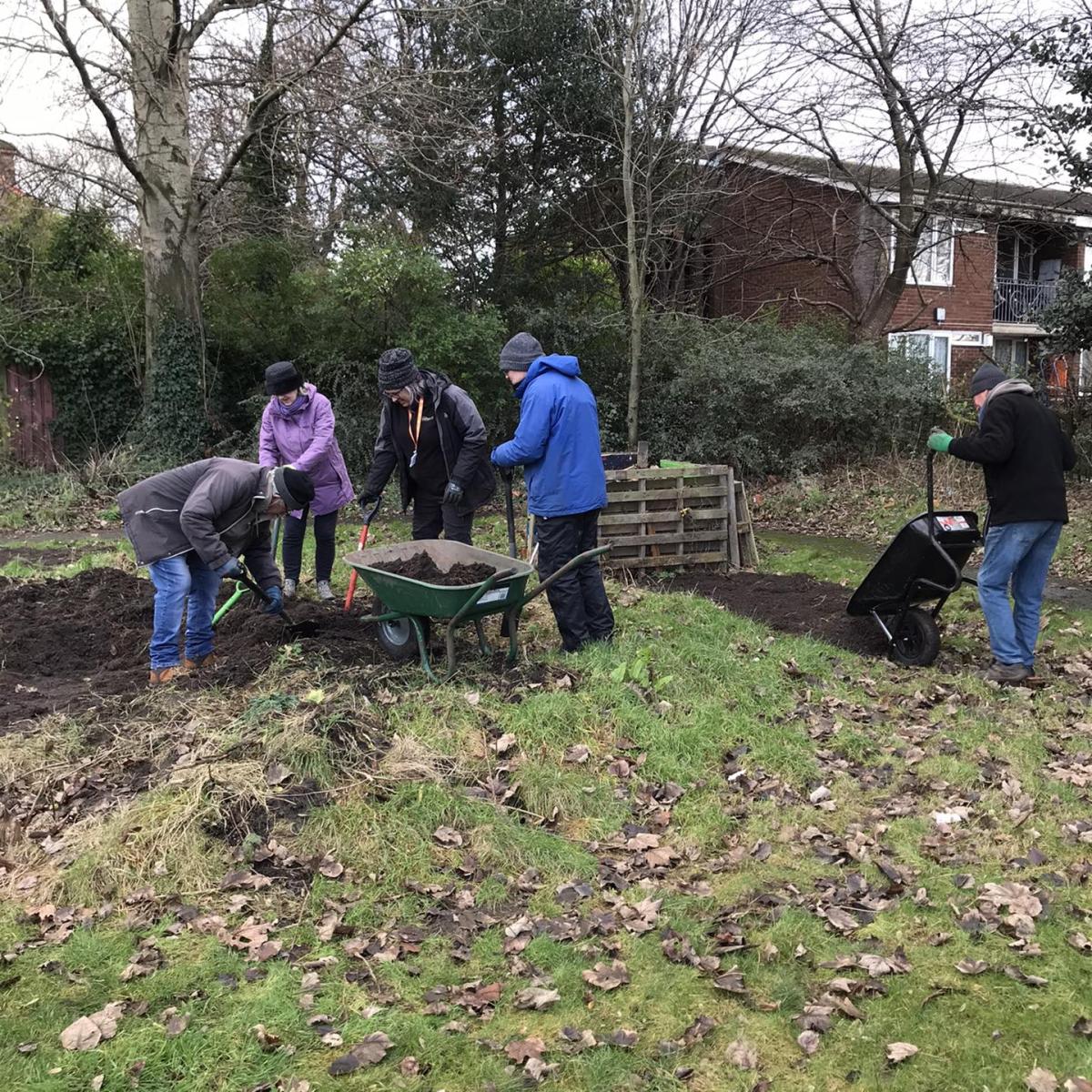
Ali speaks with excitement about further plans for the future, ''We now have electricity connected to the site and are in the process of getting an electricity supplier. As soon as that is sorted we can buy a shredder which Minna from Composting Works says will make our compost speedy and amazing!
We have 3 community gardeners who are our ‘compost experts’ and 2 who are making our bays and fixing them when we need to.’’
Read more about our grant partnership with GRIND or download our composting guide.
Controlled Environment Agriculture delivering social good
Controlled Environment Agriculture delivering social good / 'Controlled Environment Agriculture' yn darparu lles cymdeithasol
As Wales strives to increase its production of fruit and veg to meet the needs of our population, innovative technologies are being supported and developed. Controlled Environment Agriculture (CEA) is just one of these ideas. CEA usually takes place in an indoor environment where it’s easier to control the growing ecosystem than outdoors. In outdoor grow spaces, you can control and automate some aspects of the nutrition and light, but other factors (e.g., temperature and humidity) can be harder to manage. This restricts the growing season for certain produce in Wales, and means some of our nation’s favourite healthy goodies can’t be easily grown here.
Social Farms & Gardens (SF&G) challenged Welsh Government to invest in piloting CEA in community-led settings to see what wider benefits could be generated. Four sites were selected offering a pan-Wales testbed from Treherbert to Wrexham via Cwmbran and Newtown.
SF&G and partners wanted to explore how CEA could help communities to deliver activities which educated and involved people in the food they eat, providing learning and business development opportunities, and increasing the sustainability of local food networks by giving people access to nutritious, locally grown food.
The four pilot sites were encouraged to use Welsh-based CEA and technology businesses, where feasible, to design and help install the infrastructure, ensuring it was suitable for each site’s conditions and requirements.
Following a delayed and disjointed start due to Covid restrictions, all sites were able to get fully-functioning during 2022. Little Lion Research were commissioned to identify the wider benefits delivered by siting these innovative agriculture technologies with small, community-led organisations.
Using TOMs we’ve now calculated that the sites delivered over £70,000 additional value to the produce sold, including employment, training and community-workshops. We look forward to what each of the sites will achieve in the future as they have received supplementary capital support and business advice from specialist consultants. It’s been really encouraging to see Welsh Government accept the challenge to invest in smaller, community-based enterprises and reap the wider social benefits possible through alternative approaches to food production.
Read the full Social Impact Report here.
Wrth i Gymru ymdrechu i gynyddu ei gwaith o gynhyrchu ffrwythau a llysiau i ddiwallu anghenion ein poblogaeth, mae technolegau arloesol yn cael eu cefnogi a'u datblygu. Dim ond un o'r syniadau hyn yw Controlled Environment Agriculture (CEA). Fel arfer mae CEA yn digwydd mewn amgylchedd dan do lle mae'n haws rheoli'r ecosystem sy'n tyfu nag yn yr awyr agored. Mewn mannau tyfu awyr agored, gallwch reoli ac awtomeiddio rhai agweddau ar y maeth a'r golau, ond gall ffactorau eraill (e.e., tymheredd a lleithder) fod yn anoddach i'w rheoli. Mae hyn yn cyfyngu ar y tymor tyfu ar gyfer cynnyrch penodol yng Nghymru, ac yn golygu na ellir tyfu rhai o hoff ddaioni iach ein cenedl yma'n hawdd.
Heriodd Ffermydd a Gerddi Cymdeithasol (FfaGCC) Lywodraeth Cymru i fuddsoddi mewn treialu CEA mewn lleoliadau a arweinir gan y gymuned i weld pa fuddion ehangach y gellid eu cynhyrchu. Dewiswyd pedwar safle yn cynnig prawf ar draws Cymru o Dreherbert i Wrecsam trwy Gwmbrân a'r Drenewydd.
Roedd FfaGCC a phartneriaid eisiau archwilio sut y gallai CEA helpu cymunedau i ddarparu gweithgareddau a oedd yn addysgu ac yn cynnwys pobl yn y bwyd y maent yn ei fwyta, gan ddarparu cyfleoedd dysgu a datblygu busnes, a chynyddu cynaliadwyedd rhwydweithiau bwyd lleol drwy roi mynediad i bobl at fwyd maethlon, a dyfir yn lleol.
Anogwyd y pedwar safle peilot i ddefnyddio busnesau CEA a thechnoleg yng Nghymru, lle bo'n ymarferol, i ddylunio a helpu i osod y seilwaith, gan sicrhau ei fod yn addas ar gyfer amodau a gofynion pob safle.
Wedi oedi a dechrau disynnwyr oherwydd cyfyngiadau Covid, llwyddodd pob safle i gael gweithio'n llawn yn ystod 2022. Comisiynwyd Little Lion Research i nodi'r manteision ehangach a ddarparwyd drwy leoli'r technolegau amaeth arloesol hyn gyda sefydliadau bach a arweinir gan y gymuned.
Gan ddefnyddio TOMs rydym ni bellach wedi cyfrifo bod y safleoedd wedi darparu dros £70,000 o werth ychwanegol i'r cynnyrch a werthwyd, gan gynnwys cyflogaeth, hyfforddiant a gweithdai cymunedol. Edrychwn ymlaen at yr hyn y bydd pob un o'r safleoedd yn ei gyflawni yn y dyfodol gan eu bod wedi derbyn cymorth cyfalaf atodol a chyngor busnes gan ymgynghorwyr arbenigol. Mae wedi bod yn galonogol iawn gweld Llywodraeth Cymru'n derbyn yr her i fuddsoddi mewn mentrau llai, yn y gymuned ac elwa ar fanteision cymdeithasol ehangach, posibl drwy ddulliau eraill o gynhyrchu bwyd.
Doing the work that nature needs of us
Doing the work that nature needs of us / Gwneud y gwaith sydd ei angen ar natur ohonom
Organisations across Wales have been working together for the past year to create a national nature service for Wales. A national nature service would link up those looking for decent work with opportunities to act on the nature emergency. The National Nature Service for Wales is a country-wide movement for action to restore nature by creating good new jobs and livelihood opportunities in nature and embedding green skills across the workforce of the future. Social Farms & Gardens is one twelve organisations to receive funding from WCVA to deliver a scoping exercise which will explore opportunities for skills development and job creation which support nature recovery.
So far, the co-design process has involved over 180 people from a wide variety of organisations. These include 3rd sector organisations involved in delivering a range of environmental, social, economic and cultural programmes – nationally and/or locally; several local authorities and Local Nature Partnerships; various departments in Welsh Government and Natural Resources Wales; National Parks and AONBs; education and training providers including colleges and Lantra; youth organisations; business organisations; farming and forestry organisations …and more are joining all the time.
As part of our commitment to support communities to farm, garden and grow together, Social Farms & Gardens’ proposal will build the case to create better access to employment and enterprise opportunities in through community-led growing. The exercise will propose costings for the investment required to support a set number of community growing groups to expand upon their community-focused voluntary activity and expand this to include enterprise, training and employment. Using case study evidence from eight sites across Wales, our report will make costed recommendations on actions that could be funded to create better access to employment and enterprise opportunities in nature friendly farming, social prescribing and other areas, through community-led growing. The exercise will propose costings for the investment required to support a set number of community growing groups to expand upon their community-focused voluntary activity and shift this into a focus on enterprise, training and employment.
A researcher will work with eight carefully selected community growing sites from Social Farms & Gardens existing network who can demonstrate impact that can lead to enterprise or employment. Using case study evidence from these eight sites, Social Farms & Gardens will create a report that makes costed recommendations on actions that could be funded to create better access to employment and enterprise opportunities in nature friendly farming through community-led growing.
Mae sefydliadau ar draws Cymru wedi bod yn cydweithio dros y flwyddyn ddiwethaf i greu gwasanaeth natur cenedlaethol i Gymru. Byddai gwasanaeth natur cenedlaethol yn cysylltu'r rhai sy'n chwilio am waith teilwng gyda chyfleoedd i weithredu ar yr argyfwng natur. Mae Gwasanaeth Natur Cenedlaethol Cymru yn fudiad ledled y wlad ar gyfer gweithredu i adfer natur trwy greu swyddi newydd da a chyfleoedd bywoliaeth ym myd natur a gwreiddio sgiliau gwyrdd ar draws gweithlu'r dyfodol. Mae Ffermydd a Gerddi Cymdeithasol yn un deuddeg sefydliad i dderbyn cyllid gan WCVA i ddarparu ymarfer cwmpasu a fydd yn archwilio cyfleoedd i ddatblygu sgiliau a chreu swyddi sy'n cefnogi adferiad natur.
Hyd yn hyn, mae'r broses cyd-ddylunio wedi cynnwys dros 180 o bobl o amrywiaeth eang o sefydliadau. Mae'r rhain yn cynnwys sefydliadau 3ydd sector sy'n ymwneud â darparu ystod o raglenni amgylcheddol, cymdeithasol, economaidd a diwylliannol - yn genedlaethol a / neu'n lleol; sawl awdurdod lleol a Phartneriaethau Natur Lleol; adrannau amrywiol yn Llywodraeth Cymru ac Adnoddau Naturiol Cymru; Parciau Cenedlaethol ac AHNE; darparwyr addysg a hyfforddiant gan gynnwys colegau a Lantra; sefydliadau ieuenctid; sefydliadau busnes; mae sefydliadau ffermio a choedwigaeth …a mwy yn ymuno trwy'r amser.
Fel rhan o'n hymrwymiad i gefnogi cymunedau i ffermio, garddio a thyfu gyda'i gilydd, bydd cynnig Ffermydd a Gerddi Cymdeithasol yn adeiladu'r achos i greu gwell mynediad at gyfleoedd cyflogaeth a menter i mewn drwy dyfu dan arweiniad y gymuned. Bydd yr ymarfer yn cynnig costau ar gyfer y buddsoddiad sydd ei angen i gefnogi nifer penodol o grwpiau tyfu cymunedol i ehangu ar eu gweithgarwch gwirfoddol sy'n canolbwyntio ar y gymuned ac ehangu hyn i gynnwys menter, hyfforddiant a chyflogaeth. Gan ddefnyddio tystiolaeth astudiaeth achos o wyth safle ar draws Cymru, bydd ein hadroddiad yn gwneud argymhellion wedi'u costio ar gamau gweithredu y gellid eu hariannu i greu gwell mynediad at gyfleoedd cyflogaeth a menter mewn ffermio sy'n gyfeillgar i natur, rhagnodi cymdeithasol ac ardaloedd eraill, trwy dyfu dan arweiniad y gymuned. Bydd yr ymarfer yn cynnig costau ar gyfer y buddsoddiad sydd ei angen i gefnogi nifer penodol o grwpiau tyfu cymunedol i ehangu ar eu gweithgarwch gwirfoddol sy'n canolbwyntio ar y gymuned a symud hyn i ffocws ar fenter, hyfforddiant a chyflogaeth.
Bydd ymchwilydd yn gweithio gydag wyth safle tyfu cymunedol a ddewiswyd yn ofalus o rwydwaith presennol Ffermydd a Gerddi Cymdeithasol sy'n gallu dangos effaith a all arwain at fenter neu gyflogaeth. Gan ddefnyddio tystiolaeth astudiaeth achos o'r wyth safle hyn, bydd Ffermydd a Gerddi Cymdeithasol yn creu adroddiad sy'n gwneud argymhellion costus ar gamau y gellid eu hariannu i greu gwell mynediad at gyfleoedd cyflogaeth a menter mewn ffermio sy'n gyfeillgar i fyd natur drwy dyfu dan arweiniad y gymuned.
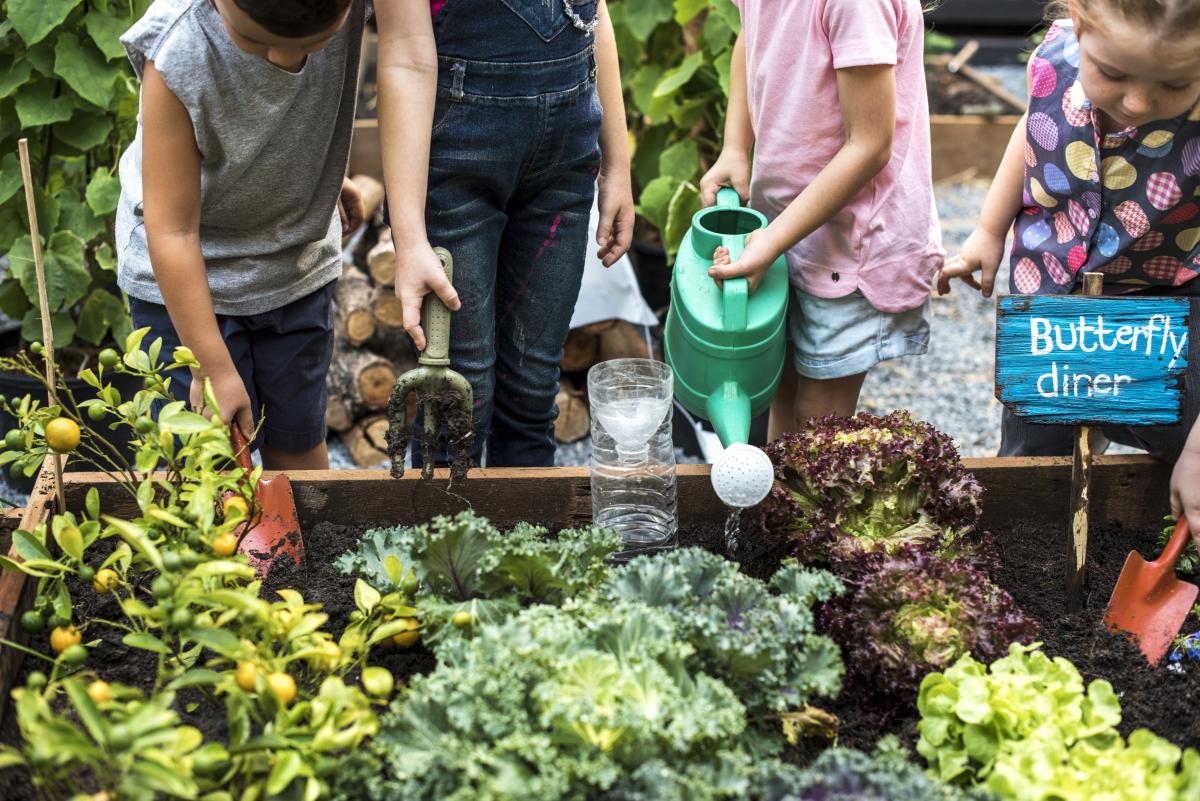
McClarrons offers crucial claims insurance guidance
Having the right protection is a vital yet often overlooked component in running an efficient community green space. Because things don’t always go as expected, insurance can protect you from those unpredictable events that can incur expensive costs. With ever-changing weather on the rise and increasing strains placed on communities, you never know what damages could take place.
Not to mention the essential cover your organisation needs from contents insurance, to employers’ liability insurance and more. It can be confusing to know exactly what you need and what you should consider to best protect your space.
Since 2019 SF&G have partnered with McClarrons insurance who are an independent insurance broker specialising in the Care, Social Welfare and Agricultural sectors. They have proudly insured over 200 SF&G members and counting. Over the coming months we will be hearing more from them as they share their top tips and knowledge to help guide you on all things insurance.
McClarrons' Claims Guidance tips
One of our most frequently asked about topics with insurance is Claims Guidance. Here are the four main issues to consider before seeking a claim;
• Clear Ownership – In order for a claim to be valid, you must have ‘insurable interest’ in the items you are covering so that you can prove that they belong to you/the organisation. For example, receipts, invoices, and/or dated images. If you cannot prove you own the items you are claiming for, it can make it harder to receive a pay-out. If you have donated items, we recommend that you get some proof of ownership from the previous owners or complete an asset register, a template for which you can download from the Social Farm & Gardens website.
• Mitigate Your Loss – In order to help your claim, we recommend taking steps to mitigate your loss as soon as possible after the loss occurs. You can do this in many ways, for example – if your shed roof is damaged/leaking, you could put a temporary fix on the roof to stop any further damage. If you do take remedial action, please always hold on to any invoices.
• Ensure you have the right type of cover – general contents cover is typically only valid for the premises located on your insurance schedule. If you frequently take tools off-site to use at other locations, we recommend asking your broker about ‘all risks tools cover’, which provides cover UK-wide.
• The Right Sum Insured – Make sure you have the correct sum insured figure noted for your policy or any claim settlement could fall short of the actual loss. Typically, policies will insure contents on a ‘new for old’ basis – meaning the sum insured should represent the value of a modern-day equivalent or replacement rather than the existing item.
For more information visit https://www.farmgarden.org.uk/join-us/insurance-members
If you have any further questions about insurance or would like to speak to a member of our team about an insurance review for your community garden, city farm or care farm, contact McClarrons Care & Social Welfare Team on 01653 600477.
Become a SF&G Trustee
Are you passionate about the community growing sector and have charity or third sector experience at a strategic level? SF&G is seeking individuals to become trustees of the charity, helping to guide our work and contribute to our aims and objectives.
The Board of Directors (who are also charity Trustees) of SF&G has responsibility for setting the charity’s strategic direction, establishing policy and representing the charity at a UK level.
This is a fulfilling role that, whilst seeking to make the most of your skills and knowledge, will also provide potential for personal and professional development.
Terms of Office
SF&G Directors currently serve a maximum 3-year term; one third must stand down each year. Directors standing down may seek re-election for one further term of office. Newly elected Directors will serve from 1 April 2023 but will be invited to attend as observers at any Board meeting between the AGM and 1 April; an induction will also be arranged.
Composition of the Board
There is a maximum of 11 Trustees/Directors of whom 8 will be elected by the voting members and 3 will be appointed by the Board to fill any identified skills and experience gaps. One or more of those 3 places may be appointed from individuals nominated by members, or from elsewhere. The Board chooses a Chair, Vice Chair and Company Secretary.
As part of our commitment to equity, diversity and inclusion, SF&G wishes to strengthen the board to better reflect the diversity of our society. We welcome nominations from individuals who bring different backgrounds, perspectives and lived experience in addition to a range of skills.
Outline Duties of the Directors
• Contribute actively to giving firm strategic direction to the organisation, and ensuring that it operates in line with its charitable purpose and objects
• Attend at least 8 of the 11 Board meetings per year, with management present. Some are held face-to-face, but most by teleconference, it is essential to read the papers in advance of meetings
• In addition the Board meets monthly for ‘Board only’ meetings by teleconference
• Ensure that the charity complies with its legal and moral obligations
• Represent the charity at occasional national or regional events
• Serve on sub-groups of the Board as appropriate
• Keep informed of the activities of the charity and wider issues affecting its work.
Process of election
If you would like an informal discussion on what is involved, please get in touch using the contact details below. We can also put you in contact with the Chair and other Board members who will be happy to provide you with further information.
• Company Secretary, Caroline Hutton Tel: 07783 921 011 or email: [email protected]
• Nominations to be received via the form below (page 2) by email by midday 8 December 2022
• Nomination details and other AGM papers will be collated and circulated to all SF&G members, and voting papers to those members eligible to vote, on 15 December 2022
• Proxy voting by email with the closing date of midday Wednesday 18 January 2021.
Measuring and demonstrating the potential carbon benefits of using local food hubs
Sustainable Food Procurement for Local Prosperity
MEASURING AND DEMONSTRATING THE POTENTIAL CARBON BENEFITS OF USING LOCAL FOOD HUBS TO SUPPLY PUBLIC SECTOR SETTINGS
PROJECT INTRODUCTION AND BACKGROUND
Working in partnership, Social Farms & Gardens, Open Food Network, Cultivate, Development Trusts Association Wales and Foothold Cymru, aim to demonstrate that the public sector CAN procure efficiently from local producers using methods that benefit the natural environment and local prosperity.
Collaborating with Sustainable Food Places Officers in North Powys and Carmarthenshire, two Procurement Hubs are purchasing from local, small-scale growers, aggregating supply and providing produce to the public sector that meets (or exceeds) requirements in terms of ease, cost and sustainability.
DEMONSTRATING BENEFIT
The project aims to:
• Provide data that demonstrates the wider impact to local authorities and other public sector bodies of purchasing from local growers.
• Provide data that demonstrates the wider impact to local authorities and other public sector bodies of purchasing from growers using agroecological methods.
• Provide data that demonstrates the wider value to local authorities and other public sector bodies of using a local food hub model.
We have commissioned two consultants to capture data around:
- Nutrient density of local produce (grown agroecologically).
- Sustainability impact of local, community-based procurement food hubs assessed within the WFGA framework.
The final piece of data we want to capture is around carbon impact of the model. Additionally, we have commissioned BRO Partnership to evaluate the project and the evidence provided by our carbon impact contractor will be included in the final evaluation report.
BRIEF OUTLINE
Due to the small sample size of this pilot project and the short timeframes within which we are working, we are not anticipating collecting robust data that can be used to prove wide impact of this model. However, all our data collection activity is aimed at increasing the awareness and knowledge of growers, public sector customers and the hub itself to identify improvements to practice and simple monitoring techniques to capture data ongoing.
All data will be integrated into the Open Food Network (OFN) platform so that public sector customers can see the added value of products they are purchasing.
All data that we capture should be used to demonstrate how this model can help public sector bodies in Carmarthenshire and North Powys to meet their stated aims around carbon, biodiversity, health and local economy.
Our long-term strategy is to use the learning from this pilot to develop the model including technological advancements, upscaling growers/producers and empowering local procurement champions within the public sector.
The contractor will be required to:
• Work with growers involved in the pilot in Carmarthenshire and North Powys.
• Understand public sector (including local authorities, health boards, public services boards and Welsh Government) priorities in terms of meeting carbon targets.
• Provide training to various parties involved in the pilot on how to measure carbon impact.
• Support three growers in each region to measure their carbon impact.
• Provide advice and guidance to growers about how to reduce their carbon impact.
• Collate and translate data into useful format that can be
o integrated into OFN platform, and
o used by public sector bodies to demonstrate how this model could help meet their targets
o integrated into the pilot project evaluation
Additionally, the contractor may be able to:
• Share techniques and expertise for measuring wider environmental impact such as biodiversity.
• Share baseline data which can be used to demonstrate impact of alternative growing methods and working locally.
TENDERING INFORMATION
Dates
Quotes received: Wednesday 7th Dec 2022
Contract awarded: Friday 16th Dec 2022
Final evidence submitted: Friday 19th May 2023
Proposed Fee
We have a budget of £10,000 including VAT to deliver this piece of work.
Your Track Record
You should:
- Understand the world of small-scale, agroecological growers in Wales.
- Have a proven track record in measuring carbon impact.
- Have a good understanding of relevant public sector targets and legislation.
- Be willing to work with community-sector partners
- Have a proven track record of providing training in carbon measuring and reduction.
Next Steps
Tenders should be submitted via Sell2Wales or directly to the contact email below by the dates provided. Full costs should be detailed (including whether VAT is applicable) and you should explain how your track record shows that you could meet the requirements of this contract.
Proposals should include a proposed schedule of activity including measuring, workshops and reporting.
Assessment of Tenders
Tenders will be assessed by a panel of Social Farms & Gardens staff and project Steering Group member(s). Tenders will be assessed on whether they meet the stated criteria and whether they offer value for money.
FURTHER INFORMATION
Alison Sheffield, Project Coordinator, Social Farms & Gardens
[email protected], 07752 542 853
Caffael Bwyd Cynaliadwy er Ffyniant Lleol
MESUR A DANGOS POTENSIAL BUDDION O RAN CARBON MEWN PERTHYNAS Â DEFNYDDIO HYBIAU BWYD LLEOL I GYFLENWI LLEOLIADAU SECTOR CYHOEDDUS
CYFLWYNIAD I A CHEFNDIR Y PROSIECT
Nod Ffermydd a Gerddi Cymdeithasol, y Rhwydwaith Bwyd Agored, Cultivate, Cymdeithas Ymddiriedolaethau Datblygu Cymru a Foothold Cymru, trwy weithio mewn partneriaeth yw dangos y GALL y sector cyhoeddus gaffael yn effeithlon gan gynhyrchwyr lleol trwy ddefnyddio dulliau sydd o fudd i’r amgylchedd lleol a ffyniant lleol.
Trwy gydweithio gyda Swyddogion Lleoedd Bwyd Cynaliadwy Gogledd Powys a Sir Gâr, mae dau Hyb Caffael yn prynu gan dyfwyr bach lleol, gan gydgrynhoi’r cyflenwad ac yn darparu cynnyrch ar gyfer y sector cyhoeddus sy’n bodloni (neu’n rhagori ar) gofynion o safbwynt hwylustod, cost a chynaliadwyedd.
DANGOS BUDD
Nod y prosiect yw:
• Darparu data sy’n dangos effaith ehangach i awdurdodau lleol a chyrff sector cyhoeddus eraill o brynu gan dyfwyr lleol.
• Darparu data sy’n dangos effaith ehangach i awdurdodau lleol a chyrff sector cyhoeddus eraill o brynu gan dyfwyr sy’n defnyddio dulliau amaethecolegol.
• Darparu data sy’n dangos y gwerth ehangach i awdurdodau lleol a chyrff sector cyhoeddus eraill o ddefnyddio model hyb bwyd lleol.
Rydym wedi comisiynu dau ymgynghorydd i gofnodi data mewn perthynas â:
- Dwysedd maetholion cynnyrch lleol (a dyfir mewn dull amaethecolegol).
- Cynaliadwyedd effaith hybiau caffael bwyd lleol, a leolir yn y gymuned sy’n cael eu hasesu ar sail fframwaith DLlCD .
Mae darn olaf o ddata yr hoffem ei gofnodi yn ymwneud ag effaith y model o safbwynt carbon.
Yn ogystal, rydym wedi comisiynu Partneriaeth BRO i werthuso’r prosiect a byddwn yn cynnwys y dystiolaeth a ddarperir gan y contractwr sy’n asesu effaith o safbwynt carbon yn yr adroddiad gwerthuso terfynol.
AMLINELLIAD CRYNO
Oherwydd maint sampl bach y prosiect peilot hwn, a’r amserlenni tynn sy’n berthnasol, nid ydym yn rhagweld casglu data cadarn i’w ddefnyddio i brofi effaith eang y model hwn. Er hynny, anelir ein gweithgaredd casglu data at gynyddu ymwybyddiaeth a gwybodaeth am dyfwyr, cwsmeriaid sector cyhoeddus a’r hyb ei hun i adnabod gwelliannau o ran arferion a thechnegau monitro syml i gofnodi data’n barhaus.
Caiff yr holl ddata ei integreiddio i blatfform y Rhwydwaith Bwyd Agored (OFN) er mwyn i gwsmeriaid sector cyhoeddus weld gwerth ychwanegol y cynnyrch maent yn eu prynu.
Dylid defnyddio’r holl ddata a gesglir i ddangos sut gall y model hwn helpu cyrff sector cyhoeddus yn Sir Gâr a Gogledd Powys i wireddu eu nodau mewn perthynas â charbon, bioamrywiaeth, iechyd a’r economi lleol.
Ein strategaeth hirdymor yw defnyddio’r hyn a ddysgir o’r prosiect peilot hwn i ddatblygu’r model, gan gynnwys datblygiadau technolegol, ehangu tyfwyr/cynhyrchwyr, a grymuso hyrwyddwyr caffael lleol o fewn y sector cyhoeddus.
Bydd gofyn i’r contractwr:
• Weithio gyda thyfwyr sy’n rhan o’r prosiect peilot yn Sir Gâr a Gogledd Powys.
• Deall blaenoriaethau’r sector cyhoeddus (gan gynnwys awdurdodau lleol, byrddau iechyd, byrddau gwasanaethau cyhoeddus a Llywodraeth Cymru) o ran bodloni targedau carbon.
• Darparu hyfforddiant i’r sefydliadau amrywiol sy’n rhan o’r peilot ar sut i fesur effaith ar garbon.
• Cefnogi tri thyfwr ym mhob ardal i fesur eu heffaith ar garbon.
• Darparu cyngor ac arweiniad i dyfwyr ynghylch sut i leihau eu heffaith ar garbon.
• Coladu a dehongli data mewn fformat defnyddiol er mwyn
o Ei integreiddio i blatfform yr OFN, ac i
o Gael ei ddefnyddio gan gyrff sector cyhoeddus i ddangos sut gall y model hwn helpu bodloni eu targedau
o Ei integreiddio i werthusiad o’r prosiect peilot
Yn ogystal, hwyrach y bydd y contractwr yn gallu:
• Rhannu technegau ac arbenigedd o ran mesur effaith amgylcheddol ehangach megis bioamrywiaeth.
• Rhannu data gwaelodlin i’w ddefnyddio i ddangos effaith dulliau tyfu amgen a gweithio’n lleol.
GWYBODAETH TENDRO
Dyddiadau
Derbyn dyfynbrisiau: Dydd Gwener 7eg Rhag 2022
Dyfarnu’r Contract: Dydd Mawrth 16eg Rhag 2022
Cyflwyno tystiolaeth derfynol: Dydd Gwener 19eg Mai 2023
Y Ffi Arfaethedig
Mae gennym gyllideb o £10,000, gan gynnwys TAW, i gyflawni’r darn gwaith hwn.
Eich Hanes Blaenorol
Dylech:
- Ddeall byd tyfwyr amaethecolegol bach yng Nghymru.
- Meddu ar hanes blaenorol mewn mesur effaith ar garbon.
- Meddu ar ddealltwriaeth dda o dargedau a deddfwriaeth sector cyhoeddus perthnasol.
- Fod yn barod i weithio gyda phartneriaid o’r sector cymunedol.
- Meddu ar hanes blaenorol o ddarparu hyfforddiant mewn mesur a lleihau carbon.
Camau Nesaf
Dylid cyflwyno tendrau trwy GwerthwchiGymru neu’n uniongyrchol trwy’r cyfeiriad ebost isod, erbyn y dyddiadau a nodir. Dylid nodi manylion llawn y costau (gan gynnwys a yw TAW yn berthnasol ai peidio) a dylid egluro sut mae eich hanes blaenorol yn dystiolaeth y gallwch fodloni gofynion y contract hwn.
Dylai cynigion gynnwys atodlen arfaethedig o weithgareddau, gan gynnwys mesur, gweithdai ac adrodd.
Asesu Tendrau
Bydd panel o staff Ffermydd a Gerddi Cymdeithasol ac aelod(au) Grŵp Llywio PFH yn asesu’r tendrau. Seilir asesiad o’r tendrau ar eu gallu i ddiwallu’r meini prawf a nodwyd, ac a ydynt yn cynnig gwerth am arian.
GWYBODAETH BELLACH
Alison Sheffield, Cydlynydd y Prosiect, Ffermydd a Gerddi Cymdeithasol
[email protected], 07752 542 853
This project has received funding through the Welsh Government Rural Communities - Rural Development Programme 2014-2020, which is funded by the European Agricultural Fund for Rural Development and the Welsh Government to pilot two new procurement food hubs in Carmarthenshire and North Powys.
Mae’r prosiect hwn wedi derbyn cyllid trwy gronfa Cymunedau Gwledig Llywodraeth Cymru – Rhaglen Datblygu Gwledig 2014-2020, sy’n cael ei gyllido gan Gronfa Amaethyddol Ewrop ar gyfer Datblygu Gwledig a Llywodraeth Cymru i gynnal peilot ar gyfer dau hyb caffael bwyd newydd yn Sir Gâr a Gogledd Powys.

Provision of lease hire production equipment available to growers
Sustainable Food Procurement for Local Prosperity
PROVISION OF LEASE HIRE PRODUCTION EQUIPMENT TO GROWERS IN AND AROUND NORTH POWYS OR CARMARTHENSHIRE (TWO CONTRACTS)
PROJECT INTRODUCTION AND BACKGROUND
Working in partnership, Social Farms & Gardens, Open Food Network, Cultivate, Development Trusts Association Wales and Foothold Cymru, aim to demonstrate that the public sector CAN procure efficiently from local producers using methods that benefit the natural environment and local prosperity.
Collaborating with Sustainable Food Places Officers in North Powys and Carmarthenshire, two Procurement Hubs are purchasing from local, small-scale growers, aggregating supply and providing produce to the public sector that meets (or exceeds) requirements in terms of ease, cost and sustainability.
SUPPORTING GROWERS
The project aims to:
• Create new jobs in the rural economy.
• Upskill growers.
• Provide steady markets for existing horticulture growers and producers.
• Provide training in agroecological farming practices as well as enterprise support.
• Increase the capacity of growers to meet increasing public demand in North Powys / Carmarthenshire
This pilot will be the test bed for future growers, Hubs and procurers. It will better equip small rural businesses to develop more sustainable and viable enterprises.
Our long-term strategy is to use the learning from this pilot to develop the model including technological advancements, upscaling growers/producers and empowering local procurement champions within the public sector.
We will be investing in local growers through training, networks and the provision of capital equipment.
BRIEF OUTLINE
We are looking for a single organisation with the will, capacity and knowledge to provide lease hire equipment to growers to increase their ability to supply the public sector in North Powys/ Carmarthenshire and to grow in ways that benefit nature.
Initially, priority of access to the equipment will be given to small-scale, agroecological producers who are feeding into the procurement food hub pilot project (up to 10 growers). Longer term, other growers may also be eligible to hire equipment from the provider.
Our aspiration is for a well-managed “library of things” that will be available for growers in and around North Powys/ Carmarthenshire at a nominal rate. Equipment could be provided on long-term lease to specific growers and/or short-term lease arrangements could be offered.
Equipment will:
• Help growers to use more nature-friendly methods
• Help growers to be more productive
• Help growers to develop and cultivate a wider product range
• Help growers to manipulate their produce so it is suitable for public sector market
• Help growers to transport their produce
The contract holder will be required to:
• Work with the local Sustainable Food Places Coordinator and Procurement Food Hub to assess the priority needs of local growers, within the framework of this project.
• Purchase equipment following competitive tendering requirements and anticipating the longevity of the “library”.
• Provide a lease hire agreement with sites to include on-site maintenance. Note: Social Farms & Gardens will provide a legal framework template for the lease hire.
• Arrange and supervise delivery, installation, initial use and subsequent troubleshooting of equipment supplied.
• Keep all necessary financial records relating to the equipment:
o Date purchased
o Description of equipment
o Price paid (inc. net recoverable VAT)
o Serial / Identification numbers
o Location of the equipment
o Any date of disposal
o Any sale of net of VAT
NB – NO equipment must be disposed of, transferred or dissipated before September 2028 without the prior written consent of Social Farms & Gardens (WG IoA 36.)
The library of equipment should be easily accessible to growers in North Powys/ Carmarthenshire.
TENDERING INFORMATION
Dates
Quotes received: Tuesday 29th Nov 2022
Contract awarded: Wednesday 7th Dec 2022
Spend Completed: Friday 24th March 2023
Proposed Fee
We are looking to provide the library for around £15,000. Any submission should detail value for money, likely equipment to be provided / available. It should detail whether long-term or short-term lease arrangements will be offered and how these will be managed. It should detail the management arrangements and demonstrate how the library will be sustainable.
Your Track Record
You should:
- Be familiar with small-scale, agroecological growers in North Powys/ Carmarthenshire and understand their needs.
- Be engaged with your local Sustainable Food Places partnership.
- Be able to assess needs of growers with regards to public sector procurement requirements.
- Have experience of managing a “library of things” or leasing equipment to small-scale end users who may work with volunteers.
- Have knowledge of the installation and use of a range of production equipment used by small-scale growers.
- Be able to access growers in North Powys/ Carmarthenshire and have ability to transport equipment which may be bulky.
Next Steps
Tenders should be submitted via Sell2Wales or directly to the contact email below by the dates provided. Full costs should be detailed (including whether VAT is applicable) and you should explain how your track record shows that you could meet the requirements of this contract.
- Carmarthenshire - click here for more information
- Powys - click here for more information
Assessment of Tenders
Tenders will be assessed by a panel of Social Farms & Gardens staff and PFH Steering Group member(s). Tenders will be assessed on whether they meet the stated criteria and whether they offer value for money.
FURTHER INFORMATION
Alison Sheffield, Project Coordinator, Social Farms & Gardens
[email protected], 07752 542 853
Caffael Bwyd Cynaliadwy er Ffyniant Lleol
DARPARU OFFER CYNHYRCHU I’W HURIO AR BRYDLES AR GYFER TYFWYR SIR GÂR A’R ARDAL NEU GOGLEDD POWYS (DAU GONTRACT)
CYFLWYNIAD I A CHEFNDIR Y PROSIECT
Nod Ffermydd a Gerddi Cymdeithasol, y Rhwydwaith Bwyd Agored, Cultivate, Cymdeithas Ymddiriedolaethau Datblygu Cymru a Foothold Cymru, trwy weithio mewn partneriaeth yw dangos y GALL y sector cyhoeddus gaffael yn effeithlon gan gynhyrchwyr lleol trwy ddefnyddio dulliau sydd o fudd i’r amgylchedd lleol a ffyniant lleol.
Trwy gydweithio gyda Swyddogion Lleoedd Bwyd Cynaliadwy Gogledd Powys a Sir Gâr, mae dau Hyb Caffael yn prynu gan dyfwyr bach lleol, gan gydgrynhoi’r cyflenwad ac yn darparu cynnyrch ar gyfer y sector cyhoeddus sy’n bodloni (neu’n rhagori ar) gofynion o safbwynt hwylustod, cost a chynaliadwyedd.
CEFNOGI TYFWYR
Nod y prosiect yw:
• Creu swyddi newydd yn yr economi lleol.
• Uwchsgilio tyfwyr
• Darparu marchnadoedd cyson ar gyfer tyfwyr a chynhyrchwyr garddwriaeth presennol.
• Darparu hyfforddiant mewn arferion ffermio amaethecolegol yn ogystal â chefnogi mentrau.
• Cynyddu capasiti tyfwyr i fodloni galw cynyddol gan y cyhoedd yn Sir Gâr/ Gogledd Powys.
Bydd y prosiect peilot hwn yn wely prawf ar gyfer tyfwyr, Hybiau a chaffaelwyr y dyfodol. Bydd yn paratoi busnesau bach gwledig yn well i ddatblygu mentrau mwy cynaliadwy a hyfyw.
Ein strategaeth hirdymor yw defnyddio’r hyn a ddysgir o’r peilot hwn i ddatblygu’r model, gan gynnwys datblygiadau technolegol, ehangu tyfwyr/cynhyrchwyr a grymuso hyrwyddwyr caffael lleol o fewn y sector cyhoeddus.
Byddwn yn buddsoddi mewn tyfwyr lleol trwy hyfforddiant, rhwydweithiau a thrwy ddarparu offer cyfalaf.
AMLINELLIAD CRYNO
Rydym yn chwilio am sefydliad unigol, sydd â’r awydd, capasiti a gwybodaeth i ddarparu offer i’w hurio ar brydles ar gyfer tyfwyr er mwyn cynyddu eu gallu i gyflenwi’r sector cyhoeddus yn Sir Gâr/ Gogledd Powys ac i dyfu mewn ffyrdd sy’n fuddiol i natur.
Yn y lle cyntaf, rhoddir blaenoriaeth o ran mynediad at yr offer i gynhyrchwyr amaethecolegol bach, sy’n cyfrannu at brosiect peilot yr hyb caffael ar fwyd (hyd at 10 tyfwr). Yn y tymor hwy, hwyrach y bydd tyfwyr eraill yn gymwys i hurio offer gan y darparwr.
Ein dyhead yw cael “llyfrgell offer” a reolir yn dda, sydd ar gael i dyfwyr Sir Gâr a’r ardal/ Gogledd Powys ar raddfa enwol. Gellir prydlesu offer ar sail hirdymor i dyfwyr penodol a/neu gellir cynnig trefniadau prydlesu tymor byr.
Bydd yr offer yn:
• Helpu tyfwyr i ddefnyddio dulliau mwy cyfeillgar i natur
• Helpu tyfwyr i fod yn fwy cynhyrchiol
• Helpu tyfwyr i ddatblygu a thyfu ystod cynnyrch ehangach
• Helpu tyfwyr i drin eu cynnyrch i sicrhau ei fod yn addas ar gyfer marchnad y sector cyhoeddus
• Helpu tyfwyr i gludo eu cynnyrch
Bydd gofyn i ddeiliad y contract:
• Weithio gyda’r Cydlynydd Lleoedd Bwyd Cynaliadwy a’r Hyb Caffael Bwyd i asesu anghenion blaenoriaeth tyfwyr lleol, o fewn fframwaith y prosiect hwn.
• Prynu offer gan ddilyn gofynion tendro cystadleuol a rhagweld pa mor hir bydd y “llyfrgell” yn parhau.
• Darparu cytundeb hurio ar brydles i gynnwys gwaith cynnal a chadw ar y safle. Noder: bydd Ffermydd a Gerddi Cymdeithasol yn darparu templed o fframwaith cyfreithiol ar gyfer hurio ar brydles.
• Trefnu a goruchwylio cyflenwi, gosod, defnydd cychwynnol a delio gydag unrhyw broblemau sy’n codi wedyn o ran yr offer a gyflenwir.
• Cadw’r holl gofnodion ariannol angenrheidiol mewn perthynas â’r offer:
o Dyddiad prynu
o Disgrifiad o’r offer
o Pris a dalwyd (gan gynnwys TAW net adenilladwy)
o Cyfeirnodau / rhifau adnabod
o Lleoliad yr offer
o Dyddiad cael gwared ar unrhyw offer
o Gwerthu unrhyw offer heb DAW
DS - Ni chaniateir cael gwared ar unrhyw offer, na’i drosglwyddo neu ei wasgaru cyn Medi 2028 heb ganiatâd ysgrifenedig ymlaen llaw gan Ffermydd a Gerddi Cymdeithasol (WG IoA 36.)
Dylai’r llyfrgell offer fod yn hygyrch i dyfwyr yn Sir Gâr/ Gogledd Powys.
GWYBODAETH TENDRO
Dyddiadau
Derbyn dyfynbrisiau: Dydd Mawrth 29eg Tach 2022
Dyfarnu’r Contract: Dydd Mercher 7eg Rhag 2022
Gorffen Gwario: Dydd Gwener 24ain Mawrth 2023
Y Ffi Arfaethedig
Rydym yn bwriadu darparu’r llyfrgell am rwy £15,000. Dylai unrhyw gynnig nodi manylion gwerth am arian, yr offer sy’n debygol o gael ei ddarparu/fydd ar gael. Dylid nodi a fydd trefniadau prydlesu hirdymor neu dymor byr yn cael eu cynnig, a sut y caiff y rhain eu rheoli. Dylid nodi hefyd y trefniadau rheoli a dangos sut bydd y llyfrgell yn gynaliadwy.
Eich Hanes Blaenorol
Dylech:
- Fod yn gyfarwydd gyda thyfwyr amaethecolegol bach yn Sir Gâr/ Gogledd Powys a deall eu hanghenion.
- Ymgysylltu â’ch partneriaeth Lleoedd Bwyd Cynaliadwy lleol.
- Fod yn gallu asesu anghenion tyfwyr mewn perthynas â gofynion caffael y sector cyhoeddus.
- Meddu ar brofiad o reoli “llyfrgell offer” neu brydlesu offer i ddefnyddwyr bach sy’n gweithio gyda gwirfoddolwyr efallai.
- Meddu ar wybodaeth ynghylch gosod a defnyddio ystod o offer cynhyrchu a ddefnyddir gan dyfwyr bach.
- Bod yn gallu cael mynediad at dyfwyr yn Sir Gâr/ Gogledd Powys a gallu cludo offer a all fod yn fawr.
Camau Nesaf
Dylid cyflwyno tendrau trwy GwerthwchiGymru neu’n uniongyrchol trwy’r cyfeiriad ebost isod, erbyn y dyddiadau a nodir. Dylid nodi manylion llawn y costau (gan gynnwys a yw TAW yn berthnasol ai peidio) a dylid egluro sut mae eich hanes blaenorol yn dystiolaeth y gallwch fodloni gofynion y contract hwn.
- Sir Gâr - cliciwch yma am fwy o wybodaeth
- Gogledd Powys - cliciwch yma am fwy o wybodaeth
Asesu Tendrau
Bydd panel o staff Ffermydd a Gerddi Cymdeithasol ac aelod(au) Grŵp Llywio PFH yn asesu’r tendrau. Seilir asesiad o’r tendrau ar eu gallu i ddiwallu’r meini prawf a nodwyd, ac a ydynt yn cynnig gwerth am arian.
GWYBODAETH BELLACH
Alison Sheffield, Cydlynydd y Prosiect, Ffermydd a Gerddi Cymdeithasol
[email protected], 07752 542 853
This project has received funding through the Welsh Government Rural Communities - Rural Development Programme 2014-2020, which is funded by the European Agricultural Fund for Rural Development and the Welsh Government to pilot two new procurement food hubs in Carmarthenshire and North Powys.
Mae’r prosiect hwn wedi derbyn cyllid trwy gronfa Cymunedau Gwledig Llywodraeth Cymru – Rhaglen Datblygu Gwledig 2014-2020, sy’n cael ei gyllido gan Gronfa Amaethyddol Ewrop ar gyfer Datblygu Gwledig a Llywodraeth Cymru i gynnal peilot ar gyfer dau hyb caffael bwyd newydd yn Sir Gâr a Gogledd Powys.

Llanelli Food Hub makes first deliveries to the public sector
A partnership project in Wales is demonstrating how the public sector can source locally produced food - benefiting both the environment and local prosperity. The first food deliveries to a public sector care home and restaurant in Carmarthenshire have proved a success for the project.
Collaborating with Sustainable Food Places Officers in two areas, the Sustainable Food Procurement Hubs project works with local, small-scale growers to aggregate supply and provide produce to the public sector whilst meeting ease, cost and sustainability requirements.
Project partners from Social Farms & Gardens, Open Food Network, Cultivate, Development Trusts Association Wales and Foothold Cymru, aim to demonstrate that the public sector can procure efficiently from local producers using methods that benefit the natural environment and local people. The project has received funding through the Welsh Government Rural Communities - Rural Development Programme 2014-2020, which is funded by the European Agricultural Fund for Rural Development and the Welsh Government to pilot two new procurement food hubs in Carmarthenshire and North Powys.
The hub, based in Llanelli, Carmarthenshire, has aggregated vegetables from a number of local growers and dispatched their high-quality produce to Awel Tywi Care Home and Yr Orsaf restaurant at Pembrey Country Park. Both venues are owned and managed by Carmarthenshire County Council who have been very supportive in the aim to increase the nutritional value of the food they serve.
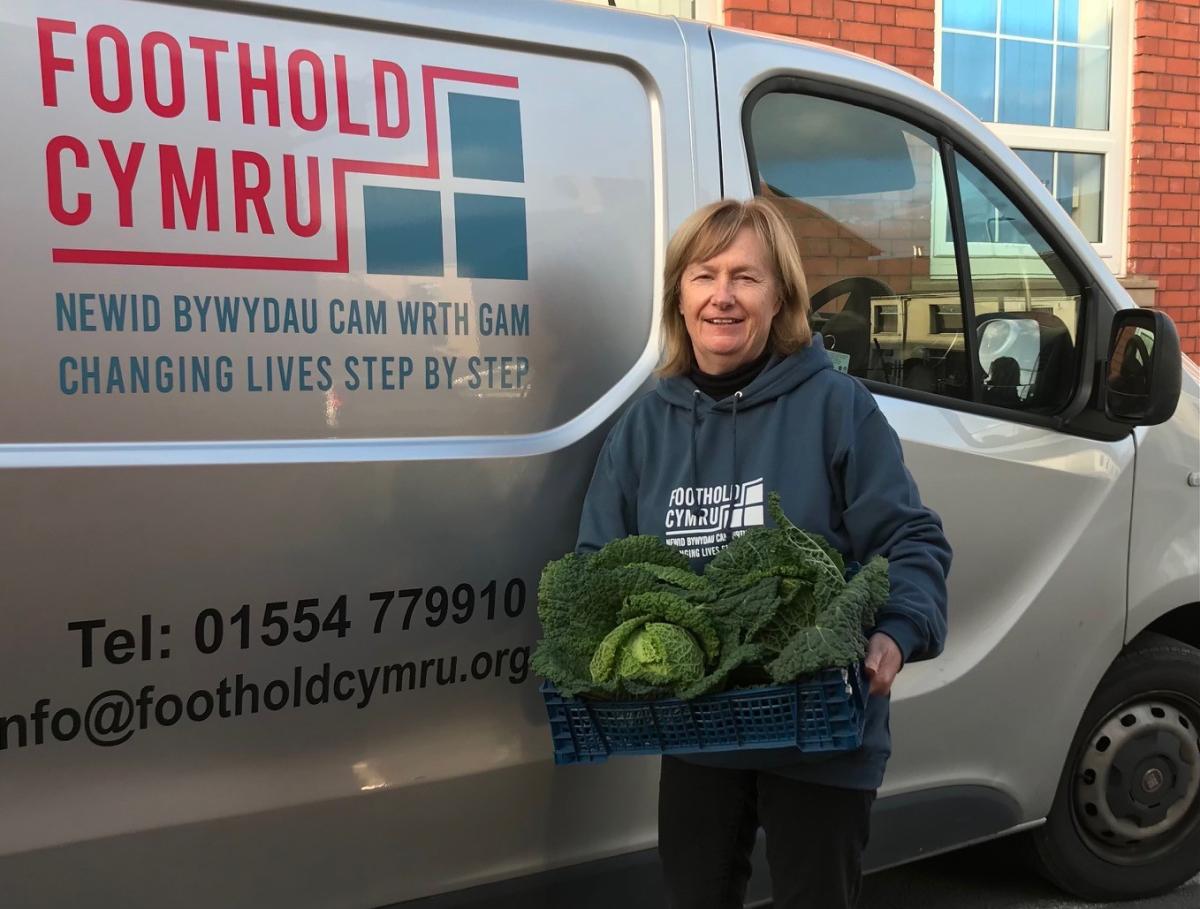
Photo: The delivery van being loaded at the hub
Helen Evans from Foothold Fruit & Veg Hub has said:
‘Just a couple of weeks in and the feedback has already been so positive – the chefs have praised the quality of the veg and even commented on how wonderful it smelt. They loved the variety and colour of the produce, especially the tomatoes & chard.’
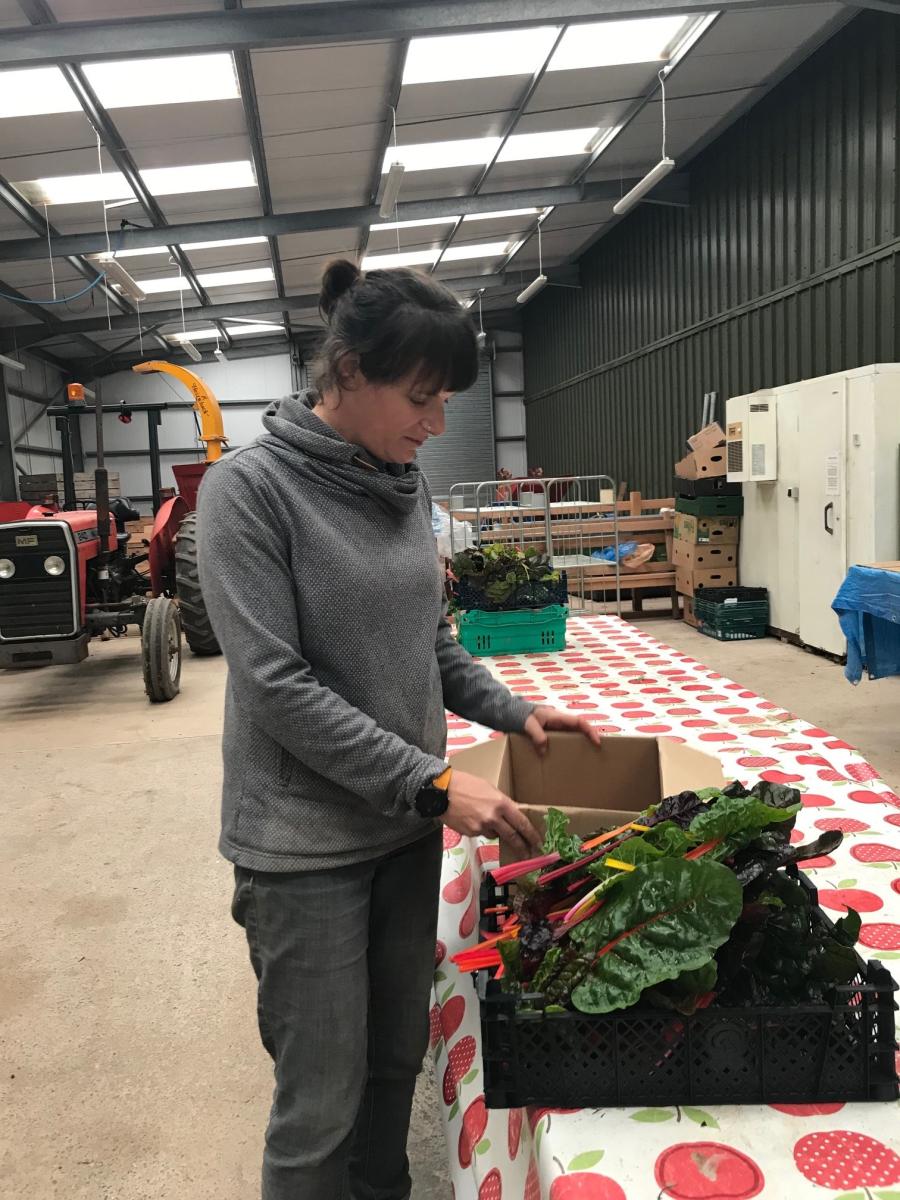
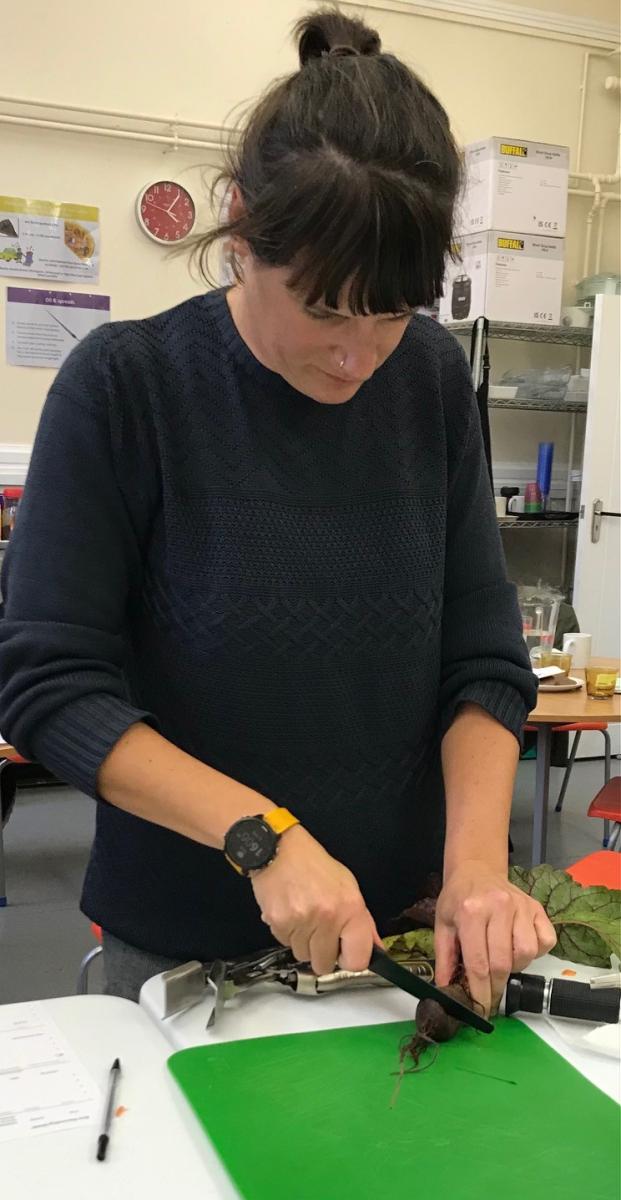
Photos: Alex Nicholls of Banc Organics (one of the Hub's suppliers) testing the quality & nutrional density of their veg and inspecting her produce before dispatch.
Yr Orsaf’s are keen to promote the fact that their meals are made with ingredients grown nearby and therefore less travelled, nutritious and served within just a couple of days of being picked. Awel Tywi care home has a number of residents over 100, including the oldest person in Wales at 110 who is enjoying eating ingredients farmed in the area she has always lived. The hub is building on this enthusiastic start and already planning deliveries to more public sector venues soon.
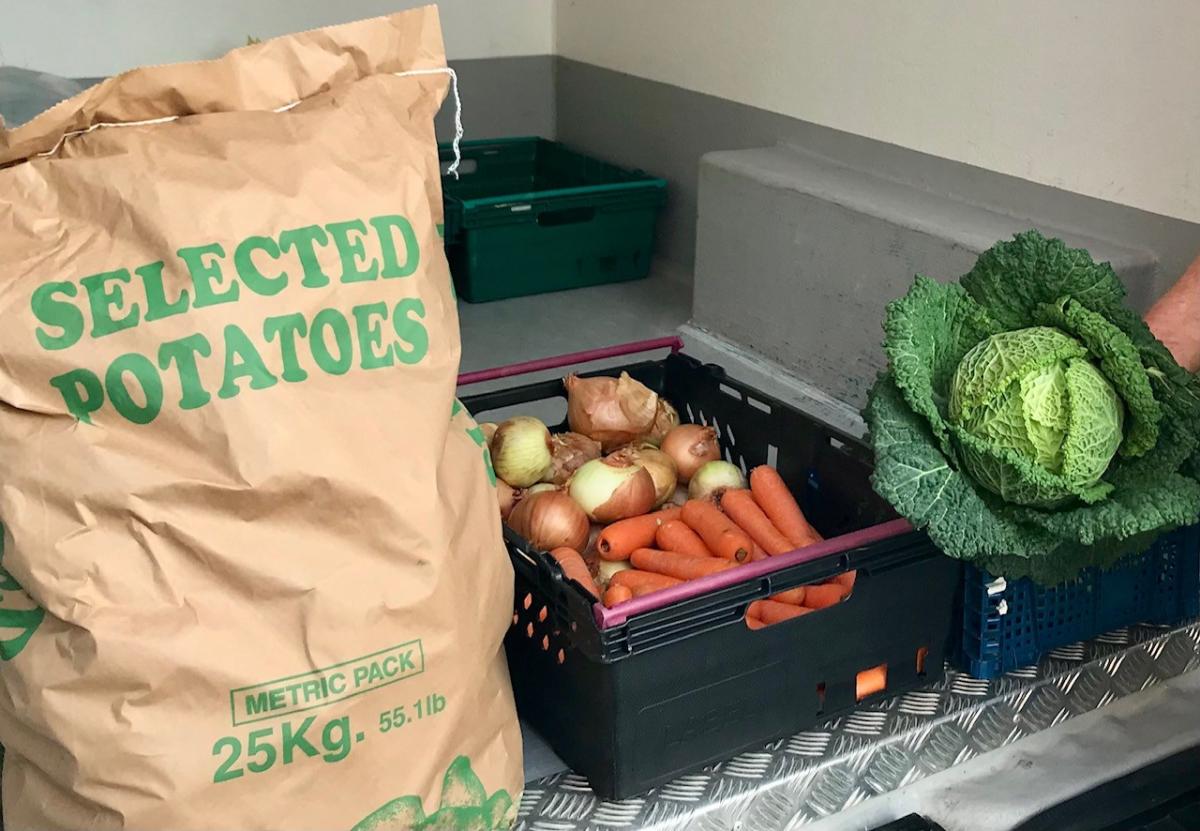
Photo: Part of the first delivery being loaded into the van
Mae ‘Foothold Fruit & Veg Hub’ wedi ei wneud yn danfoniadau cyntaf i'r sector cyhoeddus
Gan gydweithio â Swyddogion Lleoedd Bwyd Cynaliadwy yn y ddwy ardal, bydd y prosiect Hybiau Bwyd Caffael yn gweithio gyda thyfwyr lleol, ar raddfa fach i gyflenwi agregau a darparu cynnyrch i'r sector cyhoeddus sy'n bodloni ei ofynion o ran rhwyddineb, cost a chynaliadwyedd.
Drwy weithio gyda phartneriaid o Ffermydd a Gerddi Cymdeithasol, Open Food Network, Cultivate, Cymdeithas Ymddiriedolaethau Datblygu Cymru a Foothold Cymru, ein nod yw dangos y gall y sector cyhoeddus gaffael yn effeithlon gan gynhyrchwyr lleol gan ddefnyddio dulliau sydd o fudd i'r amgylchedd naturiol a ffyniant lleol. Mae'r prosiect hwn wedi derbyn cyllid drwy Gymunedau Gwledig Llywodraeth Cymru - Rhaglen Datblygu Gwledig 2014-2020, sy'n cael ei ariannu gan Gronfa Amaethyddiaeth Ewrop ar gyfer Datblygu Gwledig a Llywodraeth Cymru i dreialu dwy ganolfan bwyd caffael newydd yn Sir Gaerfyrddin a gogledd Powys.
Mae'r Hwb, yn Llanelli, Sir Gaerfyrddin yn cynnwys llysiau cyfanredol gan nifer o dyfwyr lleol ac wedi danfon eu cynnyrch o ansawdd uchel i Gartref Gofal Awel Tywi a bwyty Yr Orsaf ym Mharc Gwledig Pen-bre. Cyngor Sir Caerfyrddin sy'n berchen ar ac yn cael eu rheoli yn y ddau leoliad, ac maen nhw wedi bod yn gefnogol iawn er mwyn ceisio cynyddu gwerth maethol y bwyd maen nhw'n ei wasanaethu.

Llun: Y fan gyflenwi yn cael ei llwytho yn yr hyb
Mae Helen Evans o Foothold Fruit & Veg Hub wedi dweud:
‘Dim ond ychydig wythnosau i mewn ac mae'r adborth eisoes wedi bod mor gadarnhaol - mae'r cogyddion wedi canmol ansawdd y llysiau a hyd yn oed gwneud sylwadau ar ba mor wych y mae'n mwyndoddi. Roedden nhw wrth eu boddau gydag amrywiaeth a lliw'r cynnyrch, yn enwedig y tomatos & chard.’


Lluniau: Alex Nicholls o Banc Organics (un o gyflenwyr yr Hwb) yn profi dwysedd ansawdd a noethlymun eu llysiau ac archwilio ei chynnyrch cyn eu hanfon.
Mae'r Orsaf's yn awyddus i hyrwyddo'r ffaith bod eu prydau yn cael eu gwneud gyda chynhwysion yn cael eu tyfu gerllaw ac felly llai o deithiol, maethlon a'u gweini o fewn dim ond ychydig ddyddiau o gael eu dewis. Mae gan gartref gofal Awel Tywi nifer o breswylwyr dros 100, gan gynnwys y person hynaf yng Nghymru sef 110 sy'n mwynhau bwyta cynhwysion sy'n cael eu ffermio yn yr ardal y mae hi wedi byw erioed. Mae'r canolbwynt yn adeiladu ar y dechrau brwdfrydig hwn ac eisoes yn cynllunio danfoniadau i fwy o leoliadau sector cyhoeddus yn fuan.
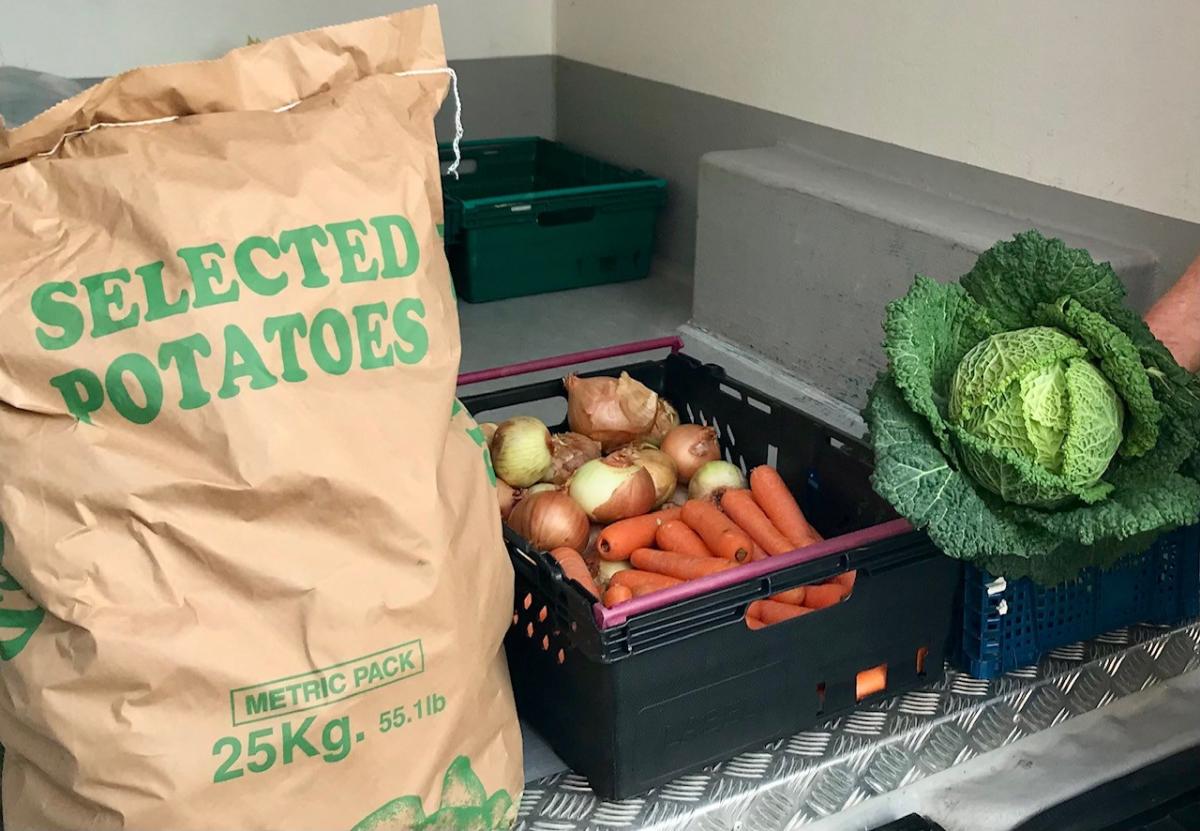
Llun: Rhan o'r delivery cyntaf yn cael ei lwytho i'r fan
Sustainable Food Procurement Hubs
Working with partners from Social Farms & Gardens, Open Food Network, Cultivate, Development Trusts Association Wales and Foothold Cymru, we aim to demonstrate that the public sector CAN procure efficiently from local producers using methods that benefit the natural environment and local prosperity.
This project has received funding through the Welsh Government Rural Communities - Rural Development Programme 2014-2020, which is funded by the European Agricultural Fund for Rural Development and the Welsh Government to pilot two new procurement food hubs in Carmarthenshire and North Powys.
Hybiau Caffael Bwyd Cynaliadwy
Drwy weithio gyda phartneriaid o Ffermydd a Gerddi Cymdeithasol, Open Food Network, Cultivate, Cymdeithas Ymddiriedolaethau Datblygu Cymru a Foothold Cymru, ein nod yw dangos y gall y sector cyhoeddus gaffael yn effeithlon gan gynhyrchwyr lleol gan ddefnyddio dulliau sydd o fudd i'r amgylchedd naturiol a ffyniant lleol.
Mae'r prosiect hwn wedi derbyn cyllid drwy Gymunedau Gwledig Llywodraeth Cymru - Rhaglen Datblygu Gwledig 2014-2020, sy'n cael ei ariannu gan Gronfa Amaethyddiaeth Ewrop ar gyfer Datblygu Gwledig a Llywodraeth Cymru i dreialu dwy ganolfan bwyd caffael newydd yn Sir Gaerfyrddin a gogledd Powys.

Become a Voting Member of Social Farms & Gardens
Our Annual General Meeting is coming up on the 21st January 2023 and we'll be holding elections to our Board of Trustees.
Our board is elected by Voting Members, and we are keen to encourage as many Social Farms & Gardens members as possible to become Voting Members.
- Does your organisation provide benefits to individuals or communities by engaging them in meaningful land-based activities?
- Has your organisation been operational and a member of Social Farms & Gardens for a minimum of one year?
If you answered yes to both questions, please consider applying to become a Voting Member of Social Farms & Gardens.
Email [email protected] by 9th January 2023, letting us know that your organisation wishes to apply to become a Voting Member and we'll process your application.
£100k available to aid buying farmland for agroecological farming in Wales
Our Resilient Green Spaces programme team in Wales are excited to announce £100,000 of available funding to support the purchase of farmland for agroecological farming with long-term community benefit.
This month, the Resilient Green Spaces programme are launching an opportunity for people in Wales to apply for up to £100,000 towards the purchase of farmland that will be used for community benefit and to provide new and ongoing opportunities for new entrant agroecological farmers.
The opportunity will only be open to not-for-profit organisations that are established to deliver public or community benefit, are incorporated and have an asset lock (e.g. a community interest company, charitable company, charitable incorporated organisation or community benefit society).
The funds will only be able to be used for the purchase of land, not for associated capital equipment or any other investment purposes.
The purchase must be completed by 31 May 2023 and purchasers must commit to undertaking a survey of the land before purchase.
Priority will be given to purchases that:
- are taking land out of private (or potentially public) ownership and into community ownership
- are connected to a community e.g. located close to a town or city
- aim to create broad public benefits
- will create opportunities for new entrant farmers e.g. through the creation of FarmStart plots
- aim to provide ongoing opportunities to future new entrant farmers (ie a rolling intake of new entrants/reinvestment of initial funds into further land purchases)
- will support or connect with other local food initiatives such as Food Hubs, orchards and allotments
If you want to make sure that you are informed of this opportunity when it is launched please fill in this form.
If you have any questions please contact: [email protected]
Resilient Green Spaces is a £1.27m partnership project being led by Social Farms & Gardens to pilot alternative re-localised food systems using communities and their green spaces as the driving force for change across Wales until June 2023.
This project has received funding through the Welsh Government Rural Communities - Rural Development Programme 2014-2020, which is funded by the European Agricultural Fund for Rural Development and the Welsh Government.
Cymraeg isod

Mae'r rhaglen Mannau Gwyrdd Gwydn yn gyffrous iawn i gyhoeddi bod ganddi £100,000 ar gael i gefnogi prynu tir fferm ar gyfer ffermio agroecolegol gyda budd cymunedol hirdymor.
Y mis hwn, mae'r rhaglen Mannau Gwyrdd Gwydn yn edrych ymlaen at gyhoeddi ein bod yn lansio cyfle am hyd at £100,000 tuag at brynu tir fferm a fydd yn cael ei ddefnyddio er budd cymunedol ac i ddarparu cyfleoedd newydd a pharhaus i ffermwyr agroecolegol newydd.
Bydd y cyfle'n agored dim ond i sefydliadau nid-er-elw sy'n cael eu sefydlu i ddarparu budd cyhoeddus neu gymunedol, yn cael eu hymgorffori ac sydd â chlo asedau (e.e. cwmni buddiannau cymunedol, cwmni elusennol, sefydliad corfforedig elusennol neu gymdeithas budd cymunedol).
Dim ond ar gyfer prynu tir y bydd modd defnyddio'r arian, nid ar gyfer offer cyfalaf cysylltiedig nac unrhyw ddibenion buddsoddi eraill.
Rhaid cwblhau'r pryniant erbyn 31 Mai 2023 a rhaid i brynwyr ymrwymo i wneud arolwg o'r tir cyn prynu.
Rhoddir blaenoriaeth i bryniannau sydd:
- yn cymryd tir allan o berchnogaeth breifat (neu allai fod yn gyhoeddus) ac i berchnogaeth gymunedol
- wedi'u cysylltu â chymuned e.e. wedi'u lleoli'n agos i dref neu ddinas
- yn anelu at greu buddion cyhoeddus eang
- yn creu cyfleoedd i ffermwyr newydd e.e. trwy greu lleiniau FarmStart
- anelu at ddarparu cyfleoedd parhaus i ffermwyr newydd yn y dyfodol (h.y. cymeriant treigl o newydd-ddyfodiaid/ail-fuddsoddi arian cychwynnol mewn pryniannau tir pellach)
- yn cefnogi neu'n cysylltu â mentrau bwyd lleol eraill megis Canolfannau Bwyd, perllannau a rhandiroedd.
Os ydych chi am sicrhau eich bod yn cael gwybod am y cyfle hwn pan gaiff ei lansio, llenwch y ffurflen hon.
Os oes gennych unrhyw gwestiynau cysylltwch â: [email protected]
Mae Mannau Gwyrdd Gwydn yn brosiect partneriaeth gwerth £1.27m sy'n cael ei arwain gan Ffermydd a Gerddi Cymdeithasol i dreialu systemau bwyd eraill sydd wedi'u hail-leoleiddio gan ddefnyddio cymunedau a'u mannau gwyrdd fel y sbardun ar gyfer newid ledled Cymru tan fis Mehefin 2023.
Cyllidwyd y prosiect hwn drwy Cymunedau Gwledig Llywodraeth Cymru - Rhaglen Datblygu Gwledig Cymru 2014-2020, a ariennir gan Lywodraeth Cymru a’r Gronfa Amaethyddol Ewrop ar gyfer Datblygu Gwledig.

Growing trend: study reveals rising interest in commercial growing in Wales
A study produced by a flagship Social Farms & Gardens project has found that there is an increasing interest in commercial growing and demand for local food in Wales.
The new study, titled “Mapping of existing horticulture training provision (and current sector requirements)” was commissioned by LANTRA Wales in partnership with The Landworkers’ Alliance, Cardiff University and Cae Tan CSA and as part of the Building Horticultural Future Farming Skills strand of the Resilient Green Spaces project.
Resilient Green Spaces is a £1.27m partnership project being led by Social Farms & Gardens to pilot alternative re-localised food systems using communities and their green spaces as the driving force for change across Wales until June 2023.
This project has received funding through the Welsh Government Rural Communities – Rural Development Programme 2014-2020, which is funded by the European Agricultural Fund for Rural Development and the Welsh Government. As part of the Building Horticultural Future Farming Skills strand, Cardiff University Sustainable Places Research Institute are countering negative perceptions of careers in horticulture farming through creative engagements with young people.

[PICTURE CREDIT: CAE TAN CSA]
The report summarises the findings from qualitative research conducted in summer 2022 by Miller Research, into skills and training in edible horticulture in Wales. The purpose of the research was to identify existing training in edible horticulture in Wales (both formal and informal) and how this provision fits with current skills needs in the sector, with a view to identifying gaps in provision and future priorities. The report found several trends including an escalating interest in growing commercially and an increased demand for local food. It looked at the impact of labour shortages and the increased interest in organic and regenerative techniques. Other trends were also noted such as people entering the sector with high level qualifications but not specific to horticulture.
Qualitative data revealed the perceived importance of training needs as demonstrated in the table below:

Future priorities were laid out with a key concern; to increase the size of the sector. A critical part to aid this would be to improve access to land. Improved marketing and promotion of the sector and its corresponding qualifications could add value to perceptions. The report also found a need for greater provision of horticulture-based apprenticeships and traineeships.
Please find details of the full report here. For further information on the report, please contact [email protected]
Sgroliwch am y Gymraeg.
Comisiynwyd astudiaeth newydd, o’r enw “Mapio’r ddarpariaeth gyfredol o hyfforddiant garddwriaeth (a gofynion cyfredol y sector)” gan LANTRA Cymru mewn partneriaeth â Chynghrair y Gweithwyr Tir, Prifysgol Caerdydd a Cae Tan CSA ac fel rhan o fel rhan o Adeiladu Llinyn Sgiliau Ffermio Garddwriaethol yn y Dyfodol y prosiect Mannau Gwyrdd Gwydn.
Mae Mannau Gwyrdd Gwydn yn brosiect partneriaeth gwerth £1.27m dan arweiniad Ffermydd a Gerddi Cymdeithasol er mwyn treialu systemau bwyd amgen, sydd wedi’u hail-leoli, gan ddefnyddio mannau gwyrdd fel yr ysgogiad dros newid ledled Cymru hyd at fis Mehefin 2023.
Mae’r prosiect hwn wedi derbyn cyllid drwy Gymunedau Gwledig – Rhaglen Datblygu Gwledig 2014-2020 (Llywodraeth Cymru), a ariennir gan Gronfa Amaethyddol Ewrop ar gyfer Datblygu Gwledig a Llywodraeth Cymru. Fel rhan o Adeiladu Llinyn Sgiliau Ffermio Garddwriaethol yn y Dyfodol, mae Sefydliad Ymchwil Lleoedd Cynaliadwy Prifysgol Caerdydd yn mynd i’r afael â chanfyddiadau negyddol o yrfaoedd ym maes ffermio garddwriaeth drwy ymgysylltiadau creadigol â phobl ifanc.
Mae’r adroddiad hwn yn crynhoi’r canfyddiadau o ymchwil ansoddol a gynhaliwyd yn haf 2022 i sgiliau a hyfforddiant mewn garddwriaeth fwytadwy yng Nghymru.
Diben yr ymchwil yw nodi’r hyfforddiant cyfredol mewn garddwriaeth fwytadwy yng Nghymru (ffurfiol ac anffurfiol) a sut mae’r ddarpariaeth hon yn cyd-fynd ag anghenion sgiliau cyfredol yn y sector, gyda’r bwriad o nodi bylchau yn y ddarpariaeth a blaenoriaethau’r dyfodol.
Daeth yr adroddiad o hyd i sawl tueddiad, gan gynnwys diddordeb cynyddol mewn tyfu’n fasnachol a mwy o alw am fwyd lleol. Edrychodd ar effaith prinder llafur a’r diddordeb cynyddol mewn technegau organig ac adfywiol. Nodwyd tueddiadau eraill hefyd, megis pobl sy’n dod i mewn i’r sector gyda chymwysterau lefel uchel ond ddim yn benodol i arddwriaeth.
Datgelodd data ansoddol bwysigrwydd canfyddedig anghenion hyfforddiant fel y dangosir yn y tabl isod:

Cafodd blaenoriaethau’r dyfodol eu gosod gyda phryder allweddol; i gynyddu maint y sector. Rhan hanfodol i gynorthwyo hyn fyddai gwella mynediad i dir.
Gallai gwell marchnata a hyrwyddo’r sector a’i gymwysterau cyfatebol ychwanegu gwerth at ganfyddiadau. Canfu’r adroddiad hefyd fod angen mwy o ddarpariaeth o brentisiaethau a hyfforddiannau sy’n seiliedig ar arddwriaeth.
Gweler manylion yr adroddiad llawn yma. Am fwy o wybodaeth am yr adroddiad, cysylltwch â [email protected]
Breaking it down - composting boost for Bootle community garden
A community garden in North West England is unlocking the power of compost thanks to a partnership between Social Farms & Gardens and sustainable coffee brand GRIND.
Earlier this year Social Farms & Gardens partnered with the brand to offer three grants of £1,300 each to support composting activities in community gardens. The Gateway Collective in Bootle, Merseyside is one of three organisations awarded the grant for their ambitious composting plans at North Park Community Garden.
The Gateway Collective - who produced 511kg of fresh food for local people last year - are upgrading their composting activity with the aim of generating their own.
Plans include composting bays with see-through fronts so people can watch the compost biodegrading over time. There will also be growing, cooking and composting workshops with two local schools. In time, the collective hope to expand their composting capacity and incorporate it into their small café.
A few months into the project, the partnership has already had a big impact on the garden. Ali Horton, Founder of the Gateway Collective said: “The first thing to say is whilst I knew there was a good bit of science behind composting, the detail has blown me away!”
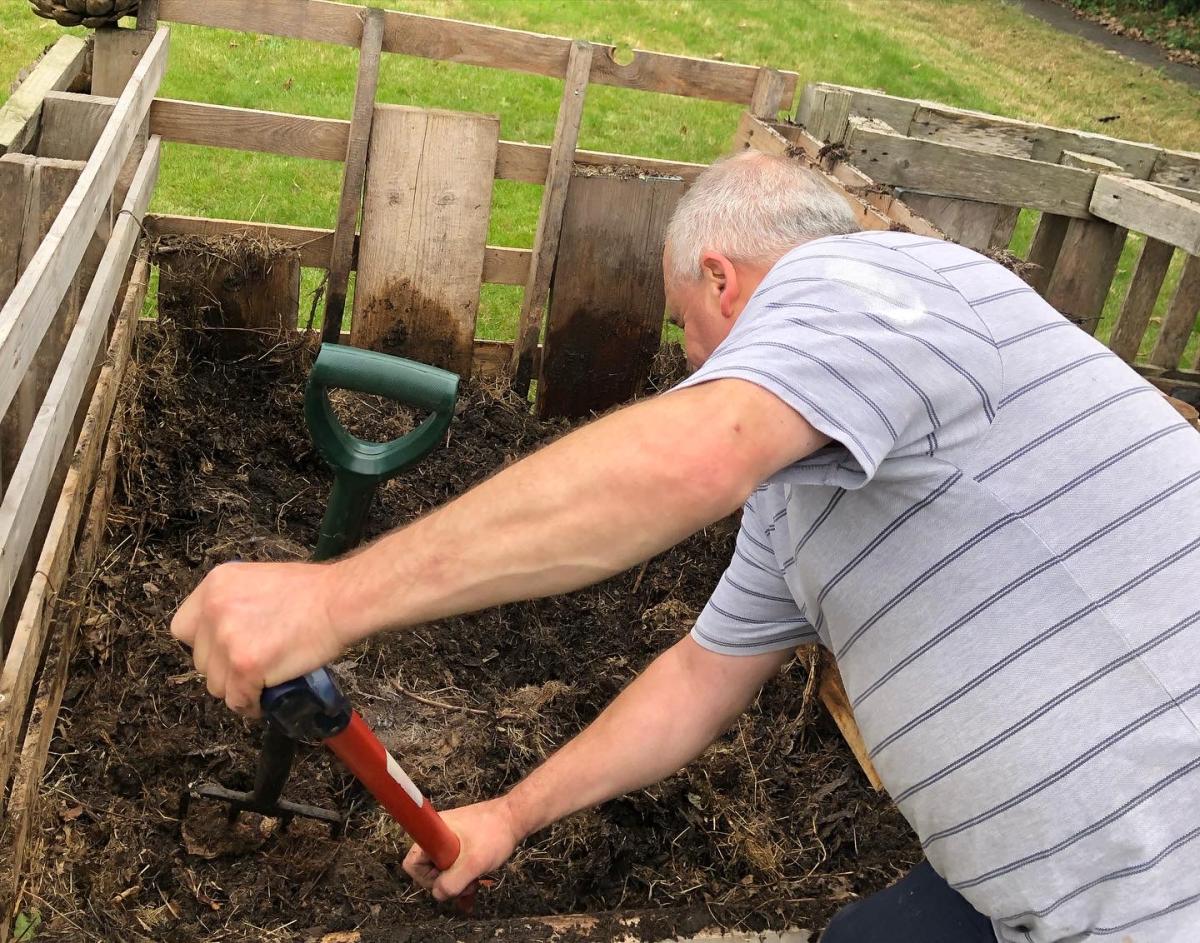
Composting has already moved to a different part of the site to make room for a community kitchen and to increase the composting area. Ali said: “We are lucky to have two amazing volunteers at North Park Community Garden who are skilled with a drill and saw and can turn their hand to anything! Through clever use of wood and pallets they turned our three-bay composting system into a seven-bay system.”
The grant has also enabled the collective to access valuable help from local composting experts, Composting Works. Composting Works CEO and Founder Minna Alanko-Falola visited the group in September.
Speaking about the sessions with Composting Works, Ali said: “We are fortunate in that we knew Minna from composting works already as she is well known in Liverpool for her composting expertise! Minna came to North Park Community Garden to chat through our plans and make first suggestions. Our dream is to be able to generate enough compost meaning we never have to buy additional compost from external sources.”
In the past the group have struggled with slow decomposition and weed seeds lying dormant in the soil. With Minna’s help, the group were able to pinpoint the problem and the solution. “Minna looked at our existing compost which had tell-tale white ash type substance in it,” said Ali.
“I naively thought that was a good thing and it meant we were generating enough heat for the composting process to be taking place. It turns out that means there is not enough oxygen in the compost meaning matter can’t decompose. This can be sorted with regular turning with a garden fork – good for the compost and good exercise too!
“We already knew the principles of good compost - equal proportions of brown and green and regular turning - however Minna came up with a strategy for generating good compost quickly.”
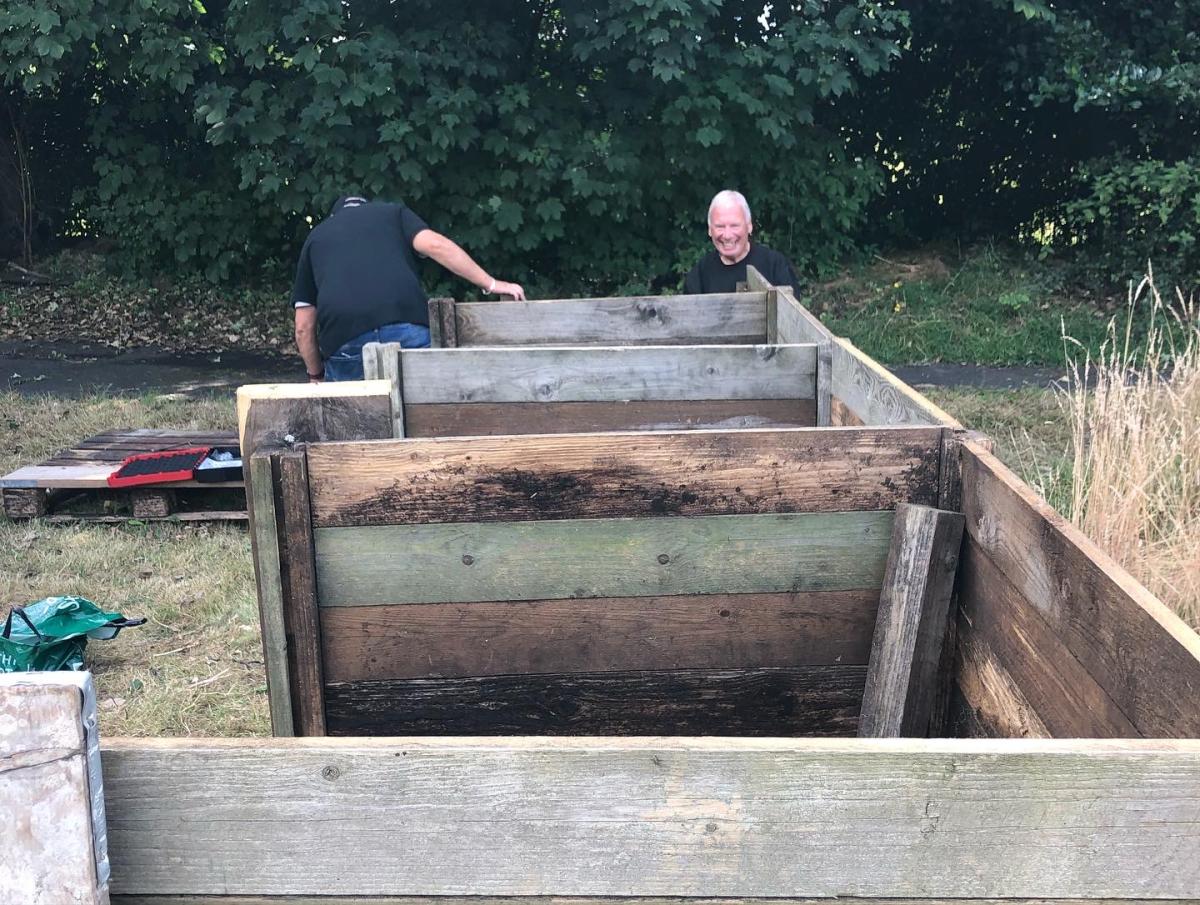
The group started making the breakdown of garden waste easier. “Our plan was to store green and brown waste in a separate area until we had enough to fill up a compost bay in one day,” said Ali. “Everything needed to be as small as possible – this included mowing green waste with a lawn mower to make it smaller and buying a garden chipper for any twigs or branches, which is brown waste.”
A big challenge has been how to chip waste at the site. Battery powered garden shredders proved impossible to find, so the group are now waiting for electricity to be installed in early 2023. In the meantime, the group have continued with their plans, making garden waste smaller by hand.
“We have needed to go old school with getting our waste as small as possible,” said Ali.
“Raspberry canes have been chopped by hand with secateurs and roots sliced with a spade. We don’t think we are getting things as small as we need, but it’s a start!”
Three community gardeners have also taken the lead in managing the group’s compost. It’s a move that shows the Gateway Collective’s ethos of growing food, people and community in action.
“Now when Minna comes for our next session more people can be involved in the training,” said Ali. "We have plans to buy more wood to fill in gaps in the pallets to ensure we can retain as much heat as possible over winter. We turned our existing compost again yesterday and can confidently say that while we are not generating our own compost yet, we are getting there!”
Read more about our grant partnership with GRIND or download our composting guide.
Her Majesty Queen Elizabeth II
We are saddened by the passing of Her Majesty Queen Elizabeth II. We offer our heartfelt condolences to our patron, His Majesty King Charles III and the entire Royal Family.
At this time of national sorrow, we reflect on the inspirational service of a remarkable monarch and person. Her Majesty's steadfast constancy over seven decades will be much missed and celebrated.
GRIND Grants Awarded
SF&G are delighted to have partnered with sustainable coffee brand GRIND to offer three grants of £1,300 each to support composting activities in community gardens.
Grind has just launched the UK’s first home compostable coffee pod, certified to decompose in home compost in just 180 days (quicker than grass cuttings!). To celebrate this launch, Grind have partnered with SF&G to support local communities in the UK to get more in tune with their garden and home composting, in a bid to stop the 29,000 coffee pods that end up in landfill each minute.
Meet our grant winners below:
The Paradise Cooperative – London
The Paradise Cooperative are a Wandsworth based charity, with a one acre, no-dig community garden. Their site includes poly tunnels, raised beds, beehives, and a wildlife pond. The three core strands of their charity are community, education and growing.
This grant will go towards a community composting project. Their main aim is to help educate local people on how to compost, why and where it fits in on an organic no-dig garden. Some exciting plans include upgrading their current compost bays and running workshops on soil ecology, home composting and community art around the subject of soil.
Gateway Collective – Merseyside
Growing food, people and communities is central to the ethos of Gateway Collective CIC. They work to see thriving people and communities in Bootle by increasing well-being, creating social connections and providing a space for people to garden together. Last year they grew 511kg of fresh produce that was shared amongst their community. In every session they eat together, often cooking with what they grow, as this builds personal connections.
This grant will enable them to create composting bays with see-through fronts so that people can see the process of biodegrading taking place. They plan to run growing, cooking and composting workshops with the two local schools. In future, they also plan to create new compost bays for the local community, build more compost bays and incorporate composting into the system within their small café.
Raasay Walled Garden – Isle of Raasay
The walled garden in Raasay was bought out by the community and brought back into production in 2017 after years of neglect. The garden is open to both local residents and visitors to the island and their produce and flowers are sold each week from the Veg Shack outside the gates. The garden also provides people with opportunities to volunteer in a safe and friendly environment, with roles available for all levels of fitness and knowledge.
This grant will enable them to purchase two large composters that would be used to compost more food waste on the island alongside their traditional compost heaps. This will reduce the amount of waste on the island and enable them to make more compost and not have to buy it in from off the island. Additionally, they plan to host an open day demonstrating how the bins work and encouraging local businesses to compost.
HelloFresh Grants Awarded
This summer we’ve partnered with HelloFresh to support SF&G members to run activities that help educate consumers about food and encourage more sustainable habits. In July we awarded three community projects in Edinburgh, Sheffield and Birmingham with a grant of £1,500 each and one project in London with a grant of £5,000. Find out more about them and how they plan to use their grant money below:
Balsall Heath City Farm – Birmingham
Balsall Heath City Farm offers educational and recreational opportunities on their farm. The farm grows fruit, vegetables and flowers and has a small nature pond. They also have fruit trees, are developing a community gardening project and starting a compost scheme that aims to teach people how to compost and reduce their food waste.
This grant will go towards funding their Cooking Club for adults who struggle with isolation, mental health and financial hardship. The farm has a new Yemini women’s group and an older men’s group who also want to incorporate cooking into their community groups. It will offer them a space to socialise, cook together using farm produce and learn from one another.
Cyrenians Community Garden – Scotland
Cyrenians Community Garden offers hospital patients, staff and visitors, as well as local residents, the chance to take part in gardening, landscaping, food growing and therapeutic learning programmes. Their vision is to create a space for communities to grow together, with a particular focus on creating a space that is inclusive for those who might face barriers to being involved in such activities due to a range of complex needs.
This grant will enable the project to host monthly cook ups for volunteers and patients in their outdoor kitchen space – providing a space to learn, cook and socialise together. They plan to deliver two seasonal events for up to 250 people to promote seasonal, healthy eating using the produce from their gardens each season. They plan to create recipe cards for each attendee to take home and replicate the delicious, seasonal meals at home.
Sage – Sheffield
Sage Sheffield run therapeutic horticulture groups on their allotment. This is a space for those struggling with their mental health to meet, make friends, garden and cook together. Their site spans three allotment plots where they have raised beds for members to plan and plant their own garden, sit quietly or chat with friends.
Their community allotment serves the second most deprived neighbourhood in Sheffield where incidences of mental and physical illness, poverty and unemployment are high. This grant will go toward paying for their 16 week course in therapeutic horticulture – contributing to staff, volunteer, and allotment costs, seed purchase, compost and gardening supplies.
Sufra – London
Sufra NW London works on the front-line in the fight against hunger and poverty whilst also offering a wide range of services and community-based activities that empower individuals and families to overcome impoverishment and social isolation. Their community garden – St Raphaels Edible Garden - provides a therapeutic space that invests in the skills, health and wellbeing of local people whilst improving the appearance of the estate and giving residents an opportunity to come together, have fun and grow food.
This grant will enable Sufra to pay for a nutrition expert to promote healthy eating over six weeks, exploring where they can grow more varieties of food, promote talk and taste tours, look at ways to use fresh produce to prepare lunches and use their brick oven to cook healthy pizzas. It will also go toward projects that will encourage growing at home, reducing food waste and eating seasonally.
Many thanks to HelloFresh for partnering with us in our mission to support local communities to grow, cook and eat together – we can’t wait to see these exciting projects come to life!
Summer Grants Awarded
A recent study from Natural England found that ‘83% of children interviewed agreed that being in nature makes them very happy [1].’ This summer SF&G are delighted to have once-again partnered with The Hilden Charitable Fund once again to enable more children to get outdoors and enjoy nature together.
In 2021, this collaboration enabled us to support 18 groups with grants of £1,500 each through our Children’s Summer Activity Grant. This provided around 200 sessions over the summer for more than 700 children and their families, with a huge range of activities taking place including bug hunting, seed planting, orienteering, bush-crafts, and outdoor cooking sessions. We’re thrilled to be able to help our members in supporting children to learn, play and connect in the great outdoors.
This year we have been able to award £34,000 in Children’s Summer Activity Grants of up to £1,500 each to 25 of our members across the UK to support their work this July and August.
Congratulations to the SF&G members receiving funding in summer 2022:
- Sufra - St Raphael's Edible Garden (London)
- Oasis Community Church, Centre & Gardens (Worksop)
- Mudchute Association (London)
- Chestnut Tree House Children's Hospice (Sussex)
- Oathall Community College (West Sussex)
- Wellies-On C.I.C (Essex)
- The Cavalier Centre (West Midlands)
- Kentish Town City Farm (London)
- Shettleston Community Growing Project (Glasgow)
- North Edinburgh Arts (Edinburgh)
- Ecobirmingham (Birmingham)
- Stream Walk Trust CIO (Kent)
- Cloughmills Community Action Team (Northern Ireland)
- Organiclea (London)
- The Bread Kitchen CIC (Suffolk)
- Compass Advocacy Network Ltd (Northern Ireland)
- Common Resource Ltd (London)
- Cae Rhug Holistic Farm (North Wales)
- Hands of Hope (Kent)
- Densholme Care Farm (Hull)
- Transition North Ronaldsay (Orkney Isles)
- Arbor Projects (London)
- Brockwell Park Community Greenhouses (London)
- Outside Lives Ltd. (North Wales)
- Helping Hooves (Derbyshire)
[1] https://www.gov.uk/government/statistics/the-people-and-nature-survey-fo...
Next round of funding applications are now open!
Next rounds of Orchards and Allotment funding - OPEN!
Photo: Aber Valley, Caerphilly
Social Farms & Gardens is calling out for Welsh communities who want to plant edible fruit and nut trees or begin processing new fruit and nut products as part of our Productive Community Orchards project. ALSO, our National Allotment Development team are seeking landowners or land-seekers to help develop new allotment sites across Wales, both project are viral strands of our £1.27 million Resilient Green Spaces project.
Resilient Green Spaces is a partnership project being led by Social Farms & Gardens to pilot alternative re-localised food systems using communities and their green spaces as a driving force for change across Wales until June 2023. The project is funded through the Welsh Government Rural Communities - Rural Development Programme 2014-2020, which is funded by the Welsh Government and the European Union.
“We’re thrilled to launch our second call-out for Productive Community Orchard sites,” said Gary Mitchell, Social Farms & Gardens joint Wales Manager, “this work comes on the back of our hugely successful first round of applications and also our Orchard for Wales project in 2020. This time, we’re looking to support ten existing or new community sites to plant around 100 edible fruit and nut trees each and help them to store and process their produce. Please get in touch with us if you’ve been thinking about either.”
“If you’re a landowner, or a land-seeking community in Wales, we want to hear from you!” said Dr Nicola Perkins, Social Farms & Gardens joint Wales Manager, “we will be focusing our time and resources on 10 large allotment sites, we are particularly interested in areas with high levels of food poverty and low levels of Green infrastructure and bio-diversity.”
Interested community sites or organisations can find further information here for Allotments or here for Orchards, or by contacting [email protected].
For more information about the wider Resilient Green Spaces project, and for other opportunities for communities as part of the project, please go to the Social Farms & Gardens website.
Rowndiau nesaf o gyllid Perllannau a Rhandiroedd - AR AGOR!
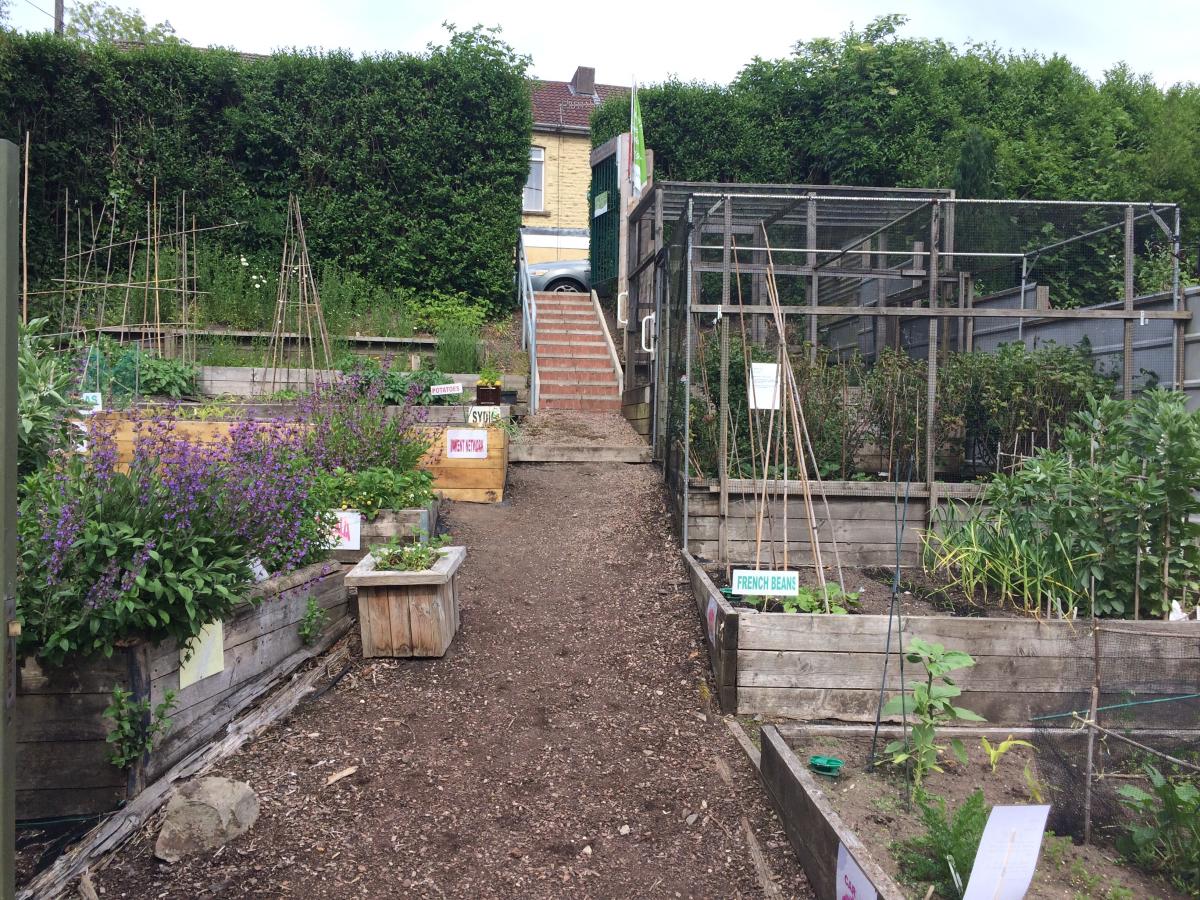
Llun: Aber Valley, Caerphilly
Mae Ffermydd Cymdeithasol a Gerddi yn galw ar gymunedau Yng Nghymru sydd am blannu ffrwythau bwytadwy a choed cnau neu ddechrau prosesu cynnyrch ffrwythau a chnau newydd fel rhan o'n prosiect Perllannau Cymunedol Cynhyrchiol. HEFYD, mae ein tîm Datblygu Rhandiroedd Cenedlaethol yn chwilio am dirfeddianwyr neu geiswyr tir i helpu i ddatblygu safleoedd rhandiroedd newydd ledled Cymru, mae'r ddau brosiect yn elfennau firaol o'n prosiect Mannau Gwyrdd Gwydn gwerth £1.27 miliwn.
Mae Mannau Gwyrdd Gwydn yn brosiect partneriaeth sy’n cael ei arwain gan Ffermydd a Gerddi Cymdeithasol er mwyn cynnal peilot o systemau bwyd ail-leoledig amgen ledled Cymru, gan ddefnyddio cymunedau a’u mannau gwyrdd fel sbardun dros newid, a hynny nes mis Mehefin 2023. Ariennir y prosiect gan Lywodraeth Cymru a’r Undeb Ewropeaidd drwy’r Gronfa Datblygu Cymunedau Gwledig fel rhan o Raglen Datblygu Gwledig Llywodraeth Cymru.
“Rydym wrth ein boddau’n lansio ein galwad am safleoedd ar gyfer perllannau cymunedol cynhyrchiol eto” meddai Gary Mitchell, Cyd-reolwr Ffermydd a Gerddi Cymdeithasol Cymru. “Mae’r gwaith hwn yn dilyn ein rownd gyntaf o geisiadau a hefyd ein prosiect Perllan dros Gymru hynod lwyddiannus yn 2020. Y tro hwn, rydym am gefnogi deg safle cymunedol sydd eisoes yn bodoli neu ddeg safle cymunedol newydd i blannu oddeutu 100 o goed ffrwythau a chnau bwytadwy a’u helpu i storio a phrosesu eu cynnyrch. Gofynnwn i unrhyw un sydd wedi bod yn ystyried y naill neu’r llall gysylltu â ni.”
Gall cymunedau â safleoedd posibl neu sefydliadau sydd â diddordeb gael rhagor o wybodaeth yma ar gyfer rhandiroedd ac yma ar gyfer perllannau , neu drwy anfon e-bost at [email protected].
I gael rhagor o wybodaeth am y prosiect Mannau Gwyrdd Gwydn, a chyfleoedd eraill ar gyfer cymunedau fel rhan o’r prosiect, ewch I wefan Ffermydd a Gerddi Cymdeithasol.
Gardeniser Pro in London
From 16th-20th May we welcomed 12 learners from across the UK and Europe to London to attend the Gardeniser Pro course.
During the week the group also got a chance to visit a wide range of gardens and farms in London, including Kentish Town City Farm and the Chelsea Physic Garden, who celebrated their 50th and 350th birthdays respectively in 2022!
We were blessed with brilliant weather and a wealth of experience from a wide range of people working in community gardens.
"The course was brilliantly structured and delivered"
"I feel the course has had a real impact on my perception and understanding of the value of different types of community gardens. It has fuelled my enthusiasm for continuing to be involved in community gardens as a volunteer and also given me a bit more confidence in my ability to initiate potential projects"
For more information on the Gardeniser programme and future course dates go to farmgarden.org.uk/our-work/gardeniser
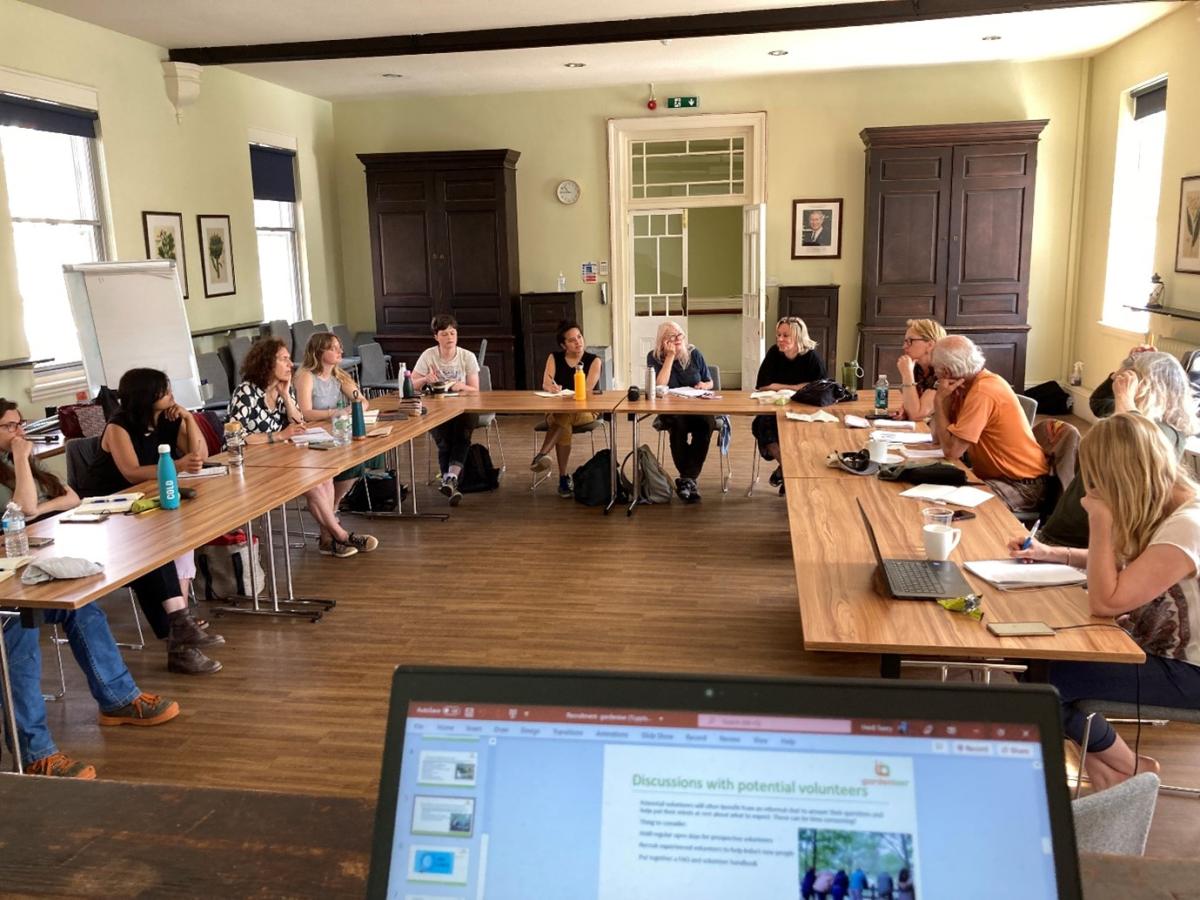
HelloFresh Grant Scheme Launches!
SF&G is delighted to announce that we have partnered with meal delivery company HelloFresh to support SF&G members in London, Edinburgh, Sheffield and Birmingham to run activies that help educate consumers about food and encourage more sustainable habits!
We have a grant of £5,000 available for a member in London, and one grant of £1,500 in each of the other three locations to run activities that support one or more of the following messages:
- Healthy eating
- Growing at home
- Reducing food waste
- Eating seasonally
The successful applicants will be entering into a one-year partnership with HelloFresh and this is a fantastic opportunity to gain media coverage about your work - we're looking for groups who aren't afraid to shout about all the amazing work they do!
To Apply
In order to apply, you must:
- Be a charity or not-for-profit organisation
- Be in central London, Edinburgh, Birmingham or Sheffield, or the immediate surrounding area
Please read the Terms and Conditions for London, and for Edinburgh, Birmingham and Sheffield for full grant conditions and requirements.
London - APPLY HERE
Edinburgh, Birmingham, Sheffield - APPLY HERE
Application Deadline
Applcations will close at 5pm, June 8th 2022.
We will let all applicants know the outcome of their application on or before June 14th.
Sustainable Food Procurement for Local Prosperity
Sustainable Food Procurement for Local Prosperity: Evaluation Brief
Budget: £12,500 evaluation + £5,000 for final recommendations and dissemination materials (Two pieces of work could be commissioned separately).
Timeframe: May 2022 – June 2023 (13 months).
Closing date for tenders is 23rd May 2022.
Project Overview
This pilot project is about creating an evidence base to prove that the public sector CAN procure efficiently from local producers using methods that benefit the natural environment and local prosperity. It will pilot the use of Food Hubs as a mechanism for local producers to provide the scale and technology needed to supply the public sector effectively.
During 2020, Covid-19 and Brexit negotiations have highlighted many of the issues that Wales faces in producing its own food, particularly food that improves the health of our nation, reduces socio-economic inequalities and enhances biodiversity.
We will support two Food Hubs (in Powys and Carmarthenshire) to expand their reach and move into procurement, whilst still delivering the Food Hub vision of a connected, local and environmentally-sound model. Procured services in the UK is a minefield of legislation, bureaucracy and paperwork, the Partnership will provide expertise and training to ensure access for Hubs and growers. We will develop and adapt existing technology to meet the needs of customers using procurement systems and provide added data to build the case for this model. Powys and Carmarthenshire rural regions are already exploring innovative approaches and collaboration to develop local supply chains. We will support them with investments to diversify and work towards the economic and environmental benefits proposed within the forthcoming Agriculture (Wales) Bill. The case studies and data we produce will be disseminated via Sustainable Food Places and other networks to encourage wider participation from large-scale purchasers, growers and rural communities.
Please click here for full details and application process
Contact for further information:
Alison Sheffield, Project Coordinator,
Social Farms & Gardens
[email protected]
07752 542 853
www.farmgarden.org.uk
Caffael Bwyd Cynaliadwy er budd Ffyniant Lleol: Briff Gwerthuso
Cyllideb: £12,500 gwerthuso + £5,000 ar gyfer argymhellion terfynol a deunyddiau dosbarthu (Gellir comisiynu dau ddarn o waith ar wahân).
Amserlen: Mai 2022 – Mehefin 2023 (13 mis).
Y dyddiad cau ar gyfer tendrau yw 23 Mai 2022.
Trosolwg o’r Prosiect
Diben y prosiect peilot hwn yw creu sylfaen dystiolaeth i brofi y GALL y sector cyhoeddus gaffael mewn ffordd effeithlon gan gynhyrchwyr lleol trwy ddefnyddio dulliau sydd o fudd i’r amgylchedd naturiol a ffyniant lleol. Bydd yn peilota defnyddio Hybiau Bwyd fel cyfrwng i gynhyrchwyr lleol ddarparu maint y cynnyrch a’r dechnoleg sydd eu hangen i gyflenwi’r sector cyhoeddus mewn ffordd effeithiol.
Yn ystod 2020, mae Covid-19 a thrafodaethau ar destun Brexit wedi amlygu llawer o’r problemau sy’n wynebu Cymru o ran cynhyrchu bwyd ei hun, yn enwedig bwyd sy’n gwella iechyd y genedl, sy’n lleihau anghydraddoldebau economaidd-gymdeithasol, ac sy’n cyfoethogi bioamrywiaeth.
Byddwn yn cefnogi dau Hwb Bwyd (ym Mhowys a Sir Gâr) i ehangu eu cyrhaeddiad a symud i faes caffael, ac ar yr un pryd gwireddu gweledigaeth Hybiau Bwyd o ran model cysylltiedig, lleol sy’n gadarn o safbwynt amgylcheddol. Mae caffael gwasanaethau yn y DU yn dir peryglus o ran deddfwriaeth, biwrocratiaeth a gwaith papur, a bydd y Bartneriaeth yn cynnig arbenigedd a hyfforddiant i sicrhau mynediad ar gyfer Hybiau a thyfwyr. Byddwn yn datblygu ac yn addasu technoleg gyfredol i ddiwallu anghenion cwsmeriaid trwy ddefnyddio systemau caffael, a darparu data ychwanegol i adeiladu’r achos dros y model hwn. Mae rhanbarthau gwledig Powys a Sir Gâr eisoes yn ystyried dulliau gwaith a chydweithio arloesol i ddatblygu cadwyni cyflenwi lleol. Byddwn yn rhoi cefnogaeth iddynt trwy fuddsoddiad i arallgyfeirio a gweithio tuag at y buddion economaidd ac amgylcheddol arfaethedig sy’n rhan o Fil Sector Amaethyddol (Cymru) sydd ar fin ei gyhoeddi. Caiff yr astudiaethau achos a’r data a gynhyrchir eu dosbarthu trwy Leoliadau Bwyd Cynaliadwy a rhwydweithiau eraill i annog mwy o brynwyr mawr, tyfwyr a chymunedau gwledig i gymryd rhan.
Cliciwch yma am fanylion llawn a'r broses ymgeisio
Am fwy o wybodaeth, cysylltwch â:
Alison Sheffield, Cydlynydd y Prosiect,
Ffermydd a Gerddi Cymdeithasol
[email protected]
07752 542 853
www.farmgarden.org.uk
Cosmic Composting
This International Composting Awareness Week (1st - 7th May) we take a look at why Composting is so important for the environment and the health of our planet.
Composting is the natural process of recycling organic matter, such as leaves and food scraps, into a valuable fertiliser that can enrich soil and plants. At the simplest level, composting requires gathering a mix of 'Greens' and 'Browns'. Greens are materials that are rich in nitrogen such as leaves, grass, and food scraps. Browns are more woody materials that are rich in carbon, such as stalks, paper, and wood chips. The resulting mixture is rich in plant nutrients and organisms such as worms and fungal mycelium.
Why is composting important?
Composting our own garden and household food waste gives us an amazing soil food of the highest possible quality, for all the biological life our soils need for plants to grow and produce healthy, nutrient dense food for us.
It can also be a great community-enhancing physical activity that reduces both waistlines and waste miles - so less fuel costs, less carbon emissions, and lots of lovely carbon locked up in humus where it makes our soils healthier for years to come.
Soil and the stars
We spoke to John McClean Master Composter who says:
“When we make compost, we are working intimately with natural forces & natural processes. Within our compost bins are some of the building blocks of the universe itself, created in the distant past the core of stars, the very materials every living thing, including ourselves, are made from. With our compost we help plants extract from the soil those elements they need to live and thrive.”
“Our compost is the perfect environment for microbial life to thrive. Microbial life helps make these nutrients available to the plants in a format they can easily absorb. At the end of the day the moral of the story, if you want healthy, sustainable, nutrient rich plants, is to feed the soil with quality organic matter in the form of compost, not the plants themselves.”
Watch John’s fascinating video on composting below and head to our 'Composting' playlist on YouTube to see more vidoes featuring John.
Get composting!
Join the Community Composting Network - an independant network of people interested in composting supported by SF&G - find out more
If you are new to composting, or just want to improve your existing compost heap, our team in Northern Ireland have put together the top tips and resources to help you get on top of your compost!
School Farms Day 2022 highlights
It was fantastic to see all the successes of the first ever School Farms Day over the weekend - an event which celebrates the impact of the 130+ School Farms across the UK.
Abbey Court, a special school for pupils aged 3-19 with severe and profound learning difficulties, held a range of wonderful activities including pygmy goat walking, meet the Shetland Ponies, chicken ‘close encounters’ and planting.
Ramsey Grammar School, Isle of Mann, welcomed the public in for a huge celebration of Manx Agriculture, sustainability and school farm life – the event attracted a lot of great publicity from press and local groups and families enjoyed treasure hunts, competitions, food and animal events!
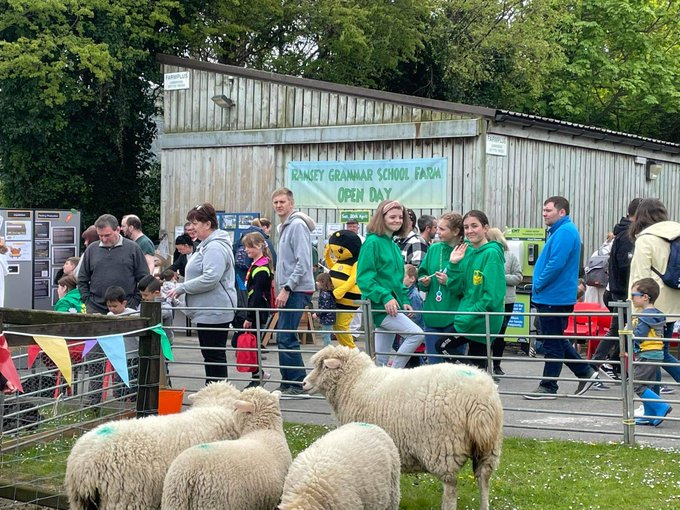
The North School's farm held a wonderful Spring Fair and King's Oak Farm had 'animal encounters with rabbits, guinea pigs and goats' on their rural grounds, as well as giveaways and a brilliant photo competition. Longlands Primary School Farm wowed families with a double decker activity bus, a bouncy castle, face painting and walk the school goat activities! They also used the opportunity to raise money for the farm, and were joined by the MP for North Shropshire and the Mayor of Market Drayton.
Some School Farms celebrated by sharing their work online. The brilliant virtual tours and videos by Brockhill Park pupils showed why school farms are important and how the pupils are able to gain amazing experience in animal husbandry. Sir Robert Geffery's School Farm celebrated with a great photo farm tour, featuring Polly the donkey and Big Doris the chicken.
The event really showcased the work that School Farms do and how they transform young lives. School Farms Day will be back next year over the last weekend in April.
Why are School Farms important all year round?
There are over 130 School Farms across the UK, enabling young people to learn outdoors in nature. Young people are trusted and given responsibility, and carry out key farming activities such as feeding and caring for animals, growing and selling produce and using machinery.
Farming activities are linked to the curriculum and support ofsted inspections - numeracy and literacy is learnt through fun, visual and hands on activities such as weighing and feeding animals. Educational attainment has been shown to increase in schools with an active school farm, and results show that there are huge benefits to self esteem, confidence, mental health, skills and opportunities.
The impact for young people is life changing - especially for those that are struggling in mainstream schools or have special educational needs and need a different type of education.
School Farms equip future generations to tackle the challenges ahead - including
- sustainable farming and growing
- food chains and growing local produce
- business and entreprenurial green sector skills
- caring for nature and the environment
Find out more on the School Farms Network
New Productive Community Orchards to be developed in Wales!
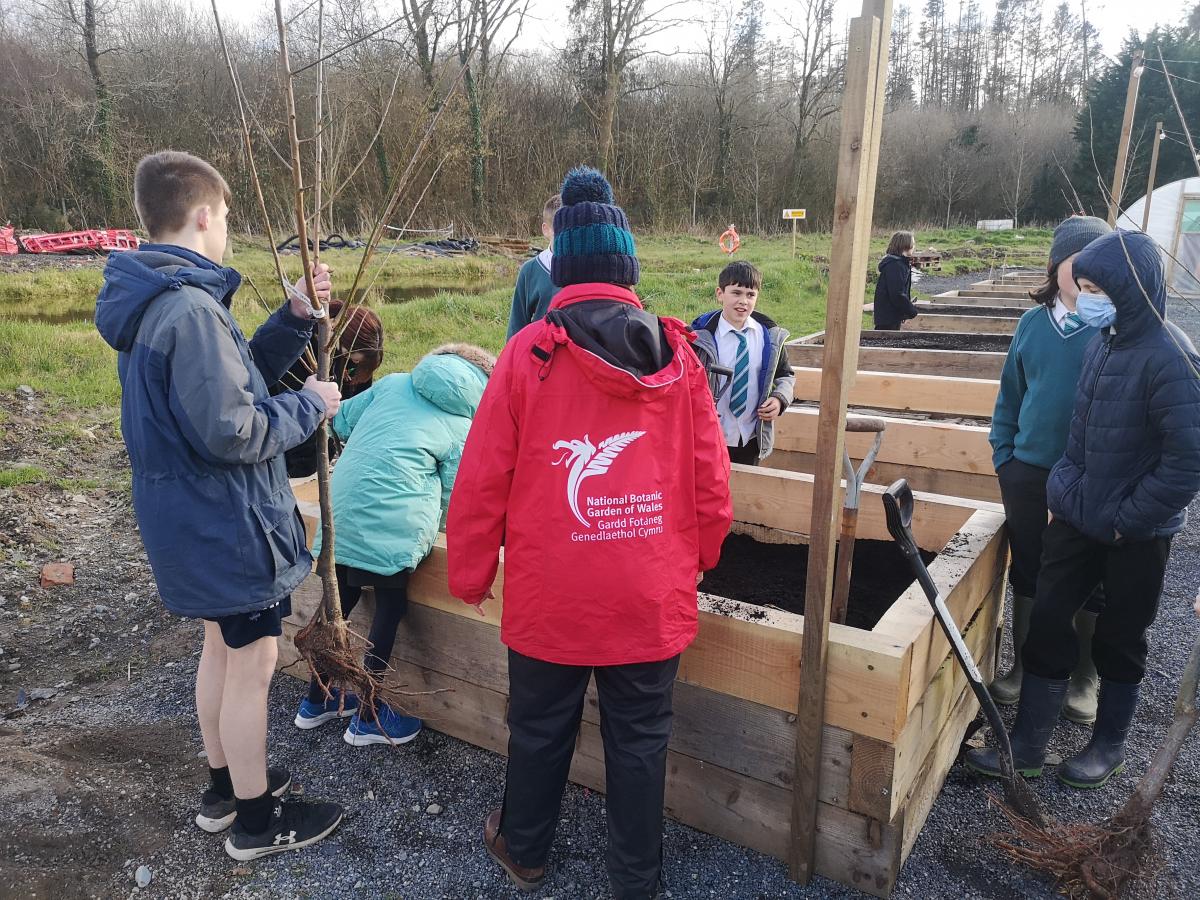
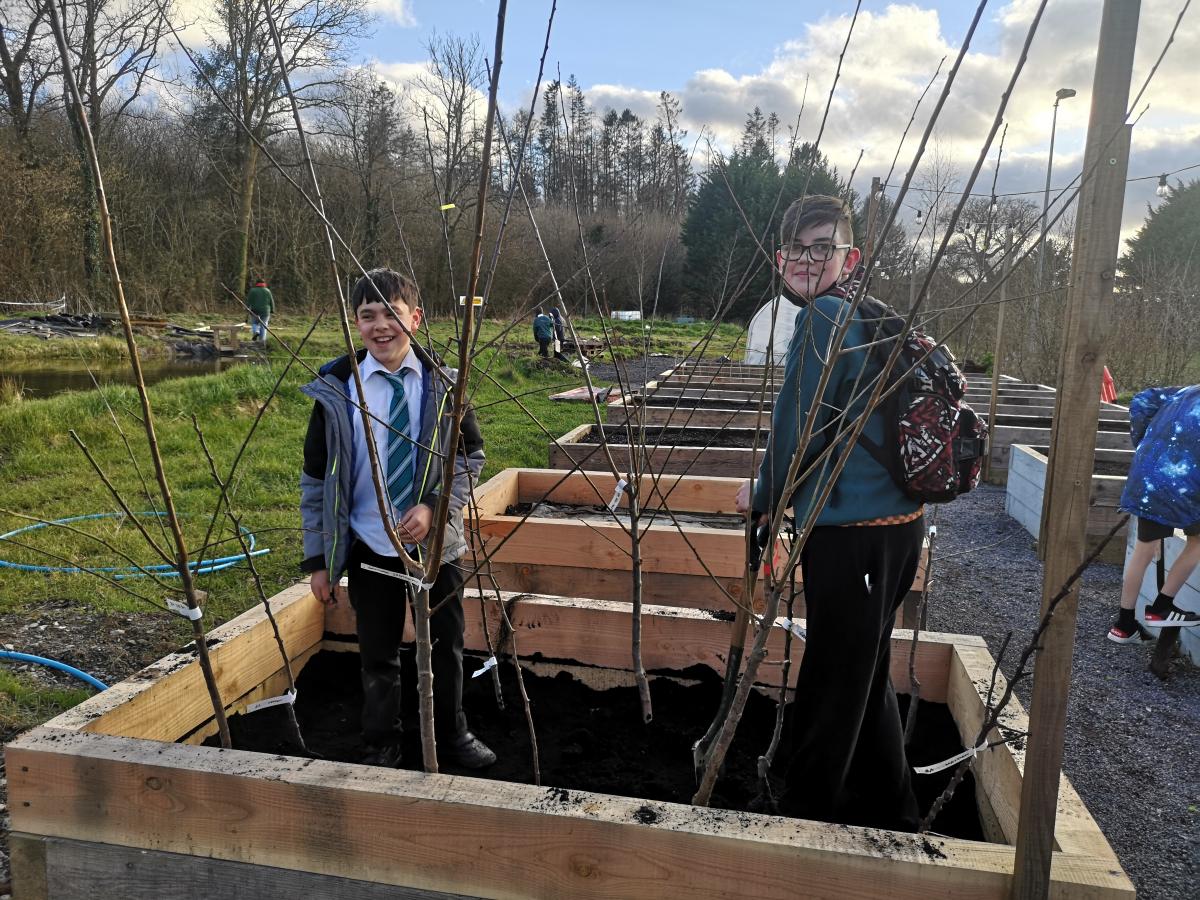
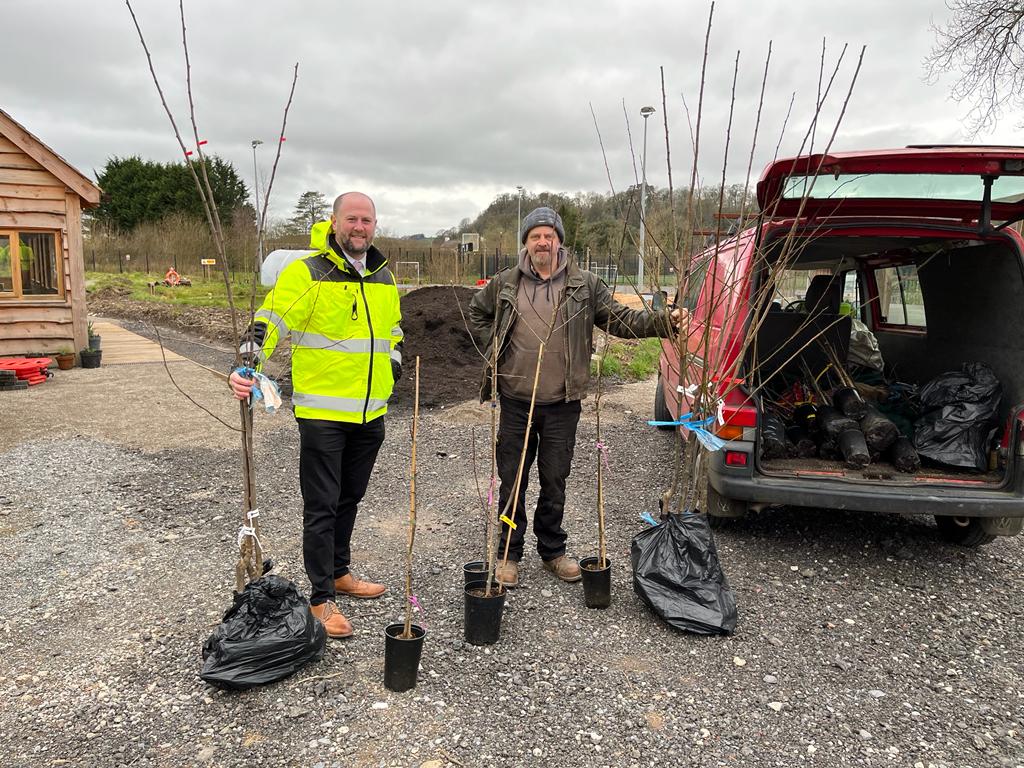
Resilient Green Spaces is a £1.27m partnership project being led by Social Farms & Gardens to pilot alternative re-localised food systems using communities and their green spaces as the driving force for change across Wales until June 2023. This project is funded through the Welsh Government Rural Communities - Rural Development Programme 2014-2020, which is funded by the Welsh Government and the European Union.
Seven Community Orchard sites across Wales have recently had trees, equipment, tools and storage delivered as part of a programme of support from Social Farms & Gardens’ Orchards strand of the organisation’s Welsh Government funded Resilient Green Spaces project.
In autumn 2021, the UK community growing and farming support charity asked sites to tell them how they felt their local community would be helped by further developing their orchard. After a rigorous application process, which included virtual and in-person visits to the proposed sites, seven were chosen to be recipients of the first round of support.
The work builds on Social Farms & Gardens’ success working with communities to plant hundreds of new orchards across Wales. The charity is working with sites to pilot, monitor and evaluate the economic benefits that community orchards could provide in addition to well-recognised social and environmental benefits. The project seeks to ignite a positive change in community owned fruit production, storage, processing and fruit-based products for Wales.
The initial trench of successful organisations are: Cae Tan CSA (Swansea), Ysgol Bro Dinefwr (Llandeilo), Summit Good (Swansea), Tir Coed (Rhayader), Lambston Parish Resident’s Association (Pembrokeshrie), The Wilderness Trust (Llanidloes) and Clynfyw Care Farm (Pembrokeshire).
The sites will receive, as well as the trees, equipment, tools and storage, training and professional advice for the progression and development of their Orchards. All the trees supplied were sourced from Welsh suppliers and were grown locally.
These groups are part of the first round of successful applicants; Social Farms & Gardens will be opening the second round of applications very soon – for more information contact [email protected] or https://www.farmgarden.org.uk/resilient-green-spaces/productive-communit...
Each of the sites was chosen for their experience, future plans and capacity to deliver. They are exemplar sites, doing incredible work:
Cae Tan CSA
Based on The Gower Peninsula in South Wales, Cae Tan CSA is a Community Supported Agriculture Project that grows and supplies fresh, seasonal, biodynamic produce to their members. They also provide training and volunteering opportunities to a range of groups and individuals, also working with local schools to raise awareness of sustainable farming and reconnect young people to the land and their food.
You can find more on Cae Tan CSA on their website here: http://www.caetancsa.org/en/
Ysgol Bro Dinefwr
Based in Llandeilo in Carmarthenshire, Ysgol Bro Dinefwr is a bilingual, English language/Welsh language comprehensive school for pupils ages 11 – 18. Their key aim is ‘to challenge and support pupils to become confident and effective learners by providing them with an inclusive and caring environment that places pupils’ wellbeing at the heart of everything they do’.
Ian Chriswich, Assistant Headteacher at Ysgol Bro Dinefwr said, "This is an exciting new project that we hope will not just benefit our pupils but the local community. It will act as a vehicle for us to forge better working relationships with local groups of people and contribute towards us developing a circular economy around the school."
You can find more on Ysgol Bro Dinefwr on their website here: https://www.brodinefwr.org.uk/about-us
Summit Good
Summit Good is a Swansea-based Social Enterprise with a focus on eating, growing and doing good. They support Community Support Agriculture, provide a space that helps people ‘doing Summit Good together’, and empower new initiatives looking to grow local.
Joshua Pike, from Summit Good talks about the benefits their funding has brought about, “The new orchard we’ve planted has been a beautiful focus point for the users of our men’s shed and women’s shed groups, learning to plant trees and manage their growth has given people confidence and revitalised sense of accomplishment and ownership with the project. Our project looks to manage the space underneath the trees with chickens to produce eggs that will accompany the fruit from the trees and increase the availability of local produce in our community.”
You can find more on Summit Good on their website here: https://www.dosummitgood.co.uk/
Tir Coed
Based in Rhayader, Powys, Tir Coed is a charity that engages people with woodlands through volunteering, training and bespoke activities that increase wellbeing, develop skills and improve woodlands for the benefit of everyone. They work as a partner in the Elan Links Project delivering the experience and education stream of this partnership by providing opportunities to experience the Elan Valley through volunteering, education and training.
You can find more on Tir Coed on their website here: https://tircoed.org.uk/
Lambston Parish Resident’s Association
The Lambston Parish Resident’s Association is a small community association providing events and small projects for the old parish of Lambston in Pembrokeshire. Their involvement in the management of their disused common, allowing them to open new paths with fruit and nut trees.
You can find more on the Lambston Parish Resident’s Association on their Facebook page here: https://www.facebook.com/lambstonresidentsassociation
The Wilderness Trust
Based in Tylwch, Llanidloes, The Wilderness Trust have started a new project – The Hanging Gardens Project – to look at a collaborative way of creating a more resilient and sustainable local community. They are building a green hub in the centre of Llanidloes, working with all sectors of the community to find solutions to declining biodiversity in the area.
You can find more on The Wilderness Trust on their website here: http://thewildernesstrust.org/
Clynfyw Care Farm
Clynfyw is a 395-acre organic farm and woodland in North Pembrokeshire. The care farm supports people with learning disabilities and mental health unwellness and are actively involved in wider community development with a direct focus on resilience.
You can find more on Clynfyw Care Farm on their website here: https://www.clynfyw.co.uk/
We look forward to working with these groups and will post regular updates and progress here, and on our social media channels!
Expressions of Interest
The 2022 round will open again soon – if you’re interested in applying, sign up to our mailing list so you’re the first to know! You can do so here: https://www.farmgarden.org.uk/join-our-mailing-list
Otherwise, keep an eye on our website and social media accounts for all breaking news and exciting developments of the project!
Website: https://www.farmgarden.org.uk/resilient-green-spaces/productive-communit...
Twitter: https://twitter.com/SFarm_GardenCym
Facebook: https://www.facebook.com/farmgarden.wales

Prosiect partneriaeth gwerth £1.27m yw Mannau Gwyrdd Gwydn sy’n cael ei arwain gan Ffermydd a Gerddi Cymdeithasol i beilota systemau bwyd amgen a adleoliwyd, trwy ddefnyddio cymunedau a’u mannau gwyrdd fel sbardun ar gyfer newid ledled Cymru tan Fehefin 2023. Cyllidir y prosiect trwy raglen Cymunedau Gwledig Llywodraeth Cymru - y Rhaglen Datblygu Gwledig 2014-2020, a gyllidir gan Lywodraeth Cymru a’r Undeb Ewropeaidd.
Yn ddiweddar anfonwyd coed, cyfarpar, offer a siediau at saith o safleoedd Perllannau Cymunedol ar draws Cymru fel rhan o raglen cymorth elfen Perllannau Ffermydd a Gerddi Cymdeithasol trwy eu prosiect Mannau Gwyrdd Gwydn, a gyllidir gan Lywodraeth Cymru.
Yn ystod hydref 2021, gofynnodd yr elusen sy’n rhoi cymorth i dyfu a ffermio cymunedol yn y DU i safleoedd ddweud wrthynt beth fyddai o gymorth i’w cymuned leol wrth ddatblygu’r berllan ymhellach. Yn sgil proses ymgeisio drwyadl, oedd yn cynnwys ymweliadau rhithiol a rhai wyneb yn wyneb â’r safleoedd arfaethedig, dewiswyd saith ohonynt i dderbyn cymorth yn y rownd gyntaf.
Mae’r gwaith yn adeiladu ar lwyddiant Ffermydd a Gerddi Cymdeithasol o ran gweithio gyda chymunedau i blannu cannoedd o berllannau newydd ledled Cymru. Mae’r elusen yn gweithio gyda safleoedd i redeg cynlluniau peilot, i fonitro a gwerthuso manteision economaidd perllannau cymunedol yn ogystal â manteision cymdeithasol ac amgylcheddol amlwg. Nod y prosiect yw ennyn newid positif mewn perthynas â chynhyrchu, cadw, a phrosesu ffrwythau sy’n eiddo i’r gymuned ac o ran cynnyrch sy’n gysylltiedig â ffrwythau yng Nghymru.
Y sefydliadau llwyddiannus cyntaf yw: Cae Tân CSA (Abertawe), Ysgol Bro Dinefwr (Llandeilo), Summit Good (Abertawe), Tir Coed (Rhaeadr Gwy), Cymdeithas Trigolion Plwyf Lambston (Sir Benfro), The Wilderness Trust (Llanidloes) a Fferm Gofal Clynfyw (Sir Benfro).
Bydd y safleoedd yn derbyn cyfarpar, offer a siediau yn ogystal â’r coed a hyfforddiant a chyngor proffesiynol er mwyn datblygu eu perllannau. Mae’r holl goed a gyflenwyd yn dod o gwmnïau Cymreig a chawsant eu tyfu’n lleol.
Y grwpiau hyn sy’n rhan o rownd gyntaf yr ymgeiswyr llwyddiannus; bydd Ffermydd a Gerddi Cymdeithasol yn agor ail rownd y broses ymgeisio’n fuan iawn – am fwy o wybodaeth, cysylltwch â: [email protected] neu https://www.farmgarden.org.uk/resilient-green-spaces/productive-communit...
Dewiswyd pob un o’r safleoedd oherwydd eu profiad, cynlluniau’r dyfodol a’u capasiti i wireddu eu cynlluniau. Maent yn safleoedd enghreifftiol, sy’n gwneud gwaith anhygoel:
Cae Tân CSA
Mae Cae Tân CSA, ar Benrhyn Gŵyr yn Ne Cymru, yn brosiect Amaethyddiaeth a Gefnogir gan y Gymuned, sy’n tyfu ac yn cyflenwi cynnyrch ffres, tymhorol, biodeinameg i aelodau. Hefyd maent yn cynnig hyfforddiant a chyfleoedd gwirfoddoli i ystod o grwpiau ac unigolion, yn ogystal â gweithio gydag ysgolion lleol i godi ymwybyddiaeth am ffermio cynaliadwy, ac i ailgysylltu pobl ifanc â’r tir a’u bwyd.
Gellir dysgu mwy am Cae Tan CSA trwy eu gwefan: http://www.caetancsa.org/en/
Ysgol Bro Dinefwr
Ysgol yn Llandeilo, Sir Gâr yw Ysgol Bro Dinefwr, sy’n ysgol uwchradd ddwyieithog (Cymraeg/Saesneg) ar gyfer disgyblion 11 - 18 oed. Eu prif nod yw ‘herio a chefnogi disgyblion i fod yn ddysgwyr hyderus ac effeithiol trwy ddarparu amgylchfyd cynhwysol a gofalgar iddynt sy’n gosod llesiant disgyblion wrth galon popeth maent yn ei wneud’.
Meddai Ian Chriswich, Pennaeth Cynorthwyol Ysgol Bro Dinefwr, "Mae hwn yn brosiect cyffrous newydd, a’n gobaith yw nad y disgyblion yn unig fydd yn elwa ohono, ond y gymuned leol hefyd. Bydd yn gyfrwng inni feithrin cysylltiadau gweithio gwell gyda grwpiau lleol a chyfrannu at ddatblygu economi gylchol o gwmpas yr ysgol."
Gellir dysgu mwy am Ysgol Bro Dinefwr ar eu gwefan: https://www.brodinefwr.org.uk/about-us
Summit Good
Menter Gymdeithasol o Abertawe yw Summit Good gyda ffocws ar fwyta, tyfu a gwneud yn dda. Maent yn cefnogi Amaethyddiaeth a Gefnogir gan y Gymuned, yn cynnig gofod sy’n helpu pobl i wneud pethau da gyda’i gilydd, ac yn grymuso mentrau newydd sydd am dyfu’n lleol.
Mae Joshua Pike, o Summit Good yn sôn am y manteision sy’n deillio o’r cyllid a dderbyniwyd, “Mae’r berllan newydd a blannwyd wedi bod yn ffocws hyfryd ar gyfer defnyddwyr ein grwpiau sied dynion a sied merched, yn dysgu plannu coed, ac mae rheoli eu tyfiant wedi rhoi hyder i bobl ac wedi ail-ddeffro teimlad o gyrhaeddiad a pherchnogaeth gyda’r prosiect. Mae’r prosiect hefyd yn ymdrechu i reoli’r tir dan y coed gydag ieir sy’n dodwy wyau fydd yn ategu’r ffrwythau o’r coed, ac yn cynyddu argaeledd cynnyrch lleol yn ein cymuned.”
Ceir mwy o wybodaeth am Summit Good trwy eu gwefan: https://www.dosummitgood.co.uk/
Tir Coed
Elusen yn Rhaeadr Gwy, Powys yw Tir Coed, sy’n ymgysylltu â phobl sydd â choetiroedd trwy weithgareddau gwirfoddol, hyfforddiant a gweithgareddau pwrpasol sy’n meithrin llesiant, yn datblygu sgiliau ac yn gwella coetiroedd er budd pawb. Maent yn gweithio fel partner ar Brosiect Elan Links i gyflwyno ffrwd profiad ac addysg y bartneriaeth trwy ddarparu cyfleoedd i fwynhau Cwm Elan trwy wirfoddoli, addysg a hyfforddiant.
Gellir dysgu mwy am waith Tir Coed trwy eu gwefan: https://tircoed.org.uk/
Cymdeithas Trigolion Plwyf Lambston
Cymdeithas gymunedol fach yw Cymdeithas Trigolion Plwyf Lambston sy’n darparu digwyddiadau a phrosiectau bach ar gyfer hen blwyf Lambston yn Sir Benfro. Trwy eu cyfraniad at reoli’r hen dir comin oedd yn segur bellach, llwyddwyd i agor llwybrau newydd gyda choed ffrwythau a chnau.
Gellir dysgu mwy am Gymdeithas Trigolion Plwyf Lambston trwy eu tudalen Facebook: https://www.facebook.com/lambstonresidentsassociation
The Wilderness Trust
Mae’r Wilderness Trust, a leolir ym mhentref Tylwch, Llanidloes wedi cychwyn prosiect newydd - Prosiect y Gerddi Crog -er mwyn ystyried ffordd gydweithredol o greu cymuned leol fwy gwydn a chynaliadwy. Maent yn creu hwb gwyrdd yng nghanol tref Llanidloes, trwy weithio gyda phob sector o’r gymuned, i gael hyd i atebion i ymateb i fioamrywiaeth yr ardal sy’n dirywio.
Mae mwy o fanylion am The Wilderness Trust ar gael trwy eu gwefan: http://thewildernesstrust.org/
Fferm Gofal Clynfyw
Fferm organig a choetir, 395 erw yw Clynfyw yng Ngogledd Sir Benfro. Mae’r fferm gofal yn cefnogi pobl gydag anableddau dysgu ac afiechyd iechyd meddwl, ac maent yn cyfrannu hefyd at brosiectau datblygu cymunedol ehangach gyda ffocws penodol ar wydnwch.
Ceir mwy o fanylion am Fferm Gofal Clynfyw ar eu gwefan: https://www.clynfyw.co.uk/
Edrychwn ymlaen at weithio gyda’r grwpiau hyn, a byddwn yn cyhoeddi diweddariadau rheolaidd a gwybodaeth am eu cynnydd fan hyn, ac ar ein sianeli cyfryngau cymdeithasol!
Datganiadau o Ddiddordeb
Bydd rownd 2022 yn agor eto’n fuan – os oes gennych ddiddordeb mewn cyflwyno cais, cofrestrwch ar gyfer ein rhestr bostio er mwyn derbyn y manylion cyn gynted â phosibl! Gellir gwneud hynny fan hyn: https://www.farmgarden.org.uk/join-our-mailing-list
Fel arall, cadwch lygaid ar ein gwefan a’n cyfrifon ar gyfryngau cymdeithasol ar gyfer y newyddion diweddaraf a datblygiadau cyffrous o ran y prosiect!
Gwefan: https://www.farmgarden.org.uk/resilient-green-spaces/productive-communit...
Twitter: https://twitter.com/SFarm_GardenCym
Facebook: https://www.facebook.com/farmgarden.wales

Growing Care Farming final report
The Growing Care Farming Final Report gives a detailed evaluation of the project.
Growing Care Farming project insight report
View or download the Growing Care Farming project insight report.
The power of green: how community gardens tackle our biggest challenges
A community that ‘grows’ is a healthy community. Up and down the UK, thousands of humble community gardens and green spaces are tackling some of our biggest challenges. Community gardens provide a myriad of outcomes to address current challenges facing our society, bringing together people from many different communities and cultures.
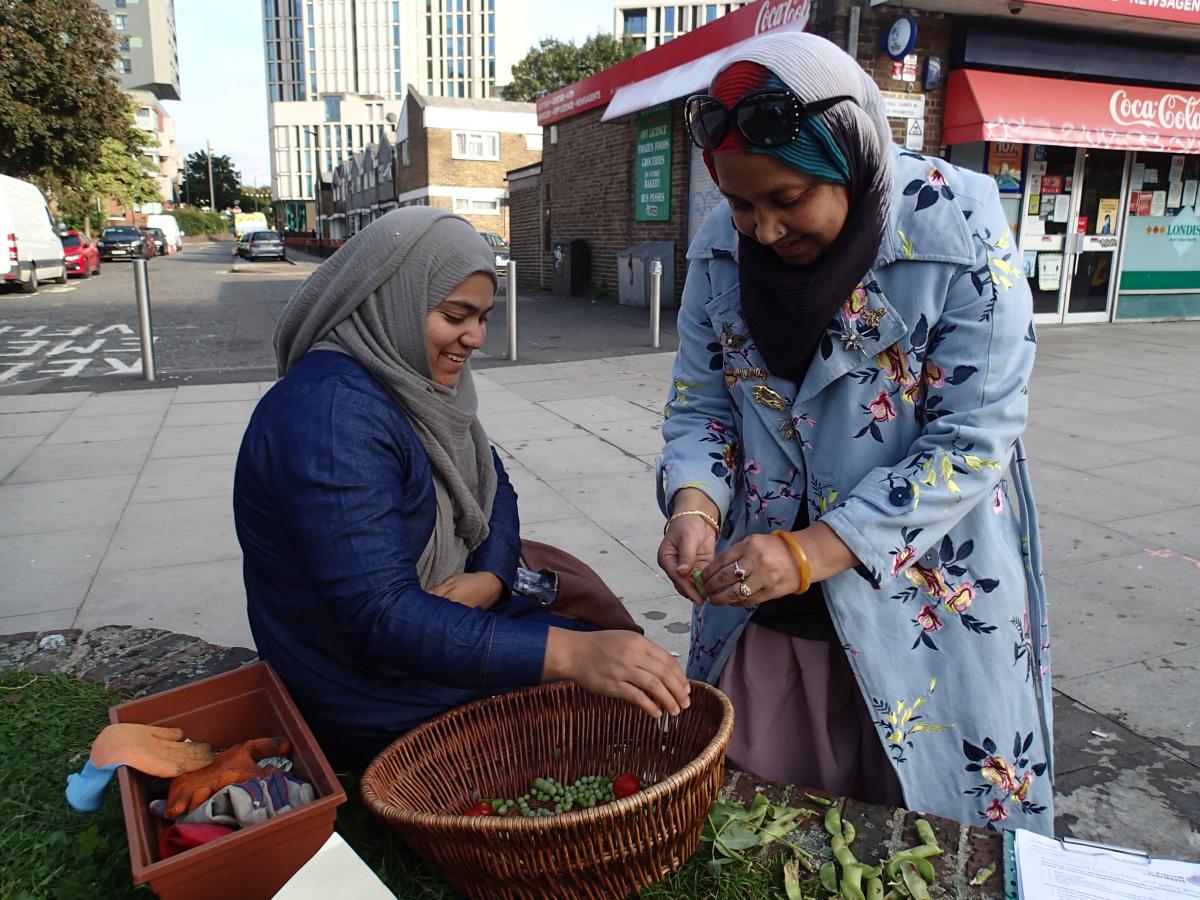
We spoke to our team from around the UK; Caroline Hutton (Social Farms & Gardens Trustee and former Director at Martineau Gardens, Birmingham) Gary Mitchell (Social Farms & Gardens Wales Manager) and Patricia Wallace (Social Farms & Gardens Northern Ireland Manager) about what community gardens do, whey they’re important and how these small often overlooked pockets of green could help us tackle some of the biggest issues facing our society.
“Community gardens bring together people who might never meet otherwise. There is a shared enjoyment and connection of being outdoors, the pleasure of seeing plants grow and noticing the wildlife that depends on the plants. They provide a place of learning for adults and children who have little contact with the natural environment”, Caroline. Community gardens provide opportunities for people who may be living with disability, mental ill health or other issues that exclude them from society to volunteer gaining companionship, new skills and sense of self worth.
Gary “One of the beauties of supporting Community Gardening at a UK wide level is to see, hear & gain the opportunity to literally get your hands dirty across a huge variety of community gardens settings. No two community gardens are the same, many have specific areas of focus (mental wellbeing, climate, Social Cohesion, skills & training) but many don’t, choosing to operate an open door policy across a range of social interests.”
In times of crisis throughout history, local food production by communities has often witnessed a huge surge in scale; we witnessed this through this pandemic, where community growing strengthened community resilience and bought people together, as well as providing food to local people.
Gary says “Often food growing is not the key focus, favouring social outputs over production. With over 1000 community gardens, there is a huge groundswell of activity right across the UK.” In Belfast we have seen a phenomenon of alleyway gardens spring up around the city, turning unloved alleyways into places where people from all ages and backgrounds can meet in a safe space. In London people are turning small plots on housing estates into community growing projects. People all over the UK are coming together to grow, and feeling more connected because of it.
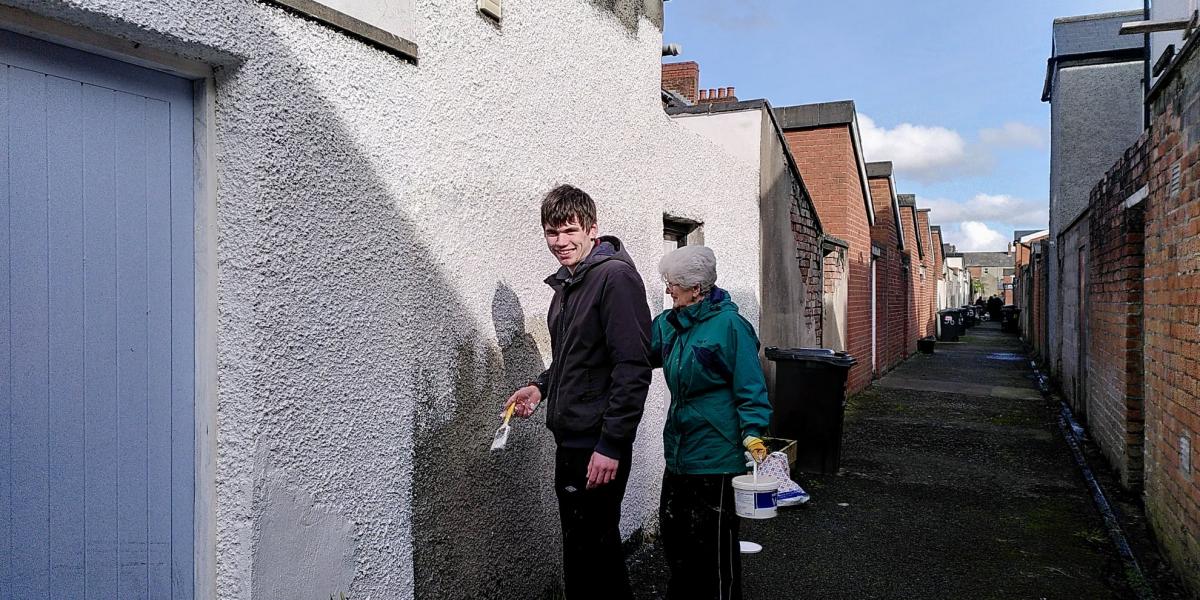
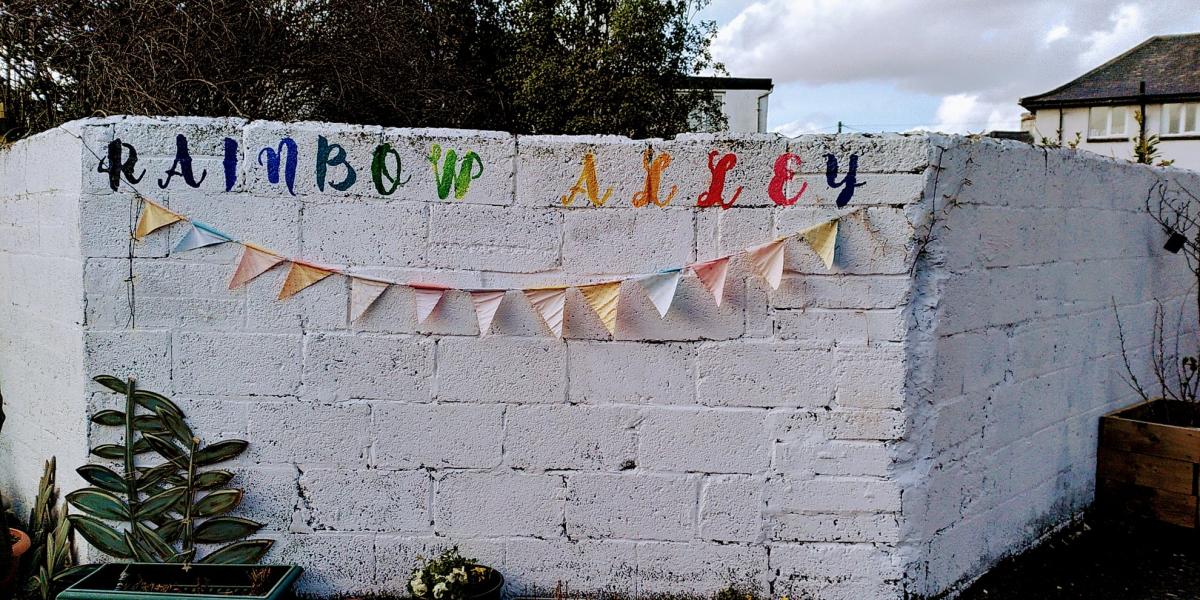
Gary says “With the Climate and Nature emergencies high on everyone agenda it’s important to recognise the vast contribution community gardens make to these important issues. Often community gardens are exemplars of best practice in things like pollination, pesticide reduction, water saving etc.”
“We know from the global discussions at COP26 that we need to grow more local food, and in a regenerative way in harmony with nature reducing the use of chemicals used and looking after our soil health for future generations. Climate change can feel like a global problem that the individual can do little about. A community garden is a practical local example of where individuals coming together as a community group can make a positive impact on wildlife and nature.” Patricia
People often describe community gardens as a lifeline. They can be an oasis of green in a busy polluted city or that special place in the village that brings people together. In all cases, they are places that are growing ‘Community’.
Social Farms & Gardens works with over 1000 community gardens and have been working for over 40 years to ensure that that number grows. We work with local authorities to ensure that public land can be leased, licensed or transferred to communities for food growing, if you’d like support to set up your own community garden, download our free resource here.

Key care farming organisations and networks
Key care farming organisations and networks
We've collated some important organisations and peer support networks that could be useful for care farmers.
1. Local Infrastructure Organisations
Local Infrastructure Organisations are third sector organisations who support the work of other groups in the local voluntary, community, faith and social enterprise sector. They are the voice of the local third sector, providing their members with a range of services and development support. Examples of these types of organisations are a local Council for Voluntary Service (CVS), a volunteer centre, local Voluntary Action provider or specialist local support and development organisation.
Most LIOs are members of the National Association for Voluntary and Community Action (NAVCA). The NAVCA website has an interactive map to help you find and contact your local infrastructure organisation.
2. Existing green networks
We are aware of several care farming, green care and green social prescribing peer networks in areas across England, but there could be more out there. If you enjoy networking in your local area but haven't got a local network, you could consider starting one in your area.
- Yorkshire & Humber Care Farming Network - please email [email protected] for more information
- Norfolk Green Care Network
- Reading Green Wellbeing Network
- Gloucestershire Green & Blue Social Prescribing Network - please email [email protected] for more information
- Southampton Green Network
- Schools Farms Network
- Nature & Health Practitioners Network
3. DEFRA Green Social Prescribing Test & Learn projects
Green social prescribing means linking people to nature-based activities such as care farming and green care.The UK government, NHS England, NHS Improvement, Sport England and the National Academy for Social Prescribing (NASP) have announced investment for preventing and tackling mental ill-health through green social prescribing.
Through social prescribing, GPs and healthcare professionals can refer people to link workers, who give people time and focus on what matters to them. For some people this will be green social prescribing, nature-based interventions and activities such as local walking for health schemes, community gardening and food-growing projects.
Find out more about green social prescribing on our website or visit NHS England for a list of test sites and more information about the project.
4. Integrated Care Systems (ICS)
Integrated Care Systems plan heath and care services to meet the needs of their local area. They include providers and commissioners of NHS services local authorities and local partners. Find out more about ICS on our website or visit NHS England.
5. National Academy of Social Prescribing
NASP is dedicated to the advancement of social prescribing through promotion, collaboration and innovation. The organisation creates cross-sector partnerships to promote health and wellbeing at a national and local level. They champion social prescribing and the work of local communities in connecting people for wellbeing.
NASP runs programmes including:
- Thriving Communities Programme - a national support programme for voluntary, community, faith and social enterprise groups, supporting communities impacted by COVID19 in England, working alongside social prescribing link workers.
- Learning Together programme - provides opportunities to share learning, gain new ideas, access funding and develop partnerships on a more local level for any organisations interested in starting to deliver, or increasing their capacity to deliver social prescribing activities. There are seven Regional Leads for England and an online network.
Related articles
How City Farms support young people
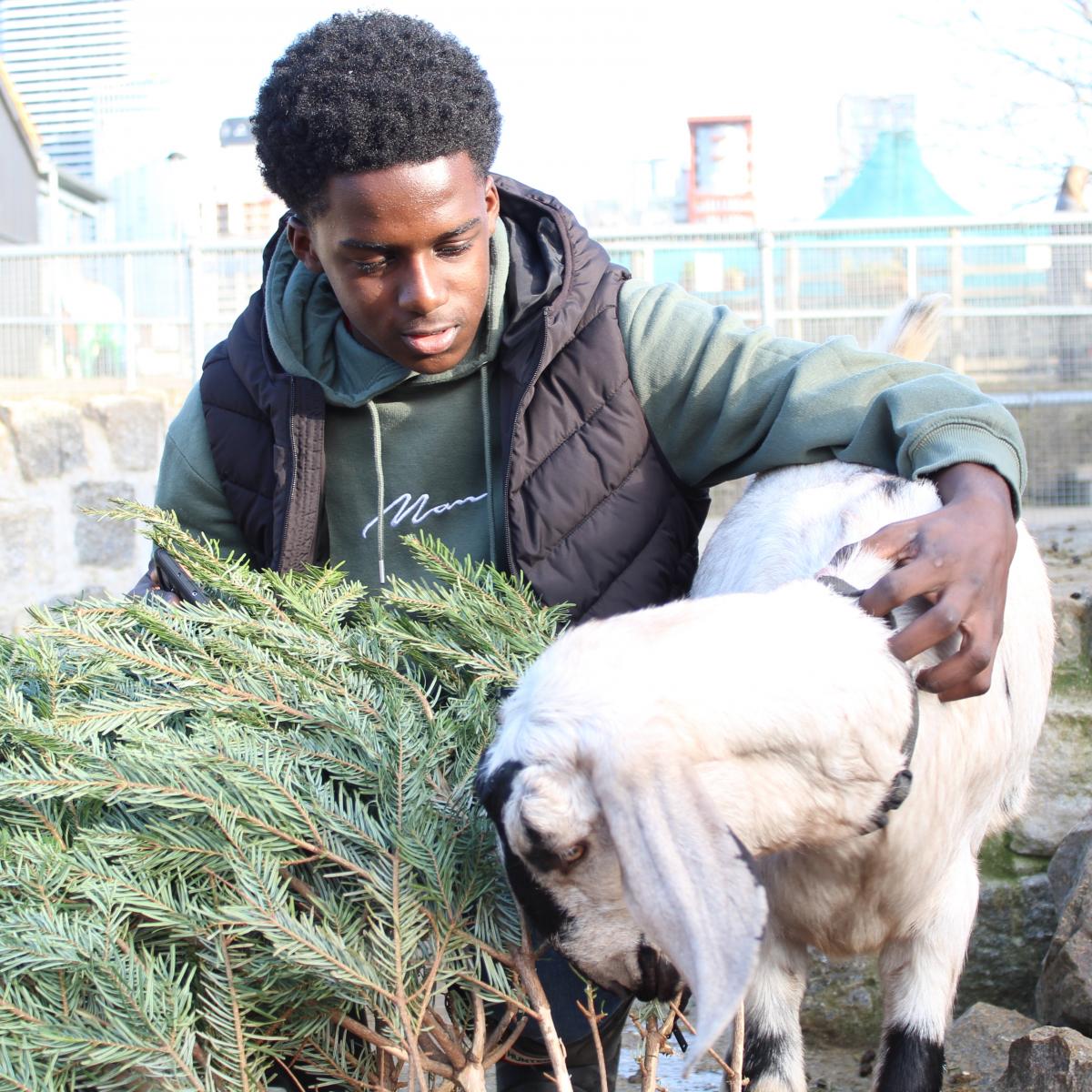
There are currently over 50 City Farms across the UK, providing vital services that help young people connect with the natural world, food, farming and the wider community.
Why are City Farms important for Young People?
Young people living in the most deprived areas of our cities face economic disadvantage, family fracturing, disability, caring responsibilities, mental health issues, gang and drug problems, lack of job prospects and limited access to nature.
The Impact of the Pandemic
The provision for young people has worsened during the pandemic with many youth clubs closing or reducing in person activities. Levels of anxiety, depression and isolation has increased, with younger people missing out on opportunities to socialise. There are less work experience opportunities and City Farms are now some of the only places in our cities offering free engagement, mental health support, apprenticeships and work experience.
How are Young People Referred to City Farms?
The most common referral pathways are through; School/Colleges, Youth groups, Local charities, Educational Psychologists, Pupil Referral Units, Young Carers, Youth Offending Teams and Safer Schools teams
What do Young People do at City Farms?
City Farms provide apprenticeships, work and volunteering placements, training and youth clubs. Young people gain practical experience in all aspects of animal care and food growing. There are Young Farmer schemes and Youth Committees enabling young people to lead their own environmental and social action projects which helps their job prospects, self esteem and confidence.
What do City Farms mean to Young People?
We interviewed Orphée, a 'Greenager' and former Young Farmer and Youth Committee member from Surrey Docks City Farm.
"I came to Surrey Docks Farm to learn more about animals and the environment and to develop useful skills. I enjoy spending time with the animals and gardening. I also enjoy the more active activities which we do like woodwork. Going to the Farm has helped me to overcome my fears of animals and helped me to learn a lot more about them. It has given me a better introspective view on the environment and the ways in which humans have impacted the planet. It has taught me ways in which I can help to improve my relationship with nature.
I think that city farms are important because it helps young people to become more interested in learning about nature and animals. It can be a relaxing environment to be in and can be another more casual form of education which is fun. I think it's a good way to get young people outdoors."
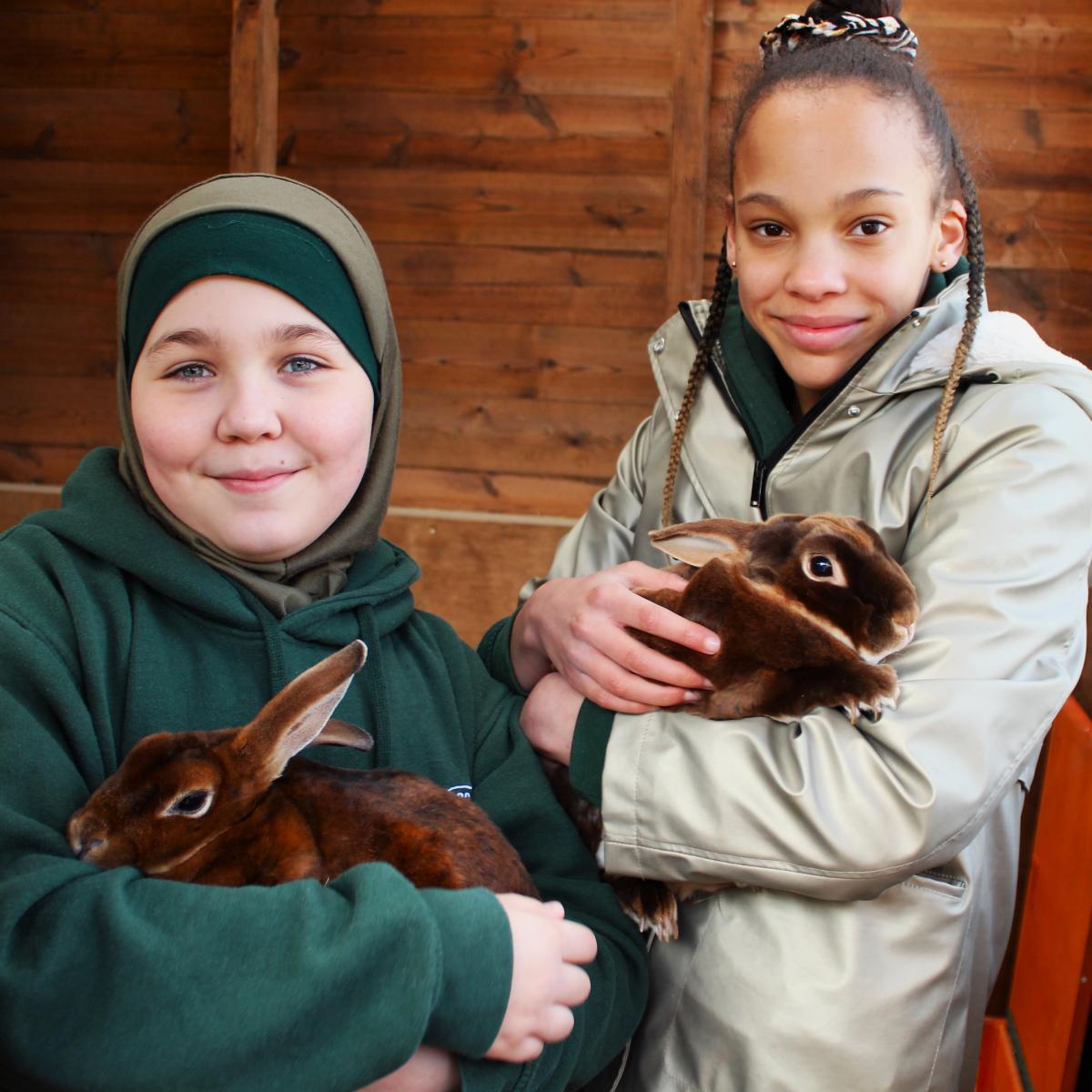
The future
City Farms anticipate a continued increase in the demand for their services in the next 2 years. Programmes are already oversubscribed and there are huge numbers of young people waiting for spaces. City Farms are in need of additional staffing, funding, resources and space to keep up with demand.
There is a clear need for more funding for youth provision at community farms and gardens to keep up with the demand.
Care farming governance webinar
Find out more about governance options in our webinar. The session is led by Karen McGarrity, Development Officer for Redcar & Cleveland Voluntary Development Agency and Heidi Seary, Operations Manager at Social Farms & Gardens.
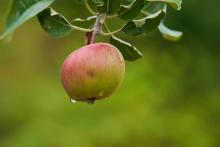
Care farming governance
Care farming and green care governance
Governance is about the structures, processes and proceedures that you need to run a care farm or green care service.
Legal structures are how the law will see your organisation, for example as a charity, a sole trader or Community Interest Company. Legal structures mean your organisation is more formal and has a robust legal structure. The majority of care farms are formed into a legal corporation.
To choose the right type of legal structure for your care farm, you will need to think about:
- What you're going to be doing
- Who is controlling the organisation
- Finance, income and what you'll be doing with any profit
- What you'll do with your assets if you need to close
Organisational types are how your organisation is set up internally. For example, you could be organised as a social enterprise, a co-operative or a community or voluntary group.
Organisations usually include the following:
- A governing body at the top which makes decisions and runs the organisation - it's usually at least three people including a chair, a treasurer and a secretary
- Governing documents - explain why your organisation exists, how you do things and how you make decisions (seen by people outside your organisation)
- Members - all the people that belong to your organisation including team and service users, volunteers, supporters and general community
Good governance and being a recognised legal entity are important because:
- It's good practice for an organisation delivering comissioned services to people with a defined need to have robust, legal governance
- Legal entities mean there is clear accountability for the operation
- The type of governance that you choose can affect funding from different sources, commissioners and referral routes
If you'd like to find out more, our Green Care Quality Mark covers governance as part of running a responsible care farm.
Care farming for dementia webinar
Watch Kath Pyke (Dementia Adventure) and Gerry Fouracres (Scrubditch Care Farm), talk about their experiences working together as part of the Dementia Adventure in a Box project.
From measuring outcomes to measuring change webinar
Watch our webinar to learn more about measuring change. Sarah Giles, former Director of FarmAbility explains the fundamentals of measurement.
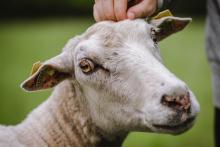
Measuring outcomes and change in care farming
Measuring outcomes and change in care farming
Measuring care farming can be complex, but it's good practice to show the impact of positive change on clients, referrers and care farming teams over time.
Wherever you are in your measurement journey as a care farmer, measuring change can add to important ongoing sector conversations about how, what and why change happens.
Measurement allows us to understand, strengthen and show the impact of care farming, and it also ensures accountablity to stakeholders.
Whatever type of care farming or green care activities you run, there are some fundamental parts of measurement that should be in place for it to work well.
Sarah Giles, former Director of FarmAbility outlined the basics of measurement as:
- Ensuring three stages of measurement - pre-assessment gathering of data, post-assessment after intervention and follow up after another period of intervention
- Monitoring and evaluation - gathering data on a regular basis and also stopping to evaluate and analyse data at a point in time
- Making sure that whatever measurement you choose matches the avaliable capacity and recources you have
- Being mindful of attribution - it's unwise to make expansive claims. However, there is plenty of robust research and evidence that support the benefits of programmes of green care activity. If you're doing something similar and see similar results, you can be confident that a strong connection between change and intervention is likely
- Putting clients at the heart of your measurement - the more you know the better you can design your measurement
- Making sure your whole team are engaged and involved in the measurement process.
Related articles
Care farming and green care annual survey webinar
Take a look at the latest picture from the care farming and green care sector. Watch our webinar on the latest annual survey results.
Green social prescribing webinar
Watch our webinar on green social prescribing featuring:
- SF&G Regional Care Farming Manager Deborah Evans
- SF&G Care Farming Development Manager Dr Rachel Bragg, OBE
- SF&G Regional Support Officer Sarah Marrison
- Dave Solly, Head of Natural Environment at the Natural Academy of Social Prescribing (NASP)
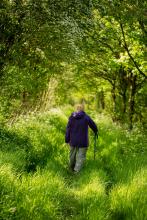
Care farming and social prescribing
Care farming and social prescribing
Social prescribing is sometimes known as community referral. It is how health care professionals can refer people to local non-clinical services in their area, including care farms and green care.
Many voluntary and community sector organisations already informally signpost people on to services to support their health and wellbeing. Social prescribing is the formal name for this process, which has been adopted by the NHS as part of personalised care.
Health can be affected by many things including social, economic and environmental circumstances. The aim of social prescribing is to address people's needs in a more joined-up and holistic way. It's also thought that social prescribing can give people more control over their own health.
There are different types of social prescribing, but most involve a link worker. Link workers have different job titles in different areas, for example they can be called navigators or community connectors. Link workers are key contacts for care farms and green care providers because they connect people with defined needs to local services. Link workers also help existing community groups to be accessible, support new groups and work with local health care partners.
Find out more about social prescribing on the NHS England website.
Green social prescribing
Green social prescribing is the term used specifically for linking people to nature-based activities such as care farming and green care.
The Covid-19 pandemic has highlighted the importance of the natural environment for mental and physical health, as well as the inequality of access to green space.
The UK government announced investment in green social prescribing during 2020, with selected areas testing how green social prescribing can be embedded into communities to:
Selected areas are testing how green social prescribing can be embedded into communities to:
-
improve mental health outcomes
-
reduce health inequalities
-
reduce demand on the health and social care system
-
develop best practice in making green social activities more resilient and accessible
Find out more about green social prescribing on the NHS England website.
Related articles
Care farming and green care survey shows sector growth
Results from the Social Farms & Gardens annual care farming and green care survey show that the sector has grown 34% since the 2019/20 survey.
Green care is structured therapy or treatment programmes that take place in natural surroundings. This includes care farming, Social and Therapeutic Horticulture (STH) and animal assisted interventions. Care farming is the therapeutic use of farming practices. People benefit from the combination of the natural environment, meaningful activity and social connection.
The Growing Care Farming project team collected the latest sector data after most pandemic restrictions were lifted in the UK during 2021.
Key findings include:
-
402 care farms and green care providers currently operating in the UK, a further 80 in the Republic of Ireland and an estimated 220 in development
-
Care farms are delivering an estimated 675,269 places per year in England alone
-
Care farms could potentially provide over 1 million places per year for people via health, social care and education referrals
-
Care farming contributes around £70m each year to the economy in England
Care Farming Development Manager, Dr Rachel Bragg OBE, said:
“Care farming and green care practitioners are successfully supporting more people than ever before. Our survey shows that with the appropriate funding and recognition, care farms and green care sites play a vital role in the health and wellbeing of local communities. In the wake of Covid-19, the sector continues to provide adults and young people with life-changing health, care and educational services.”
The most common user groups for adults are people with a learning disability, people with mental ill-health, those with Autism Spectrum Disorder (ASD) or learning difficulties. For young people, those with a learning difficulty or ASD are among the most common user groups.
Most people are referred to care farms through families and carers, Local Authority social services, personal social care budgets and education services. Social care and education referrals are more likely to come with funding than health referrals. Funding from other referral sources like Children’s Mental Health Teams has increased since 2019/20.
The impact of the Covid-19 pandemic on the sector has been challenging with practitioners losing around six months of delivery due to restrictions. Some care farms and green care sites saw an increase in enquiries and referrals. There were also surges and backlogs reported as restrictions lifted. Many care farms have adapted their services and are continuing with different ways of working.
Aside from Covid-19, funding and operational costs remain the biggest challenge for current practitioners. Those looking to start a new care farming or green care site told us that their biggest challenges were start-up funding, accessing referrals, referral funding and legal issues like planning permission.
Care farmers and green care providers identified that the following support was important for them or the sector:
- Stable funding streams
- Funding to cover core costs
- Networking and collaboration between care farmers
- Training opportunities, support and resources
- Raising the profile of the sector at a national level
- Help to match land available to where it is needed
Read the overview or the full report.
Social Farms & Gardens, in partnership with Thrive, are delivering the Growing Care Farming (GCF), project as part of the Government’s Children & Nature programme. Our vision is to create more opportunities for children and adults with a defined need to benefit from the health, care and educational services provided on care farms and green care sites.
Five new food hubs selected in Wales!
*Please scoll down for Welsh.
Five new food hubs selected in Wales!
Open Food Network, Development Trusts Association Wales and The Landworkers’ Alliance have joined forces to select five enterprising and sustainable food hubs in communities across Wales to provide food that is good for people, good for the environment and good for local business by promoting short supply chains.
We’re delighted to announce that the five organisations that were successful in being selected to develop a food hub were:
- Siop Griffiths, Penygroes
- Partneriaeth Ogwen, Bethesda
- Canolfan Maerdy, Ammanford
- EcoDewi, St Davids
- Cwm Food Hub based at Welcome to our Woods, Rhondda
The opportunity is part of Resilient Green Spaces, a £1.27m partnership project piloting alternative and relocalised food systems through testing what local people can achieve together in their green spaces through six strands of work.
Organisations from across Wales applied and were selected following a 2-stage application process, the new support package will run until June 2023 to help five hubs really thrive! The package of support will include:
Access to funding to support staff time and a grant to cover the purchase of equipment.
A package of regular support and training until June 2023 to help you and your organisation develop an effective, viable Food Hub.
Expert support in business planning, funding, marketing, community engagement and more. The five food hubs will use the Open Food Network (OFN) as an initial framework for their enterprise.
The food hubs will have access to support from all the project partners including access to the OFN learning and support resources.
For more information about the wider Resilient Green Spaces project, and for other opportunities for communities as part of the project, please go to the Social Farms & Gardens website.
Resilient Green Spaces is a £1.27m partnership project being led by Social Farms & Gardens to pilot alternative re-localised food systems using communities and their green spaces as the driving force for change across Wales until June 2023. This project is funded through the Welsh Government Rural Communities - Rural Development Programme 2014-2020, which is funded by the Welsh Government and the European Union.

Mae pum hwb fwyd newydd wedi cael ei dewis yng Nhymru!
Mae Open Food Network, Cymdeithas Ymddiriedolaethau Datblygu Cymru a Chynghrair Gweithwyr y Tir wedi ymuno i sefydlu pum canolfan fwyd fentrus a chynaliadwy mewn cymunedau ledled Cymru i ddarparu bwyd sy'n dda i bobl, yn dda i'r amgylchedd ac yn dda i fusnesau lleol drwy hyrwyddo cadwyni cyflenwi byr.
Mae’n bleser gennym gyhoeddi mai’r pum sefydliad a lwyddodd i gael eu dewis i ddatblygu hyb bwyd oedd:
- Siop Griffiths, Penygroes
- Partneriaeth Ogwen, Bethesda
- Canolfan Maerdy, Ammanford
- EcoDewi, St Davids
- Cwm Food Hub yn Welcome to our Woods, Rhondda
Mae’r cyfle hwn yn rhan o brosiect partneriaeth Mannau Gwyrdd Gwydn, gwerth £1.27m sy’n peilota systemau bwyd amgen ac a adleoliwyd trwy brofi’r hyn y gall pobl ei wireddu gyda’i gilydd mewn mannau gwyrdd, trwy chwe maes gwaith. Mae Mannau Gwyrdd Gwydn wedi derbyn cyllid trwy Gymunedau Gwledig Llywodraeth Cymru - y Rhaglen Datblygu Gwledig 2014-2020, sy’n cael ei gyllido gan Gronfa Amaethyddol Ewrop ar gyfer Datblygu Gwledig a Llywodraeth Cymru.
Gwnaeth sefydliadau o bob rhan o Gymru gais ac fe'u dewiswyd yn dilyn proses ymgeisio 2 gam, bydd y pecyn cymorth newydd yn rhedeg tan fis Mehefin 2023 i helpu pum canolfan i ffynnu mewn gwirionedd!
Rydym yn cynnig:
Mynediad at gyllid i gefnogi amser staff a grant i dalu am brynu cyfarpar.
Pecyn cymorth a hyfforddiant rheolaidd hyd at fis Mehefin 2023 i’ch helpu chi a’ch sefydliad ddatblygu hwb bwyd effeithiol a hyfyw.
Cymorth arbenigol mewn perthynas â chynlluniau busnes, cyllid, marchnata, ymgysylltu â’r gymuned a mwy.
Bydd gan y pum hwb bwyd fynediad at gymorth holl bartneriaid y prosiect, gan gynnwys mynediad at adnoddau dysgu a chymorth y RhBA.
Am fwy o wybodaeth am brosiect ehangach Mannau Gwyrdd Gwydn, a chyfleoedd eraill i gymunedau ddod ynghyd fel rhan o’r prosiect, ewch i wefan Ffermydd a Gerddi Cymdeithasol
Mae Mannau Gwyrdd Gwydn yn brosiect partneriaeth gwerth £1.27m sy'n cael ei arwain gan Ffermydd a Gerddi Cymdeithasol i dreialu systemau bwyd eraill sydd wedi'u hail-leoleiddio gan ddefnyddio cymunedau a'u mannau gwyrdd fel sbardun ar gyfer newid ledled Cymru tan fis Mehefin 2023. Ariennir y prosiect hwn drwy Gymunedau Gwledig Llywodraeth Cymru - Rhaglen Datblygu Gwledig 2014-2020, a ariennir gan Lywodraeth Cymru a'r Undeb Ewropeaidd.

SF&G Launch Partnership With Crowdfunder.co.uk
Here at SF&G we are delighted to launch our new partnership with the crowdfunding platform Crowdfunder.co.uk.
In recent years crowdfunding has become a vital fundraising tool for many of our members, and that has especially been the case recently after the Covid-19 pandemic temporarily shut down other regular sources of income.
Crowdfunding harnesses the power of the support network and community that surrounds your group, and helps turn lots of small contributions into big ideas.
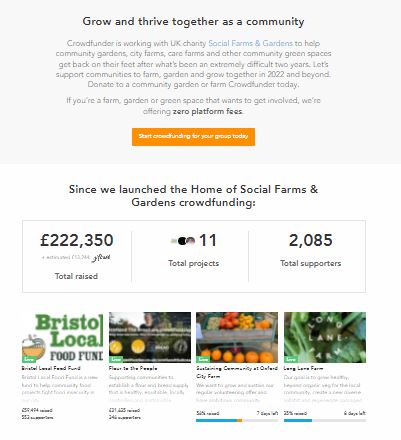 Crowdfunder are a platform who charge zero platform fees to charities and just 5% for other groups, and to boost fundraising potential they have set up an online crowdfunding hub where all SF&G members and related projects can be grouped together, giving both individual campaigns and the sector as a whole better visibility.
Crowdfunder are a platform who charge zero platform fees to charities and just 5% for other groups, and to boost fundraising potential they have set up an online crowdfunding hub where all SF&G members and related projects can be grouped together, giving both individual campaigns and the sector as a whole better visibility.
This isn't a new approach for Crowdfunder, over lockdown they worked with the Music Venue Trust to raise over £4 million to save over 250 grassroots music venues. They also supported the Theatres Trust and their efforts to support the theatre industry in light of COVID and closures. And more recently a campaign to support the independent brewery industry to get back on its feet helped 30+ breweries collectively raise over £800k since the initiative launched in spring 2021.
We hope that this partnership will help community gardens, city farms, care farms and other community green spaces get back on their feet and look to the future after what’s been an extremely difficult two years.
Sally Partridge, Chair of Trustees for Social Farms & Gardens said:
“Crowdfunding can be such a powerful fundraising tool. Recent years have seen some really tough financial times for many of our members, and the pressures of climate change and the pandemic mean we need our community green spaces now more than ever.
It’s our hope that this new partnership and resources will help more groups raise the funds they need to carry on delivering the amazing work they do in communities up and down the country”
Phil Baker from Crowdfunder said:
"Crowdfunder is excited to be partnering with Social Farms & Gardens to help the important work their members do after what’s been a challenging period. We want to show our support so these unique projects in communities across the UK can continue to farm, garden and grow together in 2022 and beyond."
Find out more about crowdfunding, and the resources on offer to support your campaign here.

SF&G Member wins spot at Chelsea Flower Show
SF&G Member Core Arts, the Hackney-based mental health charity is to stage its first-ever show garden at the RHS Chelsea Flower Show 2022.
Leading Hackney mental health charity, Core Arts, will be represented at the world-famous RHS Chelsea Flower Show for the first time in May 2022. The Core Arts Front Garden Revolution Garden (see image below) has been designed by Hackney-based garden designer Andy Smith-Williams, and is one of 12 gardens for good causes being funded by Project Giving Back at the RHS Chelsea Flower Show this spring.
Andy first noticed Core Arts’ imaginative roof garden on one of his regular walks during lockdown and was intrigued with the idea of making relaxing gardens in busy urban places incorporating recycled and up-cycled materials. The roof garden is managed by Core Arts’ horticultural arm, Core Landscapes, and Andy’s design includes some of the ways their roof garden captures and diverts rainfall as well as creative ways of container growing using resilient planting.
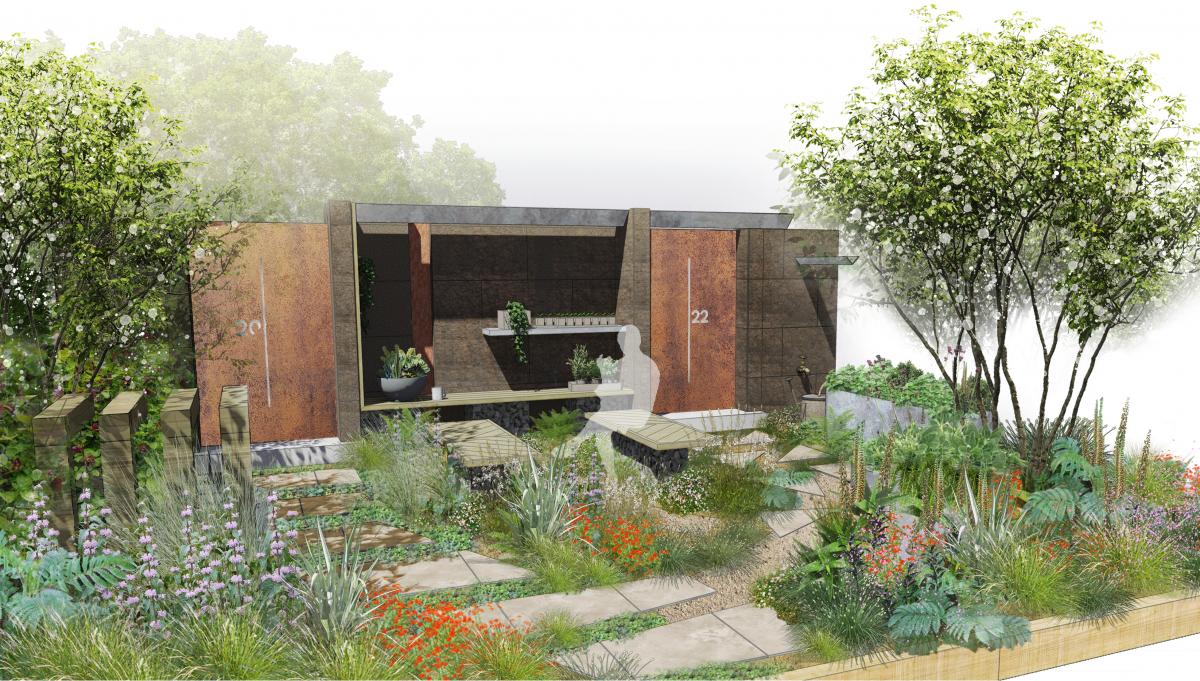
Speaking about his design and partnership with Core Arts, Andy says:
“Having easy access to local parks, the Hackney Marshes and nature-filled walks during the Covid-19 lockdowns really helped me keep physically and mentally fit during that period. I noticed how front gardens were being used more to meet and greet friends and neighbours, and became aware of the work of Core Arts, and Core Landscapes, in our community.”
Andy’s design will highlight the connections between gardens and mental wellbeing while showcasing some innovative and creative ways to make front gardens environmentally sustainable. It is an imaginative take on a pair of front gardens that focus on the power of plants to lift spirits. It reflects Core Arts’ mission to break down barriers to enable recovery, social inclusion, and positive mental health, supporting people experiencing mental health issues to develop skills and talents, fulfil their potential, and connect with their communities.
Andy continues:
“Creating community-facing front gardens, that are desirable places to be in, can be the catalyst for creating important connections. I’m delighted to be bringing a garden inspired by Core Arts to the RHS Chelsea Flower Show in May and hope it will help raise much-needed awareness and funds for a charity that plays such an important role in Hackney.”
Hattie Ghaui, Director of Project Giving Back says:
“Andy’s creative and thought-provoking garden celebrates the work of Core Arts and the way we can bring plants into an urban environment. We’re thrilled to be supporting this garden and cause at the RHS Chelsea Flower Show in 2022 and have no doubt that it will inspire individuals and community-focused organisations across the UK to adopt similar approaches.”
Project Giving Back was set up in direct response to the pressure charitable organisations, like Core Arts, have been placed under following the outbreak of Covid-19. One of the great things that we can take from these incredibly challenging years is the hope that comes from seeing the kindness and community spirit that neighbours across the UK have shown, and continue to show, each other.”
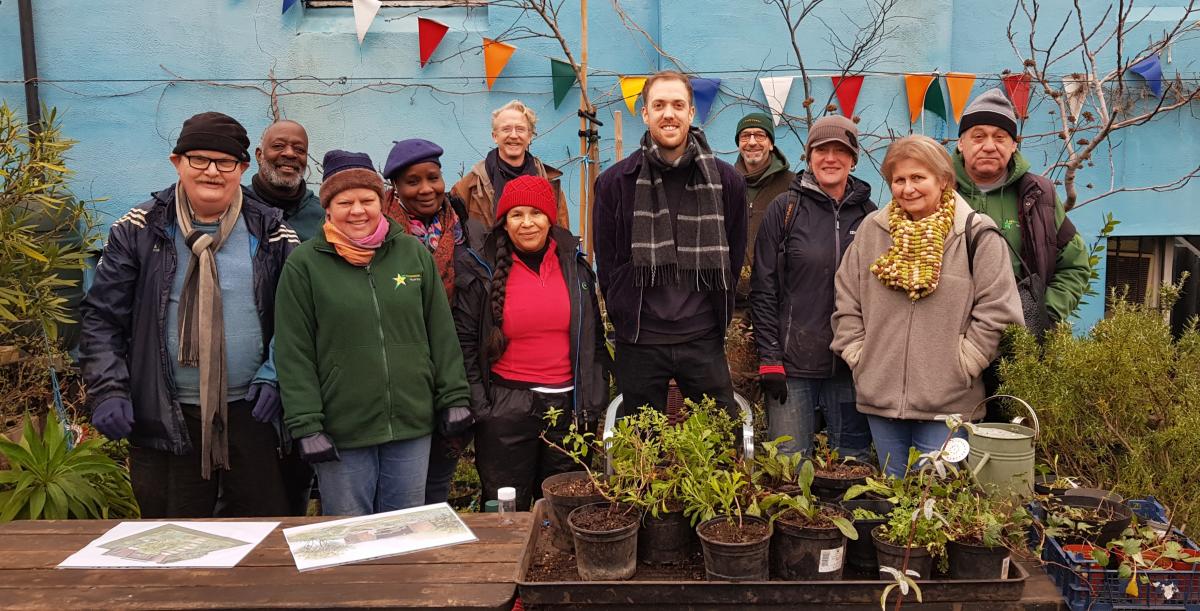
Nemone Mercer, Core Landscapes manager says:
“It’s fantastic Core Arts is being represented at Chelsea this year. It's a celebration of all the time, energy, and skill that Core students and volunteers' have given to making the local neighbourhood in Hackney a nicer, greener place for everyone, and to inspire other people to do the same. It’s a brilliant stage to show the impact plants and green spaces can have on our positive
mental health, particularly when we garden together.”
Having a garden at the RHS Chelsea Flower Show marks an important milestone for Core Arts, Paul Monks CEO of Core Arts says:
“Core Arts trustees, staff, volunteers, and above all our clients, are delighted to have been selected for this opportunity to showcase our charity at the RHS Chelsea Flower Show, giving a global platform to promoting positive mental health for all and showcasing how creative education can have a big impact on mental health.”
Congratulations to all the Core Arts team from SF&G!
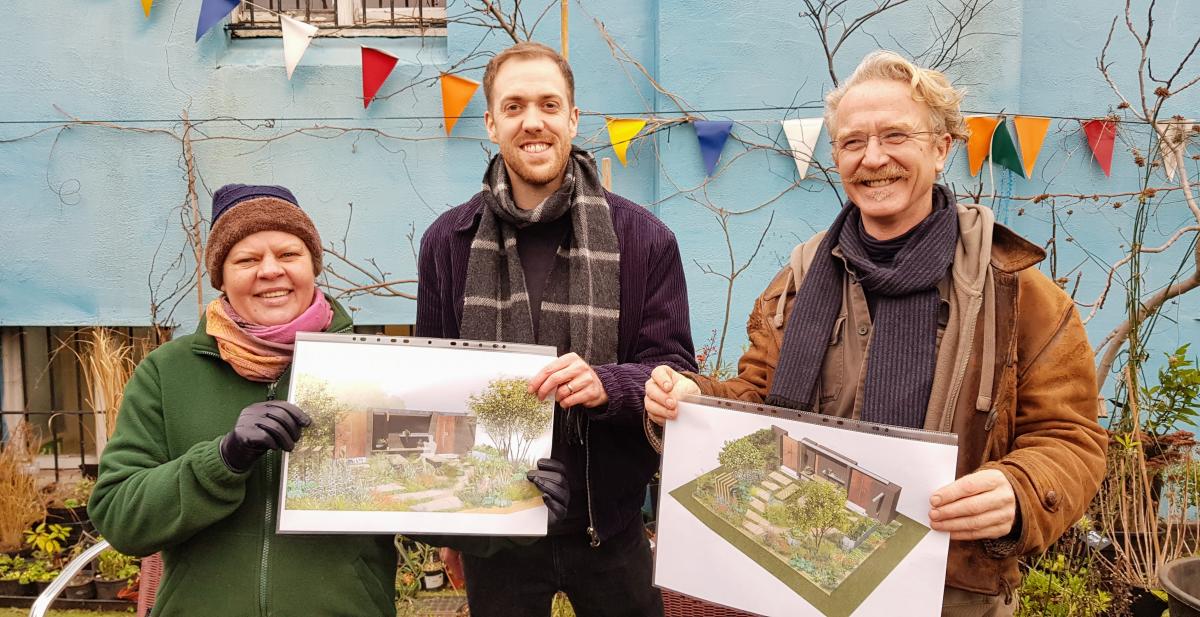
Gardeniser Hub Training for the Gardeniser Pro trainer
In October 2021 we had 12 learners attend a three day course at SF&G head office in Bristol to become trainers of Gardeniser Pro.
By the end of the classroom training the learners were able to understand all 3 modules of Gardeniser Pro training. These 12 people can now attain a Gardeniser Trainers Licence that gives them the ability to deliver Gardeniser training through SF&G or our partners in Austria, France and Italy. They then went on to deliver a further 40 hours of practical training via an apprenticeship which they did either in the UK or abroad in France, Italy and Austria, supporting the Gardeniser Pro course both online and face to face.
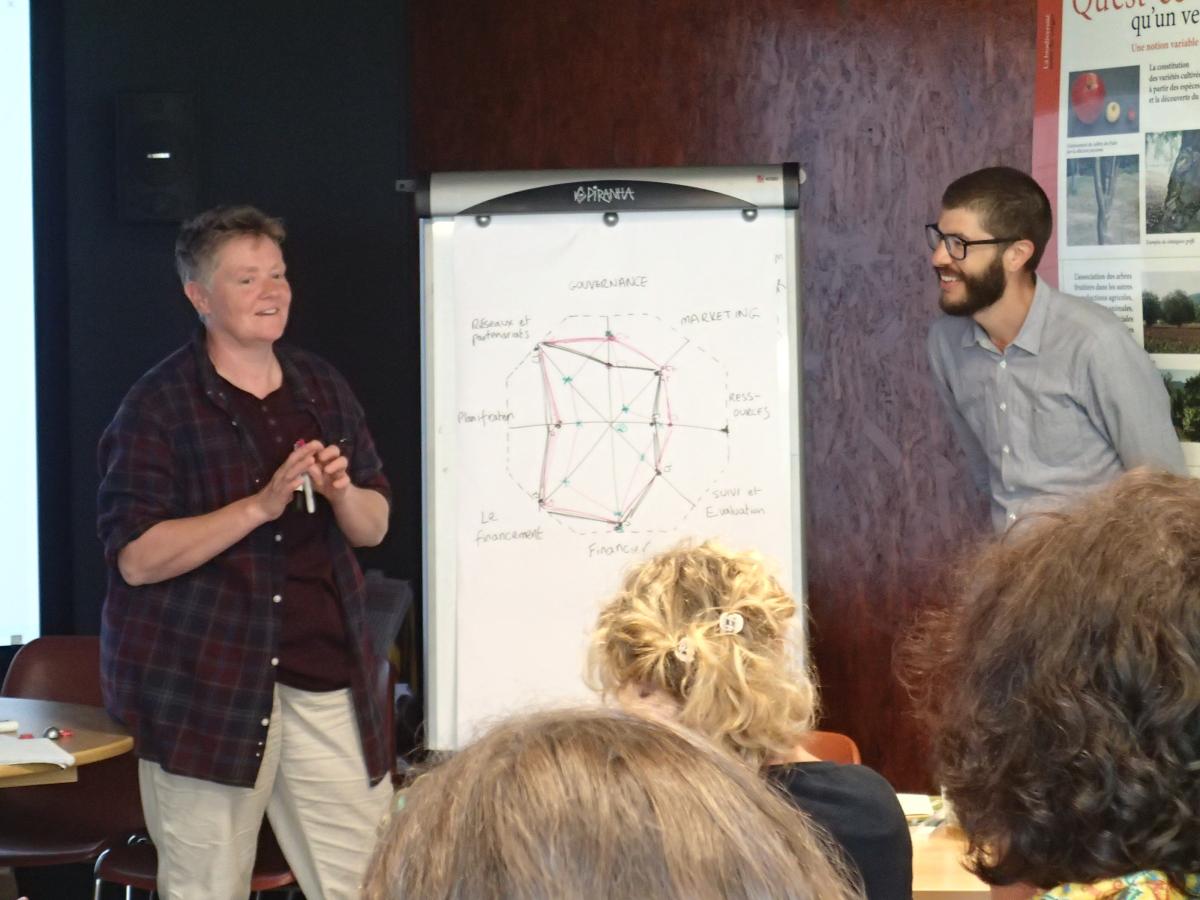
Gardeniser trainers undertaking the Gardeniser Hub train the trainer course had the following qualities:
• Obtained the Gardeniser Pro license.
• Proven training skills with a track record of training both face to face and online.
• A good knowledge of sustainable practices within the community garden/farm.
• A good organiser who has the ability organise and plan effectively.
• Innovative - The role requires someone who is good at problem solving, able to be resourceful, creative and is imaginative with a group of people.
• Flexibile and adaptable- the role requires the ability to adapt and adjust the training by having a good understanding of the group dynamics and their needs and abilities.
• Able to analyse and synthesise information- An ability to understand the training modules and adapt them if necessary, for their own country without losing the main learning points covered in each module.
• Excellent written and communication skills including the ability to create and use PowerPoint and make use of online training platforms such as Zoom.
• Ability to plan - The Gardeniser Trainer needs to plan the agenda, lessons, and activities so that all the modules are covered sufficiently and in a well-timed way.
• Ability to apply theoretical knowledge in practice. The Gardeniser Trainer will use their knowledge and experience alongside the modules, units and activities that make up the training.
Some feedback from the learners included:
"The course was great and really met its aims. Great discussion. Well-paced. Good facilitation. Inspiring."
"Overall the course was really well balanced and paced with equal time given to the different elements, nothing seemed particularly rushed or dragging. There were some topics where discussions of the topics themselves were prompted and I found these interesting and useful."
For more information on the Gardeniser programme and future course dates go to farmgarden.org.uk/our-work/gardeniser
Care farming for dementia and older people
Watch our video to find out how care farming can help older people and those living with dementia.
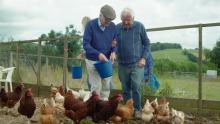
Care farming for dementia and older people
Care farming for dementia and older people
Care farms can improve the quality of life for older people and those living with dementia. Some care farms run specialist dementia services which are adapted to suit people living with the condition.
People who have been diagnosed with dementia can often be at risk of social isolation and declines in mental and physical health. Research has shown that regularly spending time in nature can slow progression of dementia. It can also improve sleep, concentration, appetite and communication skills.
Research by the charity Dementia Adventure shows that people living with dementia and their carers often face barriers to accessing the outdoors. Care farms providing dementia services offer vital local support to their communities.
Read our case studies to find out more about farms offering dementia services and our partnership project with Dementia Adventure.
“The greatest achievement is getting to know the real person behind the disease, their personality, their humour, their life story.”
Geoff Stevens, Pathways Care Farm
Related articles
Learning Bubbles
We are pleased to announce that SF&G will be part of a new European Erasmus Plus project called Learning Bubbles: an investigation into potential collaborations between schools, community gardens and the digital world.
The project will take place between 2021 and 2023.
The new project seeks to utilise the unique educational setting that community gardens and city farms can provide, and results from observations made during the Covid-19 pandemic, where teachers and students from all over Europe were forced to rapidly find new ways of teaching and learning.
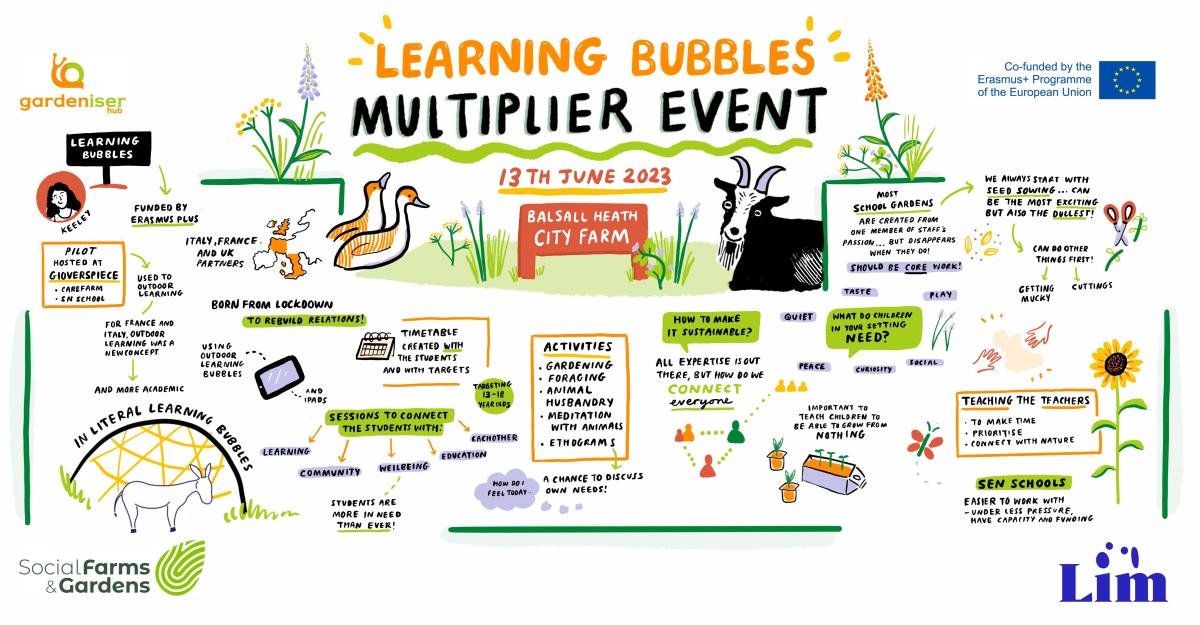
This illustration covers some key take-aways about the Learning Bubbles programme.
Objectives
The Learning Bubbles project will:
- Develop and test systems for outdoor learning
- Develop a planning system for the creation of learning pathways
- Provide training in blended learning systems that support pupil needs
Project Marerials:
- Training course suitable for both educators and community growers
- Project toolkit
- Programme evaluation nvolving students, education professionals and community growing groups
International Partners:
- Replay Network (Italy)
- Pistes-Solidaires (France)
- Institut Jean Errecart (France)
- Piaget-Diaz (Italy)
- Gloverspiece School (UK)
- UC Leuvenlimburg (Belgium)


Productive Community Orchards

Social Farms & Gardens is calling out for Welsh communities who want to plant edible fruit and nut trees or begin processing new fruit and nut products!
The call-out is part of the Productive Community Orchards strand of their £1.27 million Resilient Green Spaces project.
Resilient Green Spaces is a partnership project being led by Social Farms & Gardens to pilot alternative re-localised food systems using communities and their green spaces as a driving force for change across Wales until June 2023. The project is funded through the Welsh Government Rural Communities - Rural Development Programme 2014-2020, which is funded by the Welsh Government and the European Union.
“We’re thrilled to launch our call-out for Productive Community Orchard sites,” said Gary Mitchell, Joint Social Farms & Gardens Wales Manager, “this work comes on the back of our hugely successful Orchard for Wales project in 2020. This time, we’re looking to support ten existing or new community sites to plant around 100 edible fruit and nut trees each and help them to store and process their produce. Please get in touch with us if you’ve been thinking about either.”
Interested community sites or organisations can find further information here, or by contacting [email protected].
Groups that wish to be considered for the 2021 season need to apply by November 29th.
For more information about the wider Resilient Green Spaces project, and for other opportunities for communities as part of the project, please go to the Social Farms & Gardens website.
Perllannau Cymunedol Cynhyrchiol Mewn Mannau Gwyrdd Gwydn
Mae Ffermydd a Gerddi Cymdeithasol, yr elusen sy’n cefnogi cymunedau i ffermio, garddio a thyfu gyda’i gilydd, yn galw ar gymunedau yng Nghymru sydd am blannu coed ffrwythau a chnau bwytadwy, neu ddechrau prosesu cynhyrchion ffrwythau a chnau newydd!
Mae’r alwad yn rhan o elfen Perllannau Cymunedol Cynhyrchiol ei brosiect Mannau Gwyrdd Gwydn gwerth £1.27 miliwn.
Mae Mannau Gwyrdd Gwydn yn brosiect partneriaeth sy’n cael ei arwain gan Ffermydd a Gerddi Cymdeithasol er mwyn cynnal peilot o systemau bwyd ail-leoledig amgen ledled Cymru, gan ddefnyddio cymunedau a’u mannau gwyrdd fel sbardun dros newid, a hynny nes mis Mehefin 2023. Ariennir y prosiect gan Lywodraeth Cymru a’r Undeb Ewropeaidd drwy’r Gronfa Datblygu Cymunedau Gwledig fel rhan o Raglen Datblygu Gwledig Llywodraeth Cymru.
“Rydym wrth ein boddau’n lansio ein galwad am safleoedd ar gyfer perllannau cymunedol cynhyrchiol” meddai Gary Mitchell, Cyd-reolwr Ffermydd a Gerddi Cymdeithasol Cymru. “Mae’r gwaith hwn yn dilyn ein prosiect Perllan dros Gymru hynod lwyddiannus yn 2020. Y tro hwn, rydym am gefnogi deg safle cymunedol sydd eisoes yn bodoli neu ddeg safle cymunedol newydd i blannu oddeutu 100 o goed ffrwythau a chnau bwytadwy a’u helpu i storio a phrosesu eu cynnyrch. Gofynnwn i unrhyw un sydd wedi bod yn ystyried y naill neu’r llall gysylltu â ni.”
Gall cymunedau â safleoedd posibl neu sefydliadau sydd â diddordeb gael rhagor o wybodaeth ar wefan Ffermydd a Gerddi Cymdeithasol, neu drwy anfon e-bost at [email protected].
Mae angen i grwpiau sydd am gael eu hystyried ar gyfer tymor 2021 wneud cais erbyn Tachwedd 29.
I gael rhagor o wybodaeth am y prosiect Mannau Gwyrdd Gwydn, a chyfleoedd eraill ar gyfer cymunedau fel rhan o’r prosiect, ewch I wefan Ffermydd a Gerddi Cymdeithasol.


Integrated Care Systems and care farming
Integrated Care Systems and care farming
The UK healthcare system is always evolving. It can be hard to keep pace but it's useful for care farmers and green care providers to understand how it works.
Understanding healthcare provision and the allocation of resources means you can be part of the process. It can also help you to secure more funding to provide your care farm places.
Local services for patients were once commissioned by Clinical Commissioning Groups (CCGs). Now, Integrated Care Systems (ICS) are replacing Clinical Commissioning Groups.
Integrated Care Systems plan heath and care services to meet the needs of their local area. They include providers and commissioners of NHS services local authorities and local partners.
Integrated Care Systems are an important shift away from traditional models of healthcare. Each ICS will use local health and social care data to guide partnerships. They will also collaborate to deliver health improvements to places and populations.
Find out more about integrated care in your your area on the NHS website.
Related articles
COP26 Northern Ireland Film
As part of their response to the COP26 Glasgow Climate Change Conference, the SF&G Northern Ireland team have released this short film demonstrating the power of NI's community growing spaces and the work they are doing to bring people together in their communities to help fight against climate change.
FSSSE Report Launched
The SF&G Northern Ireland Team have released the year one report from their Food Security Through Seed Saving & Exchange project.
The project, delivered by Growing Resilience Project Officer Conor O'Kane and funded by Necessity, has engaged with over thirty community gardens and hundreds of individuals in both the first phase of educational videos and webinars, and the second phase of the Seed Saving programme itself.
Click the icon below to read the report.
Updated advice for allotments and community growers in Wales
The Welsh government has released updated advice aimed at making it easier for people in Wales to grow their own food.
Social Farms & Gardens worked with the Welsh Government on the second edition of guidance for allotments and community growers across Wales. The guidance was successfully introduced in 2016 and has now been updated. It is hoped that the new second edition will continue to help more people to share good practice and get involved in growing.
The advice covers:
- different growing models
- allotment law
- animal on allotments
- planning guidance
- establishing a new site
- good group governance
- funding
- biodiversity
- risk assessment and insurance
Since the advice was first introduced allotments and community gardens have become even more important in creating a healthier, happier and more sustainable Wales. Allotments and community gardens can help to tackle some of today’s most urgent priorities, from health and wellbeing to the climate and nature emergencies.
The Welsh Government aim to create one of the most environmentally and socially responsible supply chains in the world. The Well-being of Future Generations (Wales) Act 2015 sets out a clear obligation for public bodies to enable the positive change that leads to a more resilient, secure and healthy Wales.
The benefits of gardening on individuals and the environment are clear. Increased physical activity and mental wellbeing, access to fresh fruit and vegetables and well used and cared for public spaces, are natural by-products of growing your own.
Gardening on an allotment plot or community garden means closer community relationships, reduced social isolation and the chance to work together and celebrate with your neighbours. It can make a dramatic improvement to quality of life. For many, allotments and community gardens are seen as essential elements of living happier, healthier and more sustainable lives.
The updated guidance follows the Welsh Government’s publication of small-scale agricultural planning rights for sheds and greenhouses in February 2021.
The story of Clynfyw Care Farm webinar
Care farmer Jim Bowen speaks about his journey in farming from the family run organic farm to what is now Clynfyw Care Farm CIC. Watch the webinar now.
Care farming for education webinar
Hear from Dr Rachel Bragg about our partnership with LEAF Education and the Countryside Classroom website and CEO of Lambourne End Centre Rob Gayler about care farming for education. Watch our webinar now.
Resilient Green Spaces
Welsh Government Funds Landmark New Local Food Scheme
SF&G is delighted to announce that a new £1.27m partnership project that will support community-led food growing spaces has received funding through the Welsh Government Rural Communities – Rural Development Programme 2014-2020, which is funded by the European Agricultural Fund for Rural Development and the Welsh Government.
We are delighted to launch our new partnership project; Resilient Green Spaces! The £1.27m partnership project is being led by Social Farms & Gardens to pilot alternative re-localised food systems using communities and their green spaces as the driving force for change across Wales until June 2023.
The Resilient Green Spaces project, being led by us at Social Farms & Gardens, will pilot alternative and re-localised food systems using communities and their green spaces as a driving force for change across Wales. This exciting project will empower growers across Wales and lead the way for change for the benefit of communities, consumers and the climate.
The project has six pioneering strands of work delivered in partnership, that will test what communities can achieve given the right support, access to land and freedom to do what they do best:
- Building a National Allotment Development Team - Wales’ first Allotment Development Team will be convened to support landowners and managers in meeting the growing demand for adequate allotment provision and to improve access for those who are often marginalised from green spaces and healthy food.
- Innovative Food Hubs - five enterprising and sustainable Food Hubs will be established in communities across Wales to provide food that is good for people, good for the environment and good for local business by promoting short supply chains.
- Productive Community Orchards - hundreds of new orchards will be planted and monitored across Wales, provide economic benefits to communities in addition to the well-recognised social and environmental benefits of community green spaces.
- Greener Corridors and Spaces - communities will be empowered to take control of their public green spaces so they are better connected for nature and people.
- Exploring Community Access to Farms and Land – new approaches to meeting the challenges and opportunities of access to land for new entrants to agroecological farming and local communities will be explored.
- Building Horticultural Future Farming Skills - a pilot training package will be developed to cover the skills needed to run horticultural farming businesses.
This groundbreaking project is the result of a partnership between 8 organisations – Social Farms & Gardens, the Landworkers’ Alliance, Development Trust Association Wales, Open Food Network UK, Lantra, Shared Assets, Cardiff University and Gwynedd County Council.
Care farming narrated presentation
Find out more about care farming with our narrated presentation.
Health and wellbeing benefits of care farming research
View or dowload our useful list of key health and wellbeing care farming research sources.
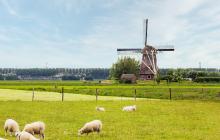
Care farming around the world
Care farming around the world
Care farming or social farming has been practiced around the world in different ways for generations.
Modern care farming is understood as ‘the therapeutic use of farming practices’ for people with a defined need. It is primarily practiced In the UK and Western European countries but is also growing in popularity around the world.
Care Farming is well established in many European countries, though it has developed in differing ways. The Netherlands, Belgium, Norway, Italy and the Republic of Ireland have well-developed care farming sectors. In these areas, green care is becoming more accepted and integrated as part of farm diversification.
Related articles
Health and wellbeing benefits of care farming overview
View or download our overview of research into the health and wellbeing benefits of care farming.
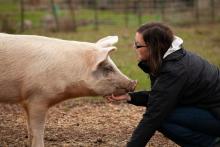
Health and wellbeing benefits of care farming
Health and wellbeing benefits of care farming
There has been much research published on the health and wellbeing benefits of green care interventions such as care farming.
Care farming combines contact and connection with nature, social interaction and farm-related activity. All these things are beneficial for general health and wellbeing in themselves.
There is also a benefit from the combination of these elements together. Where people have a defined need, this combination of benefits can create a complex intervention. These interconnected physical health and mental wellbeing benefits can help many different people.
Related articles
International care farming research
View or dowload our useful list of key international care farming research sources.
International care farming overview
View or download our overview of international care farming research.
Economic benefits of care farming and green care research
View or dowload our useful list of key care farming and green care economics research sources.
Economic benefits of care farming and green care overview
View or download our overview of the economic benefits of care farming and green care.

Economic benefits of care farming and green care
Economic benefits of care farming and green care
As well as improving the health and wellbeing of service users, care farming and green care can benefit local and national economies.
This can be directly through providing access to countryside and natural spaces. It can be also through rural economic opportunities and indirectly via societal improvements and cost savings.
There are relatively few studies that have explored the financial values to the wider benefits of green care. However, existing research shows a clear economic benefit.
In the UK there have been a number of SROI (Social return on Investment) studies and other types of analysis, but these are generally case studies of sites rather than sectoral evaluations. Social Farms & Gardens has gathered data on the fees and cost of services via our regular ‘state of the sector’ surveys.
What research there is shows us that economic benefits represent excellent value for money through outcomes for service users and those commissioning care farming services, along with farmers and rural economies.
Related articles
New London Staff
We are delighted to welcome new members of staff to our London team: Richard Choksey and Talent Moyo, who join Amber and our freelance Community Grower Ellie.
Richard comes from a background in botanical horticulture and became involved in the London community gardening network whilst researching for a dissertation on how botanic gardens might participate. He has an ongoing association with Meanwhile Gardens in North Kensington, has a predilection for rare whitebeam species, and his proudest horticultural achievement to date is having grown a collection of desert ferns from spore. Richard is working on the City Bridge Trust programme. Do email him with your training and networking ideas [email protected].
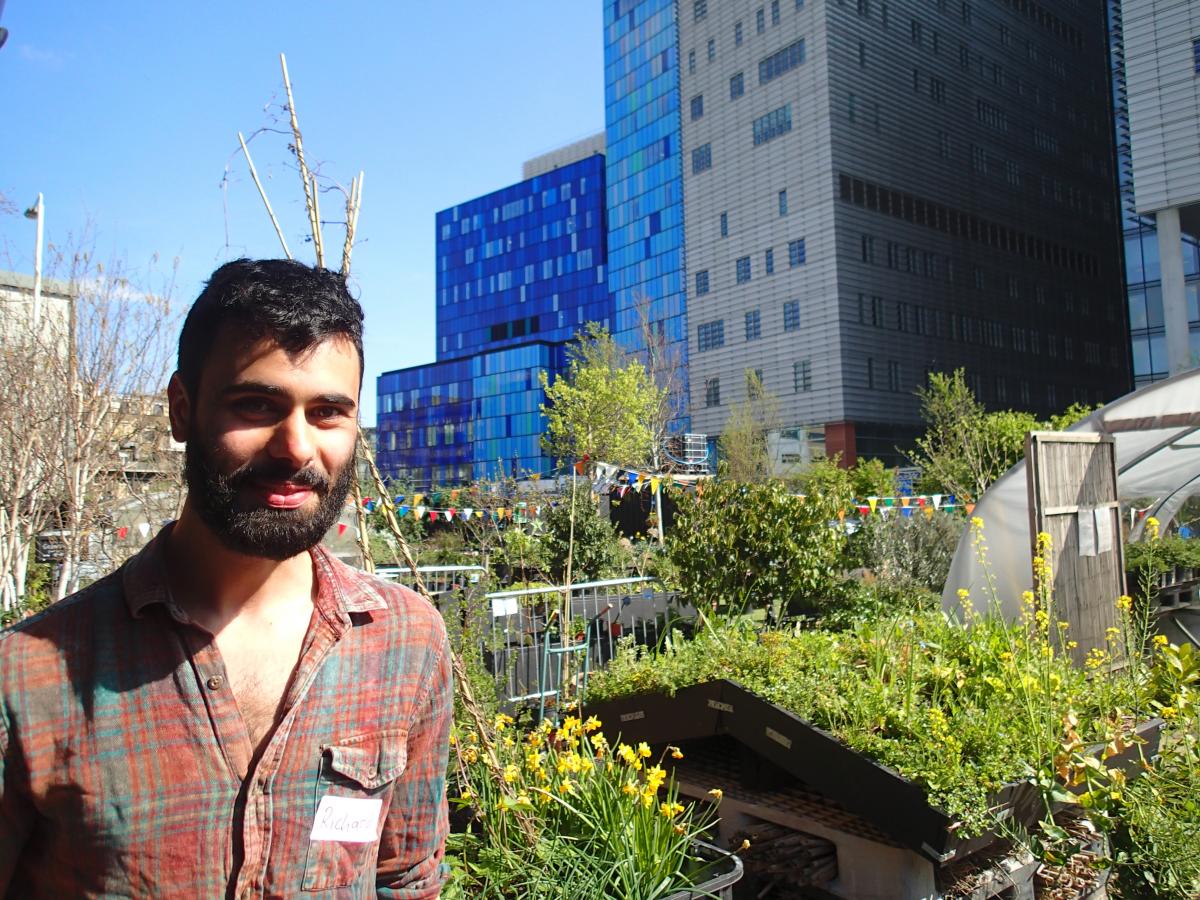
Talent is a Carpenters Estate resident with real flair for getting the local children involved in gardening activities. They are a qualified gymnastics coach and will be leading garden-themed exercise with local residents this summer, alongside growing food, flowers and plants for dyes, working alongside Ellie - our freelance community grower - on our programme in Newham, where we are supporting residents of Carpenters Estate to create a new community garden from scratch.
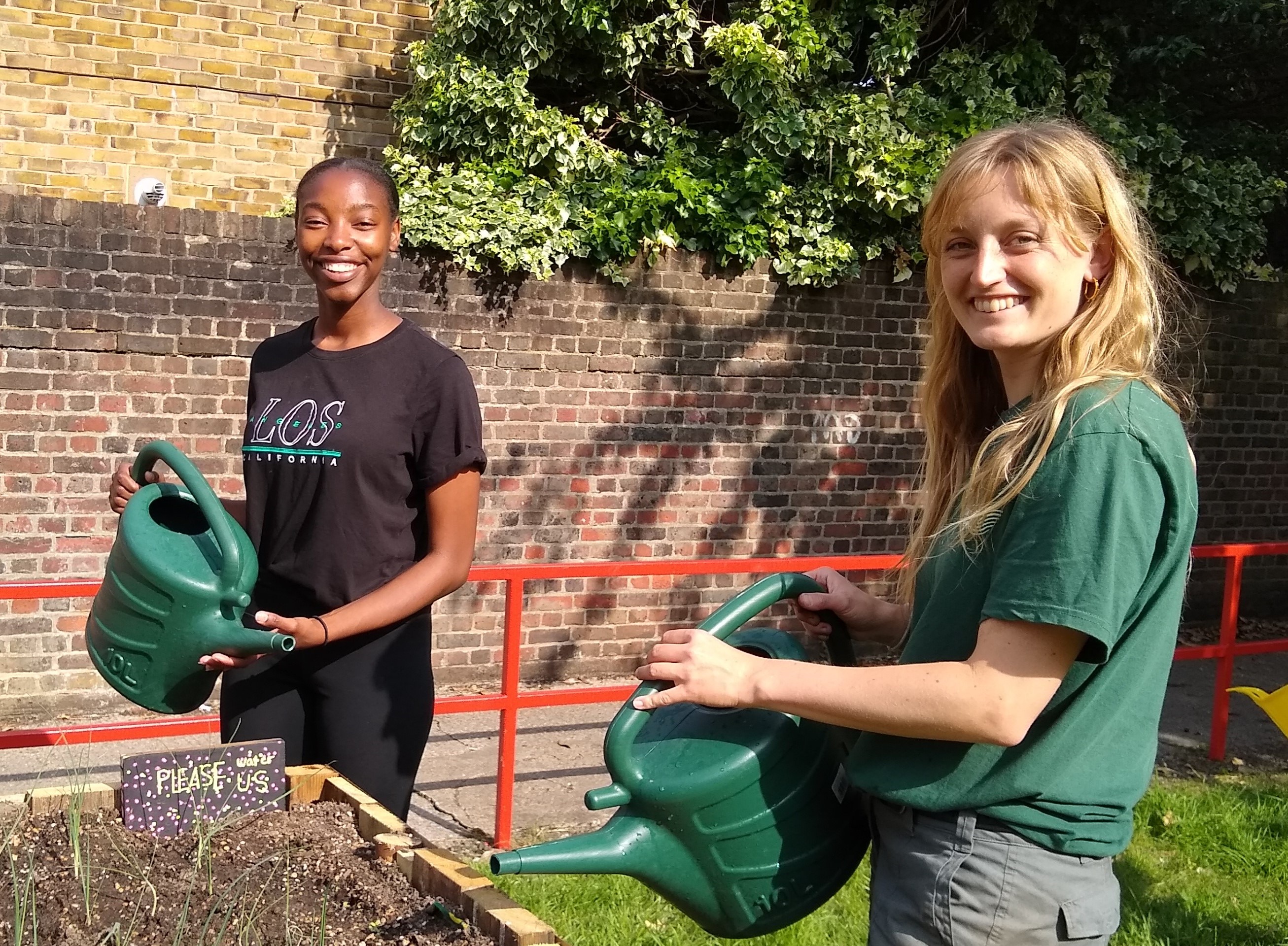
Talent and Ellie working together in Newham.
Wellbeing Garden Launch
Nature's Path competition winners Lavender Place Community Garden will be unveiling their new "Nature's Path Wellbeing Garden" at a launch event on Friday 20th August in Reading.
Social Farms & Gardens partnered with Nature's Path to support the development of a new community space around the theme of "Grow Your Own".
Everyone is invited to the official opening to see the newly installed garden, enjoy a free Nature’s Path breakfast and have some garden based fun!
Event Date: Friday 20th August
Event start time: 08:30
Event end time: 11:30
Venue address: Lavender Place Community Gardens, Queens Walk, Reading RG1 7AE
• Free Nature’s Path cereal and granola breakfast bar. Gluten free menu available.
• Planting Play Bed – we’ll have a play flower bed perfect for anyone who just can’t resist getting stuck in.
• Potting Table - Strawberries are the perfect fruit to accompany your brekkie. At our potting table you’ll find everything you need to grow them from seed.
• Garden Find and Seek game – will you be able to follow the trail to find items around the garden and get your name on the hay bale of fame?
• You can also find out more about Lavender Place Community Gardens, Food4Families and Nature’s Path’s involvement from our team.
• Grand unveiling: take a moment to ‘toast’ the opening of the new Wellbeing Garden with us at 11am
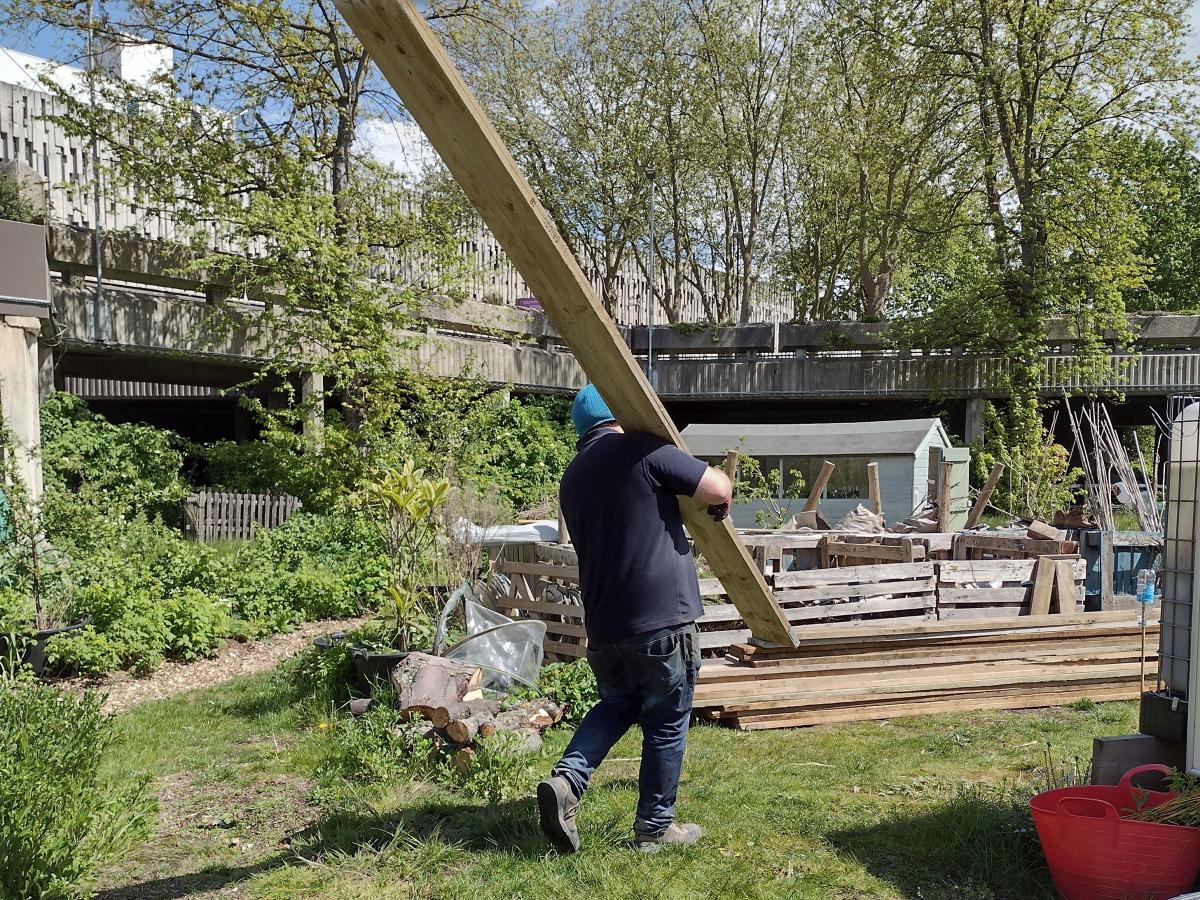
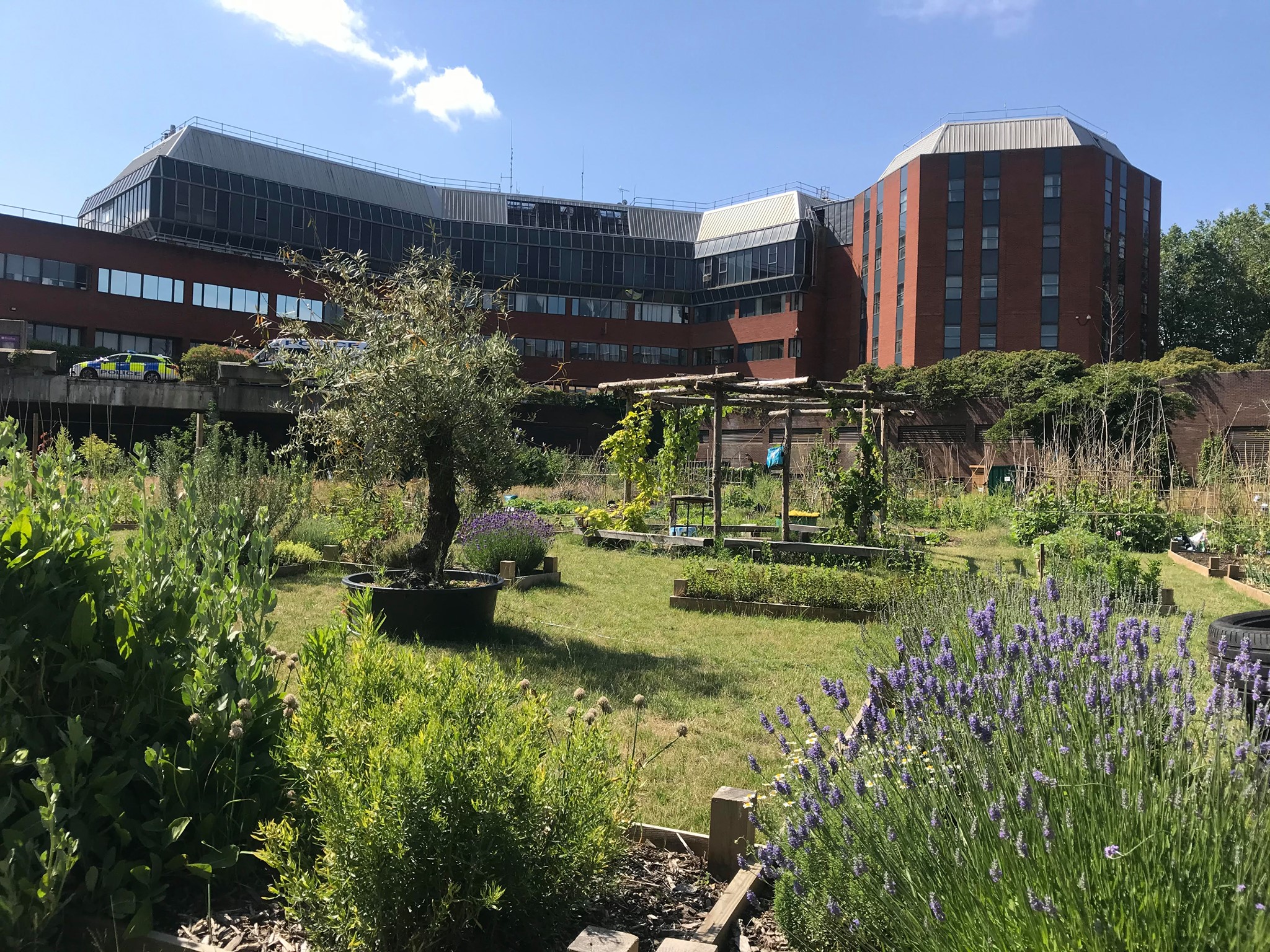
Care farming and green care survey open
If you're a care farmer or green care provider, our care farming and green care annual survey is your chance to tell us about working in the sector.
The survey means we can build a picture of care farming and green care across the UK. The more data we have, the more powerful and credible our voice - we want to make sure you're heard by policy makers and funders.
If you run a care farm, green care site, or are thinking of setting one up, then please have your say and complete the survey now.
After a challenging year, it’s more important than ever that we understand your experiences and represent your needs. We'd like your help to make sure as many care farmers and green care providers as possible take part.
Help us to:
- Find out what effect the Covid-19 pandemic has had on our sector
- Continue promoting care farming and lobbying on your behalf
- Highlight the role that care farming and green care can play in the nation's mental health recovery post-Covid
There's also a free prize draw for taking part, so please get involved and share widely. Thank you!
The annual care farming and green care survey is open until 31st July. It's produced by the Growing Care Farming project team at Social Farms & Gardens. The team have been tracking the scale of the care farming sector since 2007.
Dr Rachel Bragg receives OBE
Social Farms & Gardens is delighted to announce that Care Farming Development Manager Dr Rachel Bragg has been awarded an OBE in the Queen's birthday honours for services to academia and Green Care - congratulations Rachel!
Rachel has been a driving force in the development of the care farming sector in the UK for the last 15 years and is a passionate advocate of green care – ‘nature-based treatment interventions for people with a defined need’. Rachel and the SF&G team, in partnership with Thrive, are delivering the Growing Care Farming project (part of the Government’s Children and Nature Programme), which aims to transform the scale of the care farming sector in England and provides supporting services to the 300 care farms in the UK..
Rachel also remains a Visiting Fellow in the Green Exercise Research Team at the University of Essex, where she was a senior researcher for 17 years, with research interests including the relationship between nature, human health and mental wellbeing, specifically ‘green exercise’ and ‘green care’; care farming; walking and wilderness therapy; and sustainable agriculture. Rachel is well known for her Participatory Appraisal and Action Research training; questionnaire and fieldwork design; she is considered an expert in the evaluation of nature-based green care interventions; and is also research advisor for other charities.
On receiving the news Rachel said: “I am feeling very proud and delighted to have received an OBE in the Queen’s Birthday Honours for services to academia and Green Care – it’s great to get recognition for our inspiring care farming sector & for the amazing work to transform people’s lives – nature is more important than ever for our mental health, and we’ll need all the opportunities we can get to help people feel better post Covid”
Find out more about Rachel's work developing care farming at www.farmgarden/GCF, and her academic work at https://www.essex.ac.uk/research-projects/green-exercise.

New film shows impact of care farming on education
A new film from Social Farms & Gardens Growing Care Farming team highlights how care farming can help young people in education.
Care farms help people of different ages, including young people who may be struggling to learn in mainstream education. Care farming is one of a range of nature-based interventions available in the UK that can boost prospects and change lives. Through a supervised, structured programme of farming activity, young people can improve health and wellbeing or gain qualifications and skills. For some young people, care farming can be a path back to mainstream education.
Over half of UK care farms work with young people with Autism Spectrum Disorders and learning difficulties or as part of Alternative Provision, with 40% working with under 18s with learning disabilities, mental ill health or physical disabilities. Referrals to care farms can be part of SEND, part of an Education, Health and Care Plan (EHCP) or as Alternative Education Provision. Care farms also help young people with mental health and wellbeing or rehabilitation.
Care farming is a powerful mix of being in nature, working as a group and meaningful activity. Young people can get closer to nature and do something with real purpose, whether it's animal care, horticulture or a range of farming-related tasks. Whatever the activity, young people play an important part in the day to day running of a care farm. Activities are tailored to an individual’s specific needs, so everyone is able to take part in farm life in a safe and supported way.
Increased self-confidence, self-worth and better communication skills are just some of the positive outcomes for young people attending care farms regularly.
Speaking about care farming for education in the film, Emma Thomas from Bridge School in Malvern, said: "We have found that care farming is a really effective service for those who perhaps struggle with schooling, because it offers them an opportunity to do something different to academics, it's that hands-on work and sense of purpose. It's been great at helping to improve their confidence and prepare them for life after education."
Parent Belinda Philpotts talks about the positive changes she has seen in her son Aiden:"School was always hit and miss with him but now he wants to learn, he wants an education. He's now thinking of a future, it's really changed him. With the help of the farm he's becoming my son again."
Former care farm student Aston explains how care farms make a difference, she said:"They show you that you can do it, and make you actually believe in it, and you're a lot more confident and ready to face the world as an adult."
The film was made in collaboration with partners, care farmers, schools and young people as part of the Growing Care Farming project - a big thank you to everyone who took part.
Find out more about care farming for education.
Growing Care Farming aims to increase access to health, care and educational services on care farms. Please visit www.farmgarden.org.uk/gcf for more information about the project.
Connecting care farmers and teachers
A new collaboration between Social Farms & Gardens and LEAF Education aims to make care farming more accessible for teachers and education referrers.
Care farming now has a permanent presence on the Countryside Classroom website, led by LEAF Education and involving 32 partner organisations. The website is a free online hub of teaching resources, people to ask, and places to visit designed to enable teachers to use food, farming and the natural environment in and out of the classroom. With hundreds of contributors, Countryside Classroom is an important place for teachers to find free high-quality educational support.
The new care farming pages feature an overview of why care farming works so well for young people, a video, a searchable map and case studies. Teachers and education referrers can now learn more about care farming and search for care farms in their local area.
Dr Rachel Bragg, Care Farming Development Manager at Social Farms & Gardens, said: “We hope that the Countryside Classroom resources will help education professionals understand the hugely positive impact that care farming and green care services can have on young people and their education. We want to make it easier for students who might be struggling with mainstream education to be referred to local care farms and benefit from their life-changing services.”
Carl Edwards, Director, Education and Public Engagement at LEAF added: “We are incredibly pleased to see the addition of care farming on the Countryside Classroom website – care farms have so much to offer schools. Raising the awareness of what care farms can deliver to mainstream schools can only benefit young people. As part of this work we reached out to SENCOs across England who are all amazed at what care farms can offer their pupils and are keen to access the many benefits they have to offer.”
Care farming is one of a range of nature-based interventions available in the UK that can boost prospects and change lives. Through a supervised, structured programme of farming activity, people can improve health and wellbeing or gain qualifications and skills.
Over half of UK care farms work with young people with Autism Spectrum Disorders and learning difficulties or as part of Alternative Provision, with 40% working with under 18s with learning disabilities, mental ill health or physical disabilities. Referrals to care farms can be part of SEND, part of an Education, Health and Care Plan (EHCP) or as Alternative Education Provision. Care farms also help young people with mental health and wellbeing or rehabilitation.
Register your care farm
Registration for care farms is ongoing, so if you are a care farmer working with young people, please register your farm or green care site on the website now and let us know what you think.
The Countryside Classroom care farming pages represent a collaboration between Countryside Classroom partners and Growing Care Farming. Growing Care Farming (GCF) aims to increase access to health, care and educational services on care farms.
GCF is delivered by Social Farms & Gardens in partnership with Thrive and is part of the government funded Children and Nature Programme. Please visit www.farmgarden.org.uk/gcf for more information.
To find out more information about LEAF Education, please visit leafuk.org/education/leaf-education
Care farming for education video
Find out how care farming helps young people who may be struggling with learning.
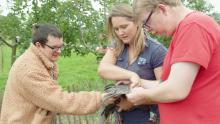
What is the Growing Care Farming project?
What is the Growing Care Farming project?
Social Farms & Gardens, in partnership with Thrive, delivered the Growing Care Farming Project between May 2019-March 2022.
The initiative was part of the Government’s Children and Nature Programme supported by Defra, funded by the Department of Education and managed by Natural England.
Care Farming aimed to expand and transform care farming services across England through a programme of central support, regional engagement, training and quality assurance.
The Growing Care Farming Project was an opportunity to transform the scale of the care farming sector across England, creating more opportunities for both children and adults with a defined need, to benefit from health, social and specialist educational care services delivered on care farms.
Related articles
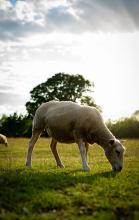
Land and planning for care farming and green care
Land for care farming and green care
Land acquisition can differ from region to region depending on the policies of the Local Authority.
We understand that it can often be one of the first hurdles to overcome when trying to set up a care farm. You may wish to try working with a local farm and seeing if they can help.
The Community Land Advisory Service (CLAS) is a service to increase community access to land, particularly for green space activities.
Through CLAS, you can find information on finding, buying, offering and leasing of land. If you are wanting to acquire land another way, you may wish to contact your Local Authority for further advice.
Planning permission
Common planning issues that care farmers and green care providers can face include:
- Change of land use
- Misunderstanding of the care farming concept by others
- Specific local issues
- Issues with particular buildings on site
Planning policy in the UK has a very local focus and so each area can be different. Some farms have needed to change their land use from agricultral to care or educational use. Others have argued that they are still agricultral as they need to be farming in order to offer care farming services. It can often depend on Standard Industrial Classification (SIC) Codes which represent the type of economic activity of an organisation.
We recommend that you seek professional planning advice and speak to your local planning department as it is the Local Authority’s decision as to what planning permissions are required.
If you want to know more about other people's experiences of planning or to share your own, our Social Farms & Gardens Facebook group can be useful.
Related articles
Nature and health interview with Dr Jo Barton
Dr Jo Barton from the University of Essex talks to Sophie Antonelli from the Growing Care Farming project team about the connection between nature and health.
Care farming for mental health and wellbeing
Watch our video to see how care farming helps mental health and wellbeing.
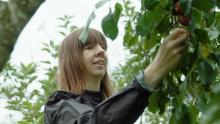
Care farming for mental health and wellbeing
Care farming for mental health and wellbeing
We know that spending time outdoors is good for us. Our mental health and wellbeing is linked to green spaces, open air and the natural environment. Care farming is a briliant way for people to connect with nature and other people, especially those that might be isolated.
Care farms use farming and nature to benefit people, including improving mental health and wellbeing. A care farm is a calming environment, away from the pressures of everyday life. Care farming can help to release anxiety or stress and give people space to be themselves.
Through farming-related activity, such as animal care, mechanics or horticulture, people have the opportunity to participate in a meaningful way.
"We know that nature has huge benefits for people's mental health. What care farms do is not just to connect people and nature but to actually make that meaningful. People have the opportunity not just to be present, but to particpate."
Nicola Gitsham, Head of Social Prescribing, Personalised Care, NHS England and Improvement
Related articles
Copper Beech Play Competition – May 2021
Once again, we are opening up our exciting competition for SF&G members to win beautifully handcrafted play equipment for you site.
Log in to find details of how to enter in our Members’ Area.
Check out our Facebook page to see fantastic images of how our members’ spaces make outdoors accessible for everyone.
Competition closes on Monday 31st May 2021.
More information about Copper Beech Play and our photo competition.
If you work with children, why not also apply for one of our £1,500 Children’s Summer Activity Grants? More info can be found via the link above. Applications close Monday 24th May 2021.
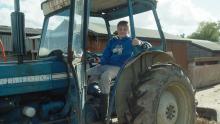
Care farming for education
Care farming for education
Care farms offer calming and supportive spaces for young people who may struggle with learning.
On a care farm, young people can improve their health and wellbeing or gain qualifications and skills. For some young people, care farming can be a path back to mainstream education.
Over half of UK care farms work with young people with Autism Spectrum Disorders and learning difficulties or as part of Alternative Provision. Around 40% of UK care farms work with under 18s with learning disabilities, mental ill health or physical disabilities.
"We have found that care farming is a really effective service for those who perhaps struggle with schooling, because it offers them an opportunity to do something different to academics, it's that hands-on work and sense of purpose."
Emma Thomas - Bridge School, Malvern
Education referrals
Young people can be referred to care farms by schools, local authorities, parents or other agencies.
Referrals can be for many different reasons, including learning difficulties, a disability, behavioural challenges or mental ill health.
Referrals to care farms can be part of SEND, part of an Education, Health and Care Plan (EHCP) or as Alternative Education Provision.
Resources for educators and care farmers
To find out more about referring a young person to a care farm, take a look at the Countryside Classroom website for teachers and educators.
If you run a care farm and work with young people, you can register for free on the website to promote what you do to potential referrers.
If you are a farmer already offering one-off school visits but want to develop regular care farming sessions, our Practical Activties for Farm Visits resource on the Countryside Classroom website can help. Developed with our partners LEAF Education, It's packed with inspiring activities to get you started.
Related articles
Care Farming for health and social care
Watch our video to see the value that care farming brings to people and the wider social care sector.
Children's Summer Activities Programme
This year we are very pleased to be working with and receiving funding from the Hilden Charitable Fund to run the Children's Summer Activities Programme. This opportunity will replace Hilden Charitable Fund’s annual Playscheme Grant Programme that had to be cancelled in 2020 due to the pandemic. SF&G members are invited to apply for grants of £1,500 to support summer activities for children. We are particularly interested in funding activities that will connect children from disadvantaged backgrounds with nature.
Funding for this scheme is only open to members of Social Farms & Gardens. Membership is free and can be applied for here.
Chris Blythe, Director at SF&G said “we’re delighted to be able to offer this funding to our members. While it’s been a very tough 12 months, our members have pulled out all the stops to support their local communities. It’s been encouraging to see the well-documented health benefits of getting outdoors and connecting with nature become more widely acknowledged, and the fantastic spaces cultivated by our members provide safe environments for everyone to enjoy. These grants will support children from disadvantaged backgrounds to enjoy the outdoors over the summer and will help our members have an even more positive impact in their communities”
SF&G members are invited to submit an application via an online form by midday on Monday 24th May 2021. Full application details can be found here.
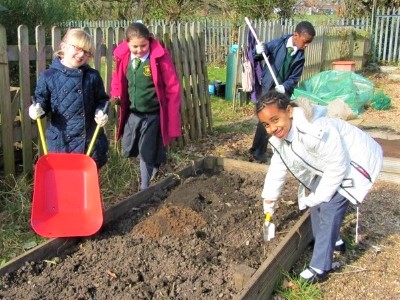
Orchards for Wales project - a success!
Orchards for Wales project - success!
This project, funded by Welsh Government and led by Social Farms & Gardens has seen the development of 57 new community orchards across Wales in 2020. The aim of the Orchards for Wales project was to provide much more than a fruitful, efficiently used, green space. This was about communities leading and managing growing spaces. It was stimulating; carbon capture, biodiversity, community cohesion and local food growing whilst helping to showcase alternative models of urban agriculture. The original project aims were simply set out as:
-
To create 10 new community orchard sites, in different settings all over Wales.
-
To promote and support small and micro-Welsh fruit & nut tree businesses.
-
To gather and create a hub of information for all things orchard related.
-
To network with and support each site in its aims and ambitions and in doing so strengthen the Welsh Heritage Orchard Cluster Group.
As the fruits grow so will our methods of orchard production, storage, education, and other legacies including skills development and micro enterprise at a community level will be gleaned from the project and its supportive sites. Stimulated by the connection of this project a new network of community led
orchards is emerging, with over 119 sites and growing, Wales may well be leading the revival of Orchards, especially those in community ownership and management. Not only do orchards deliver for people and communities – traditional orchards are a priority habitat which has largely disappeared. These new traditionally managed orchards with unimproved grassland understory will go some way to replacing this lost habitat as they mature. Most of the trees planted are also Welsh Heritage varieties which are now spread across Wales making them less vulnerable to disappearing and protecting our heritage and the resilience of our food production. Over 4,100 apple, plum, pear & medlar trees have been planted which will have a huge benefit to a whole range of pollinators, especially those that are planted in the more urban areas.
This project delivers against many of the aims of the Wellbeing of Future Generations Act – a resilient, healthier Wales – with cohesive communities of vibrant culture. It is contributing to the Clean Air Bill, The Pollination Action Plan for Wales, Wales’ Community Grown Food Action Plan and other important key priorities for Wales.
We have created some lasting legacies in the form of the Orchard Management Toolkit and we have worked well with a number of partners throughout the year.
To see the full report and read some case studies please click here for English or here for Welsh.
For more information please contact: [email protected]
Prosiect Perllannau i Gymru - llwyddiant!
Mae’r prosiect hwn, a ariennir gan Lywodraeth Cymru ac a arweinir gan Ffermydd Cymdeithasol a Gerddi, wedi arwain y gwaith o ddatblygu 57 o berllannau cymunedol newydd ledled Cymru yn 2020. Nod prosiect Perllannau Cymru yw darparu llawer mwy na man gwyrdd ffrwythlon, sy’n cael ei ddefnyddio’n effeithlon. Mae hyn yn ymwneud â chymunedau sy’n arwain ac yn rheoli mannau tyfu. Mae’n ysgogol; dal carbon, bioamrywiaeth, cydlyniant cymunedol a thyfu bwyd lleol tra’n helpu i arddangos modelau amgen o amaethyddiaeth drefol. Roedd nodau gwreiddiol y prosiect wedi’u nodi fel ac oedd:
- Creu 10 safle perllannau cymunedol newydd, mewn gwahanol leoliadau ledled Cymru.
- Hyrwyddo a chefnogi busnesau coed ffrwythau a chnau bach a micro-Gymreig.
- Casglu a chreu canolbwynt gwybodaeth ar gyfer popeth sy’n gysylltiedig â’r berllan.
- Rhwydweithio â phob safle a’i gefnogi yn ei nodau a’i uchelgeisiau ac wrth wneud hynny gryfhau Grŵp Clwstwr Perllannau Treftadaeth Cymru.
Wrth i’r ffrwythau dyfu felly a fydd ein dulliau o gynhyrchu perllannau, storio, addysg a choleddau eraill gan gynnwys datblygu sgiliau a micro-fenter ar lefel gymunedol yn cael eu casglu o’r prosiect a’i safleoedd cefnogol. Wedi’i symbylu gan gysylltiad y prosiect hwn mae rhwydwaith newydd o berllannau a arweinir gan y gymuned yn dod i’r amlwg, gyda dros 119 o safleoedd a thyfu, mae’n ddigon posibl y bydd Cymru’n arwain adfywiad Perllannau, yn enwedig y rhai mewn perchnogaeth a rheolaeth gymunedol. Nid yn unig y mae perllannau’n cyflawni ar gyfer pobl a chymunedau – mae perllannau
traddodiadol yn gynefin â blaenoriaeth sydd wedi diflannu i raddau helaeth. Bydd y perllannau newydd hyn a reolir yn draddodiadol gyda thaniad glaswelltir heb ei wella yn gwneud rhywfaint i ddisodli’r cynefin coll hwn wrth iddynt aeddfedu. Mae’r rhan fwyaf o’r coed a blannwyd hefyd yn fathau o Dreftadaeth Gymreig sydd bellach wedi’u gwasgaru ledled Cymru sy’n eu gwneud yn llai agored i ddiflannu a diogelu ein treftadaeth a gwydnwch ein cynhyrchu bwyd. Plannwyd dros 4,100 o goed
afalau, eirin, gellyg a meldar a fydd o fudd enfawr i ystod eang o bryfed peillio, yn enwedig y rhai a blannwyd yn yr ardaloedd mwy trefol.
Mae’r prosiect hwn yn cyflawni yn erbyn llawer o amcanion Deddf Llesiant Cenedlaethau’r Dyfodol – Cymru gadarn ac iachach – gyda chymunedau cydlynol o ddiwylliant bywiog. Mae’n cyfrannu at y Mesur Aer Glân, Cynllun Gweithredu Peillio Cymru, Cynllun Gweithredu Cymru ar Fwyd a Dyfir yn y Gymuned a blaenoriaethau allweddol pwysig eraill i Gymru.
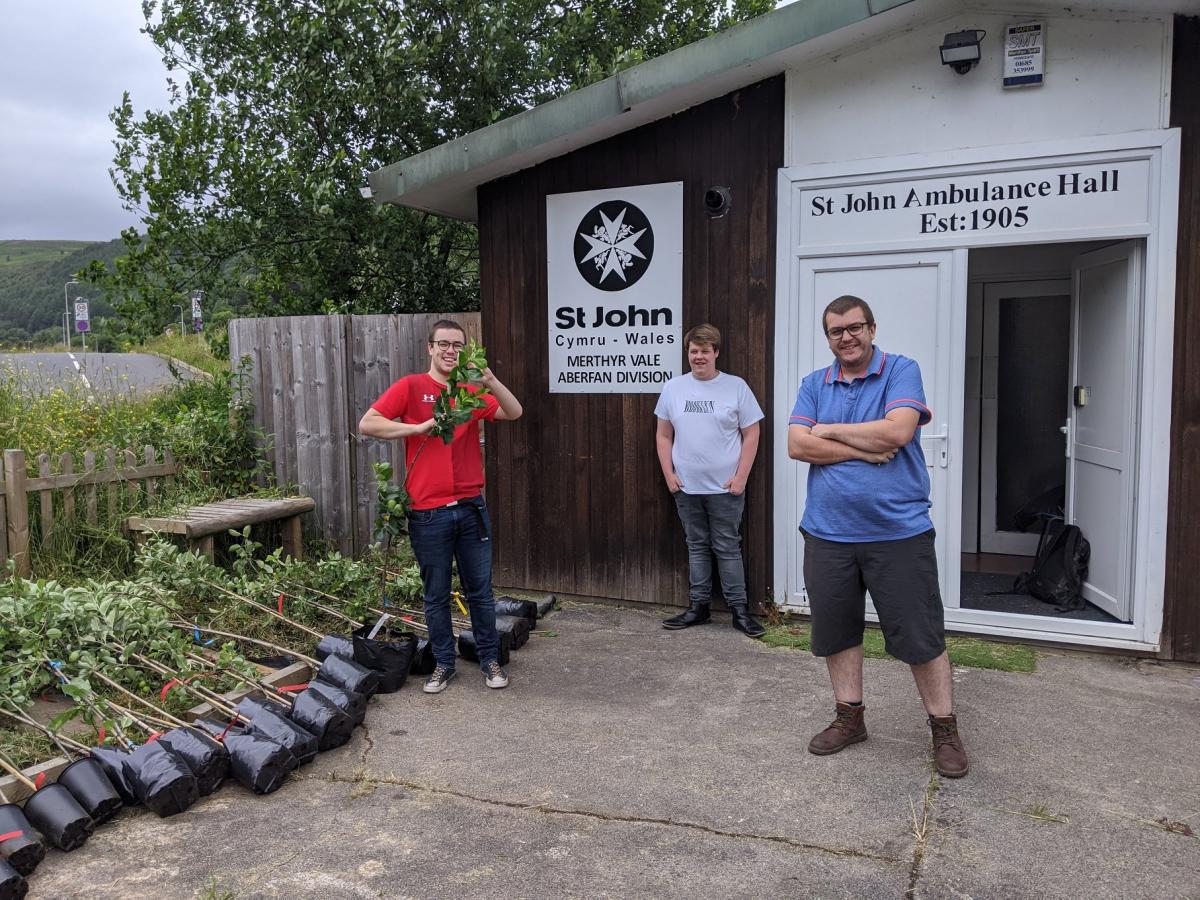
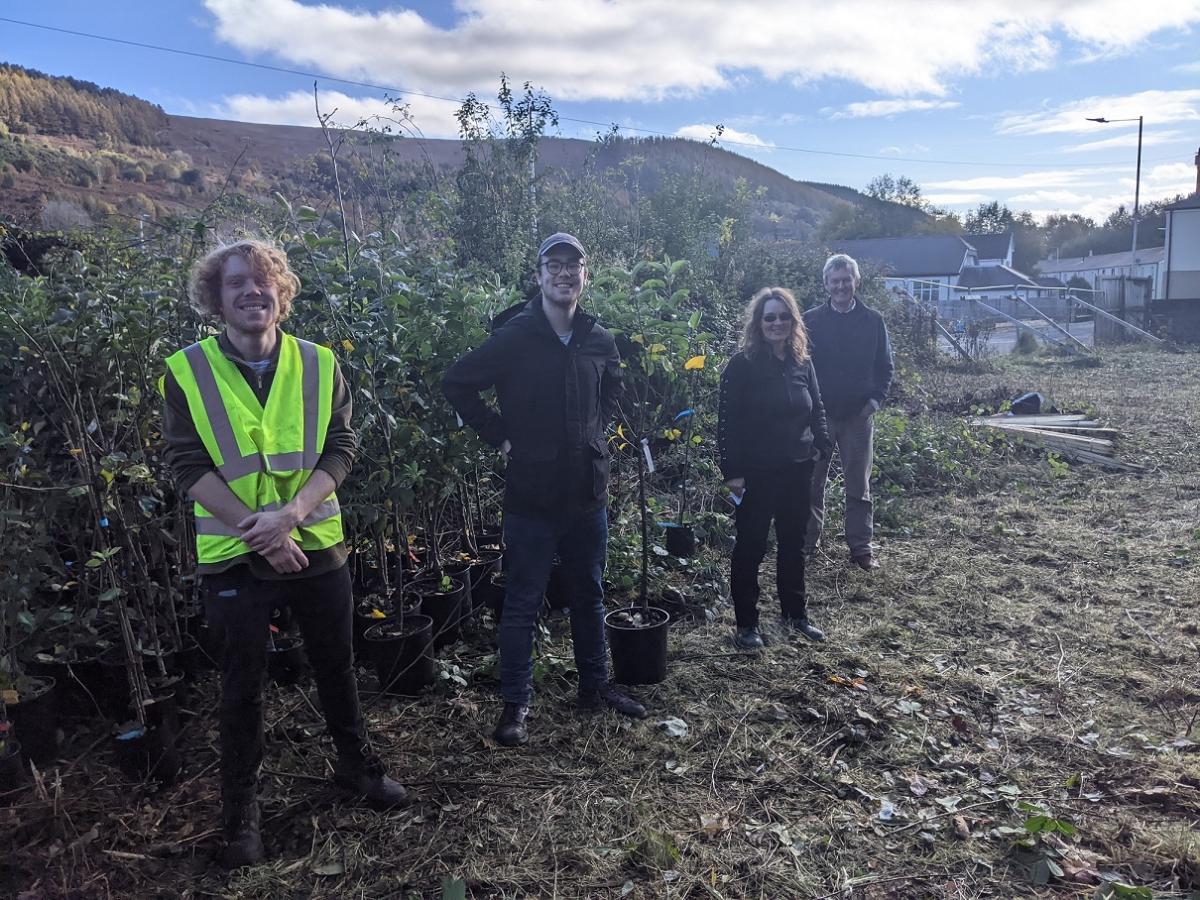
First ever City Farm Day on BBC Breakfast
Social Farms & Gardens FIRST EVER #CityFarmDay on BBC Breakfast
Happy #CityFarmDay!
This morning, Amber from Social Farms & Gardens featured on BBC Breakfast live from Vauxhall City Farm and chatted all things #CityFarmDay! She was joined by Chris from Vauxhall City Farm, and star of the show, Jerry the alpaca! Join us today to celebrate all the things that City Farms have accomplished over the last year. Get involved by using the hashtag #CityFarmDay and share any photographs or stories you have from your own City Farm experiences.
Food at the heart of City Farms - support for Communities
Food at the heart of City Farms - support for Communities
City Farms across the UK will be taking part in the first ever City Farm Day today (Thursday 25th March 2021) after a year in which dozens of them across the country have played a vital role in supporting families and vulnerable people since the first national COVID-19 lockdown in March 2020 came into force.
From running local food banks that support families in need to delivering pork pies to hardworking members of the NHS and live animal Feeding on Facebook to grow your own campaigns, City Farms have been at the heart of using food to connect with communities in need from London to Liverpool and Swansea to Edinburgh.
Chris Blythe, Director of Social Farms and Gardens, said: “Over the last 50 years a network of City Farms has bloomed across the UK, playing an important part in connecting people living in towns and cities to the farming life.
“In the past 12 months, the services and support delivered by our city Farms have been even more in demand.
“City Farm Day is a chance to tell the story of all the amazing work that staff and volunteers do day in day out to look after these special places. And to celebrate the huge contribution that City Farms have made in supporting local communities through the pandemic. They are more in demand now than ever before.”
There are more than 50 City Farms across the UK and over the last five decades they have played an important role in connecting communities to the farming life, welcoming school groups and visitors. In recent years City Farms have provided life changing opportunities for people suffering from mental health challenges, such as depression or loneliness, or have given people the chance to develop new skills to help get them back into work. This includes working with animals, helping with growing fruit and veg or running cafes.
Kentish Town City Farm was the first City Farm in the UK - set up in 1972 - and the movement has steadily grown over the last 50 years with tens of thousands of volunteers and hundreds of thousands of visitors. City Farm’s vary in size from a small football pitch to the size of a medium family Farm, with Farm animals from cows and sheep to goats and hens, community gardens and allotments.
The first ever City Farm Day is designed as a virtual celebration of the role that urban social and community focused Farms play in connecting people to farming and bringing communities together. Visitors, supporters and volunteers will be able to share what City Farms mean to them using the hashtag #cityfarmday on social media.
Mike Collins, a trustee at Bath City Farm, added: “Food has been at the heart of how the City Farm movement has responded to the huge challenges faced by volunteers and the communities that they are part of during the last year.
“Growing, cooking and eating food together is such an important part of City Farm life helping to build new communities. From running food banks to delivering meals cooked with love and supporting families in need, staff and volunteers at the City Farms have stepped up to the mark in the year since the first covid-19 lockdown.”
“City Farm Day provides a moment of reflection on how these very special places in the heart of communities across the nation nourish people, connect kids to farming and provide much loved spaces for visitors to connect to the natural world.”
Like many charities, City Farms have seen a significant drop in income over the last year that normally comes from visitors and selling food and produce in Farm shops and cafes. City Farms will start re-opening, subject to Government guidelines, in the coming weeks.
Examples of City Farms supporting their local communities since the first COVID-19 lockdown in March 2020:
Balsall Heath City Farm in Birmingham has been using its kitchen to provide hot meals for the community to take away three lunchtimes a week during the pandemic and has been used as a distribution centre for City Council funded distribution of food parcels to families and individuals in the local community.
Bath City Farm in Bath used its training kitchen to cook thousands of meals for their volunteers and vulnerable people across the city. The food was delivered by local volunteer drivers to help make sure that those in need had healthy and nutritious food. The Farm also ran a weekly Facebook Live animal feeding every Saturday morning watched by tens of thousands.
Fordhall Community Farm in Shropshire delivered 200 cream teas to a local nursing home for the VE Day celebrations and supplied pork pies to local NHS staff. They also set up the Afternoon Amble – that includes a walk, tea and cake and craft activities - as a response to the increased levels of anxiety and isolation in the local community.
Gorgie City Farm in Edinburgh became a real community hub, working with other charities based in the Scottish capital such as Big Hearts, to help deliver much needed food to hundreds of families in need.
Heeley City Farm in Sheffield ran healthy holidays events at the Farm during the 2020 summer holidays. This gave young people on free school meals a free meal whilst they weren't at school and whilst at the Farm the young people could get involved with many activities at the Farm.
St Werburghs in Bristol ran campaigns to get people growing their own produce, distributing 1000 Garden in a Box packages, and 120 Windowsill Warrior and Home Baking Hero Kits to local volunteers and families. The Farm also worked with the Coexist Community Kitchen by supplying more than 50 trays of fresh produce to turn into nutritious meals for 100 families a week.
Spitalfields City Farm in London worked with local schools to find out which families needed that extra support. The Farm team helped families look at ways to reduce food costs and supplied a range of items such as, essential cupboard stores, fresh fruit and veg, where possible this has been using Farm-grown produce and weekly essentials such as milk, eggs, bread and crackers plus some tasty treats. Recipe cards were also included with the aim of getting kids involved in the cooking.
Stonebridge City Farm in Nottingham cooked hundreds of meals for local organisations, including Highwood House Homeless Hostel, and plants and produce were donated to a local residential home for older people.
Swansea Community Farm delivered weekly food parcels (containing staples, surplus food from a local supermarket, salads, fruits and vegetables grown on the Farm and eggs laid by the ducks and hens) to 50 people in the local community struggling with food poverty, health issues or shielding, for more than eight months.
Tam O Shanter Urban Farm on the Wirral ran its Furry food bank project, working with other local charities. Local people could drop off any spare vegetables and fruits, pet food or bird seed at the Farm, where it was sorted and distributed to the charity partners who then made sure that it got to those in need.
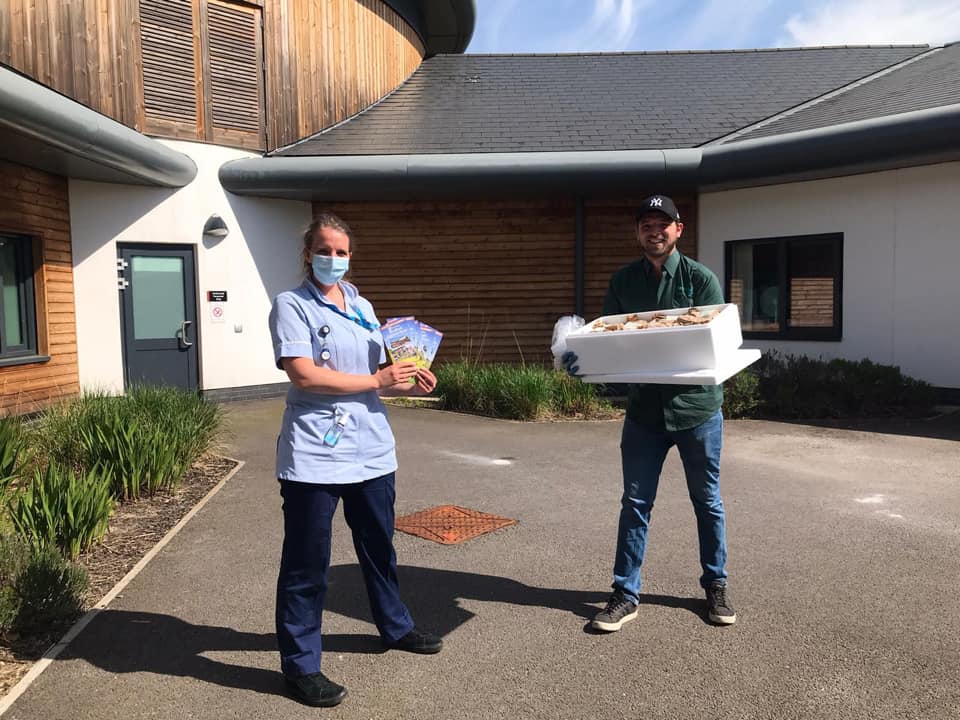
Delivering pork pies to the NHS from Fordhall Community Farm.
Nature and health research papers
View or dowload our list of key nature and health research papers.
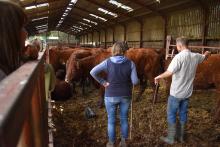
What is the scale of care farming in the UK?
What is the scale of care farming in the UK?
Social Farms & Gardens have tracked the scale and scope of the care farming sector since 2006.
Our surveys provide valuable data for care farmers and people in the green care sector.
Care farming in the UK has grown from less than a hundred care farms to a network of over 400 care farms. Care farms vary in size, context and delivery approach. Together they form a key element of the green care sector.
The results show big steps forward. As care farming has grown we've been able to move from explaining the concept to promoting quality service provision.
Care farming is making a real difference to people with a defined heath, social care or educational need right across the UK.
In 2021 there were an estimated 15,620 UK care farming places provided per week, which equates to approximately 734,140 per year.
For further reading and research on care farming in the UK, please view or download our resources or visit our scale of the sector page for survey reports.
Related articles
Allotments and Community Gardens gain building rights in Wales
Allotments and Community Gardens gain small scale agricultural planning rights to build sheds and greenhouses.
The Welsh Government has published important agricultural planning rights for allotment holders and community growers in Wales. These important rights confirm community growing as agriculture and allow them to build a small shed and/ or a greenhouse depending on the size of the growing space, without needing to apply for planning permission.
Lucie Taylor the Community Land Advisory Service Coordinator for Wales stated:
“The surge in demand to ‘grow your own’ and big increases in the numbers of community growing spaces across Wales, has meant this progression in legislation is welcome news for the thousands of community growers and allotment holders across Wales. Even though the rights only allow for small sheds and greenhouses, these new rights also confirm allotment holders and community growers to be carrying out an agricultural use of land which some local authorities have questioned in the past”.
To accompany this, Social Farms & Gardens has been working with Welsh Government on updating Guidance for Allotments and Community Led Gardening Projects which will be released later this year. With the Welsh Government wanting to create one of the most environmentally and socially responsible supply chains in the world community food growing activities are now well on their way to contributing to this aim.
Mae Rhandiroedd a Gerddi Cymunedol yn ennill hawliau cynllunio amaethyddol ar raddfa fach i adeiladu siediau a thai gwydr.
Mae Llywodraeth Cymru wedi cyhoeddi hawliau cynllunio amaethyddol pwysig i ddeiliaid rhandiroedd a thyfwyr cymunedol yng Nghymru.
Mae'r hawliau pwysig hyn yn cadarnhau tyfu cymunedol fel amaethyddiaeth ac yn caniatáu iddynt adeiladu sied fach a/neu dŷ gwydr yn dibynnu ar faint y gofod tyfu, heb fod angen gwneud cais am ganiatâd cynllunio.
Dywedodd Lucie Taylor Cydlynydd Gwasanaeth Cynghori Tir Cymunedol Cymru:
"Mae'r cynnydd yn y galw i 'dyfu eich hun' a chynnydd mawr yn nifer y mannau tyfu cymunedol ledled Cymru, wedi golygu bod y dilyniant hwn mewn deddfwriaeth yn newyddion i'w groesawu i'r miloedd o dyfwyr cymunedol a deiliaid rhandiroedd ledled Cymru. Er mai dim ond ar gyfer siediau bach a thai gwydr y mae'r hawliau'n caniatáu, mae'r hawliau newydd hyn hefyd yn cadarnhau bod deiliaid rhandiroedd a thyfwyr cymunedol yn gwneud defnydd amaethyddol o dir y mae rhai awdurdodau lleol wedi'i gwestiynu yn y gorffennol".
I gyd-fynd â hyn, mae Ffermydd a Gerddi Cymdeithasol wedi bod yn gweithio gyda Llywodraeth Cymru i ddiweddaru Canllawiau ar gyfer Rhandiroedd a Phrosiectau Garddio dan Arweiniad y Gymuned a fydd yn cael eu rhyddhau yn ddiweddarach eleni. Gyda Llywodraeth Cymru eisiau creu un o'r cadwyni cyflenwi mwyaf cyfrifol yn amgylcheddol ac yn gymdeithasol yn y byd mae gweithgareddau tyfu bwyd cymunedol bellach ar eu ffordd i gyfrannu at y nod hwn.
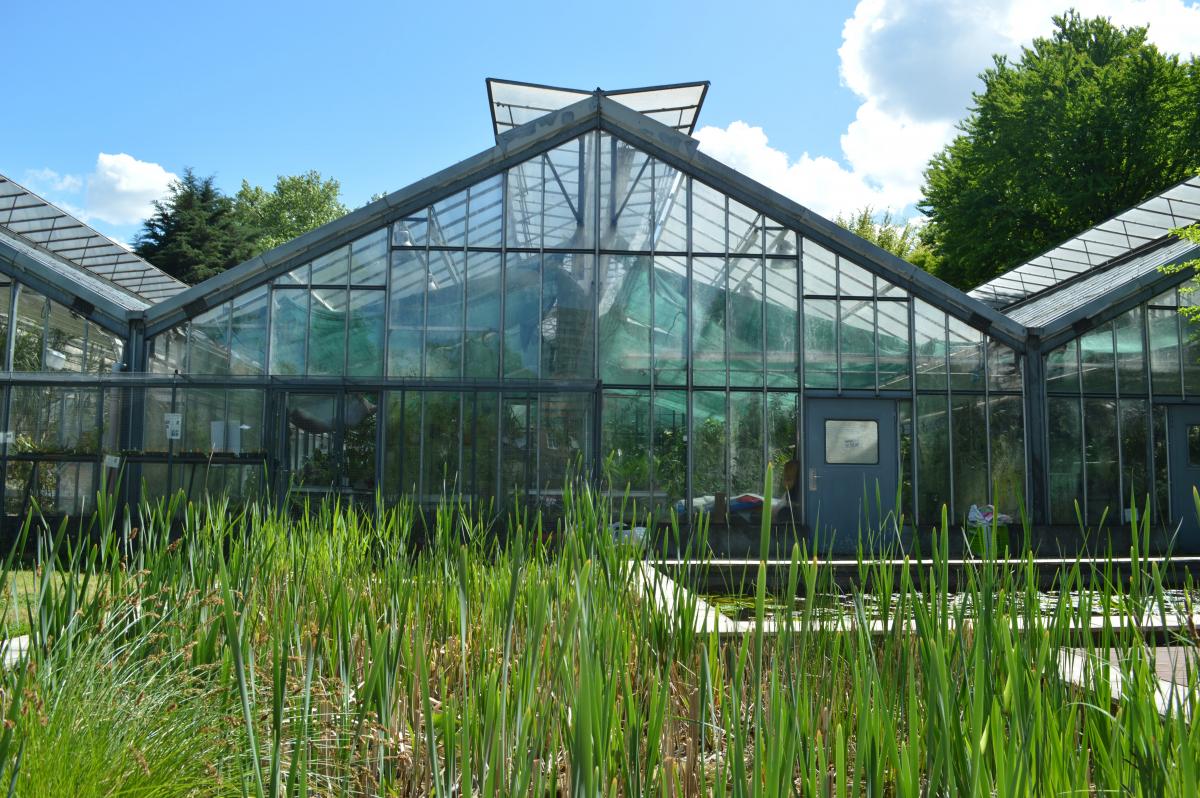
Nature and health overview
View or download our nature and health overview.
Scotland - Growing Back Stronger
Growing Back Stronger: the Community Growing Sector and a Healthier, Greener and Fairer Scotland
SF&G Scotland have launched a new report that examines the state of the sector a year into the COVID-19 pandemic.
The community growing sector’s experiences of COVID-19, as projects, communities and individuals has differed widely. Projects and partners across Scotland have come together and reached out over the last year to share and discuss our challenges and opportunities, to seek support and guidance. These insights are enlightening both as to the ‘state of the sector’ and the role it can play in recovery and renewal.
Our experiences may have differed, however, many of us share hope and a clear ambition to play a bigger part. Through over 80 voices, from across Scotland we share the reflections and lessons, the adaptions we have made through uncertainty and change, and the various stages of lockdown.
Click here to read the full report.
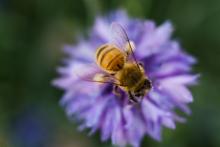
Nature and health
Nature and health
There is a growing body of research that spending time in nature is good for us.
We spend time in nature in different ways. Contact with nature can happen as part of our daily lives, or when we actively choose to engage with it. This could look like green exercise, gardening, or watching a natural view from a window.
Research shows that all types of nature contact can benefit our health and wellbeing. Spending time nature can have physical benefits, like reducing obesity and cardiovascular disease. Nature can also help with our mental health and wellbeing. It can bring us improved self-esteem, mood and an increased sense of calm.
When we have contact with nature we can start to develop a connection to nature. Connection to nature means how we include nature as part of our personal identities. It includes our emotional relationship with the natural world, our knowledge and behaviour.
Connection to nature is also linked with increased wellbeing. People who feel a strong sense of nature connection are more likely to feel happy and fulfilled.
Nature, health and care farming
Nature experiences are sometimes used to benefit health, social care or education outcomes for people with a defined need. This known as green care.
Care farming sits amongst other green care nature-based therapies. It gives people a way to actively engage with the natural world and can strengthen connection to nature.
Active engagement with the natural world is good for physical and mental health. It also has wider interlinked societal benefits such as improved social inclusion.
For further reading and research on nature and health, please view or download our resources.
Related articles
Connection to nature research
View or dowload our list of useful connection to nature research.
Care farming for social care film
Care farming for social care film
Our Growing Care Farming team have launched the second in of a series of films, created to show how care farming transforms people’s lives.
The second film in the series focuses on care farming for social care, and features interviews with service users, care farmers, families, and referrers. The videos demonstrate how care farming is a highly effective service for people living with a defined need, and how it can help improve quality of life for people. During these uncertain times, care farms have proved a lifeline for many, but have also been dearly missed by those who are not able to attend due to lockdown restrictions.
In this film we highlight how care farming is a valuable alternative to traditional types of social care. We show the powerful impact of care farming on service users themselves, but also the positive benefits for social care services, families and carers.
Care farming is the therapeutic use of farming practices. Service users regularly attend a care farm as part of a structured care, rehabilitation, or special educational programme. Service users vary hugely, from older people living with dementia, to children and adults with learning disabilities, autism, depression, or mental ill health. Care farms offer a range of farming-related activities including care of livestock, growing crops and vegetables, horticulture, and land management. The activities result in proven improvements to mental and physical health, increased self-confidence, and self-worth, reduced social isolation and for many, care farming changes their lives.
Please continue to share our work far and wide, we want this film to be seen, and have an impact on as many people as possible.
#GCFforSocialCare
Growing Care Farming is part of the Government’s Children & Nature programme and is delivered by Social Farms & Gardens, in partnership with Thrive. GCF will transform the scale of the care farming sector across England through the provision of advocacy, training and resources to create more opportunities for children and adults with a defined need to benefit from the bespoke health, care and educational services provided on care farms.
Connection to nature overview
View or download our nature connection and care farming overview.
Care farming overview
Download our care farming overview PDF.
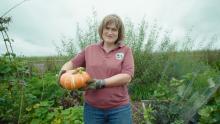
Care farming for health and social care
Care farming for health and social care
Care farming services can be an effective alternative to traditional types of care.
Care farming is sometimes called social farming, and it means the theraputic use of farming practices. It's a way for people to take part in real activity with purpose and meaning.
From seed planting to feeding animals, people can get involved in a way that suits them and their needs. More time outdoors and in nature can be good for mental health and wellbeing too.
“Care farming fits with the philosophy of person-centred care which addresses people’s needs.”
Mary - social worker
Health and social care referrals
People can be referred to care farms through health and social care providers.
Find out how partnerships between care farms and health and social care agencies work on our case studies page or find your nearest care farm.
Related articles
COVID-19 Impact Update Survey Launched
The COVID-19 pandemic has had an unprecedented global impact and we want to ensure we support our members, as we look forward to moving out of this difficult time.
We’ve developed a short survey that builds on the one we ran in April/May 2020, and will help us understand how the pandemic and restrictions have affected you and your group, how you have adapted in response to the crisis and what your current support needs are and might be going forward.
In May 2020 Social Farms & Gardens used your responses to the first survey to launch a series of webinars that responded to support needs highlighted through the survey, and also gave members an opportunity to talk about how their were adapting their work. We also relaunched our member Facebook group where now almost 1000 members and supporters are sharing ideas and supporting one another.
Social Farms & Gardens advocate and campaign for greater recognition, funding and opportunities for nature-based activities. We present a united voice for member organisations and groups delivering nature-based activities. We influence policy makers and work with partners in the voluntary, public, private and academic sectors to improve the health and wellbeing of individuals, communities and the environment.
Can you spare five minutes to share your experience with us and help us build services to support your work? Take our short survey here.
Care Farming for Mental Health and Wellbeing film
Care farming is the therapeutic use of farming practices. Service users regularly attend these care farm as part of a structured care, rehabilitation, or special educational programme. Service users vary hugely, from older people living with dementia, to children and adults with learning disabilities, autism, depression, or mental ill health. Care farms offer a range of farming-related activities including care of livestock, growing crops and vegetables, horticulture, and land management. The activities result in proven improvements to mental and physical health, increased self-confidence, and self-worth, reduced social isolation and for many, care farming changes their lives.
This film is the first in a series that our Growing Care Farming team have created and contains interviews with service users, farmers, families, and teachers, all talking about the impact that care farming has on theirs, and many other people’s lives. The videos demonstrate how care farming is a highly effective service for people living with a defined need, and how it can help improve quality of life for people. During these uncertain times, care farms have proved a lifeline for many, but have also been dearly missed by those who are not able to attend due to lockdown restrictions.
Please continue to share our work far and wide, we want this film to be seen, and have an impact on as many people as possible.
#GCFforMentalHealthandWellbeing
Growing Care Farming is part of the Government’s Children & Nature programme and is delivered by Social Farms & Gardens, in partnership with Thrive. GCF will transform the scale of the care farming sector across England through the provision of advocacy, training and resources to create more opportunities for children and adults with a defined need to benefit from the bespoke health, care and educational services provided on care farms.
Cylch Cnydau: Llywodraeth Cymru yn ariannu manteision cymunedol ar draws 4 safle yng Nghymru
Cylch Cnydau: Llywodraeth Cymru yn ariannu'r gwaith o gyflenwi a gosod systemau Amaethyddiaeth yr Amgylchedd a Reolir ar gyfer arddangos manteision cymunedol ar draws 4 safle yng Nghymru
Mae Amaethyddiaeth yr Amgylchedd a Reolir (CEA) yn broses sy'n cyfuno gwyddoniaeth planhigion, peirianneg a thechnoleg i sicrhau'r twf gorau posibl mewn planhigion, ansawdd planhigion ac effeithlonrwydd cynhyrchu er mwyn darparu system wirioneddol gynaliadwy o dyfu bwyd. Hyd yma, mae'r dulliau o ymdrin â CEA wedi bod yn wahanol iawn, heb eu cydgysylltu ac heb eu cefnogi i raddau helaeth. Drwy'r peilot hwn byddwn yn cynnig potensial twf gwirioneddol ar raddfa sy'n effeithiol, yn cael ei hatgyblu ac yn sicrhau manteision ehangach i'r rhanbarth.
Mae'r prosiect hwn, Crop Cycle, yn cael ei ariannu gan Lywodraeth Cymru drwy Gronfa Her yr Economi Sylfaenol a byddwn yn gweithio gyda busnesau a phartneriaid sydd wedi ymrwymo i bedair colofn y Contract Economaidd. Bydd y prosiect yn darparu gwely prawf ar gyfer Amaethyddiaeth yr Amgylchedd a Reolir (CEA), yn y gymuned – calon ein Heconomi Sylfaenol. Mae'r prosiect yn cael ei arwain gan Ffermydd a Gerddi Cymdeithasol gyda chefnogaeth grŵp Clwstwr Garddwriaeth Llywodraeth Cymru a Grŵp Diddordeb Arbennig CEA NutriWales.
Mae'r prosiect yn caniatáu i systemau CEA lluosog a gwahanol gael eu teilwra i ffitio gwahanol leoliadau cymunedol, ond gan ganiatáu iddynt gael eu hymchwilio a'u hasesu mewn ffordd gydgysylltiedig a chydgysylltiedig ar draws y safleoedd peilot. Mae'r dull hwn yn unigryw, gan ganiatáu profi modelau busnes newydd sy'n canolbwyntio ar y gymdeithas, ymgysylltu â'r cymunedau a busnesau lleol gyda CEA a datblygu atebion technegol newydd.
Bydd y prosiect hwn yn cyflwyno bwyd sy'n tyfu yng nghanol ein cymunedau, rhai lle maent yn deall y materion lleol ac yn gysylltiedig â deinameg benodol yr ardal leol. Bydd gweithgareddau'n profi modelau ymgysylltu newydd yn y gymuned sy'n edrych ar les cymdeithasol, entrepreneuriaeth leol ac effaith amgylcheddol. Fel hyn, bydd y prosiect yn arloesol o ran cyflawni gweithredol, ymgysylltu cymdeithasol a chreu modelau busnes gan ddod â sefydliadau cymunedol, busnesau a'r sector cyhoeddus lleol at ei gilydd.
Bydd pedwar safle'n cael eu cefnogi, ac mae dau ohonynt yn y Cymoedd. Fferm Gymunedol Green Meadow yng Nghwmbrân, un o ddim ond dwy 'fferm ddinas' yng Nghymru, ac un sy'n cysylltu pobl â bwyd a ffermio mewn ffordd gyhoeddus iawn. Mae'n eiddo i Gyngor Bwrdeistref Sirol Torfaen ac yn cael ei weithredu ganddo, gan ddod â phartneriaeth lefel uchel gydag ef. Mae'r fferm eisoes yn croesawu miloedd o ymwelwyr drwy ei gatiau ac yn cysylltu'n lleol drwy nifer o bartneriaethau ysgolion a cholegau – gan ei gwneud yn lleoliad 'arddangos' delfrydol ar gyfer y peilot hwn.
Croeso i'n Coed yn Nhreherbert yw ail safle'r cymoedd, sy'n nythu yng nghanol Cymoedd y Rhondda. Mae'r grŵp cymunedol rhagweithiol hwn wedi bod wrthi'n ymgysylltu â'i gymunedau drwy bartneriaethau â CIC y Cymoedd Gwyrdd a'u prosiect 'Skyline' ar y cyd. Mae'r bartneriaeth hon a'r ffordd o weithio ar y ddaear wedi arwain at nifer o fuddsoddiadau ariannu yn y rhanbarth sy'n ceisio archwilio perchnogaeth gymunedol ar dir a'r manteision y gellir eu sicrhau drwy ganiatáu i'r gymuned ddefnyddio rhai o'u hasedau gwyrdd naturiol cyfagos er mwyn gwella'r amgylchedd, a'r cymunedau lleol. Mae hyn yn ei wneud yn ffit unigryw a pherffaith ar gyfer y peilot hwn.
Dywedodd Ian Thomas o Croeso i'n Coed, 'mae gwaith yn mynd rhagddo'n dda ar y cyfleuster tyfu yn Nhreherbert ac rydym yn gyffrous i ddod â phrosiect mor arloesol a blaengar i'n stryd fawr leol. Rydym eisoes wedi bod yn ymgysylltu â chymuned y Rhondda Uchaf i archwilio'r prosiectau sy'n defnyddio ein coetiroedd yn weithredol er budd y rhai sydd o'u hamgylch, ac mae mentrau fel hyn yn helpu i roi syniad i bobl leol o'r hyn y gellir ei gyflawni'.
Bydd y trydydd safle yn y Drenewydd, yng nghanol y Drenewydd a bydd yn darparu dau safle cysylltiedig, un o fewn y gofod tyfu cymunedol sefydledig sydd ynghlwm wrth Gampws y Drenewydd Grŵp Coleg Castell-nedd Port Talbot ac un o fewn siop 'Economi Gylchol' newydd yng nghanol y dref: bydd systemau CEA yn cael eu hintegreiddio i safle coleg gweithredol a reolir gan grŵp cymunedol sy'n darparu atebion economi gylchol , gyda chaffi a chegin, siop, Deli a bocs llysiau ar waith. Bydd y safle'n cael ei gefnogi gan Cultivate, sy'n fenter aelodaeth gydweithredol sy'n cysylltu bwyd a chymuned. Nod Cultivate yw mynd i'r afael â llawer o'r materion sy'n gysylltiedig â'r system fwyd fodern, a chanolbwyntio ar greu atebion bwyd lleol cynaliadwy.
Bydd y safle olaf yn Xplore! Canolfan Darganfod Gwyddoniaeth yn Wrecsam, sydd wedi'i lleoli yng nghanol Wrecsam, canolfan wyddoniaeth newydd sbon a fydd yn cefnogi'r gwaith o hyrwyddo amaethyddiaeth drefol yn ardal drefol fwyaf gogledd Cymru. Bydd yn estyn allan at bob cenhedlaeth, gan arddangos technoleg newydd a dulliau garddwriaeth modern wedi'u cymysgu â phrofiad cynyddol traddodiadol. Xplore! Yn croesawu ymwelwyr cyhoeddus yn ogystal â grwpiau ysgol ac yn darparu amrywiaeth o weithdai addysgol.
Dywedodd Gary Mitchell, Rheolwr Cymru ar gyfer Ffermydd a Gerddi Cymdeithasol sy'n arwain tîm y prosiect, 'rydym yn gyffrous i fod yn rhedeg y prosiect peilot ar draws set amrywiol o safleoedd i gael mewnwelediad a gwybodaeth bellach am sut y gall systemau amaethyddol newydd gefnogi cymunedau'n llwyddiannus i ddarparu bwydydd lleol, ffres a maethlon yn ogystal â manteision cymdeithasol pwysig mewn modd cynaliadwy'.
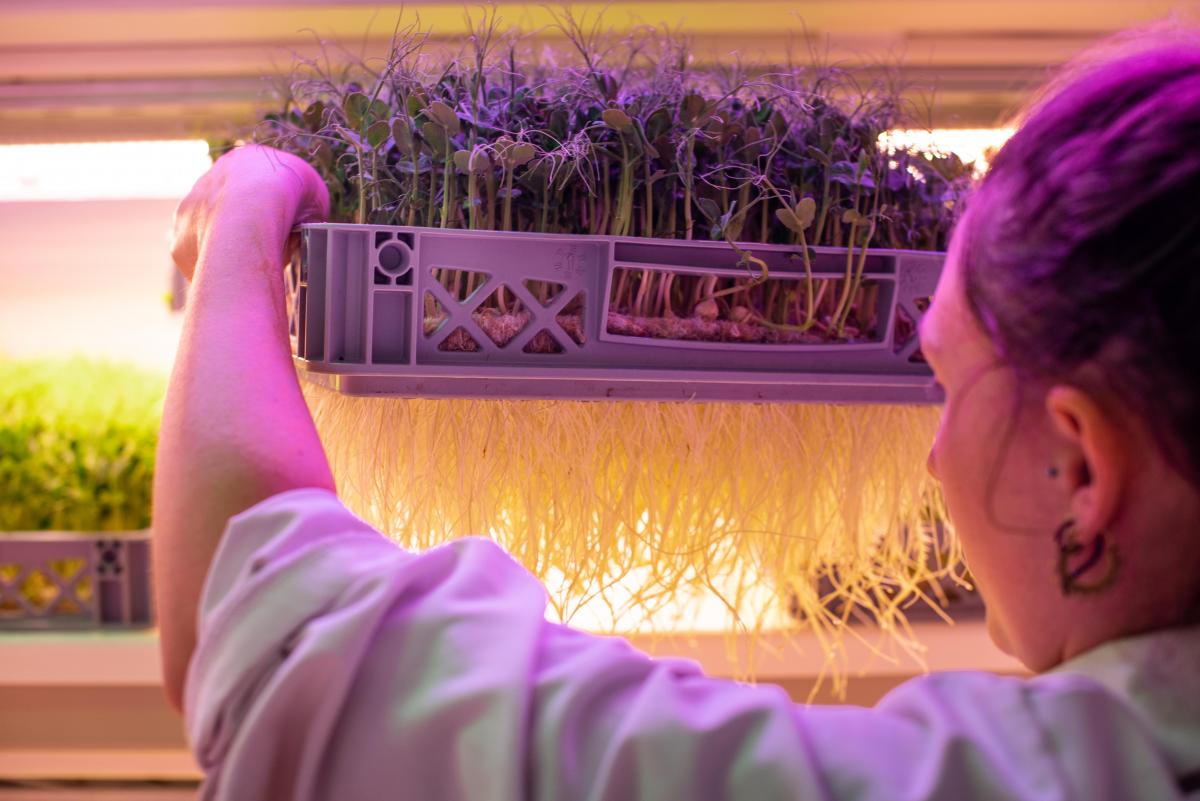
CREDYD LLUN: Jack Whiseall, LettUs Grow
Crop Cycle: Welsh Government fund community benefits across 4 sites in Wales
Crop Cycle: Welsh Government fund the supply & installation of Controlled Environment Agriculture systems for the demonstration of community benefits across 4 sites in Wales
Controlled Environment Agriculture (CEA) is a process that combines plant science, engineering and technology to optimise plant growing, plant quality and production efficiency to provide a truly sustainable system of food growing. To date the approaches to CEA have been vastly different, un-co-ordinated and largely un-supported. Through this pilot we will offer real growth potential at a scale that is impactful, replicable and delivers wider benefits for the region.
This project, Crop Cycle, is being funded by the Welsh Government through the Foundational Economy Challenge Fund and we will be working with business and partners who are committed to the four pillars of the Economic Contract. The project will provide a test bed for Controlled Environment Agriculture (CEA), in the community setting – the very heart of our Foundational Economy. The project is being led by Social Farms & Gardens supported by Welsh Government’s Horticulture Cluster group and NutriWales CEA Special Interest Group.
The project allows for multiple & differing CEA systems to be tailored to fit different community settings, but allowing them to be investigated and assessed in a co-ordinated and joined up way across the pilot sites. This approach is unique, allowing the testing of new socially focused business models, the engagement of the local communities and businesses with CEA and the development of new technical solutions.
This project will introduce food growing right into the heart of our communities, ones where they understand the local issues and are connected to the particular dynamics of the local area. Activities will test new community-based engagement models looking at social well-being, local entrepreneurship and environmental impact. In this way, the project will be innovative in its operational delivery, social engagement and business model creation bringing together community, businesses and local public sector organisations.
Four sites will be supported, two of which are in the Valleys. Green Meadow Community Farm in Cwmbran, one of only two ‘city farms’ in Wales, and one which connects people to food and farming in a very public way. It is owned and operated by Torfaen County Borough Council, bringing with it a high-level partnership. The farm already welcomes thousands of visitors through its gates and connects locally through a number of schools and college partnerships – making it an ideal ‘showcase’ location for this pilot.
Welcome To Our Woods in Treherbert is the second valleys site, nestled in the heart of the Rhondda Valleys. This proactive community group has been actively engaging with its communities through partnerships with the Green Valleys CIC and their joint ‘Skyline’ project. This partnership and ground up way of working has led to several funding investments in the region looking to explore community ownership of land and the benefits that can be brought about by allowing the community to utilise some of their surrounding natural green assets for the betterment of the environment, and the local communities. This makes it a unique and perfect fit for this pilot.
Ian Thomas from Welcome To Our Woods, said, ‘work is progressing well on the growing facility in Treherbert and we are excited to be bringing such an innovative and progressive project to our local high street. We have already been engaging with the Upper Rhondda community to explore the projects that actively use our woodlands for the benefit of those they surround, and initiatives such as this help give local people an idea of what can be achieved’.
The third site will be in Newtown, situated in the centre of Newtown and will deliver two linked sites, one within the established community growing space attached to the Newtown Campus of the Neath Port Talbot College Group and one within a new town centre ‘Circular Economy’ shop: the CEA systems will be integrated into an active college site managed by a community group delivering circular economy solutions, with a cafe and kitchen, shop, Deli and veg box scheme in place. The site will be supported by Cultivate, which is a membership cooperative linking food and community. Cultivate aim to address many of the issues associated with the modern food system, and focus on creating sustainable local food solutions.
The final site will be in Xplore! Science Discovery Centre in Wrexham, situated in the centre of Wrexham, a brand new science centre that will support the promotion of urban agriculture in north Wales’ largest urban area. It will reach out to all generations, showcasing new technology and modern horticulture methods blended with traditional growing experience. Xplore! Welcomes public visitors as well as school groups and provides a range of educational workshops.
Gary Mitchell, the Wales Manager for Social Farms & Gardens who is leading the project team stated, ‘we are excited to be running the pilot project across a diverse set of sites to gain insight and further knowledge into how new agricultural systems can successfully support communities in delivering local, fresh and nutritious foods as well as important social benefits in a sustainable manner’.
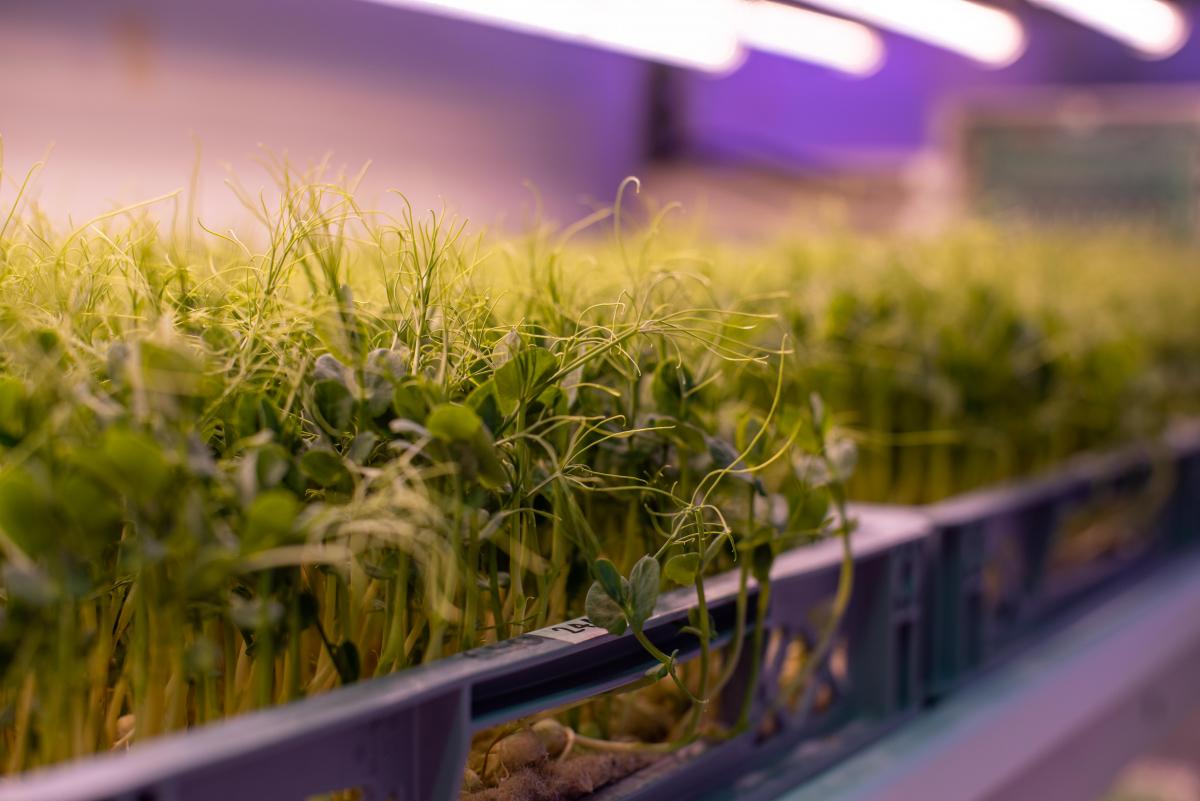
PHOTOGRAPH CREDIT: Jack Whiseall, LettUs Grow
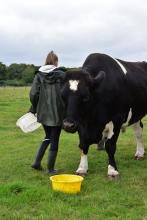
Practical support for care farming
Practical support for care farming
We encourage anyone developing a care farm to work towards our Green Care Quality Mark.
The Green Care Quality Mark (previously called the Care Farming Code of Practice) is essentially a minimum standard - a clear set of guidelines, intended to meet the requirements of commissioners, other referral agencies and service users.
It was developed by a team of care farmers and other specialists and we encourage all those providing care farming services to adopt the Code. This includes farm and garden sites delivering other green care services such as Social &Therapeutic Horticulture (STH) and Animal Assisted Therapies (AAT). The Code is a quality assurance scheme that addresses the most important aspects of care farming.
Visit our events page for the latest training and event dates.
Related articles
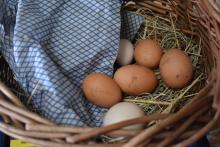
Care farming income and finances
Care farming income and finances
We firmly believe that care farmers need to be properly reimbursed for their time and expertise and that care farms need a strong economic foundation, however we also firmly believe that the main driver of care farming cannot be financial gain.
Visiting care farms around the UK you will find what connects the care farmers is their passion to help others. This should always be the primary consideration when thinking about starting out in care farming.
Care farms are extremely varied and are often developed off the back of an existing enterprise. Many care farmers supplement their income from other sources such as commercial farming, educational visit fees, farm shops or cafes or even through accessing external funding like grants, donations, crowdfunding or sponsorship.
If you're a farmer already, take a look at the questions to consider before you start care farming.
If you're not a farmer but would still like to become a care farmer, read our advice on where to start.
Related articles
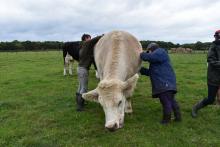
What makes a care farm
What makes a care farm
If you are regularly working with people with a defined need and are doing activities outdoors which might include animal assisted therapy, growing crops, horticulture or land management, you are already care farming, even if you are not specifically being paid to deliver these services.
You don't have to have animals on your care farm. Many care farms do not have any animals and care farming can also take place in variety of settings, including urban based community allotments and gardens.
It is the combination of the intervention and the working farm environment that is important and defines the care farm.
Find out more about developing your care farming services.
Related articles
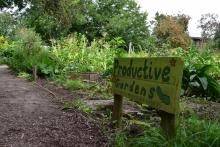
Funding for setting up a care farm
Funding for setting up a care farm
As far as SF&G is aware, there is no funding specifically available for setting up a care farm. Some care farms have accessed money from DEFRA for capital works and others have received money following bids they put in to charitable organisations.
Awards for All Lottery funding does allow for feasibility studies including business planning grants of up to £10,000, but the procedures are changing and community benefit must be demonstrated. This is not available for individuals though, only for charities or social enterprise groups.
National Parks have got Sustainable Development Funds, which may apply to care farm projects and some of this money is available for setting up pilots or fact finding visits.
If you are based in Wales, The Development bank of Wales might be able to help you.
ESF (European funding) is available in certain deprived areas to pay for revenue, running costs and capital expenditures. The various Community Foundations might offer help in finding grants.
There may also be funds available through ERDP (England Rural Development Programme), known as LEADER, which has both an agricultural and social slant. Use the website to find a local contact for your region.
Related articles
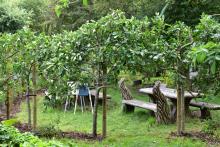
Care farming advice for non-farmers
Care farming advice for non-farmers
You don't need an agricultral background to become a care farmer, but you may need some help with the practical aspects of farming.
Perhaps you work in education, health or social care and have been inspired to start care farming. You might have seen first-hand what a difference care farming can make to people and be keen to turn your idea into a reality.
Land access
The first thing to ask yourself is, do I have a site I can use?
Land aquisition is often be one of the first hurdles to overcome when trying to set up a care farm. It is a broad subject and can differ from region to region, depending on the policies of your Local Authority.
You could try working with a local farm and seeing if they can help, or use our map to find a care farm near you.
The Community Land Advisory Service (CLAS) is hosted by Social Farms & Gardens and aims to increase community access to land, particularly for green space activities. CLAS is currently funded in Wales and you can find information on finding, buying, offering and leasing land.
Farming skills
If you have a site but are struggling with how to go about growing vegetables or keeping animals, local farming organisations may be able to help. You could also try land based further education colleges. Landex represents land based colleges and universites.
Training and resources
Our free Principles of Care Farming video resource is a great place to start. For more in depth courses, take a look at care farming training on our events page. For quality assurance, our Green Care Quality Mark sets out the minimum standards that you should meet as a care farm or green care provider. Become a member of Social Farms & Gardens as a prospective care farm. If you become a member you'll be able to access other resources that you might find useful, like the Starting a Care Farm checklist. Take part in CEVAS training which is also recommended for people wanting to start in the care farming sector. Read through our tips on care farming governance, and check out the Gov.UK website for general business start up advice and information on legal structures.
Related articles
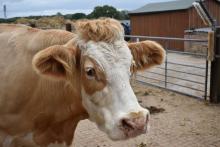
Care farming advice for farmers
Care farming advice for farmers
Probably the most important factor in starting up a care farm is motivation. You have to really want to do it, and not purely as a business activity.
Your priority as a care farmer is to provide health and social care services for individuals from one or a number of vulnerable groups. You will want to create a meaningful environment where people can spend time, gain confidence, new skills and experience how a farm works.
Economics also plays a part and some farms are keen to broaden their income stream by setting up as a care farm. You can earn a decent living mixing farming and care, but it is likely that there will be extra costs involved too.
Questions to ask
If your motivation is primarily economic you may want to think about doing something else. In the first instance, try asking yourself the following questions to see if you’re ready to take your idea further:
- What is my motivation - How long have I been thinking about this and why do I want to do it?
- Which client group/s would I like to welcome to my farm and why?
- What activities could be done on my farm and would the potential client group/s be interested or suited?
- Can I find activities to do all year round, and in all weathers?
- Do I have the facilities for people to get warm and dry or eat lunch, would I need to build/convert somewhere?
- Do I have the money to invest into that or would I need to find funding?
- Would all the family welcome this plan?
- Do I like spending time with people and do I want them on the farm every day or just a couple of days a week?
- Do I have good social skills, patience and empathy?
- Is my site/farm fairly accessible as it is likely that a significant number of people will be coming from more urban areas?
- Would my neighbours/parish council/local community be supportive?
- Am I happy handling paperwork or would I need to employ someone to help with this?
Working with care farming groups
If all these questions seem overwhelming, try to picture it on your farm and see if you can see yourself in that picture. If you can’t but would still like to see the farm being used as a care farm, perhaps you could let a group come in to use some of the land and buildings.
This can work very well as the group/project leader will have the background and experience to ensure that the participants are looked after and engaging with the activities, and you can advise on the farming/horticulture/animal side of things.
Either way, you will need to get a potential purchaser of your care farm service on-side.
Training and resources
Our free Principles of Care Farming video resource is a great place to start. For more in depth courses, take a look at care farming training on our events page. For quality assurance, our Green Care Quality Mark sets out the minimum standards that you should meet as a care farm or green care provider.
Become a member of Social Farms & Gardens as a prospective care farm. If you become a member you'll be able to access other resources that you might find useful, like the Starting a Care Farm checklist.
Take part in CEVAS training which is also recommended for people wanting to start in the care farming sector.
Read through our tips on care farming governance, and check out the Gov.UK website for general business start up advice and information on legal structures.
If you're a care farmer already running one-off school visits and want to develop regular care farming sessions for young people, we've developed a Practical Activities for Farm Visits resource with our partners LEAF Education. It's full of inspiring ideas to get you started. Find out more about care farming for education on our Explore Care Farming Services page.
Related articles
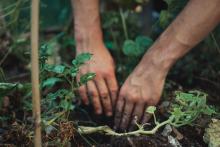
Connection to nature
Connection to nature
Connection to nature is about our attitude towards the natural world.
So far, research has shown a clear link between connection to nature and a person's wellbeing.
People who feel a stronger sense of connection are more likely to feel happy and fulfilled. In contrast, a lack of connection to nature may have a negative effect on our health and wellbeing.
Connection to nature is how much we see ourselves as part of nature or separate from it.
Connecting with nature at a deeper level can help keep us healthy and protect the world around us. It can help us address climate change, wildlife loss and declining mental health.
“No one will protect what they don't care about; and no one will care about what they have never experienced.”
David Attenborough
Connection to nature and care farms
Care farms provide many opportunities for people to connect with nature.
Farming activities that deepen connection to nature could benefit both service users and our natural environment.
Care farmers can foster a connection with nature. This might be by using art, stories or by observing and recording nature through the seasons.
Measuring nature connectedness over time could help show the effectiveness of care farming in impact assessments.
For more information on connection to nature, please take a look at our resources.
Related articles
Grants available for small horticultural businesses in Wales
With more and more people interested in and participating in food production, and with growing at home at an all-time high due to COVID-19, now is a great time for small horticultural businesses to expand their ventures.
To help grow smaller edible horticultural businesses operating in Wales, Food Sense Wales along with partners Social Farms & Gardens, are awarding up to six grants of between £2500 to £5000 to small businesses with no more than 5-Hectares of production land. The grant application process is now open and the closing date for applications is midday, Monday 30th November 2020. Click here for more information on how you can apply.
This is a fantastic opportunity for small horticultural businesses to access small capital grants as part of Peas Please, a UK National Lottery funded programme whose main aim us to drive up veg consumption. This grant is being delivered in Wales by Food Sense Wales in partnership with Social Farms & Gardens.
This funding is available to research and pilot the difference that small capital investments can make to small scale horticulture businesses. Grants of between £2500 to £5000 will be offered to a small number of applicants in Wales. Preference will be given to those operating in low-income areas.
“For many years horticulture, particularly small scale production, has been under resourced as producers working land of under 5 Hectares have not been eligible for subsidy. However, there is evidence to suggest that they could significantly expand sales and reach if investment in infrastructure was available,”
says Katie Palmer, Programme Manager at Food Sense Wales, an organisation that’s working to influence how food is produced and consumed in Wales, ensuring that sustainable food and farming is at the heart of a just, connected and prosperous food system.
“This is a really exciting scheme that will explore the impact that small capital investments can have on these smaller scale horticulture businesses and we’re looking forward to working with companies across Wales to measure the success of the scheme.”
Wales Manager, Gary Mitchell from Social Farms and Gardens adds:
“We know that being outdoors provides huge benefits to physical and mental health & wellbeing and that promoting healthy lifestyles is at the top of the agenda in the longer-term fight against COVID-19. With loneliness and mental ill health on the increase, the importance of safe, outdoors community spaces is more important than ever. In addition to this, local, community growing is absolutely key in tackling some key issues surrounding climate change, and biodiversity and will be at the top of the agenda for many people in our communities.”
Successful grant recipients will be required to meet with a researcher, before and after the investment to evaluate what impact the grant investment can make in terms of production, sales and sustainability of the organisation.
This pilot has been designed with key stakeholders and the overall impact of the pilot will be evaluated and a case study report written highlighting areas of good practice, the findings of which will be shared with Welsh Government.
Find our full press release here in both Welsh and English
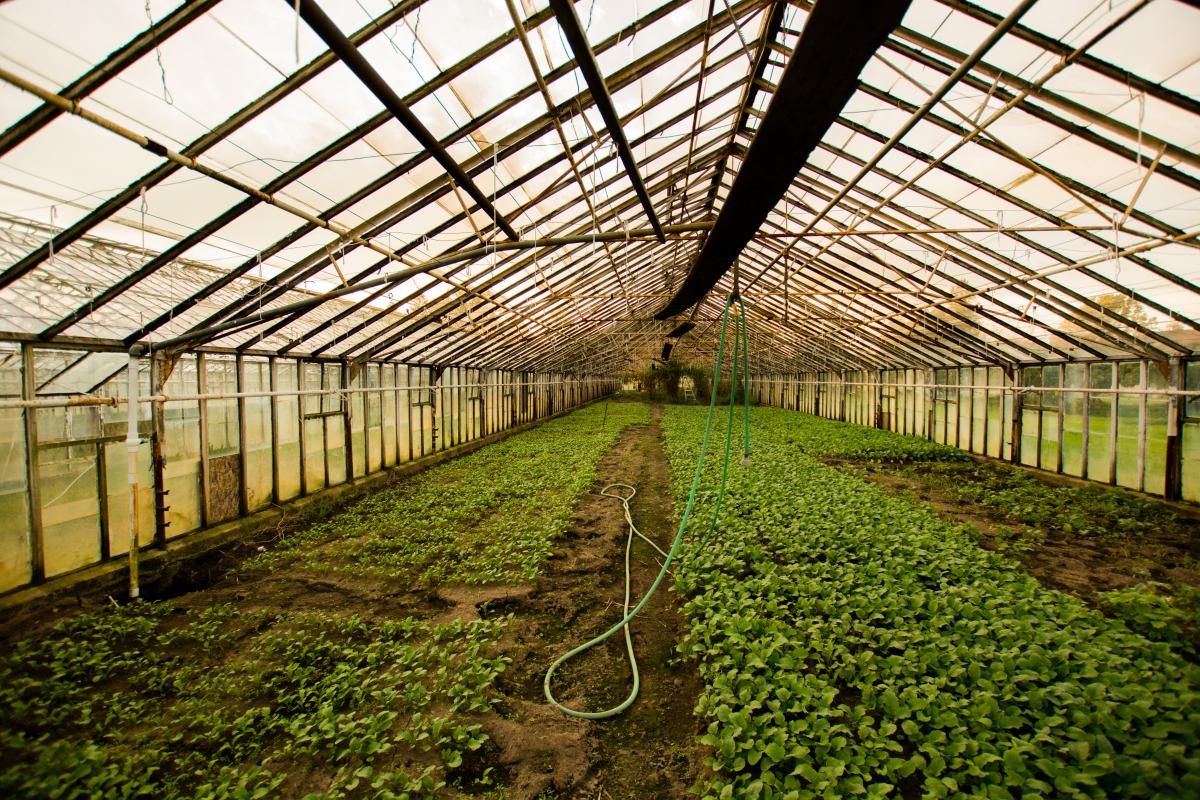
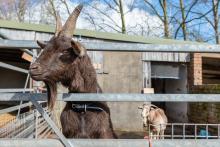
Wider benefits of care farming?
Wider benefits of care farming?
Care farming is a good thing for our society in lots of different ways.
Benefits for service users
- Improvements to mental and physical health
- Increased self-confidence and self-worth
- Reduced social isolation
Benefits for health and social care providers
- An innovative and effective care option
- Takes the strain from statutory services and the NHS
Benefits for farmers
- Farmers have an alternative way to use their farm to provide health. social and education services in addition to or instead of commercial production
Related articles
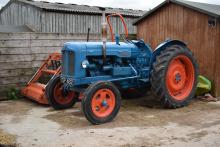
Why does care farming work?
Why does care farming work?
People have understood the health benefits of being outside for a long time. Care farming is a powerful mix of nature, social interaction and meaningful farming. The individual comes first with activities tailored to them.
Care farms give people access to nature that they may not find in their day to day lives. The agricultural setting is important because farming activities have a real purpose. From animal care to growing plants, people can get involved in a safe and structured way.
Service users experience improvements to health and wellbeing and social skills. This might mean increased self-confidence and self-worth and reduced social isolation. For many, care farming changes their lives.
"Care farming works works because you treat people as individuals and leave a diagnosis at the farm gate. You're doing something real, and everything has a purpose."
Robin Asquith, Care Farm Manager
Related articles
What is care farming?
Watch our video to find out what care farming is and how it helps people.
HRH The Prince of Wales extends his Patronage of Social Farms & Gardens
Social Farms & Gardens are delighted to announce that The Prince of Wales has chosen to extend his Patronage of the charity. The Prince of Wales has always taken a keen interest in our work to support communities to farm, garden and grow together, and over the summer he accepted an invitation to extend his Patronage for a further term.
His Royal Highness first became Patron of the charity in 2001. Nineteen years on, the charity supports a wide and ever growing network of exceptional groups and people working across the community growing and farming sector; delivering vital services to thousands of people and changing lives every day.
Chris Blythe, Social Farms & Gardens Director says
“We are honoured and delighted to have the continued backing of The Prince of Wales. Celebrating our 40th anniversary this year has been especially difficult in the current situation, many of our planned events have had to be postponed in order to focus on supporting our membership through this challenging time. The continued support of His Royal Highness comes at an important time where all of us in the sector are under great strain and striving to provide our upmost support to the people and groups that need our help the most.”
The Prince of Wales’s support for Social Farms & Gardens and the sector as a whole has enabled huge achievements over the years, his ongoing support will enable us to achieve even more.

COVID - 19: a growing opportunity for community gardening in London
Read our newly published blog in the Urban Agricultural Magazine today! In collaboration with the University of Kent, and as part of the FEW Meter programme, the blog examines how when the UK went into lockdown in March, many community gardens stepped up as emergency food providers. We discuss the huge mental and physical health benefits of gardening and make the case for how community gardens should be included in the national post-pandemic recovery plan.
"As the UK went into COVID-19 lockdown in March 2020, many community gardens in London stepped up as emergency food providers, despite unclear government advice on whether they could continue operating. Highlighting the flexible, community-centred approach of such gardens, as well as the mental and physical health benefits of gardening, this blog post makes the case for including community gardens in the national post-pandemic recovery plan.
In March 2020, as COVID-19 took hold in the UK and restrictions tightened, the public panicked and stripped supermarket shelves – firstly of non-perishable goods, then of fresh fruit and vegetables. In a social media appeal, a critical care nurse, after finding supermarket shelves empty at the end of a shift, pleaded with the public to stop the panic buying. A YouGov poll found that of the 8.1 million people in the UK facing food insecurity, 50% were unable to obtain the food they needed because of shortages in shops. All the major grocery chains adapted, introducing the rationing of certain products and queueing to allow for social distancing, and the situation started to calm.
However, those empty produce shelves suggested an opportunity for community gardens and farms to up their game, expand production, and distribute produce to those in need. But, paradoxically, just at the time their produce was needed, it was unclear whether ‘community’ gardens would be able to remain open."
We discuss how many community gardens were overwhelmed by the increased demand for veg boxes. How gardening, which saw an increase in uptake during lockdown, plays a vital role both in reducing mental health symptoms and in tackling obesity and how community gardens in London have demonstrated their niche role during the pandemic in terms of food provision to those in need locally and in providing a safe outdoor space for those with mental health illness.
"It is time to review the role that these spaces have played in the pandemic and to assess their growing potential in the ‘new normal’ policy arena. Community gardens and other forms of urban farming have the potential to play a role in the three main policy areas that normally receive focus from the UK government: health, climate change and environment, and community cohesion/development. A recent FAO briefing highlights the need for better integration of food and health systems into urban policies and plans. As the UK rebuilds its health and economy post-pandemic, community gardens should have a role in any recovery plan, as a means of contributing to both food supply and community resilience in times of crisis. Their role in providing health and social support should be formally acknowledged, and they should be financed accordingly. Moreover, gardening should be seen as a serious measure to tackle the UK’s obesity crisis and related COVID-19 mortality impact."
Read the article in full here
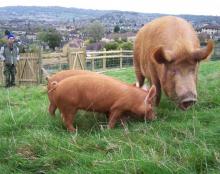
Who is care farming for?
Who is care farming for?
Anyone with a defined need can benefit from care farming. A defined need could be a clinical diagnosis, a social care need or an educational need.
Care farms often provide services for:
- People with mental ill-health
- Young people excluded from school or on Alternative Provision
- Adults, young people or children with learning disabilities or with ASD
- People living with dementia
- Ex-service personnel with PTSD
- People with a drug or alcohol addiction history
Around 400 care farms provide an estimated total of 10,200 places per week across the UK. Care farming is becoming more widely recognised as an effective service by health, specialist education and social care commissioners.
All sorts of organisations refer people to care farms – from social services, community mental health teams, schools, Pupil Referral Units (PRUs) and Alternative Provision Institutions (APIs) to GPs, probation services and families.
Find out more about different care farming services and how they help people.
Related articles
Knowledge base resource test
Aenean a diam odio. Donec lacinia consequat erat vel interdum. Integer bibendum metus at suscipit pretium. Aenean tincidunt felis vel lacus consequat, id bibendum massa posuere. Aliquam eget ante sapien. Suspendisse a volutpat felis, id consectetur augue. Vestibulum ut posuere nunc. Nulla luctus felis in erat viverra, ac volutpat eros fringilla. Quisque efficitur diam sit amet neque tristique eleifend. Phasellus quis quam dui. Phasellus iaculis tincidunt dictum. Vivamus pulvinar arcu sem, nec maximus dolor mollis nec.
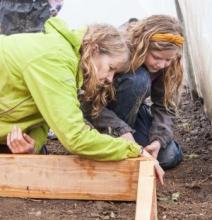
What is care farming?
What is care farming?
Care farming means the therapeutic use of farming practices. It's sometimes called social farming.
Care farming sits amongst other nature-based therapies that are collectively called 'green care'. Green care means structured nature programmes for people with a defined need to benefit health, social care or education outcomes. Social Farms & Gardens is a founding member of the Green Care Coalition. The coalition represents green care providers in the UK and promotes green care as effective option for health and social care.
People attend care farms for different reasons. It can be for health and social care, mental health and wellbeing, rehabilitation or a specialist education programme.
There are around 400 care farms of all shapes and sizes right across the UK providing care places. Care farms can look very different from each other and are as diverse as the people that they support.
One thing all care farms have is common is providing a supervised, structured programme of farm-related activity for people with a defined need. Care is bespoke, person-centred and focused on the individual.
What is unique, is that care farming activity has a real purpose behind it. People are able to make a meaningful contribution to the running of a farm. This might be through animal care, growing crops and vegetables, horticulture or land management.
People who commission care services are increasingly recognising the benefits of care farming.
Care farms:
- Deliver health care, social care or specialist educational services for individuals from one or a range of vulnerable groups of people
- Provide a programme of farming-related activities for individuals with a defined need
- Provide supervised, structured, bespoke care services on a regular basis for service users
- Are commissioned to provide services by a range of referral agencies
- Deliver services for adults, young people and children
Take a closer look at care farms with our care farming case studies.
Related articles
Find care farming research
Find care farming-related research
There's a wealth of information out there showing just how effective care farming and green care can be. Explore our research topics below or use the search bar to find something specific.
Learn about care farming
Learn about care farming
If you'd like to know what care farming is about, please explore the articles below for an introduction.
Have a specific question? Try searching the knowledge base.
Develop care farming services
Develop care farming services
If you're already care farming and want to develop the services you can offer people, we can help. Take a look at the articles below or type a specific question in the search bar to get started.
Get started as a care farmer
Get started as a care farmer
If you'd like to be a care farmer you might be wondering how to get started. Browse some of our most common topics below or use the search bar to type a key word or question.
Find a care farm
Find a care farm
We provide contact details for Social Farms & Gardens member organisations that deliver care farming services. Please visit our find care farming and green care services near you page to explore the services offered in your area.
Please note that we are not a brokering service and so cannot place individual service users onto care farms. You can contact a care farm directly by using the look up tool for details.
Explore care farming services
Explore care farming services
Organisations, agencies and individuals can refer someone to a care farm or commission care farming services. Some people also refer themselves for care farm support. Find out more about the types of care farm referrals.
Welsh Allotment Regeneration Initiative
Wales ‘grows for it’ with £130,000 investment in more allotments - Welsh Allotment Regeneration Initiative
A new support package designed to increase allotments in areas of Wales where they most needed has been announced today by Social Farms & Gardens (SF&G), working in partnership with the Welsh Government.
The timing of this announcement couldn’t be better as National Allotment Week, which is this year themed ‘Growing Food for Health and Wellbeing, runs from Monday, August 10 and Sunday, August 16.
More than £130,000 is being invested over the next nine months to help Welsh communities, housing associations and local authorities, including town and community councils, meet a growing demand for allotments.
The development funding will support the creation of new allotment sites, allow under used sites and plots to be turned into productive areas and new toolkits and guidance will be created to encourage others to do more to meet public interest in growing their own.
Over the last six months, Social Farms & Gardens has been mapping the current provision of allotments and other community growing spaces, including community orchards, Incredible Edible Projects, community gardens and community supported agriculture sites. The map shows a diverse range of provision across all corners of Wales.
Research was also carried out on waiting lists for allotments, including the numbers of people on them and the length of time people may be waiting. The research revealed a number of sites in Wales where there are large numbers of people on a list, with some waiting many years to access a plot. The new funding will target those areas first.
Gary Mitchell, Wales manager for Social Farms & Gardens, said: “Allotments are part of our heritage. They have been a means for people to provide food and sustenance since the 1800s, but now, perhaps more than ever, we as a society are more interested in where our food comes from and how it is grown.
“Allotments provide an important space for us to control those elements. They provide a boost to our health and wellbeing, are great for adding biodiversity to urban settings and provide a space for social interactions. This funding, support and vision from Welsh Government really will make a difference in the areas we can support.”
“The Welsh Government recognises the importance of allotments, not only as a means to producing affordable food, but for the health benefits they offer to plot holders, for the biodiversity they encourage even in the most urban of areas and for the important part they play in social cohesion,” said First Minister Mark Drakeford.
“This funding, supporting one of the First Minister’s priorities to increase allotment provision in Wales, is being delivered through a co-ordinated approach. Based on recent research, it is being targeted on evidence of need.
“Social Farms & Gardens have been active on the ground in Wales for many years and are wholly connected to the community food chain. Although Wales is known for its agriculture and is rural in nature, the demand for allotments exists in every local authority area, not just the larger cities and more urban conurbations. This funded work will help to ensure access to allotments is improved in areas where it is most needed.”
Hannah Blythyn, Deputy Minister for Housing and Local Government said: “During the pandemic, access to outdoor space and has become more and more important and for those without gardens, especially in urban areas, community gardens and allotments have been a haven.
“They bring numerous health and wellbeing benefits and are an excellent means of producing affordable, healthy, food as well as helping to create biodiversity in their communities and providing a focus for social cohesion. This funding, along with the joint working with Social Farms and Gardens, local authorities, housing associations and communities across Wales, will help to deliver more allotments throughout the country.”
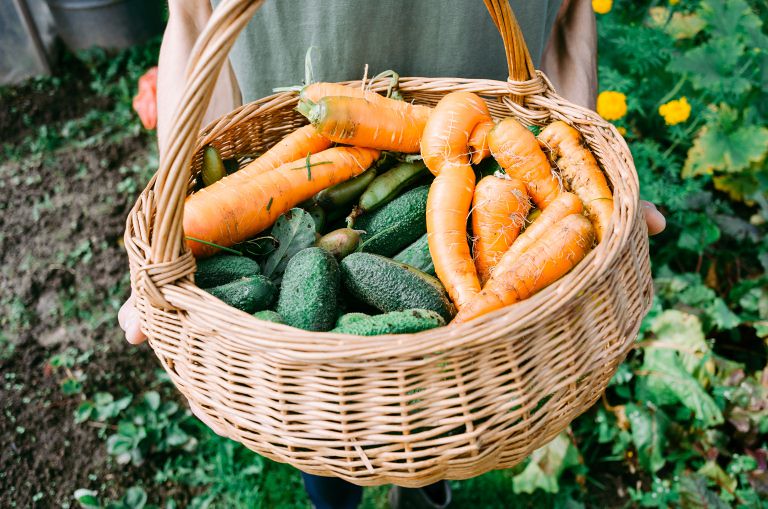
'Tyfu Fyny' Wales Rural Development Programme Report published
'Tyfu Fyny' Wales Rural Development Programme Report published
Our 3-year Rural Development Programme funded project ‘Tyfu Fyny’ has now come to an end. It’s been a fantastic 3 years and during that time we have got to know the community growing sector in a Wales a little more. Many of the project's targets have been exceeded, so a massive thanks to everyone that has contributed and participated to its great success.
You can read the full reports in Welsh or English below. A few of the key findings within the report (and found in the Executive Summary), include:
- The community growing sector in Wales is vibrant and has huge potential to contribute to Welsh Government policy relating to the economy, cultural heritage, the environment and the health and wellbeing of communities.
- The Covid-19 pandemic has presented significant opportunities for the sector to reaffirm the value of local food and to contribute towards food security in the future.
- Despite the existence of a national community growing strategy there is significant variation about how this translates into support and action across different Local Authority areas.
- The Tyfu Fyny delivery model of using experienced sector Development Workers who provide a gateway to specialist advice and support alongside specialist advisors is effective.
- Networking and peer to peer learning is highly valued by groups and is more likely to lead to sustained change within the sector.
- Social Farms & Gardens were able to draw on their experience and history of community based engagement work to provide multifaceted support to CSA’s and Care Farms which extended well beyond industry specific advice.
- Any future project should build on the wealth of knowledge and experience and networks developed through Tyfu Fyny Sufficient capacity and resources should be allocated to any future project to ensure reach to all parts of the sector and all parts of Wales but also to combine on the ground approaches with strategic policy influencing.
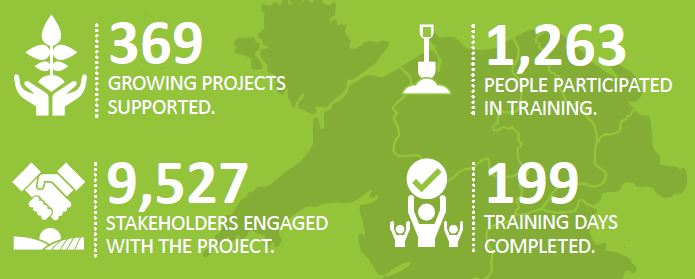

Read the full evaluation reports:
English translation
TYFU FYNY Evaluation Exec Summary ENGLISH July'20
TYFU FYNY Full Evaluation Report ENGLISH July'20
Welsh translation
TYFU FYNY Evaluation Exec Summary WELSH July'20
TYFU FYNY Final Evaluation Report WELSH July'20
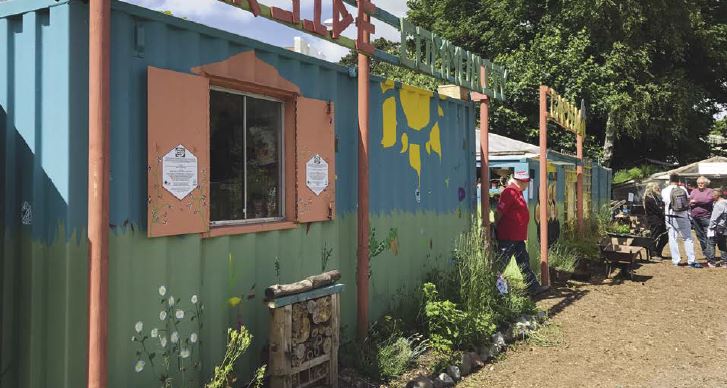
Find out more about our work in Wales here
Report on 'The Resilience of the Community Growing Sector in Northern Ireland' published
'The Resilience of the Community Growing Sector in Northern Ireland' Report has been published this week and is now available to view.
The report was completed by Social Farms & Gardens in June 2020 during the Covid 19 pandemic and describes the breadth of activity in the sector, summarises the needs of the sector, and makes recommendations for how funders, commissioners and others in the statutory sector can structure their support to best support those working to improve the lives of people in their community. It was written with input from those working in the sector and aims to be representative.
In these uncertain times, with many challenges and opportunities on the horizon, not least the Covid 19 crisis and the climate emergency, a strong, connected community growing sector will provide stability and
resilience in our communities, and is something to be proud of.
A series of case studies showcasing the work of groups in Northern Ireland in connecting people to nature and community have also been published along with the report. From permaculture smallholdings near the beautiful Mourne Mountains in Co. Down, to communities in West Belfast transforming unloved alleyways into friendly, green spaces and much more.
‘Growing Resilience: Digging Deeper’ is a five year project funded by The National Lottery, Community Fund programme. The project increases social capital and resilience in the community growing sector in Northern Ireland. Find out more about the project.
Members During Covid
What are our members doing?
Lockdown has presented everyone with huge challenges. Here are some of the ways that our members are rising to meet this challenge and learning how to do things in new ways in order to stay connected with their communities.
Our members are...filming life during COVID - 19
Farm Manager Geoff, from Pathways care farm in Suffolk has made a series of YouTube videos showing different aspects of farm life to help people still feel connected to the farm and to nature, even when they can't be there.
Our members are...growing food for the community
The government has listed 'food and other necessary goods' under the 'Critical Sector' category and this includes those involved in food production, processing, distribution, sale and delivery.
Many of our members despite having to drastically reduce staff on site are looking at how they can provide food for their local community safely. A great example of this is from OrganicLea, a community food project based in the Lea Valley in North-East London: How they are keeping local food supply growing and going
Our members are...looking at 'Veg Box' schemes to provide an income and support local communities
Sutton Community Farm, London are doing just this and are now no longer taking new customers due to the high demand. Rota management, reducing contact information is found on their website and contains useful information for others who are growing.
Our members are...writing to government and funders
The London Association has sent an open letter to funders and government, together with a support letter from Mark Lane, Gardeners World presenter. The letters call for guidance and support from government, and for funders to continue to support the vital work of the sector. They also highlight how important the services delivered by our members will be in the aftermath.
"When the immediate crisis abates, city farms and community gardens will be places for people to recover from issues caused and worsened by this crisis."
Open Letter to Government from London City Farms and Community Gardens
Open Letter to Funders from London City Farms and Community Gardens
Mark Lane Gardener's World TV presenter supporting letter
Our members are...using social media in new ways
Posting mental health information, mindfulness sessions, gardening and craft ideas.
Horton Community Garden run Mindfulness Garden courses and they are exploring ways to bring the mindfulness garden to people online. For the time being they are sharing a free weekly nature connection and a meditation practice each Tuesday. This is a great idea to help people, whilst keeping potential customers engaged. It could be monetised through using Zoom as suggested above. Visit their Facebook page for the links and see their first edition below, which contains videos and helpful tips to follow.
Join the Horton Community Garden Mindfulness Garden
Rainbow Community Garden, Hull are posting about their weekly growing activities and gardening tips so that their service users can still feel part of the growing season.
Our members are...live streaming events
Some of our members are exploring live streaming some activities to continue contact. You can do this by using Facebook Live or through apps like Zoom. Facebook live means that anyone can log on unless your Facebook group is set to members only/private. Using apps like Zoom require people to be invited to an online event, making it possible for you to charge for attending the event.
Cotteridge Park in Birmingham have been live streaming Thai Chi and Swing Fit for free via Facebook a Tai Chi session (see their Twitter and Facebook pages @CotteridgePark)
Our members are...delivering their courses online
Cynon Valley Organic Adventures are a community run social enterprise based in Wales, they have been given permission to deliver their accredited courses online so will be delivering various environmental and wellbeing courses. Find out more on their website.
Our members are...keeping in touch with their service users
Many of our members have got in touch to say how they are keeping connected to the people that access their services. Many people who rely on these vital services are living with complex needs and mental health issues. They are doing this by using a rota system to have regular catch ups on the phone to check in with people.
The Fold care farm in Worcestershire are doing just this, they have also posted out 'Grow Your Own Basil' kits to their participants and have organised a 'Farm Bingo' live streamed event to keep in touch. A lovely idea, carried out following strict hand washing guidance.
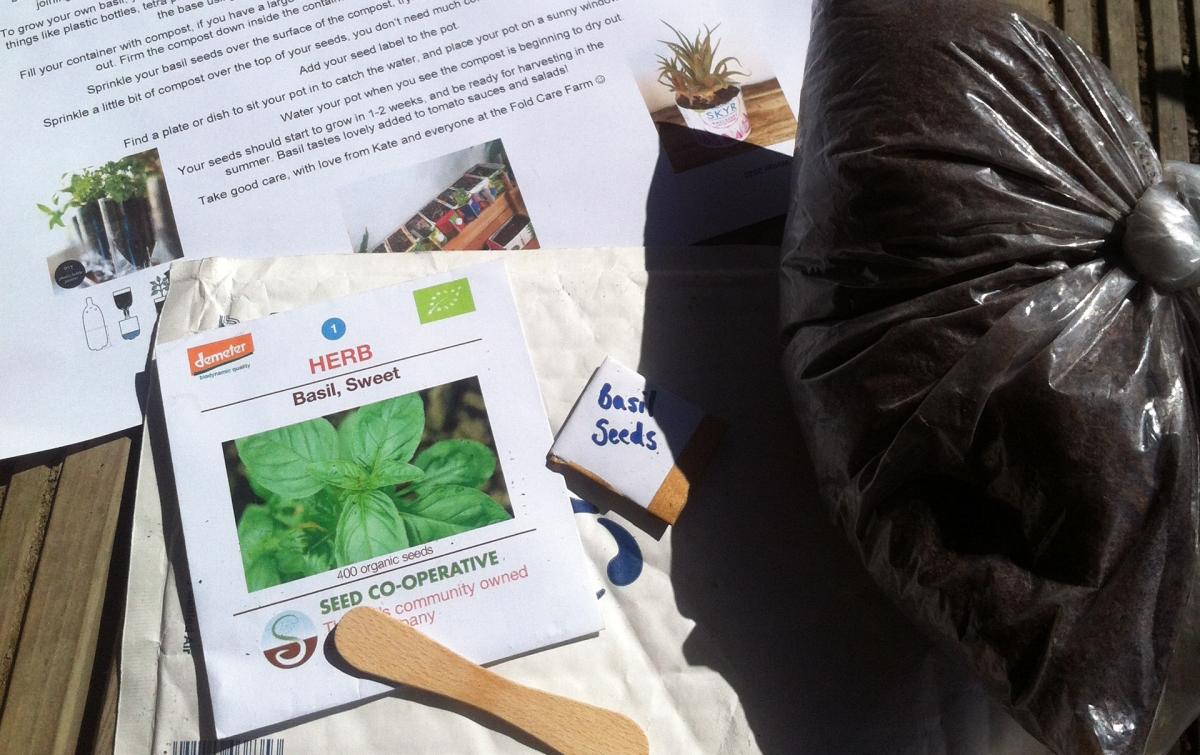
Our members are...helping families with homeschooling, by producing 'Nature and Science-Based Holiday Play Activities'
Hammersmith Community Gardens in London are creating a twice-weekly holiday play newsletter that is full of ideas about food growing, recycling, up-cycling and nature art and craft to support families during this period of homeschooling. If you would like to receive this newsletter, subscribe here or visit their website.
Our members are...giving away free growing kits
Hammersmith Community Gardens are also giving away over one hundred free growing kits. Inside the 'growing kit' are sunflower seeds and other vegetable seeds, instructions on how to sow and plant them, small pots, compost and ideas for things you can grow at home from your store cupboard or from your food waste. They will be giving away more growing kits over the next week. Keep an eye on their Twitter for the latest.
Our members are...helping to spread key messages
Malcom Macqueen, Chair of Organic Growers of Fairlie and John Wilby, Secretary of Paisley West End Growers Association, demonstrating the 2 metre rule.
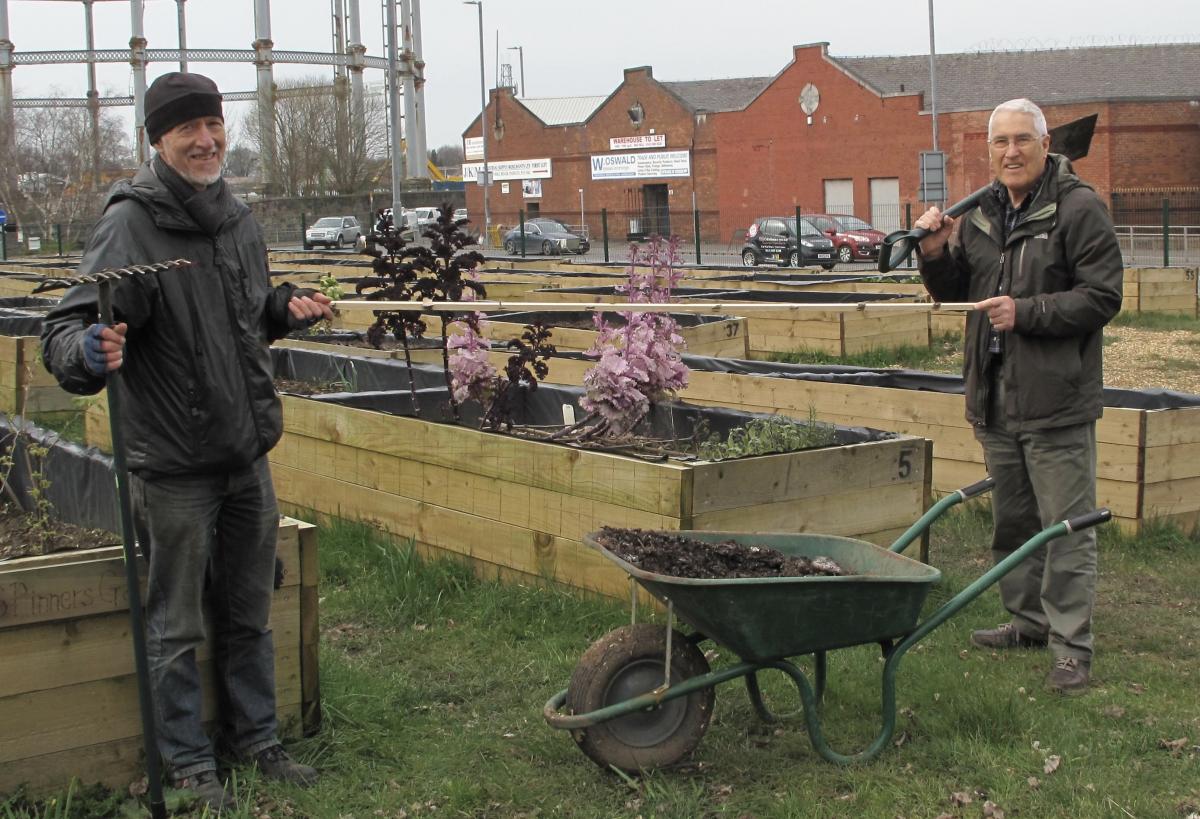
Our members are...getting children involved in growing wildflowers in urban green spaces
Friends of Eastville Park in Bristol have been making up seed bombs for children to take part in their annual wildflower sowing. The seed bombs are available to pick up anytime by families going on their daily exercise and are placed near a noticeboard. They have been prepared safely and without hand contact. Find out more on the Friends of Eastville Park Facebook page.
Covid-19 member impact survey - the results so far and our next steps
Over the past few weeks our COVID-19 member impact survey has already collected a huge number of responses from our members across Scotland, Ireland, Wales and England. The responses received so far indicate that across the country members have been profoundly impacted by the lockdown and social distancing requirements, but in many cases have also adapted and innovated rapidly in order to maintain farms, gardens and growing spaces and also to support the most vulnerable people in their communities. The survey will continue to stay open over the next few months, and we will be carrying out more detailed analysis as time moves on but here are a few of the initial findings:
*Results updated 07.05.2020
Operations - As expected virtually all members are now closed, but 87% have staff or volunteers carrying out essential work under social distancing, with 13% closed entirely. 18% have already furloughed staff.
Food - As a result of the crisis 35% of you are planning on growing more food this year, with an additional 21% expecting to grow the same amount as 2019.
Funding - 51% of members report already facing reduced funding and financial issues as a result of the pandemic.
Support - The most pressing support needs identified across the membership are assistance in finding funding, advice on working and growing under social distancing measures, planning for the future and tips on working with others in the community. See below for how we will be following up these requests.
Community - A huge 69% of you are either already working in your communities to provide support to people affected by the crisis, or are planning on doing so, including through donating seeds and plants, delivering food to those self-isolating and by supporting local food banks.
Next steps, and support for members affected by COVID-19
For those of you already in touch with our staff team you'll know that we're all working incredibly hard to provide support in these difficult times.
But in addition to this, based on what our members are telling us through the survey responses so far - we will soon be launching a series of online webinars and resources designed to help members tackle the most pressing concerns arising from this crisis, and to share best practice and inspiration from around the country.
We are also looking at ways in which we can increase remote peer-to peer support between members. More on this will be published in the next few weeks. If you are already a member keep an eye on your inbox and on our social media channels or you can sign up to become a member for free.
If you haven't already done so, please take our short survey
Coronavirus COVID - 19 - resources, links and news
We are all facing an unprecedented period of difficulty and disruption caused by the current coronavirus crisis. As the situation develops we want you to know that we are here. We have developed a dedicated Corona COVID -19 section of our website which will be updated regularly over the coming months. Our teams across the UK are working hard to source and provide the very latest information which we hope will provide help and support.
The new section contains:
Key links, resources and support
This page contains the latest guidance, links, resources and expert advice, covering the following topics:
- HR and Operational advice
- Policy writing
- Health and safety
- Managing Volunteers
- Financial support and information, Funding to help with the impact of COVID-19
- Farming specific advice and support
- Gardening/growing specific advice and support
What our members are doing and the #GrowingTogether campaign
We are gathering and sharing ideas and inspiration on what are members are doing right now to adapt and cope with the pandemic. This section will be helpful for any organisation working in the farming, gardening or growing sector.
Visit Corona COVID -19 website page
Protecting community farms and gardens
As part of our 40th Anniversary celebrations we’ve partnered with experienced and specialist insurance broker, McClarrons to deliver a special event to help these essential community spaces to secure the right insurance. The event has been postponed but we hope to reschedule for a date in the Autumn.
Having adequate insurance cover is vital for all farmers, gardeners and growers, whether they are providing care services, inviting visitors onto their site or organising volunteer work days and other events. Suitable cover protects both the organisation and individuals from potentially very expensive liability claims if something goes wrong.
McClarrons independent insurance brokers operate nationwide, specialising in the farming, not-for-profit and care sectors. McClarrons’ Care & Charity Team offer specialist insurance advice and rates for Social Farms & Gardens members.
They also have an in-house claims team to support policy holders through the claims process, should the worst happen. Their decades of experience mean they are well placed to guide groups to the right insurance, leaving them free to focus on improving the health and wellbeing of individuals, communities and the environment through nature-based activities.
If you are interested in finding out more about community gardens, farms or care farming in Yorkshire – find out more here
Thai cave rescue - Knighthood bestowed on our Wales Manager
On Monday this week our very own SF&G Wales Manager Gary Mitchell (also of South and Mid Wales Cave Rescue Team, and Assistant Chair to the British Cave Rescue Council) was awarded a Royal Decoration of the Kingdom of Thailand at a ceremony in the Thailand embassy ballroom, London.
Gary joined other UK members of the cave rescue team for the award ceremony. The team successfully helped to rescue 12 members of the Moo Pa Wild Boars football team and their coach that were trapped deep inside the Tham Luang cave in Northern Thailand back in June 2018.
Gary dropped his work commitments and family obligations (he has two young children of his own) and travelled to Thailand to assist in this global event after receiving a phonecall for his assistance upon arrival at the SF&G’s Cardiff Office – he was on a flight to Thailand later that day, where we remained for a little over 7 days helping to co-ordinate the ‘impossible’ rescue mission.
Gary and other rescue colleagues were awarded the Royal Decoration of the Most Admirable Order of the Direkgunabhorn. He received the appointment of ‘Knight Commander’ 2nd Class.
The ceremony was performed by His Excellence Mr. Pisanu Suvanajata, Ambassador of Thailand. As well as receiving the medals and decorations Gary was presented with a certificate signed by General (Ret.) Prayut Chan-o-cha, Prime Minister of the Kingdom of Thailand expressing his gratitude ‘for the selfless acts performed to help fellow human beings in danger’. The rescuers were also each presented with a letter signed by The king of Thailand, where one of the sentences reads:
"This circumstance has clearly shown the power of unity in action, power of love and goodwill towards fellow men regardless of race and religious beliefs."
Gary was accompanied to the ceremony by his good friend Heledd Poole, whom now resides in London.
We are so proud of this amazing feat.

The rescue effort involved over 10,000 people including more than 100 divers, scores of rescue workers, representatives from about 100 governmental agencies, 900 police officers, and 2,000 soldiers; and it required ten police helicopters, seven ambulances, more than 700 diving cylinders, and the pumping of more than a billion litres of water from the caves.
40 years, 40 stories
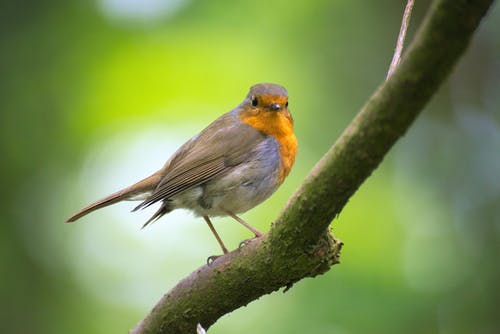
As part of our 40th Anniversary, we are celebrating the breadth, variety and impact of our incredible members through sharing 40 stories with a different theme each month.
Our first story comes from Scotswood Natural Community Garden. As the UK readies itself for the Big Garden Birdwatch 2020 this weekend, our theme for January is Wildlife gardening and encouraging biodiversity.
Social Farms & Gardens interviews Sean Clay about how their site (amongst many wonderful things), encourages wildlife gardening and biodiversity.
Name of organisation: Scotswood Natural Community Garden
Region: North East
Founded/started on site: 1995
Member since: 2003
Link to member profile: click here
Scotswood's story
Scotswood Garden works with nature to create a great place for people and wildlife to enjoy. The garden is about community, whether in Scotswood and Benwell or the wider area, and they welcome people of all ages and backgrounds to get involved in the work.
We visited Scotswood on a chilly January day as part of our Dobies training programme – we’d come to see how volunteers can stay engaged with a space even in deepest darkest winter so the weather was apt! Sean Clay, Garden Manager, took us on a guided tour around the 2.5 acre space.The first thing you notice about the garden is the bird song – it’s deafening, and we’re in the centre of Newcastle!
The garden aims for a ‘managed wildness’ approach so one of Sean’s jobs is to explain why piles of sticks and leaves aren’t “tidied up”, but it’s all paying off and the garden is a haven for wildlife. Wild areas provide habitats for hedgehogs, bats, numerous bird species, great crested newts, a fox and too many rabbits! There are many trees including alder, walnuts, hazels, yews, scots pines, rowans and abundant fruit trees. The fruits are harvested and made into chutneys and juices which are available to purchase.
The two ponds are home to all three British newt species: great crested; smooth, and palmate. It is rare to find all three together. A new accessible garden with moveable and raised beds as well as a compost toilet is opening up the garden to new users. While the small, and fairly new, vegetable growing space uses no-dig principles to produce abundance and Sean proudly shows us the compost sausage. Involving the local community is integral to Scotswood’s activity so their work is divided into five strands to ensure maximum engagement.
These are youth work, education & forest schools, older people’s services, adult volunteering and community outreach.A garden takes time to become established and Scotswood is a mature space that’s been around for 25 years. It is now a designated local wildlife site.
Visit scotswoodgarden.org.uk to find out more about this fantastic space.
Finally, what do you value about being a member of Social Farms & Gardens?
"Being part of a network" and "Access to information, advice and training". “It’s great to be part of a wider network to share and learn from others doing similar fantastic work. We can all learn from each other"
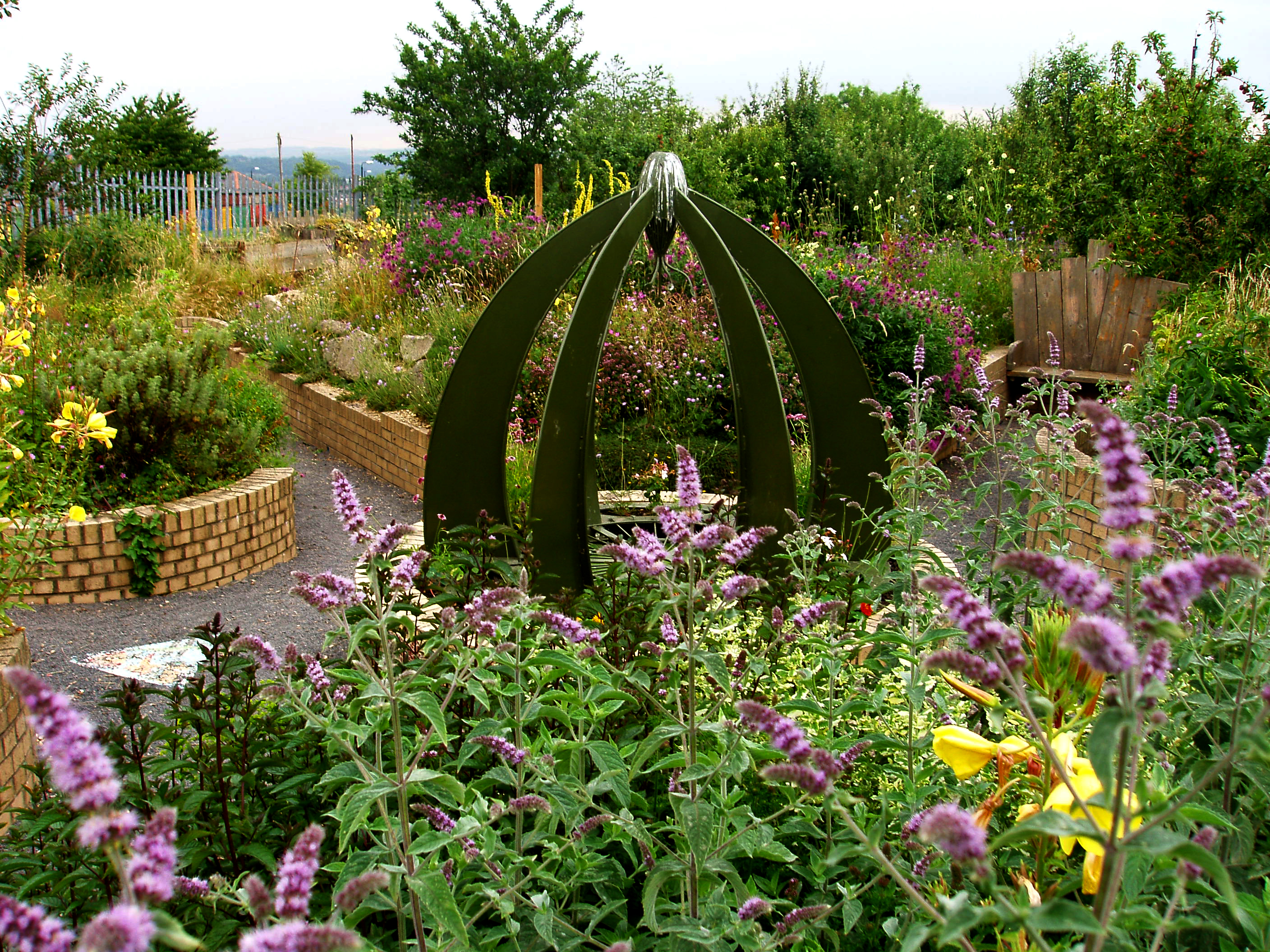
Celebrating 40 years of farming, gardening and growing together
This year Social Farms & Gardens are celebrating 40 years of farming, gardening and growing together.
2020 will be packed full of activities to celebrate the 40th. From monthly events UK wide including the European Federation of City Farms Conference and Growing Care Farming Conference, to the the special 40th Anniversary SF&G Awards - where winners will receive their awards at the House of Lords. Plus, a new chance for younger people to get involved, through the launch of our Youth Forum - an exciting opportunity for young people to help direct and shape our plans going forwards.
A big part of the year’s celebrations will be celebrating the incredible diversity and impact of our members across our digital platforms throughout the year.
We'll be shining a spotlight on the amazing work of all the volunteers, staff and trustees that make up the very fabric of our member organisations and the inspiring initiatives created to increase sustainability, biodiversity and the wellbeing of people and communities.
Visit our 40th Anniversary page
Force of nature: the battle to save London’s green spaces
London culture magazine 'Huck' has its finger on the pulse for community matters in London. This month they interviewed Social Farms & Gardens for their article 'Force of nature: the battle to save London’s green spaces'.
Writer Jessica Furseth meets the people trying to save them:
"As the city’s population rises, the future of its green spaces – which are vital for community spirit, physical health and mental wellbeing – are in doubt. Greenery is good for us. Research shows that living in a leafy urban area reduces the risk of depression and anxiety. Working with others towards a common goal, such as taking care of plants or a vegetable patch, creates community, or just being outside for a bit and watching the birds or frogs is positive for bringing about a different state of mind. “It creates a sense of flow,” says Amber Alferoff, London Project Officer at Social Farms & Gardens, a support charity. “You find yourself in the most gorgeous places with the most lovely people instead of a concrete walkway. There’s always a secret green place in London that’s just waiting to be found.”
Part of the work by Social Farms & Gardens is to ensure that people “really understand that you’re not just a cutesy garden group, but you’ve really got a strong impact,” says Alferoff. Funding is often a challenge: there are grants available but often, gardens or city farms will have permission to exist but no official lease. Alferoff is keen to stress the societal value of London’s green spaces, especially in light of government cuts to mental health services. In some cases, gardens have found themselves having to perform services they may be unprepared for: “There are people who would have had mental health support in the past, but who aren’t getting it anymore. So when they arrive at community gardens, that’s not necessarily a formal support system that is [trained to help] them.” Everyone is always welcome, Alferoff adds, but often, gardens aren’t properly compensated to provide these services."
The article is full of fascinating interviews from local activists, community allotment growers and wildlife charities. Click here to read it in full.
‘Growing Resilience’ blooms in Northern Ireland
Great news for the Social Farms & Gardens project ‘Growing Resilience’ this month, as additional funding from the lottery is confirmed. This important funding will enable the charity to expand the project, supporting even more community gardens in Northern Ireland to garden and grow together. In June 2019 after a hugely successful first two years, The National Lottery, Community Fund programme confirmed it would fund Social Farms & Gardens to expand the work into three specific new areas (Newry Mourne and Down, Derry City and North Belfast). All Local Council areas will be covered as the project develops. The project will also organise networking forums across Northern Ireland, which could include topics such as growing skills, volunteer recruitment and community development and engagement.
Under the new name, ‘Growing Resilience: Digging Deeper’, the project will run for five years, funded by The National Lottery, Community Fund programme. The project increases social capital and resilience in the community growing sector in Northern Ireland.
The programme works to support volunteers in the community growing sector to connect, share skills, build confidence and support one another; strengthening their ability to work sustainably and withstand changes in an ever-changing financial landscape.
The skills shared so far have been hugely diverse and inspiring; from soil health, fermenting foods and community composting, to pallet furniture making and a great engagement activity called disco soup!
FInd out more about the project here
If you are part of a community group and would like to be involved, or simply interested in finding out more. Please contact [email protected].
Growing Care Farming project launched
Social Farms & Gardens have launched a £1.4 million project which aims to significantly increase the number of care farm places available each year.
Natural England hosted the launch of the Growing Care Farming project at the Royal Over-Seas League in London on 13th May 2019. Growing Care Farming is part of the Government Programme for Children & Nature which is supported by Defra, funded by the Department for Education and managed by Natural England. The project is being delivered by Social Farms & Gardens in partnership with charity Thrive.
Care farming means the therapeutic use of farming practices and is sometimes called social farming. Care farming sits amongst other nature-based therapies that are collectively called 'green care'. Green care means structured nature programmes for people with a defined need to benefit health, social care or education outcomes.
Health and social care professionals (such as GPs, community mental mealth workers, social prescribing link workers or local social care workers) and education professionals can commission a wide range of care farming services for adults and children with needs including learning disabilities, Autism Spectrum Disorders, dementia, drug or alcohol addiction and ex-service personnel with post traumatic stress disorder or children with emotional needs excluded from school.
The project has the potential to support a significant and much needed step change in the scale of the care farming sector, enabling critical mental health services for both children and adults to become more readily available across England, especially in rural areas. It is hoped that the project will increase the number of care farm places available each year by nearly 1 million, up to 1.3 million. The Growing Care Farming project aims to expand and transform care farming services across England through training, support and resources, regional networking and quality assurance.
Natural England Chief Executive Marian Spain, said: "The project has the potential to support a significant and much needed step change in the scale of the care farming sector, enabling critical mental health services for both children and adults to become more readily available across England, especially in rural areas.
"We have a large and growing mental health issue in England and this initiative rises to that challenge. What a fantastic contribution to help tackle such an important social need.
"To achieve this scale of change is a serious challenge that will take innovation and determination by those in both the environment and health sectors. In particular, we in the natural environment sector must build stronger working relationships with health and social care commissioners to help streamline the referral mechanisms and pathways to nature-based therapeutic interventions such as care farm services, but this can be done."
James Sanderson, Director of Personalised Care at NHS England, said: “The NHS is committed to giving people more choice and control over their care, and to support people who may be struggling with their physical and mental health to connect with their local communities.
"The expansion of social prescribing link workers, which was promised in the NHS Long Term Plan, will mean that people will be supported to get involved with the activities that are right for them. In particular we know that the use of the natural environment can make a real difference to people’s wellbeing and the Care Farming Project is a practical, and inspiring, way of providing opportunities for more people to get involved.”
Minister for the Environment, Therese Coffey, said: “Care farming provides health and social care and specialist education providers with innovative and effective care options. It benefits society as a whole by reducing the strain on statutory services and the NHS, and it also helps farmers who have an alternative way to use their farm, to provide health, social and educational care services in addition to or instead of commercial production.”
Speakers at the launch included:
- Therese Coffey, Minister for the Environment, Defra
- Nadim Zahawi, Minister for Children and Families at the Department for Education - Watch address
- Natural England Chief Executive Marian Spain - read the Natural England blog
- James Sanderson, Director of Personalised Care at NHS England - view presentation
- Mark Coulman, Care Farmer, Hall Farm - view presentation
- Chris Baker, Commissioner, Ongo - view presentation
- Dr Rachel Bragg, Care Farming Development Manager, Social Farms & Gardens - view presentation
View the full launch programme.
Social Farms & Gardens together with Thrive to expand and transform care farming in England
We are delighted to announce that Social Farms & Gardens has been selected to lead the 'Growing Care Farming' Project.
This project is part of the £10m Children and Nature Programme being supported by Defra, funded by the Department of Education and managed by Natural England, which aims to encourage children from disadvantaged backgrounds to play and learn outside, in and out of school, and is a key commitment in the Government’s 25-year Environment Plan published last year.
Officially launched on 31st January 2019, this £1.4 million project is an exciting opportunity to build the capacity and scale of the care farming sector. We will be working with Thrive to expand and transform care farming services across all nine English regions and ultimately create more opportunities for both children and adults with a defined need to benefit from attending care farms, for health, social and specialist educational care services.
This is a fantastic opportunity for us to continue working closely with care farmers and commissioning agencies to grow both the supply and demand of care farming places and something that we have been working towards for nearly a decade!
Watch this space for updates on progress, developments and opportunities to get involved.
Helping to create more 'Gardens of Sanctuary'
For many people arriving to seek asylum in the UK, community growing spaces can offer vital and unique opportunities to find community, improve mental and physical health and to learn and share skills. These resources have been designed to encourage and support community growing groups to welcome people seeking sanctuary.
Social Farms & Gardens, City of Sanctuary and the Permaculture Association have been working together to support and inspire some of the thousands of community growing spaces in the UK to become places of sanctuary for people forced to flee from persecution.
For the past year the Gardens of Sanctuary partnership project has been conducting research into how community growing spaces of all kinds interact with refugees and asylum seekers.
A report based on the project's research findings, a series of case studies and a ‘Gardens of Sanctuary Resource Pack’ have now been published. You can download these here.
Future of food, farming and agriculture consultation
Social Farms & Gardens has contributed to a Defra consultation on the future of food, farming and the environment in England, emphasising the role that city farms, care farms and community gardens already play in benefitting people and places - and how much more could be achieved with more support.
The consultation called for views on proposals for future agriculture policy in England, particularly in light of changes as a result of leaving the European Union and the Common Agricultural Policy.
In its consultation response, Social Farms & Gardens said that care farms, city farms and community gardens offer a vital role in providing public goods for public money; they could offer increased potential savings to health, education and social services; help re-connect people with food and farming and help maintain viable and thriving rural communities, improving mental and physical well-being for the population, while protecting vulnerable family farms.
The response also said that any future agricultural policy post EU exit should therefore include an enabling policy environment for continuation and growth of care farming and community agriculture opportunities.
The response concluded that, in particuar, community agriculture initiatives and care farming already contribute – and could do considerably more with the right support - to the following:
• Contribute to the payment of public money for the provision of public goods
• Support farmers to prepare for change and improve resilience in the sector
• Deliver cultural benefits that improve mental and physical well-being
• Increase public engagement and education of food and farming.
Read Social Farms & Gardens full response via the following:
SFG Consultation response
Growing Better Lives 2018 - Conference
Growing Better Lives 2018, a conference exploring and celebrating the links between community growing, care farming, health and wellbeing took place in Manchester in April 2018, sponsored by The Mayfield Partnership.
Aimed at community growing and care farming practitioners, health commissioners, policy makers and academics, Growing Better LIves 2018 reflected on the increasingly strong body of evidence about the positive influence of farming and gardening in care and health contexts.
Growing Better Lives 2018 also marked the official launch of Social Farms & Gardens, a new organisaiton resulting from the merger of the Federation of City Farms & Community Gardens and Care Farming UK. The new organisation was launched by Lord Donald Curry (who has become its new President) and will build on the work of the two former organisations, representing and supporting the delivery of care services and community development through farming and gardening activities.
The conference was attended by more than 100 people, representing community growers, care farmers, city farmers, business supporters and other green sector organisations. Among the successes were:
- increased awareness and understanding about land-based community growing and care farming activities.
- provided evidence of how this work can make positive and lasting improvements in people’s lives
- gave practitioners an opportunity to learn new skills
- celebrated success with their peers through our Local Heroes awards, sponsored by Dobies, highlighting the best of city farms, community gardens and care farming.
Much recent research has shown how city farms, community gardens and other community managed green spaces have an vital impact on health, wellbeing, education and sustainable development of community facilities, often in deprived areas. Meanwhile care farming in the UK has grown in prominence in the last decade as an effective form of health and social care - so much so that the expansion of care farming in the UK was mentioned this week in DEFRA’s 25 year environmental plan.
An exciting list of speakers included: Dr Rachel Bragg (University of Essex; Dr Mike Hardman (University of Salford); Dr Michelle Howarth (University of Salford); Pam Warhurst (Incredible Edible) and Kathryn Rossiter (Thrive).
Conference Sponsors

CLAS Cymru helps in £1.1m Big Lottery win for Newtown asset transfer
CLAS Cymru, the community land initiative managed by the Federation of City Farms and Community Gardens, has helped support a consortium of locally based volunteers, community enterprises and organisations in Newtown, Powys, to secure a £1.1 million in funding from the Big Lottery’s Community Asset Transfer program.
The Going Green for a Living consortium came together in response to Newtown and Llanllwchaiarn Town Council’s call to look at new and more sustainable ways to manage the open spaces of Newtown i.e. how could the community generate a better living from our green and blue assets?
Key landowners & partners in the project, Powys County Council and Welsh Government, have offered long term secure tenure of around 130 acres of land, to be held in a Community Land Trust, making this one of the largest community asset transfers of amenity land in Wales.
CLAS Cymru coordinator Lucie Taylor said: “We are really pleased to provide support to such a pioneering project that enables the Newtown Community to secure more land for growing local food”.
For more details go to the Community Land Advisory website
Stick Man Trails at Community Growing Sites
Popular picture book character Stick Man is teaming up with local community groups across the UK to encourage urban children to get outdoors and explore the natural world. Fun-filled activity trails have been opened at five community growing sites around the UK (with another trail in Manchester due open soon), thanks to the support of Stick Man brand owner Magic Light Pictures.
Based on the much-loved picture book written by Julia Donaldson and illustrated by Axel Scheffler, the self-guided trails are designed to help children go on their own adventure with the character, find out more about the natural world and learn how things grow. The trails, aimed at three to seven year olds, offer an interactive learning experience through brightly coloured boards featuring Stick Man and other characters from the picture book. The trails are being piloted at:
- Windmill Hill City Farm in Bristol
- Greenmeadow Community Farm in Wales
- Polbeth and West Calder Community Garden in Scotland
- Colin Glen Trust, which runs a community forest park in Northern Ireland
It's hoped that thousands of parents and young children will ‘twig' how much fun the trails can be and become new and regular visitors to their local growing group. The initiative is part of the legacy of a national campaign called Local Heroes, which aimed to get more people, including children, involved with their local community growing groups, such as city farms, community gardens, therapy gardens and community orchards. There are estimated to be over 2,500 community growing groups in the UK, most of which rely on voluntary support and need more help to thrive.
Heidi Seary, project manager of the Growing Together partnership which led the Local Heroes campaign, said: "We hope that hundreds of young children and families will be inspired to go on their own outdoor adventure with Stick Man at a community growing site, where they can have fun, as well as learn more about the natural world and how things grow. Our new Stick Man trails will provide children, particularly those in urban areas who have little access to the countryside, with an opportunity to play and learn outdoors, at the same time as raising the profile of local community growing groups, which help make local neighbourhoods better, healthier and friendlier places. If the trails are as popular as we hope, we plan to ‘branch out' the Stick Man trails and activities to other local community groups next year."
Daryl Shute, brand director at Magic Light Pictures, said: "Encouraging exploration and learning about nature are core values for the Stick Man brand so we are really excited to bring these trails into a new, urban setting and reach a wider audience."
To find out more about how the trails and where to find the pilot sites, and the Local Heroes campaign, go to https://www.farmgarden.org.uk/stick-man
Adam Henson backs School Farms
Farmer and TV presenter Adam Henson called on the agricultural sector to support the use of the farming environment in education to help create the next generation of people entering rural careers, at a recent conference to promote school farms and highlight the key role they can play in developing a holistic education approach.
The School Farms Network Education Alliance (SFNEA) conference 2017 took place at the Royal Agricultural University on 30 June to 1 July, hosted by the Royal Agricultural University at its Cirencester campus.
The conference promoted interest in school farming (and other types of land-based education) through keynote presentations, breakout sessions and practitioner-focused sharing and practical workshops, addressing the themes of:
- School Farms as sites for learning
- Agriculture, technology and enterprise
- Building student achievement, access and progression
- Building land-based careers and education pathways to university
Mr Henson, who was a keynote speaker at the conference, said: "The use of a farming environment with growing crops and livestock is an invaluable form of learning and I fully appreciate all the work the Schools Farms Network carries out. The agricultural sector needs to be encouraging the next generation into farming and rural careers, so engaging students at a young age can only be a good thing."
A full conference report will be available shortly. In the meantime, the conference delegate pack gives full details of the programme and speakers.
Presentations given at the conference can be accessed here.
The programme included a Gala Awards Dinner at which Mr Henson presented the inaugaral School Farms Network Awards. Image: Alison Woodham Photography
Congratulations to all of the award winners and runners-up:
- School Farm Enterprise and Innovation Award 2017 Winner: Chipping Campden School; Runner-up: Bebington High Sports College
- School Farm Community Engagement Award 2017 Winner: Woodchurch High School; Runner-up: Thomas Alleyne’s High School
- Best Use of School Farm in the Curriculum Award 2017 Winner: Brockhill Park Performing Arts College; Runner-up: Eastfield Primary School
- School Farm Leadership Award 2017 Winner: Bebington High Sports College; Runner-up: Mowbray School Farm Leadership Team
- School Farm Student Leadership Award 2017 Winner: Kirk Hallam Community Academy
- Best School Farm Secondary School Award 2017 Winner: Ramsey Grammar School; Runner-up: Bebington High Sports College
- Best School Farm Primary School Award 2017 Winner: Eastfields Primary School; Runner-up: Edwalton Primary School
- Best School Farm Award 2017 Winner: Brockhill Park Performing Arts College
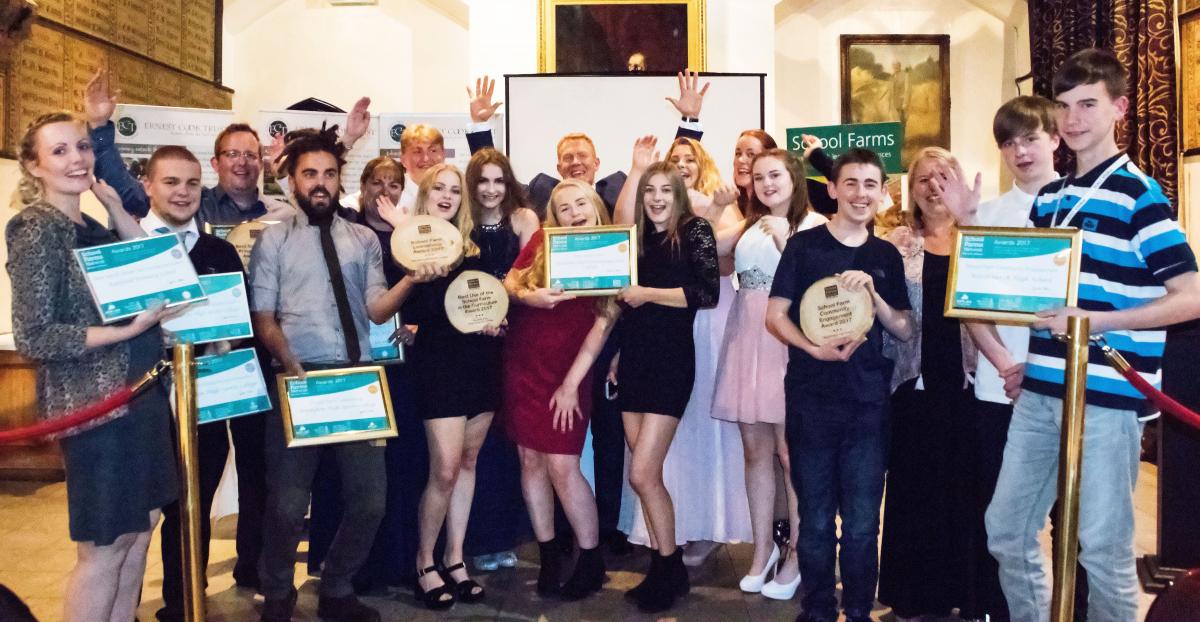
New project demonstrates benefits of outdoor learning
A new Natural England-funded project to demonstrate the enormous benefits of outdoor learning to children and develop a model(s) of using ‘hub’ schools to support and deliver teacher training, is now available.
The project, which is funded by Natural England, the Department for the Environment, Food and Rural Affairs and Historic England and delivered by Plymouth University, is the largest project of its kind in England and has already helped more than 40,000 primary and secondary school pupils get out of their classrooms and into the outdoors – whether that’s a maths lesson in a local park or drama out on the school field.
Sue Waite, Associate Professor in Outdoor Learning at Plymouth University, said: “The model for this project was built on substantial evidence into both the benefits and challenges schools face when embedding outdoor learning into core teaching. By working directly with teachers we’ve helped to bring about a sustainable culture of outdoor learning across schools that will continue long after the project has ended and will leave behind a lasting legacy.”
The Natural Connections project focused mainly on areas of deprivation in Plymouth, Torbay, Bristol, Cornwall and Somerset, working in both urban and rural schools with varying school grounds and access to local green spaces. These areas are now developing innovative ways to continue supporting outdoor learning across the school networks they have established through the project.
Natural England is now working with partners to help share the findings from this project to support and enhance the delivery of outdoor learning in schools across England. A full copy of the Natural Connections project report can be downloaded from Natural England’s Access to Evidence publications catalogue
A short video has been produced to accompany the publication of the project report. The film highlights the achievements of the project and includes contributions from teachers and pupils talking about their positive experience.
Community green spaces underused for dementia care - report
Urban green spaces, including city farms and community gardens, are not being used enough to help people living with dementia and their carers, according to a new report from Natural England.
In one of the biggest surveys of its kind so far, people living with dementia and their carers were asked about outdoor activities and the places where they go. The report reveals that engaging in outdoor activities that have a purpose and activities that involve being with other people provide the greatest motivation.
But places like city farms and community gardens, are sometimes overlooked as an alternative for people living with dementia, or have not yet explored the possibility of working with carers and dementia support organisations.
The new study – Is it nice outside? Consulting people living with dementia and carers about engaging with the natural environment – is the result of a collaborative project between Natural England, Dementia Adventure, the Mental Health Foundation and Innovations in Dementia.
Only 20 percent of the people living with dementia considered that their condition was a barrier to using outdoor spaces, whereas 83 percent of carers believed that dementia limited the person’s ability.
Findings from the report include:
- Some urban green spaces such as allotments, city farms and community gardens are underused by people with dementia
- Informal walking outdoors was the most frequently mentioned activity (38%) and was also seen as vitally important by carers for its beneficial effect
- Wildlife or bird watching is one of the most popular activities for people living with dementia and 25% of the people interviewed said that they took part several times a week or every day
- The most popular places to visit for people with dementia were associated with water (45%), such as lakes, rivers or the coastline and city parks and public gardens were also popular (30%)
The top barriers to taking part in outdoor activities and having contact with nature were:
- Lack of confidence
- Fears and safety concerns
- Not having transport
- Insufficient information about what places have to offer and their suitability for visitors with dementia
- Lack of support to get to locations, to use facilities, and to participate in outdoor activities
The report makes a series of recommendations that could encourage greater use of natural spaces, including community-run spaces, by people living with dementia and their carers.
For example, managers of outdoor spaces could work with local dementia action alliances to develop a Trip Advisor-style ratings system to provide information about local dementia-friendly open spaces.
Other recommendations from the report address ways to make visits to green spaces more dementia-friendly through implementing the principles of dementia friendly communities at outdoor sites by: training staff to be dementia aware; improving training on how to sensitively and effectively support people living with dementia; and, improving understanding by managers of outdoor spaces of the types of facilities, activities and information that people living with dementia say they need.
Jim Burt, Principal Adviser for Natural England’s Outdoors for All programme said: “There is already strong evidence to show the positive benefits of engagement with the natural environment for people living with dementia and this survey adds to that body of evidence. Importantly, it heard directly from both those living with dementia and their carers, and the research has revealed important new information and insights. This work will now help our partners and the wider health community to take action that will enable people with dementia to have more and better quality opportunities to be active in the great outdoors.”
For many people living with dementia and their family carers the answer is yes, people want and need to get out into the fresh air, to walk, be near water and watch and listen to the birds. The fact that these simple outdoor pleasures are not equally accessible for some of the thousands of families living with dementia is another reminder for us to work across care and conservation boundaries and implement the solutions contained in the report.
Toby Williamson, Head of Development and Later Life at the Mental Health Foundation says: “The benefits of outdoor activity for peoples’ wellbeing, whether it’s walking, wildlife watching, or just ‘being in nature’, are well known. But concerns about safety and access can mean that many people with dementia do not share in those benefits.”
The research that the Mental Health Foundation and Innovations in Dementia undertook for Natural England and Dementia Adventure in this report showed that people with dementia, and their families and friends, wanted to continue to visit green spaces, such as parks and rivers, and participate in outdoor activities. It identifies simple, practical changes that organisations responsible for green spaces can make to ensure they are dementia accessible and inclusive, so people with dementia and their carers can continue to enjoy being outdoors.
The findings from this project will now be used to help design a large-scale demonstration project to deliver services in the natural environment for people living with dementia and their carers. The recommendations will also be valuable to other natural environment providers in shaping projects to further their work with people living with dementia.
The report can be downloaded from Natural England’s Access to Evidence publications catalogue.
Major new study shows ‘green care’ benefits for mental health
A major new report shows compelling evidence that the ‘green care’ offered by many Federation of City Farm and Community Gardens members can help people with mental ill-health and contributes to a reduction in levels of anxiety, stress and depression.
Natural England’s ‘A review of nature-based interventions for mental health care’ calls for greater use of green care such as social and therapeutic horticulture, care farming and environmental conservation, as a cost-effective solution for mental health and social service commissioners.
The study also cites FCFCG as a key national organisation supporting social and therapeutic horticulture projects and practitioners.
Jeremy Iles, CEO of the Federation, said: “This important new study reinforces what we already know about the multiple benefits of green care for mental health. Most community growing projects and farms already offer green care services.
“We are working to create new opportunities for people to access nature-based therapies at home, in the workplace and at hospitals and schools. We hope this report will raise awareness of green care and act as a springboard for greater collaboration.”
The new review was commissioned by Natural England from the University of Essex and Mind, the UK’s leading mental health charity. It suggests that green care interventions can provide an increasingly important way of supporting mental health services, with many projects already making a difference to people’s lives.
The benefits of such interventions include a reduction in depression, anxiety, and stress symptoms, and an improvement in dementia-related symptoms.
The report also shows that people involved in these types of green care activities have a greatly increased level of social contact and inclusion, as well as a sense of belonging and personal achievement.
Alan Law, Natural England’s Chief Strategy and Reform Officer, said: “There is now compelling evidence to show that contact with nature and the outdoors improves physical health and mental wellbeing. Natural England is committed to find ways to help more people access the benefits that come through practical experiences in the outdoors.”
Click here to find out more and download the full report.
Just 30 minutes of gardening can boost mental health
A new study has shown that just 30 minutes of gardening a week has a beneficial effect on mental health.
Researchers from Westminster and Essex universities questioned 269 gardeners and non-gardeners with the former describing their feelings before and after working in an allotment
They found that one gardening session resulted in significant improvements in self-esteem and mood, with reductions in tension, depression, anger, and confusion.
The study also found that less than half of gardeners were overweight or obese, compared to nearly 70 per cent of non-gardeners.
The authors concluded that local authorities should seek to provide more community allotment plots for residents, and that this “could contribute to a greener and healthier economy focused on the prevention of ill-health. This preventative approach could result in substantial savings to the UK economy, particularly in the treatment of health conditions such as mental illness, obesity, cardiovascular disease and loneliness.”
Professor John Ashton, president of the UK Faculty of Public Health (FPH), said: “We cannot have good physical health without also looking after our mental well-being. FPH would welcome more community allotments and opportunities for people to have access to safe, green spaces....Given the cost to individuals and the economy of poor mental health, it makes sense from both a public health and economic perspective to prioritise mental well-being.”
Click here to read an article about the study in the Independent newspaper.
Community growing a 'powerful tool' for good
A new report produced by FCFCG shows that involvement in community growing can act as a ‘powerful tool’ to help vulnerable people, bring communities together and encourage people to adopt greener and healthier behaviours.
FCFCG has produced a learning report tracking the progress of growing and green space projects funded by Communities Living Sustainably, a Big Lottery funded five year programme which has provided £1m to twelve communities to test ways of dealing with the potential impacts of climate change.
The report, which follows projects including a Salvation Army hostel garden, an initiative to get people growing at home and a developing local food network, observes that: ‘practical involvement in growing and green space activities can provide a powerful tool to help vulnerable people address personal and social issues.’ Projects were also helping increase people’s physical activity and encouraging health eating while promoting biodiversity.
The report also finds scope for devolved public health budgets to build community growing and green space projects into local service delivery, supported by the development of robust evidence of health benefits and employment outcomes.
The experience of CLS groups suggests that local projects can also stimulate local food economies, although it also highlights a number of barriers and a need to coordinate a strategic approach to local food to overcome challenges faced in building production at scale, increasing distribution networks and retail outlets to turn social projects into more mainstream business models.
The report contains recommendations for funders, central and local government and community organisations and has been produced by FCFCG for the Groundwork Learning Partnership, which is comprised of Groundwork UK, The Energy Saving Trust, The Federation of City Farms and Community Gardens, The New Economics Foundation and Building Research Establishment (BRE).
Click here to read the full report and find out more about Communities Living Sustainably.
Report highlights benefits of community growing
A Glasgow University study on community gardens in the city, including three Federation of City Farms and Community Gardens (FCFCG) members, has outlined their positive effect on individuals and communities.
Glasgow’s Community Gardens: Sustainable communities of care set out to explore the relationships between sustainability, health, well-being and the urban environment by studying 14 gardens in Glasgow, including FCFCG members The Hidden Gardens, 3Hills Community Gardens and Woodlands Community Garden.
The report concluded that community gardening promotes community empowerment and “offers a learning environment that goes beyond the skills associated with horticulture to include individual health, self and community wellbeing and democratic citizenship.”
The therapeutic potential of gardening is acknowledged, with some people reporting mental and physical health benefits. One anonymous volunteer is quoted as saying: “I decided instead of sitting in the house all day, the garden would get me out and about. It gives me something to do… Me being epileptic as well, it [the garden] helps bring down my stress levels with having something on my mind […] I was in a bad way, drugs and stuff – working the gardens has saved my life”.
Other participants acquired knowledge and skills that build self-confidence and encourage team working. The report found that the community gardens provide important employment and training opportunities in Glasgow and have “considerable potential to be expanded, given the right policy support.”
The study also found evidence of gardens increasing social inclusion and community cohesion while “promoting a positive recognition and celebration of different cultures”, with one sessional worker commenting: “I have eight people in my taskforce. Most don’t have English as a first language. There is Roma, Czech Republic […] I also have someone from Ghana, someone from Gambia, someone from Eritrea.[…] When we had young refugees and asylum seekers last week it was fascinating the things they were telling us about wild garlic, and making soup, and how they would use various herbs in their culture.”
The report also mentions that FCFCG provides free advice on lease issues to community gardening groups – this is actually provided by the Community Land Advisory Service (CLAS).
You can read the full report by clicking here.

